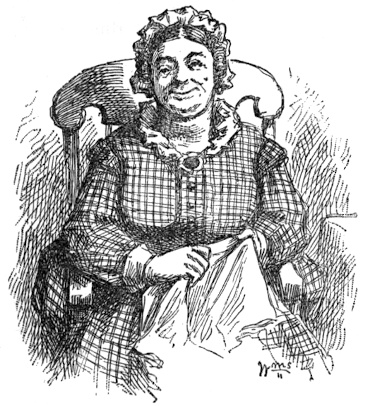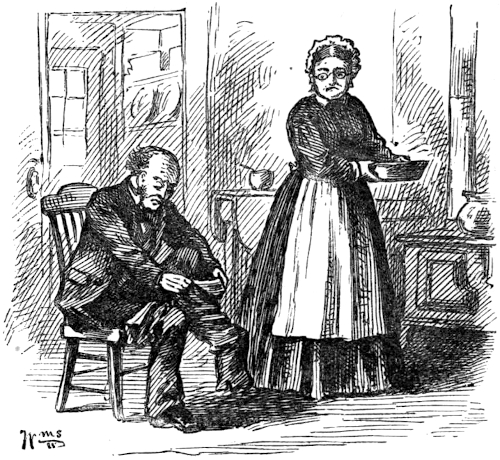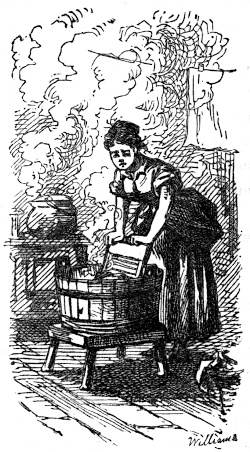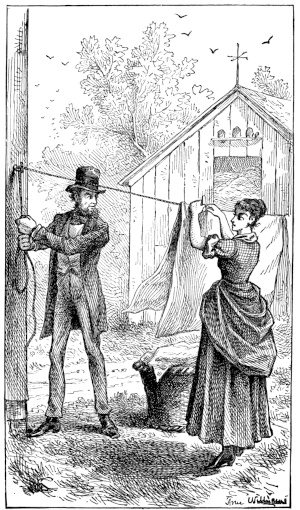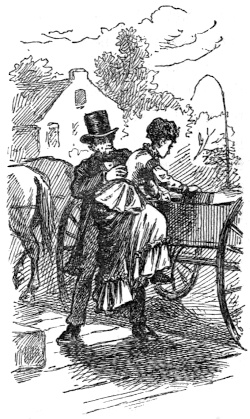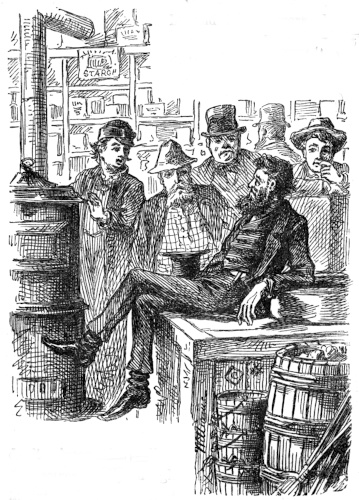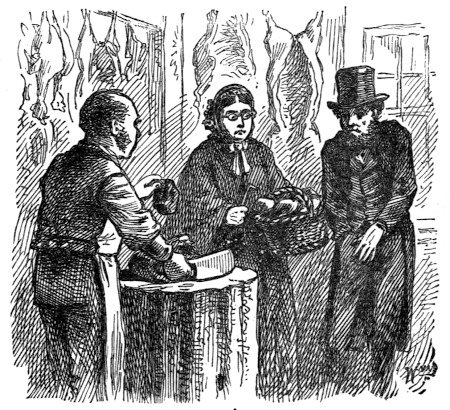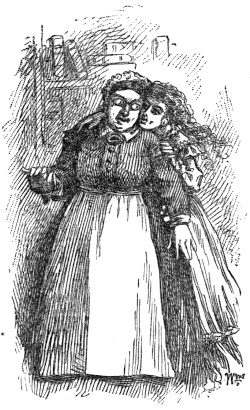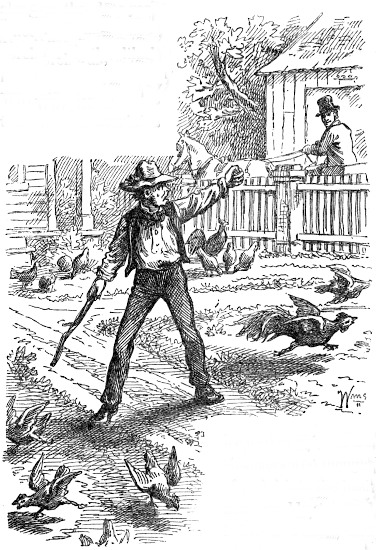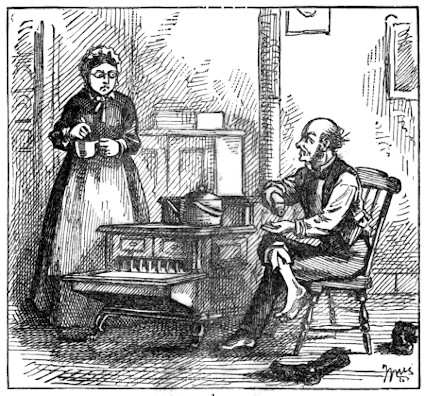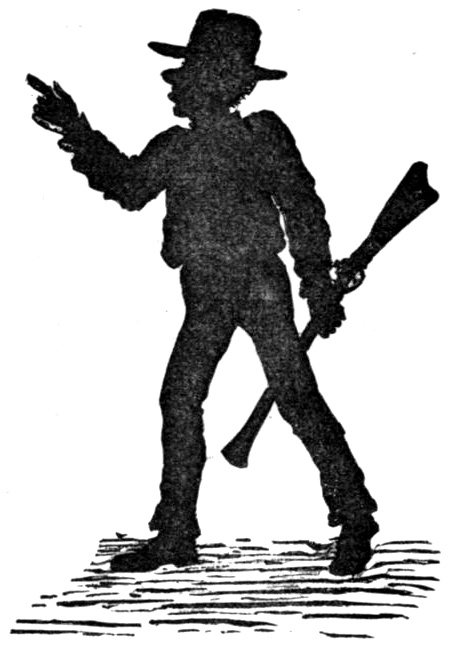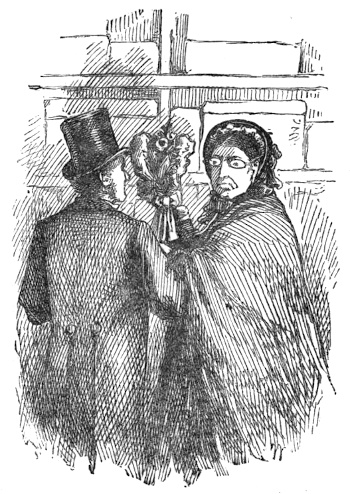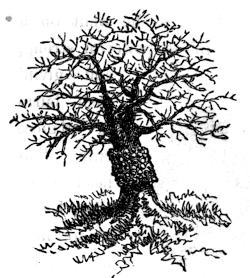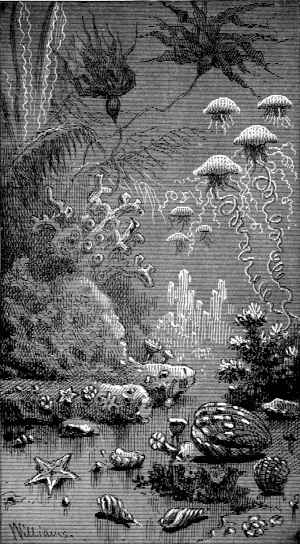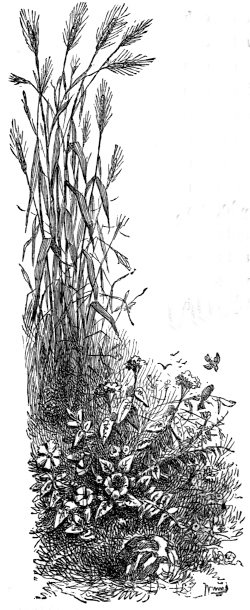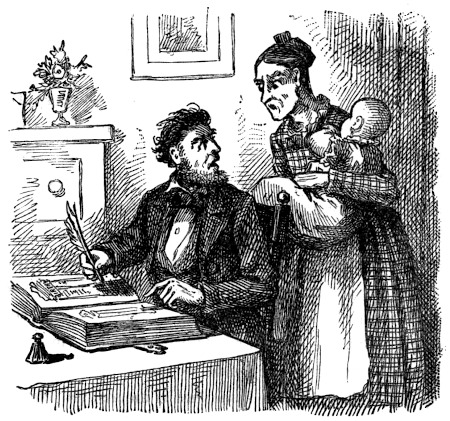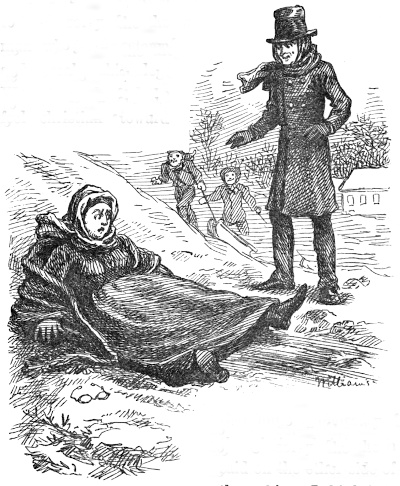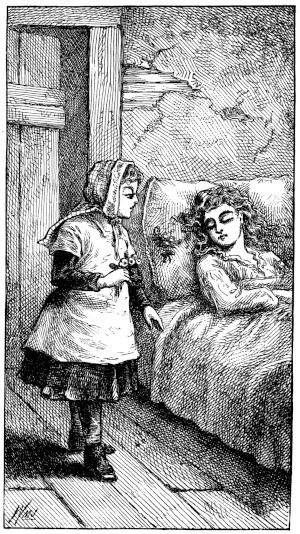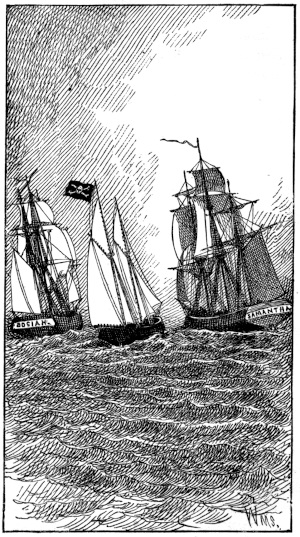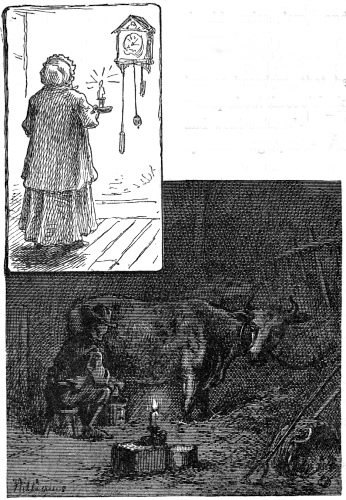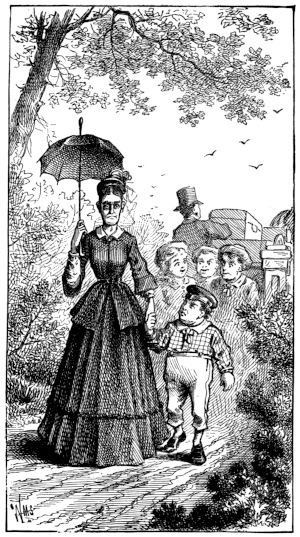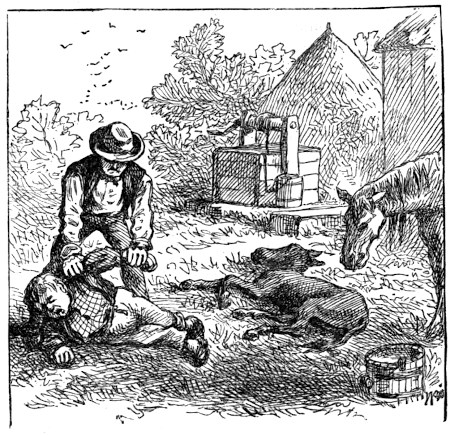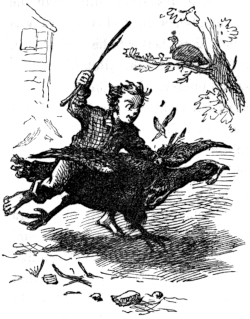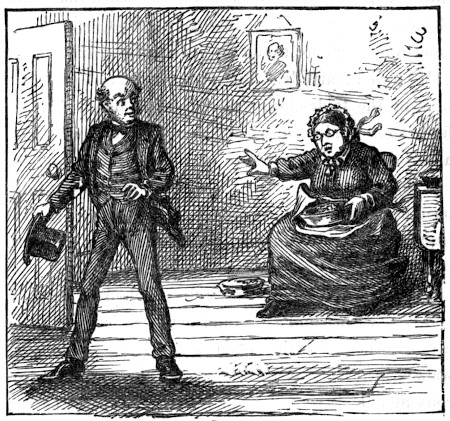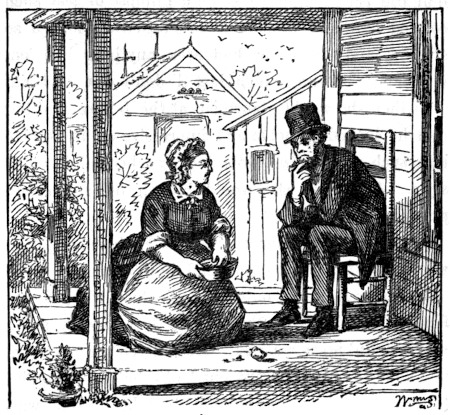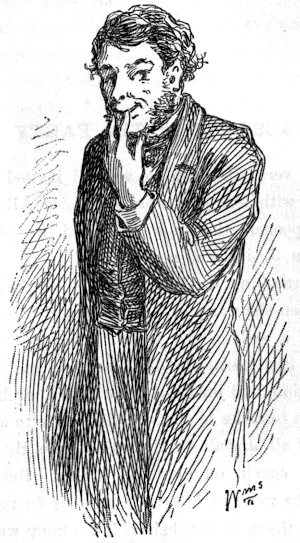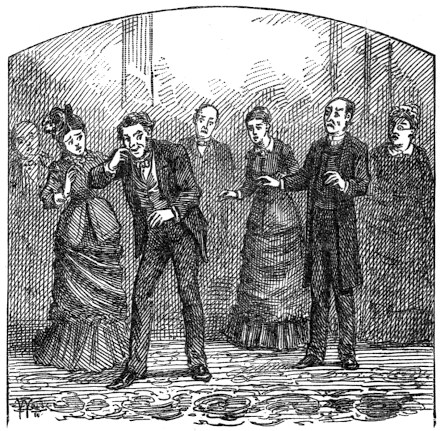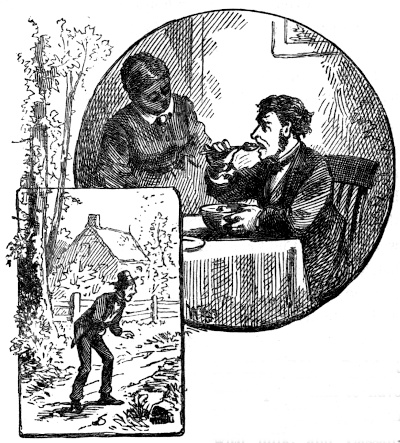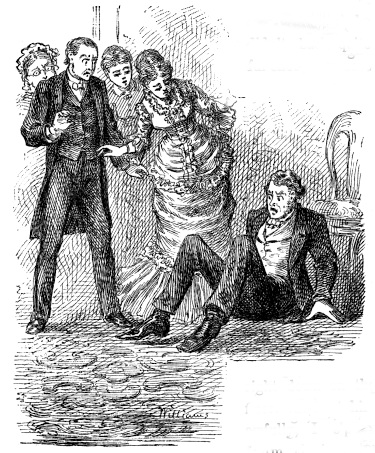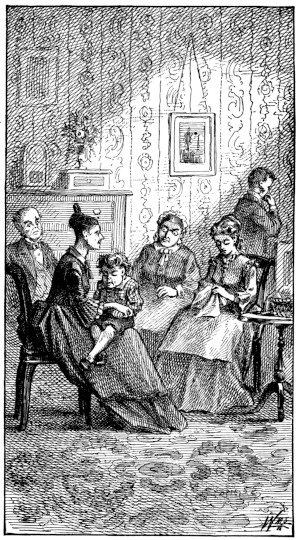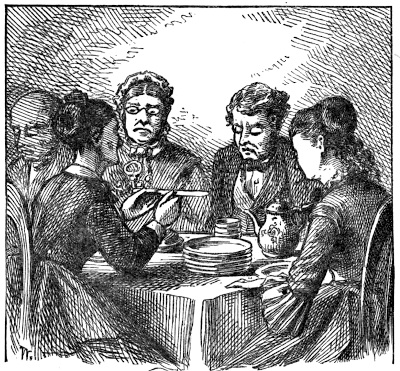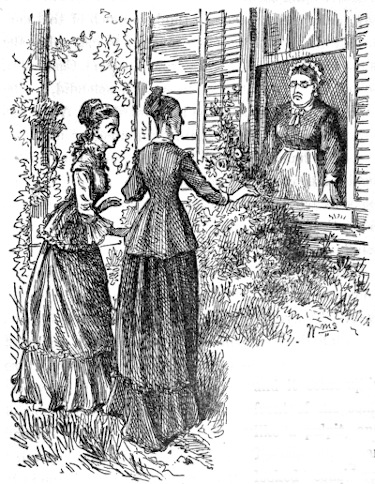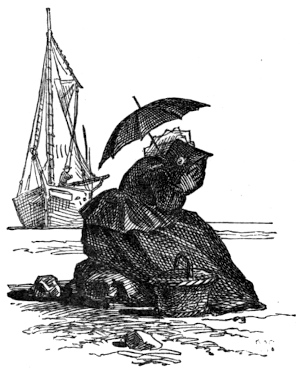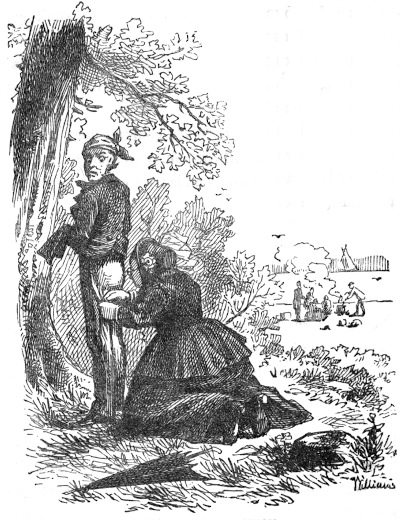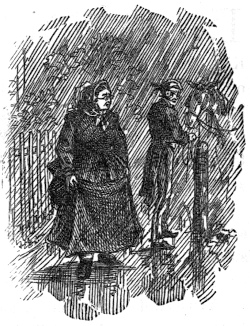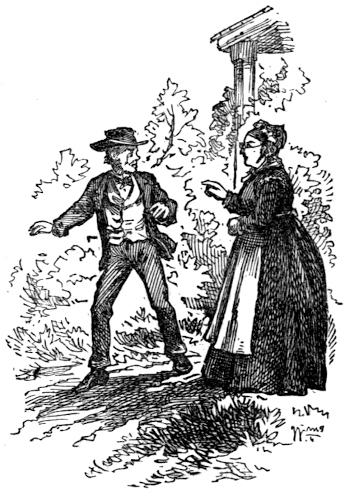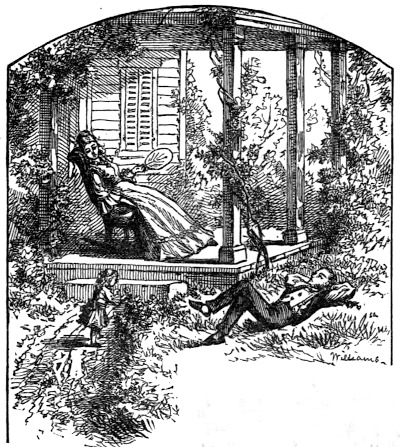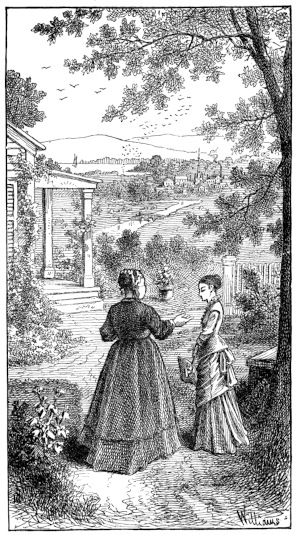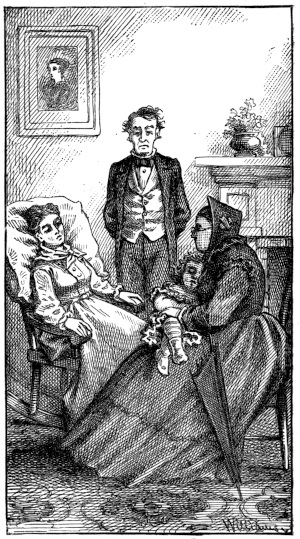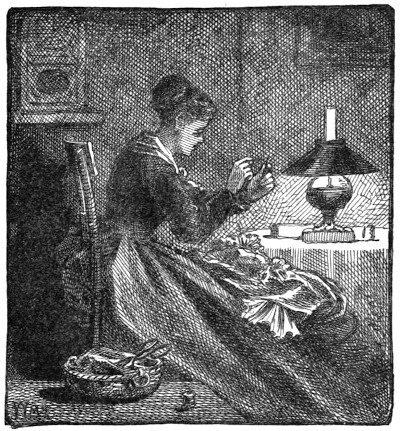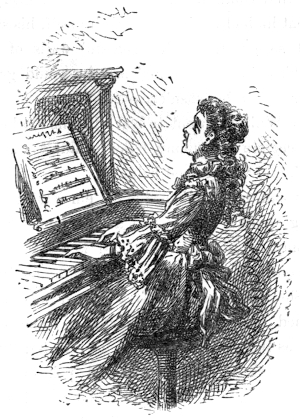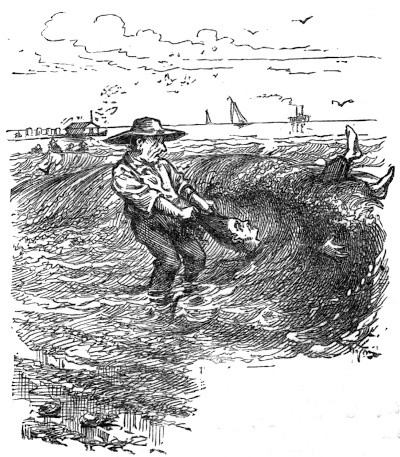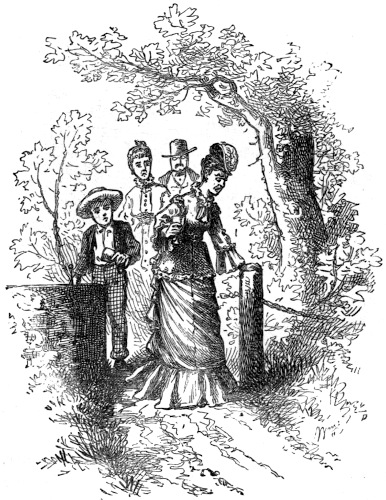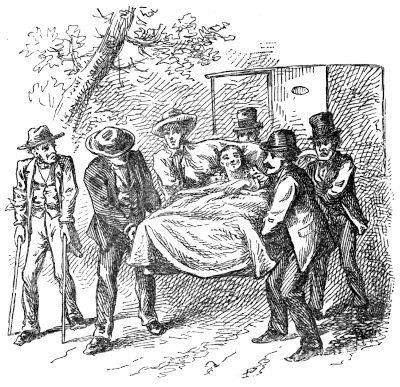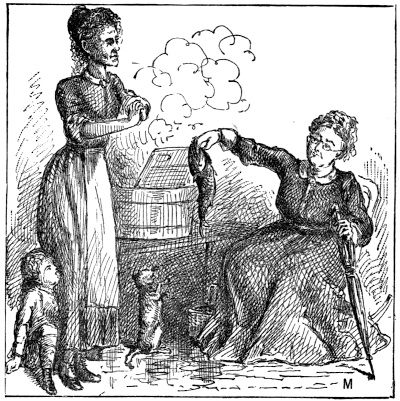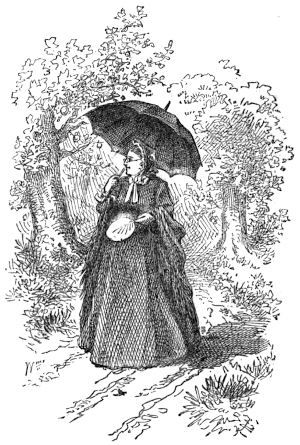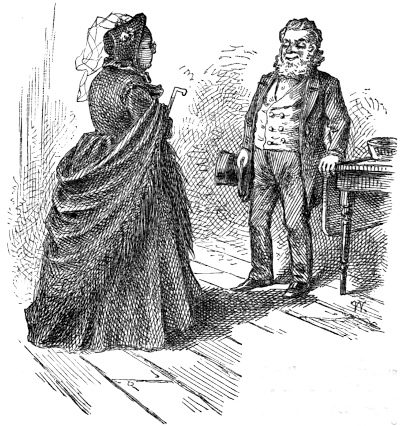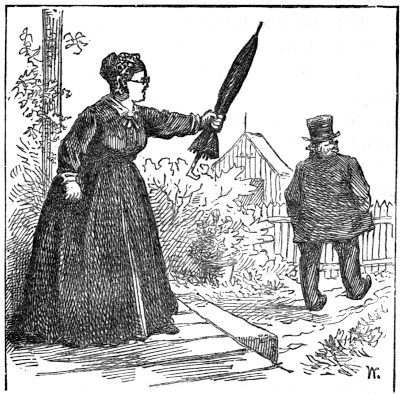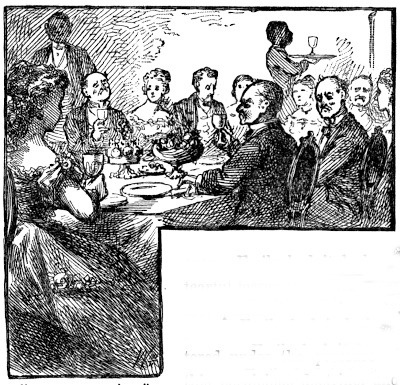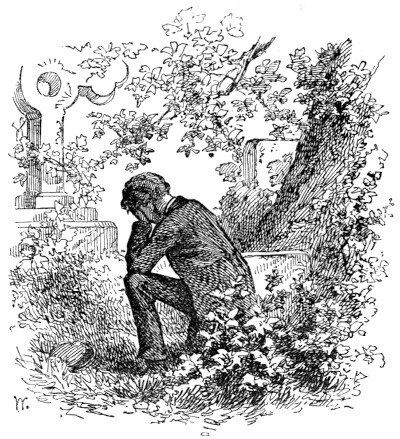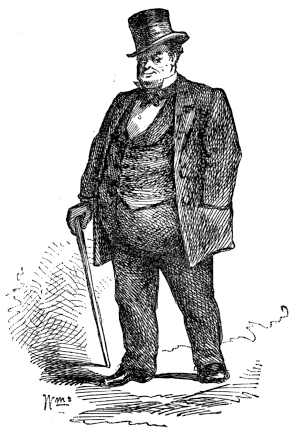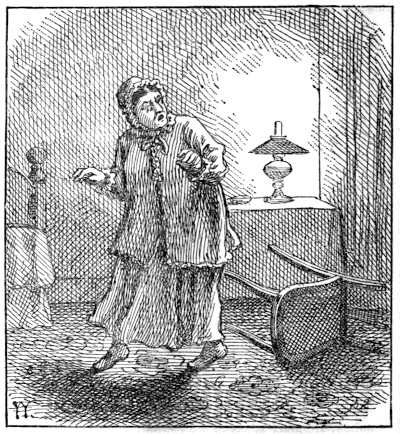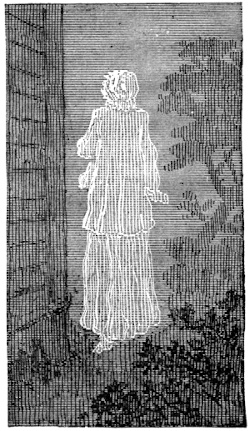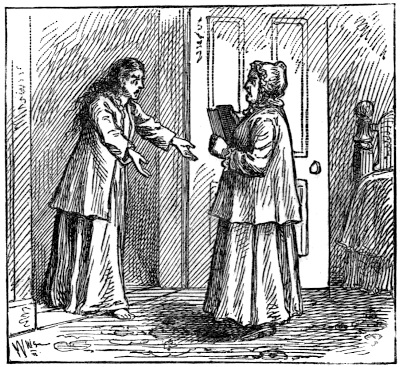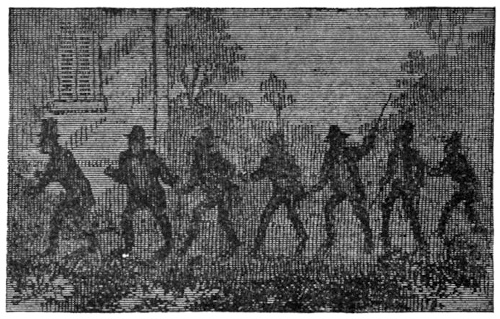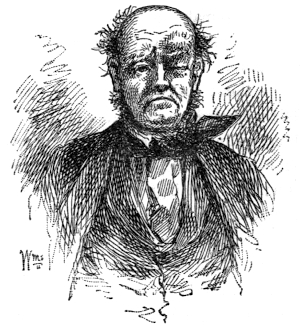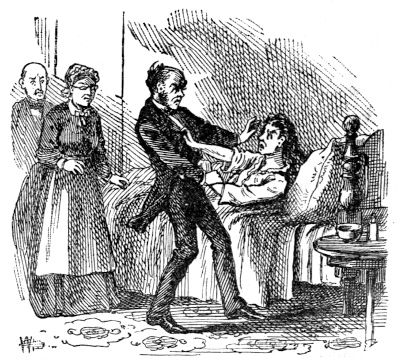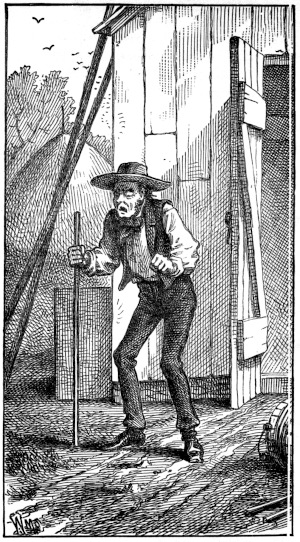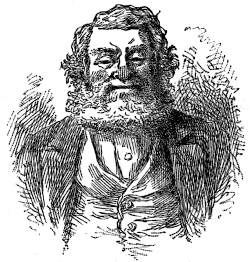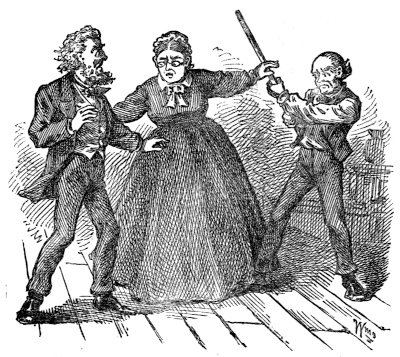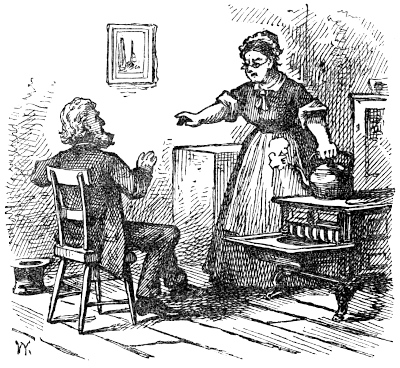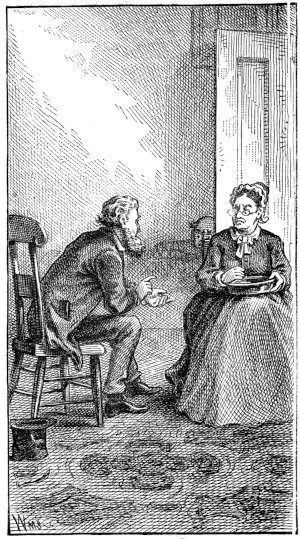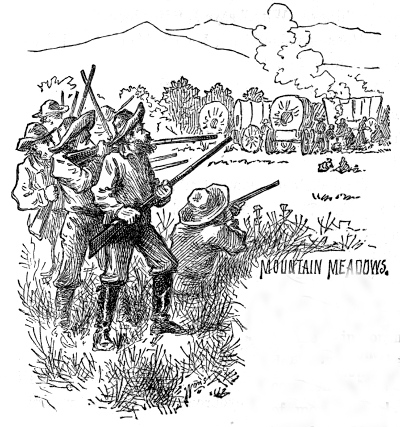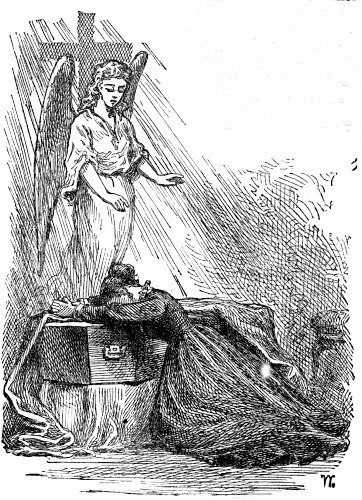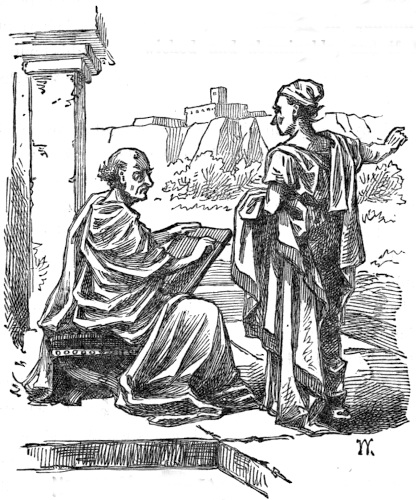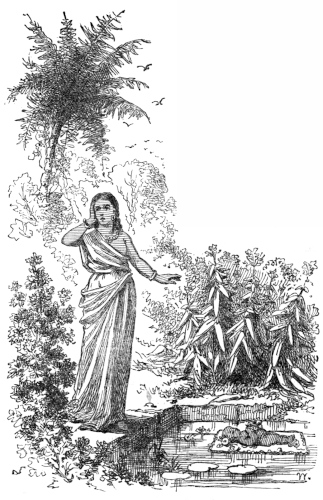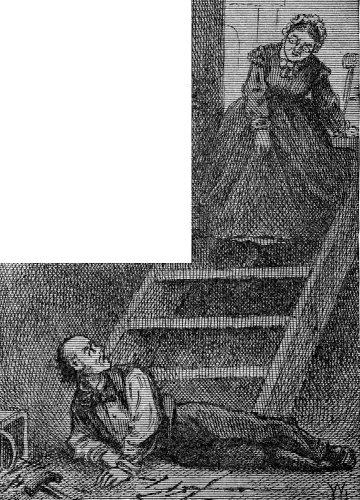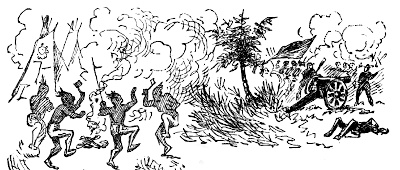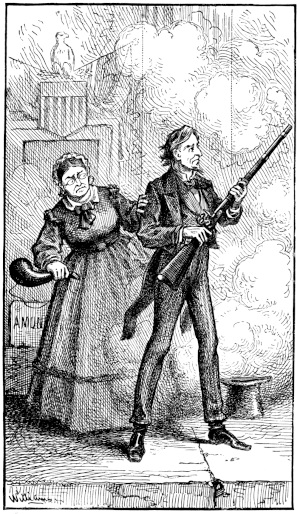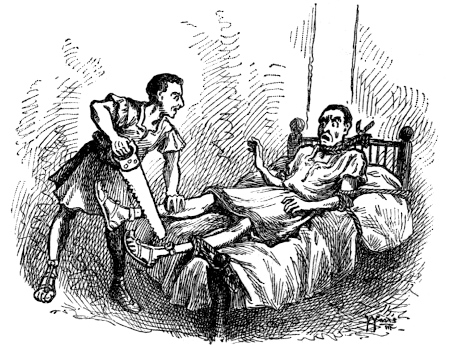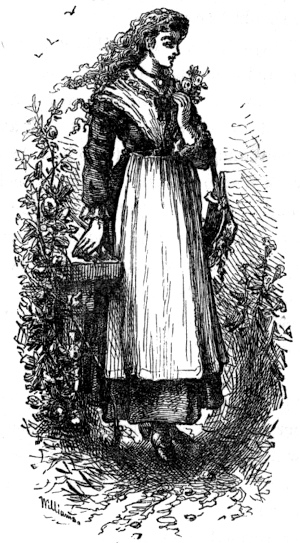*** START OF THE PROJECT GUTENBERG EBOOK 63859 ***
Illustrations have been moved to fall on paragraph breaks. Full page
illustrations, which take part in the pagination, have been moved
as well, and the two pages devoted to each were skipped.
Illustrations have each been moved to fall on an appropriate paragraph
break.
Minor errors, attributable to the printer, have been corrected. Please
see the transcriber’s note at the end of this text
for details regarding the handling of any textual issues encountered
during its preparation.
Any corrections are indicated using an underline
highlight. Placing the cursor over the correction will produce the
original text in a small popup.
Any corrections are indicated as hyperlinks, which will navigate the
reader to the corresponding entry in the corrections table in the
note at the end of the text.
MY WAYWARD PARDNER;
OR,
MY TRIALS
WITH
Josiah, America, The Widow Bump,
AND ETCETERY.
BY
JOSIAH ALLEN’S WIFE,
(Marietta Holley,)
Author of “My Opinions and Betsey Bobbet’s,” “Samantha at the
Centennial,” &c.
“Wimmen is my theme, and also Josiah.”
Illustrations by True W. Williams.
PUBLISHED BY SUBSCRIPTION ONLY.
HARTFORD, CONN.:
AMERICAN PUBLISHING COMPANY.
1882.
ICOPYRIGHT BY
MARIETTA HOLLEY.
1880.
(All rights reserved.)
TO JOSIAH AND AMERICA.
WITH THE HOPE THAT HE AND SHE BOTH WILL PUT THEIR
BEST FOOT FORWARD AND WALK OFF NOBLY IN
THE PATH OF RIGHT THIS BOOK
IS DEDICATED BY
THEIR AFFECTIONATE FRIEND AND WELL WISHER,
JOSIAH ALLEN’S WIFE
v
PREFACE.
I told Josiah that I guessed I would write a book about
several things—and wimmen. Says I, “My mind has been
dretful agitated lately about that certain lot of female wimmen
that are sufferin’ more than tongue can tell. Why,”
says I, “when I think of their agony and wrongs, it fairly
makes the blood bile in my veins. I love the female sect,”
says I firmly, “I am one of ’em myself.”
Says he (not wantin’ me to say a word about it), “Let
’em write about it themselves.”
Says I, “Josiah Allen, do you remember when you fell
down through the barn and broke your limb, and most
broke your other leg?”
“Yes,” says he, “but what of it?”
Says I, “What if I had stood still in the buttery winder,
and hollered at you to help yourself, and if you was in pain
to get out of it?”
“Well,” says he, “let ’em get some of their own folks to
do the writin’ then. They haint none of your folks, nobody
won’t expect nothin’ of you.” (He had reasons for not
wantin’ me to tell all I knew about certain things.)
viBut I says in solemn tones, “Do you remember that time
you fell, Josiah Allen, and I, bein’ bound down by rheumatizm,
couldn’t do nothin’ but blow the dinner-horn for
help, and Sam Snyder come on the run, and fetched you in,
and went after the doctor?”
“Throw that leg in my face, if you want to, but what of
it?”
Says I, “Them sufferin’ female wimmen are bound down
fur more painfully and gauling than you wuz. I haint the
strength to lift ’em up myself, but I am a goin’ to toot the
horn for help. I am a goin’ to blow through it powerful
breaths of principle and warnin’; and mebby another Samuel,
an uncle of mine, that I honor and admire, may hear
it, and start off on the run, and lift the hull of them poor
female wimmen up, out of their pain and humiliatin’ situation.
He can do it if he is a mind to,” says I, “as easy
as Sam Snyder lifted you, and easier, for he sweat powerful,
and most dropped you once or twice. And,” says I
firmly, “my mind is made up, Josiah Allen, I shall holler
for Samuel.”
“Wall, wall, holler away, for all I care.” He had
strong reasons for not wantin’ me to speak a word about
certain things, and his tone was very snappish, snappisher
than it had been for over seven weeks. But such trials do
great spirits no harm; no, it only lifts ’em up above their
own earthly peace and happiness, and sets ’em more firmly
and stiddily on their loftier spears.
I sithed, but I didn’t contend another word with him,
only jest that sithe, and then I commenced to write my
book.
vii
WHAT THE BOOK IS ABOUT.
| JOSIAH ALLEN GOES ASTRAY. |
| |
| A curious World and a curious Coincidence—Realms of Mystery—Josiah Acts queer and Sits on a Volcano—“Wait till Evenin’”—Widow Bump and Her Nutcakes are Discussed—How She Ruined the Tailors—A tedious Evening and a Night of Woe—Fearful Words from the sleeping Josiah—“The real Josiah, Where was He?”—A mysterious Sign—Firm Resolves—“Pardners Must Be Watched”—Duty Tackled—Josiah Stays at Home—Samantha’s powerful Weapons victorious, and the Widow Bump Forgotten |
19-51 |
| |
| KITTY SMITH AND CALEB COBB. |
| |
| A Visit from One of the Smiths Who is Poor and Proud—Kitty’s Secret, which Must Be Kept—Her Would-be Lover, and how She Encouraged Him—Sketch of Kellup the Hearse-driver and His Experiences with Hair dyes—Why He Didn’t Marry—Blamed by the Census-taker—How Nine Girls Lost Him—How He Killed Jane Sofier—The Death-Blow—His Warning to Women—Old Cobb and His Arguments—A Sermon by Samantha—The old, old Story Rehearsed—Kitty’s Kiss—Fun for Kitty |
52-89 |
| |
| JOSIAH GOES INTO BUSINESS. |
| |
| Josiah, Hankering for Speculation and Neighbors, Repairs the old House and Rents It to “a beautiful Family” from Zoar—Rumors that They were Smoked out—Josiah Feels neat, and Loves to Neighbor—So Do the Spinkses, Their Cow, and Their Hens—They Borrow Feather Beds, Pantaloons, and Pork—Their Twin “Takes to Him”—He Nurses the Twin, Sleeps with the Boys, Chases the Cow, and Takes “solid Comfort”; but “Gets mad” at last, and Meditates Murder—Summary Process—Adieu to the Spinkses |
90-118 |
| |
| viiiMORALIZIN’ AND EPISODIN’. |
| |
| Josiah Longs for more Speculation and Comes Home “as cross as a Bear”—An Epoch of History—The new Head-dress and how It Was Bought—Caleb Cobb’s Opinions thereof, and of extravagant Members of the Meetin’-house—Samantha Rejoins, Holding up Nature Wreathed in Beauty as a Pattern, and Advocating Charity toward both the Rich and the Poor—Two Sides to Everything—Naming the Baby—Caleb Changes the Subject, and Starts off to Borrow the Stun-bolt |
119-151 |
| |
| JOSIAH UNDERTAKES MORE BUSINESS. |
| |
| How old Ben Mandagool Made Money—Josiah Wants to do likewise, but Knowing Samantha will Object, Feels cross, Looks mauger, and at last Says He Wants to take Summer Boarders—Affection vs. Principle—Samantha Yields—Josiah Engages Boarders, and Figures out the Profits—A Competency at last!—“Get a Girl”—The Tip-toe of Expectation—Arrival of the Dankses—Tremendous Appetites—Victuals and Profits Disappear—The Secret out—More Trouble—A heavy Bill, and how he Flatted the Colt and Squshed the Grin’-stun—How They Made Ghosts and Were hard on the Tom Turkey—Night-walking and Historicks—Arrival of old Danks—The Crisis—Josiah’s Wrath—How He Scared Danks, and how Danks Scared him—Samantha Speaks of Matrimony and its Responsibilities, and Consoles all Matrimourners—A Lawsuit and its Result |
152-188 |
| |
| A VISIT FROM MISS RICKERSON. |
| |
| A windy Day—The Simons of the Desert—Good Advice to Women—Preparing for an Emergency—“Likely Creeters”—Now and then—Vain Experiments—The miscarried Letter—“She is Coming to-day!”—Arrival of Miss Rickerson, she that Was an Allen—Her flattering Tongue—How She Scared Caleb Cobb, Extolled the Spring Corset, and made Josiah Think he was handsome—Our four old Fathers and their chilly Blue Laws—“Praise your Friends while they Are Living”—Samantha Holds firm, but Cooks good Victuals, and Does well by Alzina Ann |
189-204 |
| |
| ixCASSANDRA’S TEA PARTY. |
| |
| History of Cassandra and her Misfortune—History of her bashful Husband, Nathan Spooner—Some of his Adventures and Experiences—How he Went hungry to Please Himself, and Feasted to Please Others—How he Courted CassandraCassandra—Scenes at the Wedding—The Tea-party, and how Alzina Entertained Nathan—“The Image of his Pa”—At the Tea-table, and how Nathan Said Grace—Untimely Remarks—Samantha to the Rescue—After Supper—Alzina Walks with Cassandra in the Garden—She Slanders Josiah and Calls him a “humbly Creeter”—Samantha Appears on the Scene—A Tableau—Sarcastic Remarks about People who Take Liberties with their Friends—Alzina’s Confession—The Walk homeward |
205-229 |
| |
| THE LORDS OF CREATION. |
| |
| Josiah Is proud and tickled because he Is a Man—His Opinion of “Wimmen”—What old Error Would do if They Made the Laws, and where York State Would Be—Samantha Points out a Monument of Man’s Economy and Wisdom with Her new Tow-mop—A Reminiscence—Under the Meetin’-house Shed—Guilt Arrayed in festal Robes to Lure the Unwary |
230-240 |
| |
| A EXERTION FOR PLEASURE. |
| |
| Josiah’s new “Idee,” which Samantha Discourages—The Folly of Chasing Pleasure—Exertion to the Lake Resolved on—Caleb Sacrifices his own Pleasure for the Welfare of the Fair Sect—He Is not Their Natural Enemy, but Can’t Marry Them all—Preparations—Early to Bed—Visitors, and a Conference Meetin’—“Galluses and Night Caps”—A Wild Night—Dreams—Josiah Wears T. Jefferson’s Uniform—The Start—Arrival at the Lake—How Twenty Old Fools “Sot Sail”—Overboard—Sea-sick and weak as Cats—On the Sand-Beach—Demoralized Vittles—Wasps and Muskeeters—Histing an Umbrell—Josiah Meets with Two Accidents, and Retires to Meditate—A Search for Josiah—Josiah Wears a Shawl and Looks meachin’—The Return to the Main-land, and Ride Homeward in the Rain—The Rheumatiz Takes Hold—“Is this Pleasure, Josiah Allen?” |
241-269 |
| |
| xA VISIT TO THE CHILDREN. |
| |
| “The Croup Is around”—A Slave to Conscience—Caleb Enquires about Kitty’s Health, and Decides that He May Marry Her—Why He Did not Write to Her, and why He Wore old Clothes—A Funeral at Log London—A Load of Company—The Start for Jonesville—Thomas J. and Maggie—Providence and the Weather—Arrival at Whitfield’s—A pretty Sight—Portraits of little Samantha Joe and Her Pa and Ma—The Sun and Sunflower—The Kiss of Welcome—A Talk with Tirzah Ann, Who Says They Are Going off for Rest and Pleasure—“Miss Skidmore Is Going, and all genteel People Go”—Samantha’s Advice, “Better Let Well Enough Alone,” is Rejected—Who need a Change of Scene and who do not—The Stiff-necked Miss Skidmore—Who Leads the Jonesville Aristocracy?—How Samantha Prescribed for her, and Was Winked out—“Burdock Won’t Help Her”—Proud Keturah Allen—Samantha’s Ideas of People who Put on Airs and Feel above Her |
270-302 |
| |
| TIRZAH ANN TO A WATERIN’ PLACE. |
| |
| How Tirzah Ann, Whitfield, and Samantha Joe, Went off for Rest, and how they Came back as poor as 3 Snails—Tirzah’s Story of her Experiences and Wrongs at Miss Skidmore’s Tavern—How She Resolved at Starting to outdo the Skidmores—How they Rested and Recreated—Midnight in the fourth Story of a Waterin’ Place—The young Man who Was Crossed in Love, and the young Maiden Who Owned a Melodeon—Wails of Woe—How the Baby Was Skairt into the Historicks—Bathin’, deep Water, Cramps and Drowndin’—Pulled out by the Hair—Too much Mineral Water—How Whitfield Played Polo (a Game Josiah Wants to Play) and Was Hit by a base Ball—How He Danced too much, and Got Disabled—Evenin’ Parties, Dancin’ and Flirtin’—The Worst of All; Tirzah’s dreadful Confession, Which must be Kept a Secret; “She Flirted with a Man!”—About Her Trouble with Whitfield in consequence, how He Was jealous, and how a Separation Was imminent—“Such Doins!”—Piles of Money Spent, and Morals Totterin’—Bought Wit is the best |
303-329 |
| |
| xiMISS BOBBET LETS THE CAT OUT. |
| |
| An old Acquaintance—Sorrows of Her domestic Life, and her great Consolation—The Dignity of Marriage—Simon’s horrible Horrors—A Present for Betsey—A Summer Evening’s Scene—Josiah and the high-tide Level of Love—The Stranger in the Kitchen—How He Looked, and What He Said—Why He didn’t Set down—He Calls for some Cider, and Persisting in his Demands, is Driven from the House at the Point of Samantha’s Umberel—Tobacco, and why People Use it—A Visit from Betsey, who Says the Intruder is Elder Judas Wart, Who is Sealed to Widder Bump, who has been Forwarded to Utah by Express—Betsey Tells about his disabled Wives, and about the Mormon Meetin’s in Jonesville—Shocking Disclosures—“Bobbet Went to ’em and so did Josiah Allen!”—Fearful Words—Samantha Groans aloud, and Feels Wicked—The Mormon Wimmen’s Appeal to Emily (She that was a Webb) and Samantha—A Woman to be proud of—Direlection in Duty—Samantha’s firm Resolve to be up and Doin’—She Hankers to Tackle Elder Wart and America, and Gets madder and madder |
330-354 |
| |
| A SERENADIN’ EPISODE, ETC. |
| |
| Betsey Bobbet’s new Poem, Entitled “A Wife’s Story,” and Published in the Gimlet—She Laments her Wedded Life and (although proud to Think she Married Simon) “to be a Widder is her Theme”—“Husbands are Tryin’,” and Simon’s Loss would be Betsey’s Gain—The pathetic Story of E. Wellington Gansey who Came from the Ohio to Visit his Childhood’s Home—He is Welcomed by His early Playmates, Has a good Time, and Resolves to Move back to Jonesville—Josiah and Others Are so elated that They Go to Serenade Him—Samantha, Left alone in the House, Has exciting Experiences—She Hears Noises, Gets Skairt, and Expects to be Burgled and Rapined—She is finally Appeared to and Talks with the Ghost—Poor Tamer Mooney and Her horrible Words—“Bloody Indians, Yells, and Tomyhawks!”—Rousting the Neighbors—Reappearance of Josiah—What Hit Him—What Hit Old Bobbet—What Hit the Editor of the Augur—What Hit Old Gansey, etc.—Eliab leaves His Childhood’s Home, and Starts for the Ohio by the first Train |
355-396 |
| |
| xiiJUDAS WART AND SUFFERIN’ WOMEN. |
| |
| Josiah has a Stitch, Comes in on a Broom-handle, and is Made comfortable—The Elder Wart also Comes in, Seems dreadful Tickled, and Makes some complimentary Remarks—Josiah Overhears them, and Forgets his “Stitch”—Samantha Rescues the Elder, who, in retaliation, Twits Josiah about “a certain Widder” to whom He Had Been partial—Josiah Denies the Imputation and Gets luny—His strange Hallucination, and Memories of his Childhood—Samantha, being again “Approached” by the Elder, Gets mad and Threatens him with the Tea-kettle—He Wants to “Argue,” and Samantha Tackles Him—What Mormons Worship—Who they Rob and Murder—What they Covet, and Get, too—The Wretchedness of Mormon Wimmen, and especially of Wife No. 1—Ruined Morals—Beelzebub’s own Timber—A Voice from Old Babylon and the Turkey—No Acquaintance with Thalos and Mr. Plato—The Elder Gets “Sassy,” and Samantha Declares She Will Appeal to her Uncle Samuel, who, though a little distracted and run down by his domestic Troubles, Can and Will Stop Mormonism—The Elder’s parting Shot, which Josiah Resents by an Attack in the Rear—“A skairter Man never Lived” |
397-469 |
| |
| A CRISIS WITH KELLUP. |
| |
| Kitty Departs, and Kellup Calls to See her 5 Minutes afterward—He is greatly Depressed—“Wimmen is what’s the Matter”—He is sorry for Kitty, and says he will Write to her—On Reflection he Authorizes Samantha to tell her he Will Marry her whether or no, even if She is poor—Remembring Sofier’s Fate, he “Dassent” do an Errand at Marier’s House—A Visit from Cassandra and her young Babe—How Nathan Treated his Heir—A mysterious Decree—Thrillin’ News—Kitty Smith Disappears from the Scene—So Does Miss Smith the Elder—So Does Wart (the Elder)—So Does Kellup and the Hearse—A pastoral Scene—Samantha, Reclining by the Brook-side, Listens to a Bird as he Sings and Swings; Watches the Sky and Golden-rod Reflected in the Stream; Meditates on the Old and the New, the Steadfast and the Changing; and Thinks how swift the Water is a Runnin’ toward the Sea |
470-490 |
xiii
THE PICTURES
MR. WILLIAMS HAS MADE.
| |
|
|
Page |
| 1. |
Frontispiece |
(Full Page) |
|
| 2. |
“The Tedious Evening Waned Away” |
(Full Page) |
18 |
| 3. |
Portrait of the Widder Bump |
|
24 |
| 4. |
An Ideal Family |
(Full Page) |
28 |
| 5. |
Measured by the Widder |
|
32 |
| 6. |
Josiah Dreaming |
|
36 |
| 7. |
Those “Awful Words” |
(Full Page) |
40 |
| 8. |
A Solemn Warning |
|
42 |
| 9. |
Josiah’s Disappointment |
|
47 |
| 10. |
Kitty Smith |
(Full Page) |
54 |
| 11. |
Kellup |
|
59 |
| 12. |
The Woman Question |
|
63 |
| 13. |
The Deserted |
|
65 |
| 14. |
Paying Her Way |
|
67 |
| 15. |
How Jane was Roped in |
(Full Page) |
69 |
| 16. |
The Death-blow |
|
71 |
| 17. |
A Judgment Seat |
|
7474 |
| 18. |
Swingin’ Out |
|
83 |
| 19. |
A Cob(b) Without Corn |
(Full Page) |
85 |
| 20. |
Kitty’s Kiss |
|
87 |
| 21. |
Josiah Feels Neat |
|
93 |
| 22. |
Arrival of the Spinkses |
|
97 |
| 23. |
Yoked but not Mated |
(Full Page) |
100 |
| 24. |
Josiah Neighbors |
|
102 |
| 25. |
Borrowin’ Josiah |
|
106 |
| 26. |
Spinks’es Cow—A Night Scene |
(Full Page) |
108 |
| 27. |
Our Hen-dairy |
|
110110 |
| 28. |
Josiah’s Vow |
|
117 |
| 29. |
Danger Ahead |
|
118 |
| 30. |
The new Head-dress |
|
121 |
| 31. |
Apple Blossoms |
|
123 |
| 32. |
How it might have been |
|
124 |
| 33. |
Hard at it |
|
126 |
| xiv34. |
Nature’s Ocean Boudoir |
(Full Page) |
129 |
| 35. |
Nature’s Work |
|
131131 |
| 36. |
Baby Piller Case |
|
135 |
| 37. |
Feeling Christian |
|
137137 |
| 38. |
“Blessings on Them all” |
(Full Page) |
141 |
| 39. |
A Heavenly Messenger |
|
143 |
| 40. |
The wreathed Spear |
|
145 |
| 41. |
A Guiding Hand |
|
150 |
| 42. |
“What’s the Matter, Josiah?” |
|
154 |
| 43. |
A Poetical Simely |
(Full Page) |
158 |
| 44. |
Josiah’s Idee |
|
161 |
| 45. |
Early Birds |
|
162162 |
| 46. |
Our Boarders |
(Full Page) |
165 |
| 47. |
A Surprised Colt |
|
170 |
| 48. |
Exercising the Gobbler |
|
172 |
| 49. |
A Heavy Bill |
(Full Page) |
176 |
| 50. |
“Shut that Door” |
|
192 |
| 51. |
Arrival of Miss Rickerson |
|
196 |
| 52. |
Kellup’s Conundrum |
|
202 |
| 53. |
Nathan Spooner |
|
206 |
| 54. |
Nathan Snickers |
|
207 |
| 55. |
Pudding and Milk |
|
209209 |
| 56. |
The Family Night-cap |
(Full Page) |
211 |
| 57. |
“Nathan Sot Down” |
|
214214 |
| 58. |
Cassandra’s Misfortune |
(Full Page) |
217 |
| 59. |
Bad for Nathan |
|
222 |
| 60. |
Face to Face |
|
226162 |
| 61. |
A Monument of Men’s Economy |
|
233233 |
| 62. |
On the Ragged Edge |
|
236 |
| 63. |
Under the Meeting-house Shed |
(Full Page) |
238 |
| 64. |
Routed out |
|
246 |
| 65. |
“Murder Will out” |
|
247 |
| 66. |
Samantha’s Dream |
(Full Page) |
249 |
| 67. |
Facing Trouble |
(Full Page) |
253 |
| 68. |
Bound for the Island |
|
255 |
| 69. |
On the Beach |
|
257 |
| 70. |
Discouraged Excursionist |
(Full Page) |
260 |
| 71. |
A Desperate Situation |
|
264264 |
| 72. |
Homeward Bound |
(Full Page) |
267 |
| 73. |
The End of the Exertion |
|
269 |
| 74. |
Moving Josiah |
|
271 |
| 75. |
Dressed for the Occasion |
|
274274 |
| xv76. |
A Roadside Visit |
(Full Page) |
279 |
| 77. |
A Happy Home |
|
281281 |
| 78. |
Little Samantha Joe |
|
283 |
| 79. |
Josiah Still |
|
286 |
| 80. |
The Annual Turnout |
(Full Page) |
289 |
| 81. |
Mrs. Skidmore |
|
292 |
| 82. |
Keturah Allen |
|
295 |
| 83. |
View of Jonesville |
(Full Page) |
300 |
| 84. |
“A Pitiful Sight” |
(Full Page) |
306 |
| 85. |
Keepin’ Up Her End |
|
309 |
| 86. |
Midnight at a Watering-place |
(Full Page) |
312 |
| 87. |
Wail of Woe |
|
314 |
| 88. |
Quavers and Shakes |
|
316 |
| 89. |
Doin’ Their Level Best |
|
318 |
| 90. |
How Josiah Would Play Polo |
(Full Page) |
320 |
| 91. |
The Rescue |
|
323323 |
| 92. |
“It Tasted awfully” |
|
324 |
| 93. |
A Sad Scene |
|
325 |
| 94. |
Tirzah Ann Flirts With a Man |
(Full Page) |
327 |
| 95. |
A Present for Betsey |
|
331 |
| 96. |
Friendly Feelin’s |
|
332 |
| 97. |
Meeting the Elder |
|
355355 |
| 98. |
A Threatnin’ Attitude |
|
341 |
| 99. |
Miss Bobbet Tells About Josiah |
(Full Page) |
344 |
| 100. |
“A Rarity to ’em” |
|
348348 |
| 101. |
Bobbet and Josiah Talkin’ |
|
352 |
| 102. |
Old Toil’s Bride |
(Full Page) |
357 |
| 103. |
The Wild-Eyed Woman |
|
363 |
| 104. |
No Answer |
|
367 |
| 105. |
E. Wellington Gansey |
|
370 |
| 106. |
Burglers |
|
379 |
| 107. |
The Ghost |
|
380 |
| 108. |
Tamer Mooney |
|
383 |
| 109. |
The Serenading Party |
|
384 |
| 110. |
The Bruised Josiah |
|
387 |
| 111. |
The Serenade |
(Full Page) |
390 |
| 112. |
“Mandana! Mandana!” |
|
395 |
| 113. |
A Stitch in the Back |
(Full Page) |
398 |
| 114. |
Elder Judas Wart |
|
400 |
| 115. |
Rescuing the Elder |
|
401 |
| 116. |
Hot Water |
|
407 |
| 117. |
“Less Argue” |
(Full Page) |
409 |
| xvi118. |
Mountain Meadows |
|
417417 |
| 119. |
An Angel of Peace |
|
430430 |
| 120. |
Mr. and Mrs. Plato |
|
436 |
| 121. |
The Hindoo Mother |
|
441441 |
| 122. |
A Fallen Angel |
|
443443 |
| 123. |
The Old Man |
|
450 |
| 124. |
Our Distracted Uncle |
|
453453 |
| 125. |
The Call to Duty |
(Full Page) |
455 |
| 126. |
Helps for the Heathen |
|
457 |
| 127. |
Josiah Ends the Argument |
(Full Page) |
464 |
| 128. |
Departure of the Elder |
|
467 |
| 129. |
Takin’ a Reef |
|
475 |
| 130. |
Marier Burpey |
|
480 |
| 131. |
“Do You Want a Pair of Boots?” |
|
484 |
| 132. |
Thrilling News |
(Full Page) |
486 |

“THE TEDIOUS EVENING WANED AWAY.”
19

JOSIAH ALLEN GETS ASTRAY.
I have said, and said it calmly, that this is the
curiousest world I ever see in my life. And I
shan’t take it back. I hain’t one to whiffle round and
dispute myself. I made the statement cool and firm,
and shall stand by it. And truly if I never had said
or thought anything of the kind, what I see with my
own eyes last Friday night, and heard with my own
ear before mornin’ dawned, would have convinced me
that I was in the right on’t.
It’s happenin’ on a Friday, too, was strange as
anything could be strange. It was on Friday that
Mr. Columbus discovered the New World, and it was
on a Friday (though some time after) that I discovered
new regions in my pardner’s mind. Realms of
mystery, full of strange inhabitents. That Christopher
and me should both make such startlen and
momentious discoveries on the same day of the week
is a coincidence curious enough to scare anybody most
to death.
20Yes, this world is a curious place, very, and holler,
holler as a drum. Lots of times the ground seems to
lay smooth and serene under your rockin’ chair, when
all the time a earthquake may be on the very p’int of
busten’ it open and swollerin’ you up—chair and all.
And your Josiah may be a-settin’ right on top of a
volcano, unbeknown to you. But I am wanderin’ off
into fields of poesy, and to resoom and proceed.
It was along the latter part of winter, pretty nigh
spring, when my companion Josiah seemed to kinder
get into the habit of going to Jonesville evenin’s.
When I would beset him to go and get necessaries,
groceries, and etcetery, he would say:
“Wall, I guess I’ll wait till evenin’, and then I’ll
hitch up and go.”
He’d done it a number of times before I noticed it
in particular, bein’ took up alterin’ over my brown
alpacka, and bein’ short on’t for pieces and strained
in my mind whether I would get out new backs without
piecin’ ’em acrost the shoulder-blades. I don’t
get much time to sew, bein’ held back by housework
and rheumatiz, and the job had hung on, and wore on
me powerfully, body and mind. Wall, every day or
two he would make that curious remark, without my
noticin’ of it (as it were):
“Wait till evenin’, and I’ll hitch up and go.”
And I wouldn’t say nothin’’, and he’d go, and
wouldn’t get back till nine o’clock or after. Wall, as
time went on, and my mind grew easier about my
21dress (I concluded to take the overskirt and make
new backs and sleeves, and I got it cut foamin’, could
have cut it profuse and lavish, if it had been my way),
and my mind bein’ onstrained, and noticin’ things
more, I thought it looked sort o’ peculier that Josiah
should be so uncommon willin’ to go to the store evenin’s
for necessaries and things, when he had always
been such a case to stay to home nights; couldn’t get
him out for the Doctor hardly. Collery morbeus
couldn’t hardly start him, nor billerous colic.
It was on that Friday night after Josiah had started,
that I, havin’ finished my dress, sot there a knittin’,
and my mind bein’ sot free, it got to thinkin’ over
things. Thinkin’ how I told him that mornin’ that
the tea was a-runnin’ out, and I should have to have
some that day, and he says:
“Wall, after supper I’ll hitch up and go.”
And I says to him sort o’ mechanically (for my
mind was almost completely full of alpacka and waist
patterns—I had concluded late the night before to
take the overskirt):
“What has come over you, Josiah Allen? I
couldn’t never use to get you out nights at all.”
He didn’t explain, nor nothin’, but says agin, in
that same sort of a curious way, but firm:
“You make the tea last through the day, Samantha,
and to-night I’ll hitch up and go.”
And then he beset me to have a chicken pie for
dinner, and I, bein’ in such a hurry with my sewin’,
22didn’t feel like makin’ the effort, and he told me I
must make it, for he had had a revelation that I
should.
Says I, “a revelation from who?”
And he says, “From the Lord.”
And I says, “I guess not.”
But he stuck to it that he had. And I finally told
him, “that if it was from the Lord he would probable
get it, and if it wuzn’t, if it wuz as I thought, a revelation
from his stomach and appetite, he most probable
wouldn’t get it.” And I kep’ on with my sewin’. I
laid out to get a good, wholesome dinner, and did.
But I couldn’t fuss to make that pie, in my hurry.
His revelation didn’t amount to much. But it was
curious his talkin’ so—awful curious.
I got to thinkin’ it all over agin as I sot there
a-knittin’, and I felt strange. But little, little did I
think what was goin’ on under my rockin’-chair, unbeknown
to me.
About half past 7 Josiah Allen got home. I asked
him what made him come so soon, and he said sunthin’,
as he took off his overcoat, about there not bein’
no meetin’ that night, and sunthin’ about the Elder
bein’ most sick. And I s’posed he meant conference
meetin’, and I s’posed he meant Elder Bamber. But
oh! if I had only known who that Elder was, and
what them meetin’s was, if I had only known the
slippery height and hollerness of the volcano Josiah
Allen was a-sittin’ upon, unbeknown to me! But I
23didn’t know nothin’ about it, and so I sot there, calm
and serene in my frame, for my mind bein’ onharnessed,
as I may say, speakin’ in a poeticule way, from
the cares it had been a-carryin’, I felt first rate. And
so I sot there a-knittin’, and Josiah sot by the stove
seemin’ly a-meditatin’. I thought likely as not, he
was a-thinkin’ on religious subjects, and I wouldn’t
have interupted him for the world. But pretty soon
he spoke out sort ’o dreamily, and says he:
“How old should you take the Widder Bump to be,
Samantha?”
“Oh, about my age, or a little older, probable,”
says I. “What makes you ask?”
“Oh, nothin’,” says he, and he sort o’ went to whistlin’,
and I went on with my knittin’. But anon, or
mebby a little before anon, he spoke out agin, and
says he:
“The Widder Bump is good lookin’ for a widder,
hain’t she? And a crackin’ good cook. Sometimes,”
says he in a pensive way, “sometimes I have almost
thought she went ahead of you on nutcakes.”
Her nutcakes was pretty fair ones, and midelin’
good shaped, and I wuzn’t goin’ to deny it, and so I
says:
“What of it, Josiah? What if she duz?”
There hain’t a envious hair in my head (nor many
gray ones for a woman of my age, though I say it that
shouldn’t). I hain’t the woman to run down another
woman’s nutcakes. My principles are like brass, as
24has been often remarked. If a woman can make
lighter nutcakes than I can (which, give me good
flour and plenty of sour cream, and eggs, and other
ingregiencies, I shall never believe they can)—why,
if they can, runnin’ down their nutcakes don’t make
mine any higher up. There is where folks make a
mistake—they think that runnin’ other folks down
lifts them higher up; but it don’t, not a inch.
So I kep’ on
knittin’, cool
as the heel of
the sock I was
knittin’ on.
Pretty soon
Josiah broke
out agin:
“The Widder
Bump
hain’t got no
relations, has
she, Samantha,
that
would be a
kinder hangin’ on, and livin’ on her, if she should
take it into her head to marry agin?”
“I guess not,” says I. “But what makes you ask,
Josiah?”
“Oh, nothin’, nothin’ in the world. I hadn’t no
reason in askin’ it, not a single reason. I said it,
25Samantha,” says he, speakin’ in a sort of a excited,
foolish way, “I said it jest to make talk.”
And agin he went to whistlin’, strange and curious
whistles as I ever heard, and haulin’ a shingle out of
the wood-box, he went to whittlin’ of it into as strange
shapes as I ever see in my life. I looked at him pretty
keen over my specks, for I thought things was goin’
on kinder curious. But I only says in a sort of a dry
tone:
“I am glad you can think of sunthin’ to say, Josiah,
if it hain’t nothin’ but widder. Howsumever,” says I,
speakin’ in a encouragin’ tone, seein’ how dretful
meachin’ he looked, and thinkin mebby I had been too
hard on him, “Widder is better than no subject at all,
Josiah, though I don’t call it a soarin’ one. But I
can’t see,” says I, lookin’ at him uncommon keen over
my specks, “I can’t see why you foller it up so awful
close to-night. I can’t see why the Widder Bump is
a-runnin’a-runnin’ through your mind to-night, Josiah Allen.”
“Oh! she hain’t! she hain’t!” says he, speakin’ up
quick, but with that dretful meachin’ and sheepish
look to him.
“I am a talkin’ about her, Samantha, jest to pass
away time, jest to make myself agreeable to you.”
“Wall,” says I, in a dryer tone than I had hitherto
used, “don’t exert yourself too hard, Josiah, to make
yourself agreeable. You may strain your mind beyond
its strength. I can stand it if you don’t say nothin’
more about the Widder Bump. And time,” says I, “I
26guess time will pass away quick enough without your
takin’ such pains to hurry it along.”
And then I launched out nobly on that solemn
theme. About time, the greatest of gifts; how it
come to us God-given; how we ort to use it; how we
held our arms out blindly, and could feel the priceless
treasure laid in ’em, close to our hearts, unbeknown to
us; and how all beyond ’em was like reachin’ em out
into the darkness, into a awful lonesomeness and
emptiness; how the hour of what we called time was
the only thing on God’s earth that we could grip holt
of; how it was every mite of a standin place we could
lift the ladder on for our hopes and our yearnin’s, our
immortal dreams to mount heavenward; how this
place, the Present, was all the spot we could stand on,
to reach out our arms toward God, and eternal safety,
and no knowin’ how soon that would sink under us,
drop down under our feet, and let us down into the
realm of Shadows, the Mysterious, the Beyond. “And
still,” says I, “how recklessly this priceless treasure
is held by some; how folks talk about its bein’ too
long, and try to get ways to make it go quicker, and
some,” says I, dreamily, “some try to make it pass off
quicker by talkin’ about widders.”

I don’t think I had been more eloquent in over five
weeks, than I was in talkin’ upon that theme. I was
very eloquent and lengthy, probable from ¼ to ½ an
hour. I talked beautiful on it. A minister would
have said so if he had heard me, and he would have
29been likely to thought highly of it, and my gestures,
for the waves that I waved outwards with my right
hand was impressive, and very graceful. I held the
sock in my right hand, as I waved it out; it was a
good color, and it floated out some like a banner. I
felt well, and acted well, and I knew it. And I thought
at the time that Josiah knew it, and was proud of me,
and felt more affectionate to me than his common
run of feelin’s towards me wuz, for most the minute I
got through episodin’, he broke out, and says he:
“Don’t you think you are a workin’ too hard,
Samantha? Don’t you think it would be easier for
you if you had some woman here a livin’ to help you?
And,” says he, dreamily, “she might be a fryin’ the
nutcakes while you was a brilin’ the beef-steak, and
cookin’ other provisions.”
I was exceedingly affected by his tender feelin’s
towards me, (as I supposed,) and says I, in affectionate
axents:
“No, I can get along, Josiah.”
But oh! if I had known! If I had known what
thoughts was a runnin’ through his mind, how different
my axent would have been. My axent would have
been so cold it would have froze him stiffer’n a mushrat,
jest one axent would, it would have had that
deadly icyness to it. Blind bein’ that I was, a speakin’
tender and soft to him, and knittin’ on his heel, (a
double stitch, too, to make it firmer,) and he a settin’
of his own accord up on top of that volcano that was
30ready to bust right out, and burn up all my happiness,
and swaller down and engulf my Josiah. What feelin’s
I felt as I thought it all over afterwards.
Wall, I sot there a knittin’ on his heel, and occasionally
makin’ eloquent and flowery speeches, and he,
from time to time, a speakin out sudden and sort o’
promiscous, a praisin’ up the Widder Bump, and sort
o’ mixin’ her up with religion, and seals, and revelations,
and things, and anon, when I would take him to
do about it, a whistlin’, and whittlin’ shingles into
curious and foolish shapes, curiouser than I ever remembered
to see him whittle, and whistlin’ more sort
o’ vacant and excentrick whistles than I ever remembered
hearin’ him whistle—dretful loud whistles, some
of ’em, and then dwindlin’ down sudden and unexpected
into low and dwindlin’ ones. And I a wonderin’
at it, and thinkin’ things was a goin’ on strange
and curious. And then anon, or about that time, or
anyway, as soon as I would have time to meditate on
men’s curious and foolish demeanors at times—why I
would give up that it was one of their ways, and he
would get over it, knowin’ that they mostly did get
over ’em.
And so the long, tejus evenin’ waned away. And
Josiah locked the doors, and wound up the clock, and
greased his boots, and went to bed. But oh! little did
I know all the while he was a windin’ and a greasin’,
and I a knittin’, and the carpet seemed to lay smooth
and straight under us, all the time a earthquake was a
31rumblin’, and, to use a poetical and figurative expression,
a snortin’ down under us, unbeknown to me.
Wall, that night my pardner, Josiah Allen, at two
different times, once about midnight, and once about
the time the roosters crowed—at two separate times,
which I am ready to testify and make oath to, he spoke
right out in his sleep, and says:
“Widder Bump!”
And that is the livin’ truth, and I have always been
called truthful, and don’t expect to take up lyin’ now,
at my age. How many more times he said it, while I
was a sleepin’ peacefully by his side, I can’t say. But
them two times I heard and counted, and my feelin’s
as I lay there and heard them awful words can’t never
be told nor sung; no, a tune can’t be made curious
enough to sing ’em in.
Then I gin up, fully gin up, that sunthin’ was
wrong. That a great mystery was hangin’ over my
Josiah and the widder, or to one of ’em, or to somebody,
or to sunthin’.
Oh the feelin’s that I felt, as I lay there and heard
them words. I wuzn’t jealous that I will contend for;
but what words them was for a affectionate, lovin’
pardner to hear from the lips of a sleepin’ Josiah.
“Widder Bump!”
I was not jealous. I would scorn to be. There
wuzn’t a jealous hair in my foretop, and I knew it, or
my back hair. And I knew I was better lookin’ than
the widder, though she was wholesome lookin’.
32
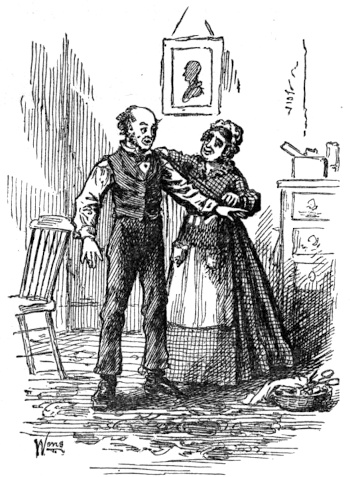
She was the widder of Sampson Bump; he died with
collery morbeus, and she moved to Jonesville and set
up a tailoress shop, and had been called likely. Though
the wimmen of Jonesville had gi’n in that their husbands
never had so many clothes made in the same
length of
time, and a
good many of
the men had
got scolded
considerable
by their wives
for runnin’
through with
their property,
and goin’
so deep into
their store-clothes.
But
the men had
all gi’n in that
ready-made
clothes ripped
so it was a perfect moth to buy ’em, and it was fur
cheaper to hire ’em made by hand. And Josiah had
started up about the middle of winter, and wanted to
have her measure him for a vest, and get a new overcoat
made. Josiah Allen didn’t need no vest, and I
put my foot right down on it. But I had her come
33to the house and make the overcoat, and while she was
there I run a splinter under my finger-nail, and was
disabled, and I kep’ her a week to do housework.
As I say, she had always been called likely, though
she seemed to be sort o’ shaky and tottlin’ in her religion.
She had been most everything sense she come
to Jonesville, not quite 2 years. She jined the Methodists
first, then the ’Piscopals, then the Universalers,
and then the Camelites. And I s’posed at this present
time she was a Camel. I had hearn’ talk that she was
a leanin’ towards the Mormons, but I had always made
a practice of disputin’ of it, knowin’ how hard it was
for good lookin’ wimmen to get along without bein’
slandered by other wimmen. I always dispised such
littleness, and so I had come out openly and stood up
for her, and called her a Camel. But I learnt a lesson
in this very affair. I learnt to be more mejum than I
had been, and I thought I knew every crook and turn
in mejumness, I had always been such a master hand
for it. But in dispisin’ littleness and jealousy in other
wimmen, and tryin’ to rise above it, I had riz too fur.
She wuzn’t a Camel! And while the other wimmen
had been spiteful and envious, I had been a lyin’—though
entirely unbeknown to me, and I don’t s’pose
I shall ever be hurt for it.
As I have said, and proved, I wuzn’t jealous, but oh,
what groans I groaned, as I heard for the second time
them fearful words from the lips of my pardner—“Widder
Bump!”
34It was awful dark in the room, perfectly dark, but
darker fur in the inside of my mind, and gloomier.
How I did groan, and turn over agin and groan. And
then I’d try to look on the bright side of things, right
there in the dark. Thinkses I, I know I am better
lookin’ than she is, and would be called so by good
judges. To be sure, her heft was in her favor; her
heft was a little less than mine, mebby 100 pounds or
so, and she could most probable get around spryer, and
act more frisky. But thinkses I, when a man loves a
woman devotedly, when he carrys her in his heart,
what is a few pounds more or less? Thinkses I, a
hundred pounds hain’t more than a ounce to him under
the circumstances; he don’t sense it at all. So I’d
try my best to look on the bright side, (right there in
the dark,) and I’d say to myself, my Josiah’s affections
are sound, they are wrapped completely round
me. And then I’d look on the dark side, and think
how I had hearn that men’s affections was loose and
stretchy, some like the injy rubber ribbins you get to
put round papers. How it will set tight round one,
and hold it seemin’ly so close that there don’t seem to
be room for another single one, and then how easy it
will stretch out and hold tight round another one—and
another one—and et cetery—and et cetery.
Seemin’ to set jest as easy round the last ones, and
hold ’em jest as tight and comfortable as the first
one. And then I’d groan, and turn over agin and
groan. And once my groan (it was a louder one than
35my common run of groans, and deeper,) it waked
Josiah Allen right up out of a sound sleep, and he was
skairt, and riz right up in the end of the bed, and says
he, in tones tremblin’ with emotion and excitement:
“What is the matter, Samantha?”
And I never let on what ailed me, but told him in
tones that I tried to make calm and even, (and as
lofty as I could when I knew I was talkin in a parable
way) that it was a pain that was a goarin’ of me. I
didn’t lie. I wuz in pain, but I didn’t feel obleeged to
explain the parable to him, and tell him where the
pain wuz. I didn’t tell him it was in my heart. And
he thought it was in my shoulder-blades; he thought
it was the rheumatiz. And he wanted to know, in
affectionate tones, “if he shouldn’t rub my back, or if
he shouldn’t get me the spirits of turpentine, or the
camfire?”
But I told him no. I knew that turpentine was a
master hand to strike in, but it couldn’t never go
down deep enough to strike at the feelin’s I felt—and
camfire never was made strong enough to ease off a
wounded spirit, or bathe it down.
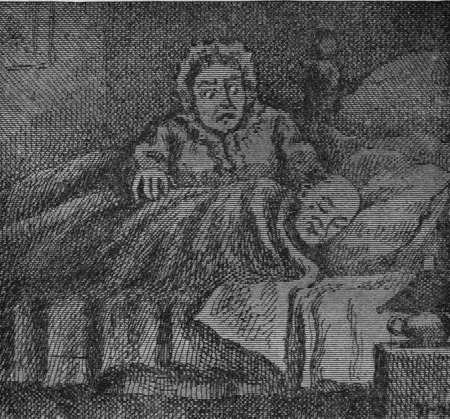
But I held firm, and didn’t say nothin’. And
Josiah lay down agin, and in ½ a minute’s time was
fast asleep, and a dreamin’. What was his dream?
Into what land was his mind a journeyin’? And who
was his companion? Was it Widder Bump? At that
fearful thought it seemed as if I should expier. I
dassent groan for fear of roustin’ up my pardner, and
36so I had to stand it with sithin’. Sithes wouldn’t
wake him up. And oh! what fearful and tremenjous
sithes I sithed for the next several moments. I hain’t
afraid to bet that the best judge of sithes that ever
lived would have said that he never heard any that
went ahead of these, nor see deeper ones, or more melancholy.
Why my feelin’s was dreadful, and can’t be
described upon. There it was, dark as pitch. It was
jest before daylight, when it is the darkest time in the
hull night. And there my companion wuz. Where
wuz he? I couldn’t tell, nor nobody. His body lay
37there by my side. But the real Josiah, where wuz he?
And who was with him where he wuz? Oh! what
feelin’s I felt! what sithes I sithed!
What blind creeters we are, anyway. Our affections
reach out like a wild grape-vine, layin’ hold of sunthin’,
or somebody, a twistin’ and a clingin’, till death on-clinches
of ’em, jest as foolish, jest as blindly. Human
love is strong, but blinder than a mole.
How is that grape-vine to know what it is a clingin’
to? Blind instinct moves it to lay holt of sunthin’,
and hang on till it is tore away, or sot fire to, or
wrenched off by some power outside of itself, and
killed, and destroyed. But how can it tell whether it
is clingin’ round a live oak or a bean-pole? Round
sunthin’ that is sound to the core, or holler as a pipes-tail?
Round sunthin’ that will draw it along the
ground, draggin’ it through mud and mire into a perfect
swamp hole and bog, soilin’ its bright leaves,
dwarfin’ its free growth, poisenin’ it with dark and
evil shadows? Or whether it will draw it up towards
the clear heavens and the sunlight, and hold it up
there by its strength—a happy vine, growin’ fresh and
bright, sendin’ out blessed tendrils touchin’ nothin’
less pure than God’s own sweet atmosphire.
Now I worshipped that man, Josiah Allen. And I
thought he loved the very ground I walked on as
devotedly as I did hisen. I thought I knew every
crook and turn in that man’s mind. And now, after
livin’ together over 20 years, that man had done what
38he had done; talked the hull evenin’ long about a
certain widder, and even in his sleep had uttered them
fearful and agonizin’ words—“Widder Bump!”
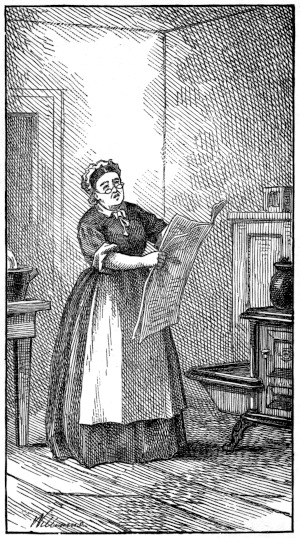
And there I was, a strong woman in every way—strong
in intellect and principles, strong in my love
for him, strong in my heft. And here I was, powerless
as a rag-babe. No more strength nor knowledge
in the matter than the rag-babe would have. No more
power in my hand to lift up the veil of mystery that
was hangin’ round my Josiah than there would be in
the babe’s, not a mite. Josiah’s mind wasn’t the
strongest mind in the world—I had always known
that, and had made a practice of remindin’ him of it
frequent, when I see it would be for his good. But
now, now there wuzn’t a intellect powerful enough on
the face of the earth to foller it up and overthrow it.
Out of the reach of friend or foe; beyond perswasion,
ridicule, reasonin’, or entreaty; out of the reach of
me, his Samantha. He had gone off a travelin’ without
no change of clothin’, or railroad tickets. Settin’
off on a journey, unshackled by pardners, bundles, and
umberells. A soarin’ free and calm through that wonderful
land. The ring on my finger held him before
earthly courts and constables, but there he was a wanderin’,
a free Josiah. Was I a wanderin’ with him?
Did his soul reach out to me from that realm—hold to
me so close as to draw my spirit to his adown them
shadowy streets, into them mysterious homes, over
whose silent threshold no curious foot may pass?
41Was his lawful pardner with him there, where she
should be? Was his thought loyal to me, where there
was no law, no influence, or constraint to make him
constant—or was he a cuttin’ up and a actin’, flirtin’
in spirit with the phantom thought of a Widder Bump?
Here I would sithe powerful, and turn over agin, and
sithe.
And so the tejus night passed away. But one great
determination I made there in them fearful moments
of darkness and mystery, one powerful resolve I made,
and determined to keep: I would hold firm. And
never let my pardner know I was a mistrustin’ anything.
But every minute of the time, day and night,
I would keep the eye of my spectacles open, and try to
find out what was a goin’ on. But little, little did I
think what it was that was a goin’ on. Little did I
realize the size and heft of the earthquake that was a
rumblin’ and a roarin’ under that feather-bed unbeknown
to me. But more of this hereafter and anon.

The next mornin’ sunthin’ happened to me that,
comin’ as it did jest at this curious and tryin’ time, was
enough to scare anybody most to death. I had a sign;
a mysterious warnin’. I happened to take up the last
World while my dish-water was a heatin’, and the very
first words the eye of my spectacles fell on—right
there in broad daylight—entirely unexpected to me, I
read these awful words:
A meetin’-house steeple had fell flat down the day
before—fell right down into a man’s door-yard, sudden
42and unexpected, broke a
hen-coop and five lengths
of fence, and skairt ’em
most to death. They
thought, them folks did,
that that steeple stood
firm and sound. They
never mistrusted it was
a tottlin’. And it had
stood straight and firm
for year after year, probable
for over 20 years.
But there come along a
gust of wind too strong
for it, and over it went
right into their door-yard;
its lofty head was
bowed into the dust, the
hen-coop and fence was
squshed down forever,
and they was skairt.
I don’t believe too
much in signs and wonderments,
yet I don’t
s’pose a man or a woman
lives who hain’t got a
little streak of superstition
and curiousness in
’em. I s’pose livin’ as
43we do with another world that we don’t know nothin’
about pressin’ so close about us on every side, livin’
in such curious circumstances makes us feel sort o’
curious.
Some as Miss Arden felt, the one that Mr. Tennyson
wrote about, she that was Ann Lee. When her husband
Enock got lost she wouldn’t gin up that he was
dead, and marry to another man, till she opened the
Bible and looked for a sign. I have heard Thomas J.
read it so much that Ann seems near to me, almost
like one of the Smiths. But though Ann did find a
sign, and was mistaken in it, or didn’t give it the right
meanin’, I was determined to read mine right. I felt
a feelin’ in my bones that them words was meant to
me for a warnin; was gin to me as a sign to meditate
on. If a meetin’ house steeple could tottle, my Josiah’s
morals was liable to tottle; if that steeple fell right
down flat into a man’s door-yard, breakin’ down and
squshin’ what it had broke down and squshed, my
Josiah was liable to fall flat down in a moral way, and
sqush down all my earthly comfort and happiness; and
I felt a feelin’ that if I would save him I must be up
and a doin’.
Now if them folks had mistrusted that that steeple
was gettin’ shaky, they could have tied it up, mebby,
and kep’ it straight. And I was determined that if
tyin’ up, or anything of that sort, would keep my
Josiah up, he should be tied. I am speakin’ poetically,
44and would wish to be so understood. Ropes was not
in my mind, neither tow strings.
And then as I come to think things over, and look
at the subject on every side, as my way is, I felt a
feelin’ that I hadn’t done as I ort. My mind had been
on a perfect strain for 2 weeks on that alpacka dress,
and I hadn’t kep’ watch of my pardner as pardners
ort to be watched over. Men are considerable likely
critters, but they are sort o’ frisky in their minds,
onstiddy, waverin’ kinder. They need a stiddy bit,
and a firm martingill, to drive ’em along straight in
the married life, and keep their minds and affections
stabled and firm sot onto their lawful pardners. I
have said that there wasn’t a jealous hair in my head,
not a hair. But filosify and deep reasonin’ has learnt
me severe and deep lessons. Even after the fearful
night I had passed, the awful words I had listened to
from the lips of a sleepin’ Josiah, still filosify whispered
to me that my pardner was as good as the common
run of men, and I, in strainin’ my mind on store-clothes,
had neglected things of far more importance;
I had neglected lookin’ after my companion as men
ort to be looked after. The cat, to use a poetical and
figurative expression, had been away, and the mouse
had gone to playin’. Or, to bring poesy down to prose,
and to common comprehension, the cat had been fixin’
over a brown alpacka dress, and the mouse had got to
follerin’ up a Widder Bump in his mind.
I believe when the man goes to cuttin’ up and actin’,
45if the female pardner, upheld by principle, would take
a microscope and look over her past, she would more’n
as likely as not come bunt up against some fault of
her own, some neglect, some carelessness, some things
she had done that she ortn’t to done, or some things
she hadn’t done that she ort. She could trace back
their cuttin’s up and actin’s to some little unguarded
moments, when through hurry, or carelessness, or
neglect, she had let the lines and martingills of tenderness
and watchfulness drop out of her hand, and
had let her pardner go a caperin’ off with nothin’ but
a halter on, a prancin’ up and down society like a 3-year
old colt that hadn’t had a bittin’ rig on. Pardners
have got to be humored. They have got to be
made comfortable and happy in their own homes;
their companions has got to make themselves attractive
to ’em, or they won’t be attracted. Viniger won’t
draw flies worth a cent. And pardners have got to be
watched; for this is the law and the profit.
They have got to be reined up to the post of duty,
and hitched there. They are naturally balky, and
love to shy off side-ways, and there haint no use
denyin’ of it.
I tell you, I had deep thoughts that day as I went
round the house a doin’ up my work; awful deep ones,
and a sight of ’em, probable as many as 2 dozen a minute
right along through the day; some solemn and
affectin’ ones, about as solemn as they make, and some
46more hopeful like, and chirk. I tell you, my mind got
fairly tuckered out by the middle of the afternoon.
But with Samantha, regret, repentance, and reformation
foller right straight on after each other, jest like
3 horses hitched in front of each other drawin’ a heavy
load. I see there was a duty in front of me to tackle;
I see that I must not let Josiah Allen go off to Jonesville
another night without his pardner. I must leave
cares and store-clothes in the back-ground, and come
out nobly, and make my home and myself agreeable to
my pardner, and keep a keen and vigilant eye onto his
proceedin’s and goin’s on.
So that evenin’ along towards night, when he spoke
out in that same sort o’ strange and curious way about
Jonesville, and that “after supper he guessed he’d
hitch up and go.”
Then it was that I spoke up mild and firm as my
soap-stun, and said, “I guessed I’d go, too.” He
looked brow-beat and stunted by my remark, and says
he: “I am most afraid to have you go out in such
muggy weather, Samantha. I don’t believe you realize
how muggy it is.”
Says I, in a brave, noble tone: “It hain’t no muggier
for me than it is for you, Josiah Allen, and if you
go, I go, too.”
“Wall,” says he, with that same dumb-foundered
and stunted mean, “the old mare hadn’t ort to go out
agin to-night; she lost a shoe off last week. I don’t
believe we had better try to go.”
47Says I coolly: “Do jest as you are a mind to, but if
you must go, it is my duty to stand by you and go,
too; if my pardner has got a hard job in front of him
to tackle, it is my duty to tackle it, too.”
“Wall,” says he, “I guess I’ll go out to the barn
and onharness. The old mare hadn’t ort to go out
with her off shoe in such a condition.”
But as he drawed on his overhauls, I heard him
mutter sunthin’ to himself about “its bein’ the last
night the Elder would be there till fall.” But I overheard
him, and says I:
“You know, Josiah Allen, that Elder Bamber has
48gin up goin’ home; his mother’s fits is broke up, and
he hain’t a goin’. And there’l be meetin’s right along
every night jest as there has been.”
They’ve been holdin’ protracted meetin’s to Jonesville
for quite a spell, and I s’posed them was the
meetin’s that Josiah meant. Ah! little, little did I
know what Elder he meant, or what meetin’s. But he
knew me too well to tell me. He knew well the soundness
and heft of my principles. He hadn’t lived with
’em above 20 years without findin’ ’em out. But more
of this hereafter and anon.
When Josiah come into the house agin, and sot
down, he had that same sort o’ cross, brow-beat look
to him. And he spoke out sort o’ surly like: “Hain’t
it about supper-time, Samantha? And if you’ve got
over bein’ in such a dreadful hurry with that dress,
mebby you’ll have time to get a little sunthin’ better to
eat. I declare for’t,” says he in a pitiful tone, “you
have most starved me out for a week or two. And
you hain’t seemed to have had time to say a word to
me, nor nothin’. Your mind hain’t seemed to be on
me a mite. And,” says he, with a still more depressted
and melancholy look, “a cream-biscuit is sunthin’ I
hain’t seen for weeks. Nothin’ but bread! bread!”
Oh! how my conscience smited me as I heard them
words—it smited and smarted like a burn. Yet at
the same time his words kind o’ chirked me up, they
made me think what a powerful arrow I had in my
hands to shoot down my sorrow with. They made me
49feel that it wuzn’t too late to save my pardner, and
that was a sweet thought to me.
Yes, with a thankful and grateful heart, I grasped
holt of that weepon that had defended me so many
times before on hard battlefields of principle. I held
that weepon firm and upright as a spear, and says I:
“Josiah, you shall have as good a supper as hands
can get.” Says I, “Besides the common run of vittles
we jenerally have for supper, cake and tarts and such
stuff, what do you say, Josiah Allen, to havin’ a
briled chicken, and toast, and mashed-up potatoes, and
cream biscuit, and peaches?”
His mean changed in a minute. I never see a mean
in my hull life look more radient than hisen did as I
spoke them words. And my breast heaved with such
happy and grateful emotion that it most bust off 2
buttens in front (them buttens wuzn’t what they was
recommended to be; there was sunthin’ wrong about
’em in the shanks). Though the mournful and mysterious
episode and Widder Bump was remembered,
yet I felt a feelin’ that I should win my pardner back—I
should save his sole alive.
But yet I had solemn feelin’s, I can tell you, all the
while I was a mixin’ up them cream biscuit, and
brilein’ that chicken, and makin’ that toast, and
mashin’ up them potatoes, and puttin’ plenty of cream
and butter into ’em.
I well knew I was a handlin’ my most powerful
weepons. I knew if them failed, I was ondone.
50I had meditated so many times and so deep onto
this subject, that I knew every crook and turn in it.
How a man’s conscience, his moral faculties, and his
affections was connected by mighty and resistless cords
to his appetite. I knew well that when his morals
was tottlin’, when he was wild, balky, fractious, and
oneasy, good vittles was the panaky that soothes.
And when the mighty waves of temptation was tostin’
him to and fro—when scoldin’s seemed futile, and
curtain lectures seemed vain, extra good vittles was
the anchor that wimmin could drop down into them
seethin’ waters, knowin’ that if that didn’t holt, she
could, in the words of the Sammist, “give up the
ship.”
Yes, as Josiah Allen see me a gettin’ that supper
he grew calm, peaceful, his demeaner towards me
grew sweet and lovin’, his affections seemed to be
stabled and firm sot onto me. I see, and I can tell
you I was a proud and happy woman as I see it, that
the anchor I had throwed overboard was a grapplin’
the rock. Agin, as in days past and gone, in different
crysises of my life, philosophy, principle, and Samantha
conquered.
The supper was a success. The spring chicken was
plump and tender, but not more tender than Josiah’s
demeanor to me as he partook of that refreshment.
The cream biscuit was light and warm; so was my
heart as I see my happy pardner eat the 7th one.
The peaches was delicious and sweet; so was my
51Josiah’s smile onto me, as I dipped out the 4th sass
plate full and handed it to him. And after supper he
sot there by my side calm and peaceful, and the Widder
Bump and all other earthly cares and agonys
seemed to be forgot.
But it wuzn’t till long afterwards, it wuzn’t till the
4th day of the next September, though I mistrusted, I
mistrusted strong before, but it wuzn’t till then, that
I knew for certain what a glorious and momentious
victory I had won that day. What great and awful
responsibilities was a devolvin’ onto them cream biscuit,
and hangin’ round that chicken and toast and
potatoes. I felt solemn feelin’s a gettin’ that supper,
and curious ones a eatin’ of it. But oh, what feelin’s
should I have felt if I had known what a earthquake
was a rumblin’ and a roarin’ under that table unbeknown
to me.
Oh, what blind creeters the fur seein’est of us are,
how powerless are the most magnifyest spectacles to
see the brinks that pardners are a hangin’ over unbeknown
to us. But of this, more hereafter and anon.
52

KITTY SMITH AND CALEB COBB.
We have got a dretful pretty girl a-stayin’ with
us now, one of the relation on my side, one
of the Smiths. When we heard she was a comin’,
Josiah kinder hung back from the idee at first. But
as I see him a hangin’ back, I calmly, and with dignity,
took the Widder Doodle, one of the relations on
his side, and mildly yet firmly threw her in his face.
It hit him jest right, the idee did, and I hain’t heard a
word sense of murmurin’s or complainin’s about the
Smiths.
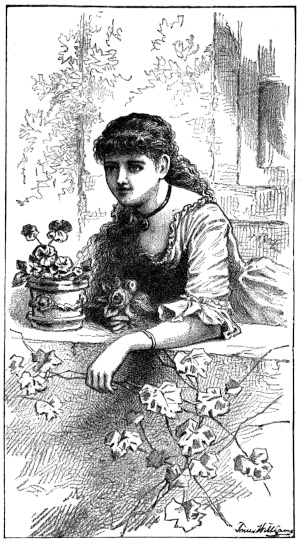
I enjoy her bein’ here the best that ever was. We
have took lots of comfort sense she come. Not that
happiness and security has caused me to shut that
open eye of my spectacle. No! that is still on the
watch, vigilent and keen, and if there is anything
a goin’ on, I feel that it cannot long bebe hid from that
eye. But everything has seemed calm and peaceful,
Josiah is affectionate and almost tender in his mean
to me. And I learn from the neighbers that the Widder
55Bump has gone off on a visit to her folkses. But
still that eye of my speck is sleepless. Not once has
it closed itself in slumber, and still I hold firm.
Kitty Smith is a pretty girl, as pretty a one as I
ever see. The Smiths, as I have said to Josiah a
number of times, was always pretty fair lookin’. He
thinks so too, only when he is fractious. She looks
a good deal as I did when I was her age; Josiah
owned up to me the other night that she did. We had
had a splendid good supper, and he felt well, and he
said so of his own accord. And then she favors her
mother considerable, a good-lookin’ woman as I ever
see, and smart.
Kitty is very fair complected, smooth, as delicate as
a sea-shell, with curly hair almost gold-colored, only
bearin’ a little on the brown, kinder fruzzly and fluffy
on top, blowin’ all over her forward when she goes
out in the wind, or anything. And her forward bein’
white as snow, when the little gold rings and curls are
a blowin’ all over it, they look well. She has got sort
’o pinky cheeks, and her eyes are big and dark, and
kinder grey like, and all runnin’ over with fun and
mischief. She is the biggest witch out. And her lips
are red as two roses, and always a laughin’, them and
her eyes; I don’t know which laughs the most. Her
name is Kitty, and she is just as affectionate as a little
kitten, and as playful.
I think a sight on her. And I love to look at her.
I always did love to look at a handsome woman.
56There are some wimmen that it gauls to see a female
handsomer than they be, but it never did me. I
always loved to see handsome pictures, and a beautiful
woman’s face is a picture with a soul in it.
I set a great deal of store by her, and so does
Josiah and the childern; they are all a quarrelin’ now
which will have her the most. But we shan’t none of
us have her long, I s’pose. For she has told me in
strict confidence, and if I tell, it must not go no
further, for it must be kep’! She don’t want Josiah
and the childern to get holt of it, knowin’ they would
plague her most to death. She is engaged to be
married to a awful smart-lookin’ feller. She showed
me his picture—a keen-eyed, noble-lookin’ chap, I can
tell you, and well off. His father owns the big manufactory
where her father was overseer when he died,
and where her mother keeps boarders now. His
father stood out, at first, about his marryin’ a poor
girl. And Kitty come off out here for a long
visit; her mother wanted her to; they are both proud,
and won’t force themselves into no company. But
Mark—that is the young feller’s name—Mark stands
firm, and the old man is a comin’ round gradual.
Kitty, though she jest worships Mark, won’t go there
till she is welcome, and I bear her out in it. That is
why she is here on such a long tower. But she knows
it is all a comin’ out right; her mother says it is; and
Mark writes to her every day or two, and she is happy
as a bird.
57But she is a little too full of fun sometimes, and
thoughtless. She don’t realize things as she ort, and
as she will when she is older. Now there is a young
feller here in Jonesville that has got after her, Caleb
Cobb, or Kellup, as everybody calls him. And just
out of pure fun she lets him foller her up. I feel bad
about it, and so I have told Josiah. But he said “she
didn’t mean no more hurt than a kitten did, a-playin’
with a mouse.”
Says I, “Josiah Allen, hain’t it bad for the mouse?”
“Wall,” says Josiah, “it no need to have been a
mouse then.”
Says I, “That is a dretful deep argument, Josiah.”
Says I, “I should be afraid to be so smart, if I was in
your place. I should be afraid they’d want me to
Congress.”
My tone was witherin’ and dry as a fish. But
Josiah didn’t feel withered up. The fact is, he hates
Kellup, and loves to see him fooled, that is the truth
on’t. Kellup’s father is the cabinet-maker to Jonesville,
and Kellup drives the hearse, and he comes to
see Kitty in it. His father does sights and sights of
business out in the country all round Jonesville, and
every time Kellup is called out with it, on his way
home he will go milds and milds out of his way for
the privilege of stoppin’ and seein’ her. And he’ll
hitch that hearse to the front gate, and come in and
try to court her. Why, anybody would think a pestilence
had broke out in our three housen, our’n, and
58Tirzah Ann’s, and Thomas Jefferson’s, to see that
hearse hitched in front of ’em every day or two. It
works me up and gives me awful feelin’s. But Kitty
jest giggles and laughs over it, and Josiah and the
children encourages her in it. They hate Kellup like
pisen.
And he is one of the stingiest, disagreeablest, conceitedest,
self-righteousest creeters that I ever see in
my life. And pretends to be religious. Why, I spose
tight is no name for his tightness. Somebody made
the remark that he was a wolf in sheep’s clothing.
And Thomas J. said it wasn’t nothin’ but the sheep’s
hide, then, for if it had been the hull pelt he’d sell
the wool offen it quicker’n a wink.
And he thinks he is so beautiful, and dangerous to
wimmen. But I never could bear his looks. He has
got great big black eyes, dretful shaller, no depth to
’em, some like huckleberries, only bigger, but jest
about as much soul and expression into ’em as a
huckleberry has. And a saller skin and low forward,
with sights of hair and whiskers. The curiousest hair,
and the singularest whiskers that I ever did see.
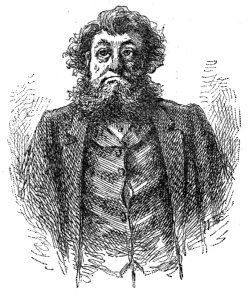
They are very heavy and bushy, and he bein’ pretty
well along in years, they would be as grey as two rats.
But bein’ a bachelder, and wantin’ to pass off as a
young man, he colors ’em. Which would be all perfectly
proper and right, and no more than lots of folks
do; but the peculiarity is, he is so uncommon tight
that he wont buy hair dye, but makes experiments
59with himself, steeps up things, roots and herbs, and
stuffs he can buy cheap, minerals and things, cateku,
and so 4th, and pusly. And so you hardly ever see
him twice with his hair and whiskers and eyebrows
the same color. And
I’ll be hanged if he
haint some of the
time the curiousest
lookin’ creeter that
was ever seen out
side of a menagery.
If he would only
settle down on one
color and keep it up,
it wouldn’t be so bad
for him. London
brown hair and
whiskers wouldn’t
look so awful bad after you get used to ’em, or cateku
color, or madder red. But he thinks, I spose, that
he will hit on sunthin’ cheaper than he has hit on;
so he will keep on tamperin’ with ’em, and makin’
experiments, and you won’t no sooner get used to seein’
’em cinneman color, than the very next thing they will
be a bright pusly color, or sorrel. It jest spiles his
looks, and so I have told Josiah.
And he said “It was hard spilin’ anything that was
born spilt.” And I told him “That no human bein’ was
ever born with pusly-colored hair and whiskers.”
60And he said “He was born a dumb fool!”
And I didn’t deny it, and didn’t try to, only I
scolded him powerful and severe on the “dumb.”
His hair and whiskers, as I say, are always some
new and curius shade, very changeable and oncertain,
as to color, but they are always greasy. He uses
sights and sights of hair oil; he makes it himself out
of lard, scented up high with peppermint. He uses
peppermint essence on his handkerchy, too (he gathers
his own peppermint and makes it, and uses it lavish).
He says that is the only vain, worldly luxury he indulges
in. He says he feels guilty about usin’ up his
property in it, but it is such a comfort to him that he
don’t feel as if he can give it up.
His clothes are always very cheap and poor lookin’,
when he is dressed up the most, but he dresses very
poor the most of the time, for principle, he says, to
try to wean the wimmen from him as much as he can.
And take him with them clothes of hisen, and that
curius lookin’ hair and whiskers all round his chin,
and up the sides of his face, he is as sepulchral and
singular a lookin’ a chap as I ever laid eyes on.
He is a bachelder, Kellup is, not from necessity, he
says, but because he has found it so hard to select one
from the surroundin’ wimmen that want him. He has
told me that the two main reasons why he didn’t
marry, one was, he found it so awful hard to select
one out of so many, and the other, it was so tryin’ to
61him to hurt the feelins’ of them he would have to
slight if he made a choice.
Why, he talked with me about it over two years
ago. He was in to our house one day, and Josiah had
been a attin’ him about his not gettin’ married, and
after Josiah went out, he talked to me confidential. I
s’pose it is that sort of a noble, lofty look, to my face,
that makes folks confide in me so much. Says he,
“I am tender-hearted, Josiah Allen’s wife. I am
too tender-hearted for my own good. There is so
many wimmen that want me, and it would cut me, it
would cut me like a knife to have to disapinte so many.”
He stopped here for me to say sunthin’, and I remarked,
in a sort of a dry tone, that I wouldn’t worry
about ’em, if I was in his placeplace
“Wall,” says he, “I shouldn’t worry, if I was like
some men. I should slash right in and marry, without
payin’ any attention to other wimmens feelin’s. But
if I should kill half a dozen wimmen or so, Josiah
Allen’s wife, I feel that I never should forgive myself.”
Here he stopped agin, and I see that he wanted me
to say sunthin’; and not knowin’ exactly what to say,
I said sort o’ mechanically, without really thinkin’ what
I was a sayin’, that it would be a good stroke of business
for his father.
“Yes,” says he, “but the profits we should make
wouldn’t much more than half pay me for the feelin’s
I should have a thinkin’ I was the means of their
dyin’ off.
62“Why,” says he, takin’ out his pocket handkerchief
and wipin’ his forward, till the room smelt as strong
as a peppermint sling,—“there haint a woman in
Jonesville but what would jump at the chance of
marryin’ of me. But they mustn’t calculate too
strong on it. I wouldn’t be the one to tell ’em right
out plain that there wasn’t no hopes of gettin’ me.
That would be a little too heartless and cold-blooded
in me. But they mustn’t build up too high castles in
the air about it, for I may not marry at all.”all.”
“Like as not you wont,” says I, speakin’ not quite
so mekanikle, but with considerable more meanin’.
“I shouldn’t wonder a mite if you didn’t.”
“No,” says he, foldin’ his arms and lookin’ haughtily
at a picture of a woman over the wood-box.
“No; the thing of it is I am so tender-hearted, and
hate so to cause sufferin’.
“I can’t,” says he, knittin’ up his eyebrows (they
was a kind of a olive green that day), “I can’t marry
all the wimmen that want me. That is a settled thing.
Anybody with half a mind can see that. I can’t do it.
And so what would the result be if I should make a
choice, and marry one. One woman made happy, and
cruelty, wanton, bloody cruelty, to all other wimmen
fur and near. Would that one woman’s happiness,”
says he, knittin’ up his eye-brows as hard as I ever see
any knit, and I have seen some considerable hard
knittin’ in my day, “would that one woman’s happiness
go anywhere near makin’ up for the agony that
63would rack the breasts of other wimmen, and tear
their heart-strings all to flitters? That is the question,”
says he, lookin’ gloomily into the wood-box,
that is wearin’ on me night and day, and what shall
I do to do right?”
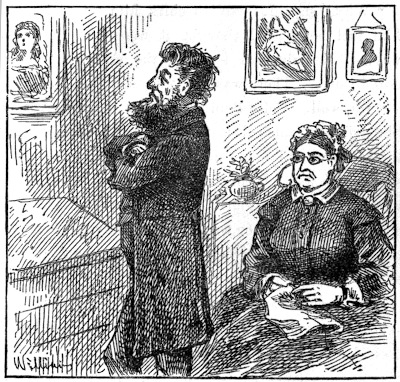
“Wall,” says I, “I can’t advise you. I wouldn’t
marry, if I thought it was a goin’ to kill ten or a
dozen; and I wouldn’t marry anyway, unless I got a
chance.”
“Chance!” says he haughtily. “Why, there haint
a woman in the country but what would jump to have
64me; that is,” says he in a reasonable tone, “if they
wasn’t too old to jump, or wasn’t disabled in some
way, rheumatiz, or sunthin, or sprains. They all want
me.”
“Why,” says I, tryin’ to chirk him up, and make
him feel better, “I thought it was right the other
way. I thought you had got the mitten more’n a
dozen times. There was Polly Bamber”—
“Oh, well. Polly Bamber loved me to distraction.
She tried to conceal it from me. She refused me,
thinkin’ it would make me fiercer to marry her. But
she got fooled. I only asked her three times. She
was waitin’ for the fourth, and I spose she was as disapinted
as a girl ever was. I was sorry for her; my
heart fairly ached for her; but I had a man’s dignity
to keep up, and I left her.”
“Wall, there was Betsey Gowdey.”
“Betsey would have had me in a minute, if it hadn’t
been for influences that was brought to bear on her.
She just as good as told me so. I s’pose she felt
awfully to lose me; but she bore up under it better
than I thought she would. I thought like as not she
would break completely down under it.”
“Wall,” says I, tryin’ my best to chirk him up,
“there was Mahala Grimshaw, and Martha Ann
Snyder, and Jane Boden, and Serena Rumsey, and
Serepta Mandagool.”
“Them girls was sorry enough, when it was too
late. They lost me, every one of them girls did, by
65puttin’ on airs and pretendin’
not to want me.
Pretendin’ to make fun
of me, jest for an outside
show. I see right
through it. But I took
’em at their word, and
when they said they
wouldn’t have me, I jest
left ’em, and paid no
attention to what they
suffered after I left.
Sometimes I have
thought that mebby I
was too harsh with ’em,
to punish ’em so; but I
did it, and I’d do it agin
if it was to do over.
They no need to have
been so deceitful. They
might expect to suffer
for it, and I am glad
they did.”
“There was Nabby
Ellis,” says I dreamily.
“Oh, Nabby was all
right. It was envy and
jealousy that broke that
up. Sam Larkins jest
66filled her ears about me, I know he did; if he hadn’t,
and hadn’t married her himself, Nabby would have
gin her ears to have had me. I think she thinks more
of me to day than she does of Sam; but I keep out of
her way all I can; I don’t want to harrow up her
feelin’s. I am a young man of principle, if there ever
was one.
“Now I know of several married wimmen that I am
obleeged to treat cool and distant, for their own good.
What good would it do me?” says he, knittin’ up his
eyebrows agin.
“What good could it do me for a lot of married
wimmen to get over head and ears in love with me?
They know they can’t get me. And though they may
feel hurt at my coldness at the time, when they come
to think it over they must know I am actin’ for their
good in the long run, by bein’ cold and distant to ’em,
and tryin’ my best to wean ’em from me.
“Some young men don’t seem to have no idee or
care about the sufferin’ they cause on every side of ’em.
They will trample right round over female hearts, as
if there wusn’t no more feelin’ in ’em than in tan
bark, and as if it didn’t hurt ’em and bruise ’em to
tread on ’em. But it haint my way. I don’t think a
young man can be too careful about such things.
Why, I am so careful and conscientious that if I
thought it was necessary for females’ peace of mind,
and the good of surroundin’ wimmen, I would be
willin’ to wear a veil over my face the hull time.”
67I looked him full and keen in the face, over the top
of my specks, and told him calmly that I didn’t think
it was necessary.
“Wall,” says he, “I am jest that tender-hearted,
that I would do it.
I am too tender-hearted
for my
own good. I know
that very well.
Now I want to
get married, I
want to badly;
but there them
two reasons stand,
right in front of
me, headin’ me
off. It haint the
expense of keepin’
a wife that holds
me back, for I
could more than
make her pay her
way, doin’ the
housework for father
and me and
five workmen. No, it is clear principle that is headin’
me off. I may get reckless after a while.”
Says he, with a sort of a bitter mean onto him: “I
may get so carried away with some girl’s looks, and so
68hankerin’ after matrimony, that I shall forget my conscience
and principle, and slash right in and marry
her, and let the other wimmen go to wrack and ruin.
But then agin when I think what the consequences
would probable be, why then I tremble.”
And he kinder shook some as if he had a chill.
Says he: “When I think of Jane Sofier Burpy.
When I think what my feelin’s was as I drove her
hearse to the buryin’-ground. When I think how I
felt durin’ that ride—why, I think I will never meddle
again with any women, in any way, shape, nor manner.
When I think how she wilted right down like a
untimely flower cut down by the destroyer.”
“Why,” says I, “she died with a bile; that was
what ailed her,—a carbuncle on her back.”
“Yes,” says he, with a unbelievin’ look on his face,
“so the doctors said; so the cold world said. But I
think it was sunthin’ deeper.”
“Why,” says I, “a bile couldn’t go no deeper than
her’n went. It was dreadful. It was the death of
her.”
Says he: “I have always had my own idee of what
ailed her. I know what that idee is, and I know what
a guilty conscience is. I wuzn’t careful enough. I
didn’t mean no harm to her, Heaven knows I didn’t.
But I wuzn’t careful enough. I boarded two weeks
with her mother the spring before she died. And I
can see now where I missed it, where I did wrong. I
wuzn’t offish enough to her. I treated her too friendly.
71I was off my guard, and didn’t notice how my attractions
was bein’ too much for her.
“I paid her little attentions to the table, such as
passin’ her the mashed-up potatoes and the beans. I
talked with her,
more or less.
Once I helped her
hang out the
clothes-line. I
brought her letters
from the post-office.
Twice I helped
her into a wagon.
I was onguarded.
I think then was
the time I give her
her death-blow.”
And oh! what a
harrowin’ and remorseful
look he
did cast into that
wood-box, as he
said this.
“She died in the fall. And my feelin’s durin’ that
fall I shall never forget. If that thing should happen
agin, and my feelin’s prey on me as they preyed then,
I couldn’t stand it through more than seven or eight
more such cases. I know I couldn’t. I have been
careful since then. When I’m obliged to board now
72I don’t board in any house where there is a woman
under seventy-five years of age. And sometimes I am
most afraid it is resky then.”then.”
And agin he looked as gloomy at that wood-box as I
ever see a box looked at. And he waited a minute or
two. Mebby he waited for me to say sunthin’ but I
didn’t say it, and he kep’ on:
“Several times sense that I have started up, and
thought that I would marry anyway, and leave the
result. But it has seemed to be broke up every time
providential, and I’d make up my mind in the end not
to have ’em. But after awhile agin I will start up,
and almost make my mind up, that marry I will, no
matter what the result may be. But there it is agin;
I am too tender-hearted. That is where the stick is
with me. I know jest how skurce men are, and how
wimmen feel towards ’em. I know jest how they get
their minds sot on ’em, and how they feel to loose ’em.
I have got principle, Josiah Allen’s wife. I am principle
clear to the back-bone.”
“Wall,” says I, “I don’t know but you be. I can’t
dispute you, not knowin’ how it is.”
“It may end,” says he, with a bitter look at the
woman over the wood-box, “it may end by my not
marryin’ at all. But if I don’t marry, where will the
blame lie?”
Says he, speakin’ up louder and more excited than
he had spoke up:
“I have been blamed; blamed in public places;
73right in the grocery, and on the post-office steps;
blamed by the trustees of the public school; blamed
by the old man that keeps the children’s toy-store;
blamed by the census man for shiftlessness, and slackness,
in not increasin’ the population.
“But where does the blame rest? Is it with me, or
with the wimmen that act so like furyation that it is
impossible for me to make a choice amongst ’em?
“If I should tell them men that the reason I had
lived along, year after year, without marryin’ was that
I was so tender-hearted, they would laugh at me.”
“I hain’t a doubt of it,” says I heartily and decidedly.
“Yes, they would hoot at me, so little can they
enter into such a heart as mine. But I can’t always
live along in this way. Some day there may be a
change. I give wimmen warnin’ that there may be.”
And so he went on for two hours, if it was a minute.
Repeatin’ it over and over agin, till I was as sick
as a dog of hearin’ of it. But knowin’ he was talkin’ to
me in confidence, I didn’t want to come right out plain,
and tell him what I thought of him. But I was glad
enough when he got through and started off of his
own accord.
But since Kitty come he has been to our house more
than ever. He has acted crazy as a loon about her.
Though true to his principle, he asked Josiah the other
day, “if consumption run in her family, and if he
74thought it would go too hard with her if he didn’t
make up his mind to marry her.”
Old Cobb is well off, but
he and Kellup works hard,
and fares hard. They stent
themselves on clothes, and I
don’t s’pose they allow
themselves hardly enough
to eat and drink. And
all the literary feasts and
recreations they allow themselves is to set round in
stores and groceries, on dry-goods boxes and butter-tubs,
75a-findin’ fault with the government, spittin’
tobacco-juice at the stove, and fixin’ the doom of sinners.
Kellup is harder on ’em than the old man is.
Old Cobb thinks there won’t be more’n half the world
saved; Kellup thinks there won’t be more than a quarter,
if there is that.
They argue powerful. Have come to hands and
blows frequent. And once Kellup knocked the old
man down, he was so mad and out of patience to think
the old man couldn’t see as he see about the Judgment.
You know there is sights and sights said on that subject
now and wrote on it; and Kellup and the old man
will borrow books and papers that are wrote on it,
some on one side and some on the other, and then
they’ll quarrel agin over them. And they’ve tried to
draw me into their arguments time and agin. But I
have told ’em that I was a master hand to work where
I was needed most, and I didn’t seem to be needed so
much a judgin’ the world, and settlin’ on jest how
many was a goin’ to be saved or lost, as I did a mindin’
my own business, and tryin’ to read my own title clear
to mansions in the skies. Says I: “I find it a tuckerin’
job to take care of one sinner as she ort to be
took care of, and it would make me ravin’ crazy if I
had to take care of the hull universe.”
It fairly makes me out of patience, when there is so
much work our Master sot for us to do for His sake, it
fairly makes me mad to see folks refuse to do a mite
of that work, but tackle jobs they hain’t sot to tackle.
76Why, the Lord don’t, like a good many human bein’s,
ask impossibilities of us. He only wants us to do the
best we can with what we have got to do with, and He
will help us. He never refused help to a earnest,
strugglin’ soul yet. But He don’t calculate nor expect
us to judge the world, I know He don’t. Why, our
Saviour said, in that hour when it seemed as if the
God and the man was both speakin’ from a heart full
of a human longin’ for love and a divine pity and
tenderness for sorrowful humanity,—He said, “If you
love me, feed my sheep.” He said it twice over,
earnest and impressive. He meant to have it heard
and understood. And once He said, seemin’ly so
afraid the childern wouldn’t be took care of, “Feed
my lambs.” That is a good plain business, tryin’ to
feed them every way, doin’ our best to satisfy all their
hunger, soul and body. That is the work He wants
us to do, but He never gave a hint that He wanted us
to judge the world. But He said out plain and square
more’n once, “Judge not.” Then what makes folks
try to do it? What makes ’em pass right by flocks
and flocks of sheeps needy and perishin’ every way,
pass right by these little lambs of Christ, hungry and
naked, stumblin’ right over ’em without pickin’ of ’em
up? Why, they might fall right over quantities of
dead sheeps and dyin’ lambs, and not know it, they
are so rampent and determined on tacklin’ jobs they
hain’t sot to tackle, crazy and sot on judgin’ the
world.
77Why, everybody says they never did see such a time
as it is now for arguin’ and fightin’ back and forth on
that subject. Why, the papers are full of it. “Is
there a Hell?” And “How deep is it?” And “How
many are a goin’ there?” And “How long are they
a goin’ to stay?” Books are wrote on it, and lectures
are lectured, and sermons are preached on both sides
of the Atlantic; and Kellup and his father are by no
means the only ones who get mad as hornets if anybody
disputes ’em in their views of the Judgment.
But I am glad enough that I don’t feel that way, for
it would make me crazy as a loon if I thought I was
sot to judge one soul, let alone the universe.
Why, how under the sun would I go to work to
judge that one soul, and do it right? I could see some
of the outward acts, ketch glimpses of the outside self.
But how could I unlock that secret door that shuts in
the real person,—how could I get inside that door that
the nearest and the dearest never peeked through, that
God only holds the key to—the secret recesses of the
immortal soul—and behold the unspeakable, the soarin’
desires, and yearnin’s, and divine aspirations—the good
and true intentions—the dreams and visions of immortal
beauty, and purity, and goodness—and the secret
thoughts that are sin—the unfolded scarlet buds of
wrong, and the white folded buds of purity and holynesses,
each waiting for the breath of circumstance, of
change, and what we call chance, to unfold and blossom
into beauty or hejusness? How could my eyes
78see if I should put on ’em the very strongest spectacles
earthly wisdom could make—how could they behold
all the passion and the glory, the despair and the
rapture, the wingéd hopes and faiths, the groveling,
petty fears and cares, the human and the divine, the
eternal wonder and mystery of a soul?
And if I could once ketch a glimpse of this—that I
never shall see, nor nobody else—if I could once get
inside the mystery of a mind, how could I judge it
right? How could I go to work at it? How could I
tackle it? Good land, it makes me sweat jest to think
on’t. How could I test the strength of that mighty
network of resistless influences that draws that soul
by a million links up toward Goodness and down
toward Evil—binds it to the outside world, and the
spiritual and divine? How could I get a glimpse of that
unseen yet terrible chain of circumstances, the inevitable,
that wraps that soul almost completely round?
How could I ever weigh, or get the right heft if I could
weigh ’em, of all the individual tendencies, inherited
traits, sins, and goodnesses that press down upon that
soul? How could I tell how the affections, powerful
critters as I ever see, was a drawin’ it one way, and
where? and how fur? And ambitions and worldly
desires, how they was a hawlin’ it another way, and
where to? and when? How true, noble aims and holy
desires was pushin’ it one way, and ignoble impulses,
petty aims and littleness, self-seekin’, and vainglory
was givin’ it a shove the other way? Good land! if I
79could see all these, and see ’em plain—which no one
ever can or will—but if I could, how could I ever sort
’em out, and mark ’em with their right name and heft,
and calculate how far they was a drawin’ and a influencin’
that soul, and how fur it had power to resist?
How could the eyes of my spectacles ever see jest
how fur down into the depths of that soul shone the
Divine Ideal, the holy, stainless image of what we
pray to be,—and jest how fur the mists that rise up
from our earthly soil darken and blind that light?
Good land! I couldn’t do it, nor Josiah, nor nobody.
We are blind creeters, the fur-seein’est of us; weak
creeters, when we think we are the strong-mindedest.
Now, when we hear of a crime, it is easy to say that
the one who committed that wrong stepped flat off
from goodness into sin, and should be hung. It is so
awful easy and sort o’ satisfactory to condemn other
folks’es faults that we don’t stop to think that it may
be that evil was fell into through the weakness and
blindness of a mistake. Jest as folks fall down suller
lots of times a gropin’ round in the dark tryin’
to find the outside door, and can’t. Doin’ their best
to get out where it is lighter, out into the free air of
Heaven, and first they know, entirely unbeknown to
them, they open the wrong door, and there they are
down suller, dark as pitch, and mebby with a sore and
broken head.
And if a wrong is done wilfully, with a purpose, it
is easy to think of nothin’ but the wrong, and not give
80a thought to what influences stood behind that soul,
a pushin’ it off into sin. Early influences, sinful
teachin’s drunk down eagerly before the mind could
seperate the evil from the good. Criminal inheritances
of depraved tastes, and wayward and distorted
intellect, wretched, depressing surroundings, lack of all
comfort, hope, faith in God or man, ignorance, blind
despair, all a standin’ behind that soul pushin’ it forward
into a crime. And then when we read of some
noble, splendid act of generosity, our souls burn within
us, and it is easy to say, the one who did that glorious
deed should be throned and crowned with honor—not
thinkin’ how, mebby unbeknown to us, that act was
the costly and glitterin’ varnish coverin’ up a whited
sepulchre. That deed was restin’ on self-seekin’,
ambitious littleness.
Yes, we are blind creeters. And there is but One
who holds the key to the terror, the glory, and the
mystery of a soul. He, only, can see and judge. He
whose age is ageless, and who can therefore alone
judge of the mighty flood of influences that pour down
upon the soul from that ageless past, swayin’ it with
mysterious power. He whose life fills that boundless
future—Eternity—He alone knows the strength of
those mighty forces drawin’ us thither. He who sees
the unseen—whose eyes can alone pierce the clouds
that close so dark about us, and behold the host
of shadowy forms that surround us on every side,
angels and demons, things present, things to come,
81life, and death, and every other creature—He only
knows their power over us. He who alone knows the
meaning of life, the mystery of our creation. And all
that keeps me from bein’ ravin’ distracted in even
meditatin’ on this is to calm myself down on this
thought, that there is One who knows all. And He
alone can judge of what He alone can see. He, the
just and loving One, will do right with the souls He
made.
Why, if I didn’t lean up against that thought, and
lean heavy, I should tottle and wobble round to that
extent that I should fall to pieces—be a perfect wrack
and ruin in no time. And another thought that gives
me sights of comfort is, He don’t need none of my
help in judgin’ the world. And if I was ever glad of
anything in my life, I am glad of that. Why, in my
opinion, it is irreverent, the very height of audacity, to
dare to affirm what shall be the doom of a single soul.
Then to think of the countless millions on earth,
and who sleep in its bosom—and the countless, countless
worlds that fill endless and boundless space,
the unnumbered hosts of the ageless past, and the
endless future—the Eternity—and jest to speak that
word almost takes away my breath—and then to think
of us, poor, blind little aunts, on a aunt-hill, deciding
on this mighty mystery, writin’ books, preachin’ sermons,
givin’ lectures, one way and another, judgin’
the fate of these souls, and where they are goin’ to,
and quarrelin’ over it. In my opinion it would be
82better for us to spend some of the breath we waste in
this way in prayer to Him who is Mighty, for help in
right living. Or, if we can’t do any better with it, let
us spend a very little of it, mebby ½ of it, in coolin’
porridge for the starvin’ ones right round us; that
would be better than to spend it as we do do, in
beatin’ the air, quarrelin’ on who is goin’ to be saved,
and how many. Them’s my idees, but, howsomever,
everybody to their own mind. But good land! I am
a eppisodin’, and a eppisodin’, beyond the patience of
anybody. And to resoom and proceed:
As I was a sayin’ of Kellup and his father, I s’pose
there’s lots of things said about ’em that there hain’t
no truth in. Now I don’t believe that they chaw
spruce-gum for dinner, and eat snow and icicles in the
time of ’em—not to make a stiddy practice of it.
Why, they couldn’t stand it, not for any length of time.
But you know when anybody gets their name up for
any particular thing, it is dretful easy—don’t take
hardly a mite of strength—to histe it up a little higher.
But I see this myself, with my own eye.
Last Thanksgivin’ I was in the meat-shop to Jonesville,
a buyin’ a turkey, and some lamb, and oysters,
and things. I was goin’ to have the childern home to
dinner. And Kellup come in, and said his father
thought it was such hard times they wouldn’t try to
keep Thanksgivin’ this year. But he told his father it
showed a ungrateful heart for all the mercies and benefits
that had been bestowed on ’em durin’ the year,
83and it was settin’ a bad example to sinners round ’em
to not celebrate it; so he had carried the day, and they
was goin’ to swing right out, and buy half a pound of
fresh beef, and celebrate.
And he bought it, and beat the butcher half a cent
on that. I think myself that he is as tight as the bark
to a tree, but I don’t believe he is any tighter. But
they say he is as tight agin.
Like myself and Josiah, Kellup is a member of the
Methodist meetin’-house. And he is a dretful case to
exhort other folks. And jest like them that don’t do
nothin’ themselves, that never did a noble, generous
84act in their lives, he is a great case to talk about other
folks’es duty. And jest like them that are too stingy
to draw a long breath for fear of wearin’ out their
lungs, he is a great case to talk about other folks’es
givin’.
If anybody has decent clothes and vittles, he is
always talkin’ about their extravagance, and how much
they could do for the sufferin’ poor round ’em with
the money. And a man could starve to death right
on the road in front of him, and all he would do would
be to stop that hearse, and exhort him from the top
of it. Not a cent would he give if the man died right
there in under the hearse. I despise such Christians,
and I always shall; and there are lots of ’em all round
us, who are always talkin’ about workin’ for Christ,
and all the work they do is with their tongues. I say
such religion is vain; empty as tinglin’ brass, and
soundin’ thimbles.
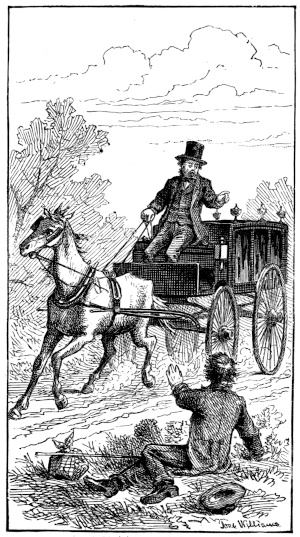
From the time he wore roundabouts, Kellup’s father
promised him that jest as quick as he got big enough
he should drive that hearse, and it has lifted him up,
that hearse has, and always made him feel above the
other boys. He has always seemed to think that was
the highest station in life he could get up onto. We
all think that the reason he comes to see Kitty on it,
is he thinks he looks more stately and imposin’ on it
than he would walkin’ afoot. And when the childern,
the little Jonesvillians, hoot at him, and make all
manner of fun of him, he thinks they envy him, and it
87makes him act haughtier than ever, and more proud-spirited,
and stiff-necked.
As I say, I feel bad, and I take Kitty to do about it
every time I see
her a’most. And
she’ll say:
“Oh, Auntie!
it is too rich!”
And she’ll
laugh, and kiss
me, and coax me
not to be cross
about it, till she
makes most as
big a fool of me
as she does of
Kellup, and I tell
her so.
But I stand
firm, and try to
make her feel a
realizin’ sense
how it looks to have a hearse standin’ round promiscous
every few days, hitched to our front gate.
It is a solemn thing to me. And would be to
anybody who looked at things serious and solemn.
Most every subject has several sides to it, and some
has more’n 20. And folks ort to tutor themselves to
hold a subject right up in their hands, and look on
88every side of it. But Kitty don’t try to. The humorous
side of things is the side she meditates on. And she
thinks that Kellup’s travelin’ round after her on that
hearse has a funny side to it. But I can’t see it. It
is a solemn thing to me to see it drive up to our gate
any time o’ day, and be hitched there, while he comes
in and tries to court her. Why, it looks fairly wicked
to me, and I tell her so. And then she’ll giggle and
laugh, and make a perfect fool of Kellup. Or, that is,
improve on the job; for truly Nater helped her powerful
at his birth. Nater did a good job in that line—in
the fool line. Though you couldn’t make him think
he was most a fool, or leanin’ heavy that way, not if
you should drive the fact into his head with a hammer.
It is one of the hardest things in the world to make
folks believe. They’ll own up to bein’ a fool twice as
quick.
But as I say, it worries me most to death. And
there is only jest one thing that keeps me from comin’
right out and puttin’ a stop to it, and tellin’ Kellup
she is a foolin’ of him. I have meditated on it powerful.
And sometimes I have thought that he needs
such a affliction. Sometimes I have thought that,
bein’ so overbearin’, and haughty, and big-feelin’, that
such a takin’ down is what he needs to lift him up
(morally).
But though that principle holds up my spirit, it is a
hard trial to my spirit, and to the eye of my spectacles.
And I’ll say to Josiah, every time I see him drive up,
89and groan loud as I say it: “I should think he’d know
better than to go a courtin’ with a hearse.”
But he says: “Keep still; it don’t hurt you any,
does it?”
That man enjoys it. He has wicked streaks, and I
tell him so. And says I:
“Josiah Allen, you don’t seem to know what solemnity
is, or what wickedness is.”
And he says: “I know what a dumb fool is.”
And that is all the help I can get. And I s’pose I
shall have to let it go on. But I feel like death about
it. When he comes here, and Kitty don’t happen to
be here, he will always begin to exhort me on religion.
He is the disagreeablest, self-righteousest creeter I
ever see, and that I won’t deny.
“Oh,” says he to me yesterday—there had been a
funeral up by here, and when he came back he hitched
the hearse, and come in. And he began to exhort
me, and says he: “I have been a thinkin’ of it all day,—how
glad I am that salvation is free.”
I felt wore out with him, and says I: “Well you
may be glad. For if it wasn’t free, you wouldn’t have
any—not a mite. You wouldn’t either if you had to
pay a cent for it.”
Before he could say anything, Kitty come in. She
had been out to the barn with Josiah to feed the sheep.
She looked like a blush-rose; her eyes a dancin’ and
a sparklin’. And Kellup acted spoonier than any
spoon I have got on my buttery shelves.
90

JOSIAH GOES INTO BUSINESS.
Josiah Allen has got a sort of a natural hankerin’
after makin’ money easy. A sort of a speculatin’
turn to his mind, which most men have. But not havin’
the other ingregiences that go with it to make it a
success, his speculations turn out awful, 2 episodes of
which I will relate and set down. One pleasant
evenin’ Josiah had jest got back from carryin’ Kitty
Smith to Tirzah Ann’s. Tirzah Ann had sent for
her to stay a spell with her. And Josiah had got
back and put the horses out, and sot by the fire a
meditatin’ to all outward appearance. When all of a
sudden he broke out and says:
“Samantha, I love to make money easy.”
“Do you?” says I, in a mechanicle way, for I was
bindin’ off the heel of a sock of hisen, and my mind
was sort o’ drawed out by that heel, and strained.
“Yes,” says he, crossin’ his legs, and lookin’ dretful
wise at me, “Yes, I love to, like a dog. I love to
kinder speculate.”
91I had bound off the last stitch, and my mind bein’
free it soared up noble agin, and I says firmly and
impressively:
“Good, honest hard work is the best speculation I
ever went into, Josiah Allen.”
“Yes,” says he, with that same dretful wise look,
“wimmen naterally feel different about these things.
Wimmen haint got such heads onto ’em as we men
have got. We men love to make money by a speck.
We love to get rich by head work.”
I jest give one look onto his bald head, a strange,
searchin’ look, that seemed to go right through his
brains and come out the other side. I didn’t say anything,
only jest that look, but that spoke (as it were)
loud.
He looked kinder meachin’, and hastened to explain.
“I am goin’ to fix up that old house of our’n,
Samantha, and rent it,” says he. “I am goin’ to
make piles and piles of money out of it, besides the
comfort we can take a neighborin’.” “And,” says he,
“I love to—to neighbor, Samantha—I love to deerly.”
Says I in calm tones, but firm: “There are worse
neighbors, Josiah Allen, than them that are livin’ in
the old house now.”
“Livin’ there now?” says he. And his eyes stood
out from ¼ to a ½ a inch in surprise and horrer.
“Yes,” says I, “you’ll find, Josiah Allen, that take
it right along from day to day, and from year to year,
92that there are worse creeters to neighbor with than
Peace, and Quiet, and Repose.”
“Dummit! scare a man to death, will you?”
Says I: “Stop swearin’ to once, Josiah Allen, and
instantly!”
My mean was lofty and scareful, and he stopped.
But he went on in a firm and obstinate axent: “I am
determined to fix up that house and rent it. Wimmen
can’t see into business. They haint got the brains for
it. You haint to blame for it, Samantha, but you
haint got the head to see how profitable I am goin’ to
make it. And then our nearest neighbors live now
well onto a quarter of a mile away. How neat it will
be to have neighbors right here by us, all the time,
day and night.” And agin he says dreamily: “If I
ever loved anything in this world, Samantha, I love to
neighbor.”
But I held firm, and told him he’d better let well
enough alone. But he was sot as sot could be, and
went on and fixed up the house. It was a old house
right acrost the road from our’n. One that was on
the place when we bought it. All shackly and run
down; nobody had lived in it for years. And I knew
it wouldn’t pay to spend money on it. But good land!
he wouldn’t hear a word to me. He went on a fixin’
it, and it cost him nearer a hundred dollars than it did
anything else—besides lamin’ himself, and blisterin’
his hands to work on it himself, and fillin’ his eyes
93with plaster, and gettin’
creeks in his back, a
liftin’ round and repairin’.

But he felt neat through
it all. It seemed as if the
more money he laid out,
and the worse he got hurt,
the more his mind soared
up, a lottin’ on how much
money he was goin’ to
make a rentin’ it, and
what a beautiful time he
was a goin’ to enjoy a
neighborin’. He would
talk about neighborin’
most the hull time days,
and would roust me up
nights if he happened to
think of any new and
happifyin’ idea on the
subject. Till if ever I
got sick of any word in
the hull dictionary, I got
sick of that.
Well, jest as quick as
the house was done, and
he pushed the work on
rapid and powerful, fairly
drove it, he was in such
94a hurry, nothin’ to do but he must set off huntin’ up
a renter, for he couldn’t seem to wait a minute. I
told him to keep cool. Says I “You’ll make money
by it if you do.”
But no! he couldn’t wait till somebody come to him.
He wouldn’t hear a word to me. He’d throw wimmen’s
heads in my face, and say they was week, and
wuzn’t like men’s. He was so proud and haughty
about the speck he had gone into, and the piles and
piles of money he was goin’ to make, that once or
twice he told me that I hadn’t no head at all. And
then he’d hitch up the old mare, and go off a huntin’
round and enquirin’. And finally one day he come
home from Jonesville tickled to death seeminly.
He’d found a family and engaged ’em—Jonathan
Spinks’es folks. They was to Jonesville a stayin’
with Miss Spinks’es sister, Sam Thrasher’s wife, and
they had heerd of Josiah’s huntin’ round; so they
hailed him as he was a goin’ by, and engaged it, made
the bargain right there on the spot. And as I said,
he was tickled to death almost, and says to me in a
highlarius axent:
“They are splendid folks, Samantha.”
Says I in very cold tones: “Are they the Spinkses
that used to live to Zoar?”
“Yes,” says he. “And they are a beautiful family,
and I have made a splendid bargain. 50 dollars a
year for the house and garden. What do you think
now? I never should have known they was a lookin’
95for a house if I hadn’t been a enquirin’ round. What
do you think now about my keepin’ cool?”
Says I mildly, but firmly: “My mind haint changed
from what it wuz more formally.”
“Wall, what do you think now about my lettin’ the
old house run down, when I can make 50 dollars a
year, clear gain, besides more’n three times that in
solid comfort a-neighberin’?”
Says I, firm as a rock, “My mind hain’t changed,
Josiah Allen, so much as the width of a horsehair.”
“Wall,” says he, “I always said wimmen hadn’t no
heads, I always knew it. But it is agravatin’, it is
dumb agravatin’, when anybody has done the head-work
I have done, and made such a bargain as I have
made, to not have anybody’s wife appreciate it. And
I should think it was about time to have supper, if you
are goin’ to have any to-night.”
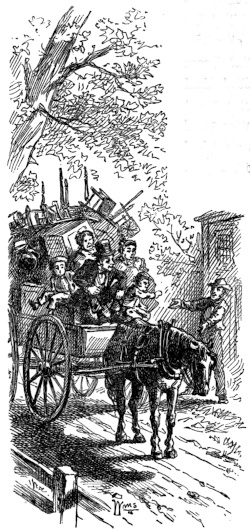
I calmly rose and put on the teakettle, and never
disputed a word with him whether I had a head or
not. Good land! I knew I had one, and what was the
use of arguin’ about it? And I didn’t say nothin’
more about his bargain, for I see it wouldn’t do no
good. ’Twas all settled, and the writin’s drawed.
But I kep’ up a severe thinkin’. I had heard of
Spinks’es folks before. It had come right straight
to me. Miss Ebenezer Gowdey, she that was Nabby
Widrick, her nephew’s wive’s step-mother, old Miss
Tooler, had lived neighber to ’em. And Miss Tooler
told Nabby, and Nabby told me, that they was shiftless
96creeters. But when bargains are all made, it is of no
use tryin’ to convince Josiahs. And I knew if I should
tell Josiah what I had heard he’d only go to arguin’
agin that I hadn’t no head.
So I didn’t say nothin’.
And the next day they
moved in. It seems they
had brought all their
things to Thrashers’es.
They said the house they
had been livin’ in to Zoar
was so uncomfortable they
couldn’t stay
in it a day
longer. But
we heard afterwards—Miss
Tooler
told Nabby
Gowdey with
her own lips—that
they
was smoked
out. The
man that
owned the
house smoked
’em out to get
rid of ’em.
97Wall, as I said, they come. Mr. Spink, his wife,
and his wife’s sister (she was Irish), and the childern.
And oh! how neat Josiah Allen did feel. He was
over there before they had hardly got sot down, and
offered to do anything under the sun for ’em, and
offered ’em everything we had in the house. I,
myself, kep’ cool and collected together. Though I
treated ’em in a liberal way, and in the course of
two or three days I made ’em a friendly call, and
acted well towards ’em.
But instead of runnin’ over there the next day, and
two or three times a day, I made a practice of stayin’
to home considerable; and Josiah took me to do for it.
But I told him I treated them exactly as I wanted
them to treat me. Says I, “A mejum course is the
best course to pursue in nearly every enterprise in life,
neighberin’ especially. I begin as I can hold out. I
lay out to be kind and friendly to ’em, but I don’t
intend to make it my home with them, nor do I want
them to make it their home with me. Once in two or
three days is enough, and enough, Josiah Allen, is as
good as a feast.”
“Wall,” says he, “if I ever enjoyed anything in
this world I enjoy neighberin’ with them folks. And
they think the world of me. It beats all how they
worship me. The childern take to me so, they don’t
want me out of their sight hardly a minute. Spink
and his wife says they think it is in my looks. You
know I am pretty lookin’, Samantha. They say the
98baby will cry after me so quick. It beats all what
friends we have got to be, I and the Spinkses, and it
is agravatin’, Samantha, to think you don’t seem to
feel towards ’em that strong friendship that I feel.”
Says I, “Friendship, Josiah Allen, is a great word.
True friendship is the most beautiful thing on earth;
it is love without passion, tenderness without alloy.
And,” says I, soarin’ up into the realm of allegory,
where, on the feathery wings of pure eloquence, I
fly frequent, “Intimacy hain’t friendship. Two men
may sleep together, year after year, on the same
feather-bed, and wake up in the mornin’, and shake
hands with each other, perfect strangers, made so
unbeknown to them. And feather-beds, nor pillers,
nor nothin’ can’t bring ’em no nigher to each other.
And they can keep it up from year to year, and lock
arms and prominade together through the day, and
not get a mite closer to each other. They can keep
their bodies side by side, but their souls, who can
tackle ’em together, unless nature tackled ’em, unbeknown
to them? Nobody. And then, agin, two persons
may meet, comin’ from each side of the world;
and they will look right through each other’s eyes
down into their souls, and see each other’s image
there; born so, born friends, entirely unbeknown to
them. Thousands of milds apart, and all the insperations
of heaven and earth; all the influences of life,
education, joy, and sorrow, has been fitting them for
101each other (unbeknown to them): twin souls, and they
not knowin’ of it.”
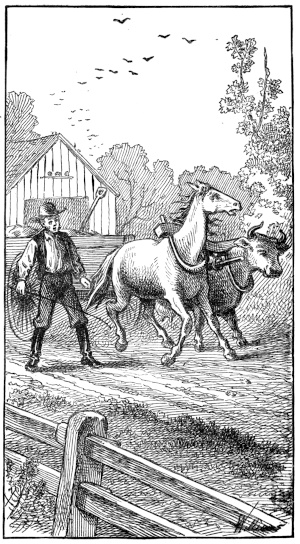
“Speakin’ of twin—” says Josiah.
But I was soarin’ too high to light down that
minute. So I kep’ on, though his interruption was
a-lowerin’ me down gradual.
“There is a great filisofical fact right here, Josiah
Allen,” says I, tryin’ to bring down and fit the idee to
my pardner’s comprehension, for it is ever my way to
try to convince, as well as to soar in oritory. “You
may yoke up the old mare and the brindle cow
together and drive ’em year after year in a buggy.
But you can’t make that horse into a cow, or make
that old cow whinner. It can’t be done. And two
wimmen may each of ’em have half a shear, and think
they will screw ’em together and save property, and
cut some with ’em. But if one of them halves is 2 or
3 inches shorter than the other, and narrower, how
be they goin’ to cut with ’em? All the screws and
wrenches in creation can’t do no more than hold ’em
together. It hain’t no use if they wuzn’t made to fit
each other in the first place, unbeknown to them.”
Says I, “Some folks are j’ined together for life in jest
that way, drawn together by some sort of influence,
worldly considerations, blind fancy, thoughtlessness,
and the minister’s words fasten ’em, jest as these
shears was. But good land! after the vapory, dreamy
time of the honeymoon is passed through, and the
heavy, solid warp and woof of life lays before ’em for
102them to cut a path through it, they’ll find out whether
they fit each other or not. And if they don’t, it is
tejus business for ’em, extremely
tejus, and they’ll find
it out so.”—“Speakin’ of
twin—” says Josiah.
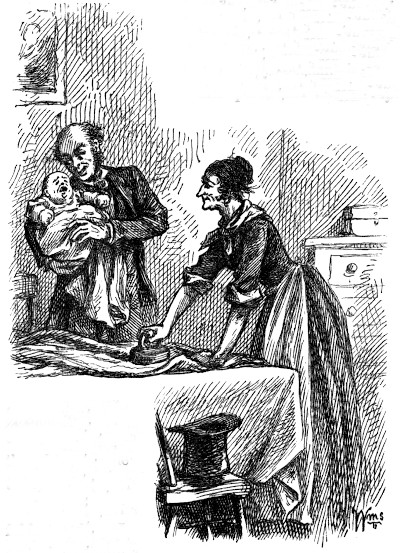
His persistent and stiddy
follerin’ up of his
own train of
thought, and the
twin, was lowerin’
me down now awful
fast, and says I,
sort o’ concludin’
up, “Be good and
kind to everybody, and Mr. Spinks’es folks, as you
have opportunity; but before you make bosom friends
103of ’em, wait and see if your soul speaks.” Says I,
firmly, “Mine don’t, in this case.”
“Speakin’ of twin,” says Josiah agin, “Did you
ever see so beautiful a twin as Mr. Spinks’es twin is?
What a pity they lost the mate to it! Their ma says
it is perfectly wonderful the way that babe takes to
me. I held it all the while she was ironin’, this forenoon.
And the two boys foller me round all day,
tight to my heels, instead of their father. Spink says
they think I am the prettiest man they ever see,
almost perfectly beautiful.”
I give Josiah Allen a look full in his face, a curious
look, very searchin’ and peculiar. But before I had
time to say anything, only jest that look, the door
opened, and Spinks’es wive’s sister come in unexpected,
and said that Miss Spink wanted to borrow
the loan of ten pounds of side pork, a fine comb, some
flour, the dish-kettle, and my tooth-brush.tooth-brush.
I let her have ’em all but the tooth-brushtooth-brush, for I was
determined to use ’em well. And Josiah didn’t like
it at all because I didn’t let that go. And he said in
a fault-findin’, complainin’ axent “that I didn’t seem
to want to be sociable.”
And I told him that “I thought borrowin’ a tooth-brush
was a little too sociable.”
And he most snapped my head off, and muttered
about my not bein’ neighborly, and that I didn’t feel a
mite about neighborin’ as he did. And I made a vow,
then and there (inside of my mind), that I wouldn’t
104say a word to Josiah Allen on the subject, not if they
borrowed us out of house and home. Thinkses I, I
can stand it as long as he can; if they spile our things,
he has got to pay for new ones; if they waste our
property, he has got to lose it; if they spile our comfort,
he’s got to stand it as well as I have; and, knowin’
the doggy obstinacy of his sect, I considered this
great truth, and acted on it, that the stiller I kep’,
and the less I said about ’em, the quicker he’d get
sick of ’em; so I held firm. And never let on to
Josiah but what it was solid comfort to me to have
’em there all the time a most; and not have a minute
I could call my own; and have ’em borrow everything
under the sun that ever was borrowed: garden-sass of
all kinds, and the lookin’-glass, groceries, the old cat,
vittles, cookin’ utensils, stove-pipe, a feather-bed, bolsters,
bed-clothes, and the New Testament.
They even borrowed Josiah’s clothes. Why, Spink
wore Josiah’s best pantaloons more than Josiah did.
He got so he didn’t act as if he could stir out without
Josiah’s best pantaloons. He’d keep a tellin’ that he
was goin’ to get a new pair, but he didn’t get ’em, and
would hang onto Josiah’s. And Josiah had to stay to
home a number of times jest on that account. And
then he’d borrow Josiah’s galluses. Josiah had got
kinder run out of galluses, and hadn’t got but one pair
of sound ones. And Josiah would have to pin his
pantaloons onto his vest, and the pins would lose out,
and it was all Josiah could do to keep his clothes on.
105It made it awful bad for him. I know one day, when I
had a lot of company, I had to wink him out of the
room a number of times, to fix himself so he would be
decent. But all through it I kep’ still, and never said
a word. I see we was loosin’ property fast, and had
lost every mite of comfort we had enjoyed, for there
was some of ’em there every minute of the time, a
most, and some of the time two or three of ’em. Why,
Miss Spink used to come over and eat breakfast with
us lots of times. She’d say she felt so mauger that
she couldn’t eat nothin’ to home, and she thought
mebby my vittles would go to the place. And besides
losin’ our property and comfort, I’ll be hanged if I
didn’t think sometimes that I should lose my pardner
by ’em, they worked him so. But I held firm.
Thinkses I to myself, it must be that Josiah will get
sick of neighborin’, after a while, and start ’em off.
For the sufferin’s that man endured couldn’t never be
told nor sung.
Why, before they had been there a month, as I told
sister Bamber,—she was to our house a visitin’, and
Josiah was in the buttery a churnin’, and I knew he
wouldn’t hear,—says I: “They have borrowed everything
I have got, unless it is Josiah.”
And if you’ll believe it, before I had got the words
out of my mouth, Miss Spinks’es sister opened the
door, and walked in, and asked me “if I could spare
Mr. Allen to help stretch a carpet.”
And I whispered to sister Bamber, and says I: “If
106they haint borrowed the last thing now; if they haint
borrowed Josiah.”
But I told the girl “to take him an’ welcome.” (I
was very polite to ’em, and meant to be, but cool.)
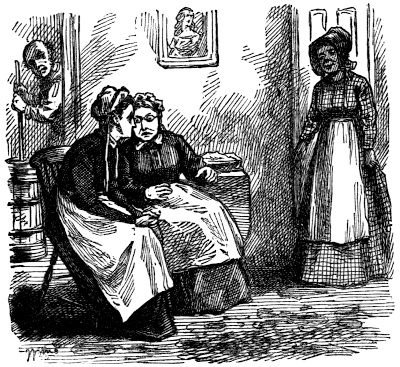
So I took holt and done the churnin’ myself, and
let him go. And he come home perfectly tuckered
out. Wasn’t good for nothin’ hardly for several days.
He got strained somehow a pullin’ on that carpet.
But after that they would send for him real often to
help do some job. They both took as much agin liberty
with Josiah as they did with me; they worked
him down almost to skin and bones. Besides all the
109rest he suffered. Why, his cow-sufferin’ alone was
perfectly awful. They had a cow, a high-headed
creeter; as haughty a actin’ cow as I ever see in my
life. She would hold her head right up, and walk
over our fence, and tramp through the garden. I
didn’t know how Josiah felt about it, but I used to
think myself that I could have stood it as well agin if
it hadn’t been so high headed. It would look so sort
o’ independent and overbearin’ at me, when it was
a walkin’ through the fence, and tramplin’ through
the garden. Josiah always laid out his beds in the
garden with a chalk-line, as square and beautiful as
the pyramids, and that cow jest leveled ’em to the
ground. They tied her up nights, but she would get
loose, and start right for our premises; seemed to take
right to us, jest as the rest of ’em did. But I held
firm, for I see that gettin’ up night after night, and
goin’ out in the night air, chasin’ after that cow, was
coolin’ off my companion’s affection for the Spinkses.
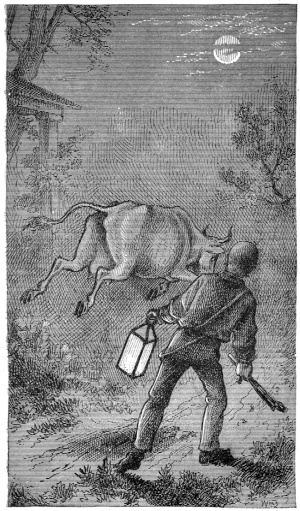
SPINKS’ES COW—A NIGHT SCENE.
And then they kept the awfulest sight of hens. I
know Josiah was dretful tickled with the idee at first,
and said, “mebby we could swap with ’em, get into
their kind of hens.”
And I told him in a cautious way “that I shouldn’t
wonder a mite if we did.”
Wall, them hens seemed to feel jest as the rest of
the family did; didn’t seem to want to stay to home a
minute, but flocked right over onto us; stayed right
by us day and night; would hang round our doors and
110door-steps, and come into the house every chance they
could get, daytimes; and nights, would roost right
along on the door-yard
fence, and the front
porch, and the lilack
bushes, and the pump.
Why, the story got out
that we was keepin’ a
hen-dairy, and
strangers who thought
of goin’ into the business
would stop and
holler to Josiah, and
ask him if he found it
profitable to keep so
many hens. And I’d see that man shakin’ his fist at
’em, after they would go on, he would be that mad at
111’em. Somehow the idee of keepin’ a hen-dairy was
always dretful obnoxious to Josiah, though it is perfectly
honorable, as far as I can see.
Finally, he had made so much of ’em, the two boys
got to thinkin’ so much of Josiah that they wanted to
sleep with him, and he, thinkin’ it wouldn’t be neighborly
to refuse, let ’em come every little while. And
they kicked awfully. They kicked Josiah Allen till he
was black and blue. It come tough on Josiah, but I
didn’t say a word, only I merely told him “that of
course he couldn’t expect me to sleep with the hull
neighborhood,” so I went off, and slept in the settin’-room
bedroom. It made me a sight of work, but I
held firm.
At last Spink and his wife, and his wife’s sister, got
into the habit of goin’ off nights to parties, and
leavin’ the twin with Josiah. And though it almost
broke my heart to see his sufferin’s, still, held up by
principle, and the aim I had in view, I would go off
and sleep in the settin’-room bedroom, and let Josiah
tussle with it. Sometimes it would have the colic
most all night, and the infantum, and the snuffles.
But, though I could have wept when I heerd my pardner
a groanin’ and a sithein’ in the dead of night, and
a callin’ on heaven to witness that no other man ever
had the sufferin’s he was a sufferin’, still, held up by
my aim, I would lay still, and let it go on.
It wore on Josiah Allen. His health seemed to be
a runnin’ down; his morals seemed to be loose and
112totterin’; he would snap me up every little while as if
he would take my head off; and unbeknown to him I
would hear him a jawin’ to himself, and a shakin’ his
fist at nothin’ when he was alone, and actin’. But I
kep’ cool, for though he didn’t come out and say a
word to me about the Spinkses, still I felt a feelin’
that there would be a change. But I little thought
the change was so near.
But one mornin’ to the breakfast-table, as I handed
Josiah his fourth cup of coffee, he says to me, says he:
“Samantha, sposen we go to Brother Bamberses
to-day, and spend the day. I feel,” says he, with a
deep sithe, “I feel as if I needed a change.”
Says I, lookin’ pityingly on his pale and haggard
face, “you do, Josiah,” and says I, “if I was in your
place I would speak to Brother Bamber about the
state of your morals.” Says I, in a tender yet firm
tone, “I don’t want to scare you, Josiah, nor twit you,
but your morals seem to be a totterin’; I am afraid
you are a back-slidin’, Josiah Allen.”
He jumped right up out of his chair, and shook his
fist over towards the Spinks’es house, and hollered out
in a loud, awful tone:
“My morals would be all right if it wuzn’t for them
dumb Spinkses, dumb ’em.”
You could have knocked me down with a pin-feather
(as it were), I was that shocked and agitated;
it had all come onto me so sudden, and his tone was so
loud and shameful. But before I could say a word he
113went on, a shakin’ his fist vehementer and wilder than
I ever see a fist shook:
“I guess you be neighbored with as I have been,
and slept with by two wild-cats, and be kicked till you
are black and blue, and mebby you’d back-slide!”
SaysSays I: “Josiah Allen, if you don’t go to see
Brother Bamber to-day, Brother Bamber shall come and
see you. Did I ever expect to live,” says I, with a gloomy
face, “to see my pardner rampagin’ round worse than
any pirate that ever swum the seas, and shakin’ his
fist, and actin’. I told you in the first on’t, Josiah
Allen, to begin as you could hold out.”
“What if you did?” he yelled out. “Who thought
we’d be borrowed out of house and home, and visited
to death, and trampled over by cows, and roosted on;
who s’posed they’d run me over with twin, and work
me down to skin and bone, and foller me ’round tight
to my heels all day, and sleep with me nights, and
make dumb lunaticks of themselves? Dumb em!”
Says I in firm accents, “Josiah Allen, if you swear
another swear to-day, I’ll part with you before Squire
Baker.” Says I, “It betters it, don’t it, for you to
start up and go to swearin’.”
Before Josiah could answer me a word, the door
opened and in come Miss Spink’ses sister. They
never none of ’em knocked, but dropped right down
on us unexpected, like sun-strokes.
Says she, with a sort of a haughty, independent
114mean onto her (some like their cow’s mean), and
directin’ her conversation to Josiah:
“Mr. Spink is goin’ to have his likeness took,
to-day, and he would be glad to borrow the loan of
your pantaloons and galluses. And he said if you
didn’t want your pantaloons to go without your boots
went with ’em, he guessed he’d wear your boots, as his
had been heel-tapped and might show. And the two
boys bein’ so took up with you, Mr. Allen, their Ma
thought she’d let ’em come over here and sleep with
you while they was gone; they didn’t know but they
might stay several days to her folks’es, as they had
heard of a number of parties that was goin’ to be held
in that neighborhood. And knowin’ you hadn’t no
little childern of your own, she thought it might be
agreeable to you to keep the twin, while they was gone—and—and—”
She hadn’t got through with her speech, and I don’t
know what she would have tackled us for next. But
the door opened without no warnin’, and in come Miss
Spink herself, and she said that “Spink had been urgin’
her to be took, too, and they kinder wanted to be took
holt of hands, and they thought if Josiah and me had
some kid gloves by us, they would borrow the loan of
’em; they thought it would give ’em a more genteel,
aristocratic look. And as for the childern,” says she,
“we shall go off feelin’ jest as safe and happy about
’em as if they was with us, they love dear Mr. Allen
so.” And says she with a sweet smile, “I have lived
115on more places than I can think of hardly—we never
have lived but a little while in a place, somehow the
climates didn’t agree with us long at a time. But
never, in all the places we have lived in, have we ever
had such neighbors, never, never did we take such
solid comfort a-neighborin’, as we do here.”
Josiah jumped right upon his feet, and shook his fist
at her, and says he, in a more skareful tone than he
had used as yet:
“You have got to stop it. If you don’t stop neighberin’
with me, I’ll know the reason why.”
Miss Spink looked skairt, and agitated awful, but I
laid hands on him, and says I, “Be calm, Josiah Allen,
and compose yourself down.”
“I won’t be calm!” says he; “I won’t be composed
down.”
Says I, firmly, still a-keepin’ between him and her,
and still a-layin’ holt of him, “You must, Josiah!”
“I tell you I won’t, Samantha! I’ll let you know,”
says he, a-shakin’ his fist at her powerful, “I’ll let
you know that you have run me over with twin for the
last time; I’ll let you know that I have been trampled
over, and eat up by cows, and roosted on, and slept
with for the last time,” says he, shakin’ both fists at
at her. “You have neighbored your last neighbor
with me, and I’ll let you know you have.”
Says I, “Josiah Allen, I tell you to compose yourself
down.”
“And I tell you again, Samantha, that I won’t!”
116But I could see that his voice was sort ’o lowerin’
down, and I knew the worst was over. I spoke sort ’o
soothin’ly to him, and told him, in tender axents, that
he shouldn’t be neighbored with another mite; and
finally, I got him quieted down. But he looked bad
in the face, and his sithes was fearful.
My feelin’s for that man give me strength to give
Miss Spink a piece of my mind. My talk was calm,
but to the purpose, and very smart. It was a very
little on the allegory way. I told her jest how I felt
about mejum courses; how sweet and happyfyin’ it
was to pursue ’em.
Says I, “Fire is first-rate, dretful comfortin’ for
warmin’ and cookin’ purposes; too much fire is bad,
and leads to conflagrations, martyrs, and etcetery.
Water is good; too much leads to drowndin’, dropsy,
and-so-forth. Neighborin’ is good, first-rate, if follered
mejumly. Too much neighborin’ leads to weariness,
anarky, kicks, black and blue pardners, and almost
delerious Josiahs.”
As quick as I mentioned the word kick, I see a
change in Josiah’s face; he begun to shake his fist,
and act; I see he was a-growin’ wild agin; Miss Spink
see it too, and she and her sister fled.
That very afternoon Josiah went to Jonesville and
served some papers onto ’em. They hadn’t made no
bargain, for any certain time, so by losin’ all his rent,
he got rid of ’em before the next afternoon. And
says he to me that night, as he sot by the fire rubbin’
117some linement onto his legs where he had been kicked,
says he to me:
“Samantha, if any human bein’ ever comes to rent
that house of me, I’ll shoot ’em down, jest as I would
a mushrat.”
I knew he had lost over two hundred dollars by ’em,
and been kicked so lame that he couldn’t stand on his
feet hardly. I knew that man had been neighbored
almost into his grave, but I couldn’t set by calmly and
hear him talk no such wickedness, and so says I:
“Josiah Allen, can’t you ever learn to take a mejum
course? You needn’t go round huntin’ up renters, or
118murder ’em if they come nigh you.” Says I, “You
must learn to be more moderate and mejum.”
But he kep’ right on, a-pourin’ out the linement on
his hand, and rubbin’ it onto his legs, and stuck to it
to the last. Says he, “I’d shoot him down, jest as I
would a mushrat; and there hain’t a law in the land
but what would bear me out in it.”
119

MORALIZIN’ AND EPISODIN’.
Anybody would have thought that this episode
(Spink episode) would have sickened Josiah
Allen of launchin’ out into any more headwork, and
tryin’ to made money on a speck. But if you’ll believe
it, Jonathan Spink’ses folks hadn’t been gone three
weeks—for Kitty come back the day after Spink’ses
folks left, and she only stayed with us two weeks that
time, havin’ promised to stay a spell to Thomas Jefferson’s,
and it was only a few days after she went—and
then I knew by Josiah’s legs—the black-and-blue
spots hadn’t begun to wear off; they had just begun
to turn yaller—and then I knew by my head-dress,
too—when that man come home from Jonesville one
night, cross as a bear.
I said I knew by my new head-dress. I well remember
I had wore it that afternoon for the first time,
some expectin’ very genteel company, and wantin’ to
look well. But the company didn’t come, and Kellup
Cobb did. He come to bring home a cent he had
120borrowed the night before at the missionary meetin’
to send for his annual gift to the heathens. And he
noticed my new cap in a minute. He looked witherin’
and overbearin’ at it, and in a sort of a back-handed,
underground way, that I can’t bear, nor never could,
he begun to throw hints at me about it. About
married women and members of meetin’-housen
spendin’ their money in such extravagance, when
they might spend it in spreadin’ the Gospel in benighted
lands—and about how awful wicked it was to
be so dressy—and et cetery, et cetery.
My cap wuz middlin’-foamin’ lookin’. I couldn’t
deny it, and didn’t try to. It wuzn’t what you might
call over and above dressy, but it was handsome, and
very nice. The ribbin on it cost me 18 pence per yard,
and the cap contained two yards and a half; it was
very nice. But none too good for me, my Josiah said.
He is what you may call a close man at a bargain.
(Tight, would perhaps be a better word to express his
situation.) But he loves dearly to see me look beautiful.
And he is very gay in his tastes; red is his favorite
color, and the more fiery shades of yellow; he would
be glad to see me dressed in these tints all the time.
But I don’t encourage him in the idee. Not that I
think one color is wickeder than another, but they
don’t seem to be becomin’ to my style and age.
Now this new head dress, I had picked it out and
selected it with my pardner by my side, and he whispered
to me loud, as I was a-selectin’ of it: “If you
121have got to have a new cap, Samantha, for mercy’s
sake get a red one.”
But I whispered to him that I should look like a
fool with a red cap on, and to keep still.
And then he whispered agin, in a more anxious
tone: “Wall then, for pity’s sake do get yeller, or
sunthin’ that has got a little color to it. Black!
black! the whole of the time; you look jest like a
mourner.”
I had a black one on my hand at that time, admirin’
122of it, and most settled on it. But Josiah’s mean was
such as I was a-settlin’, that I, as a devoted pardner,
and a woman of principle, compromised the matter
with Josiah and Duty, by purchasin’ one trimmed
with a sort of a pinky, lilock color. It was very becomin’
to me. But I won’t deny, as a woman who is
bred to tellin’ the truth, and not gin to deceit and coverin’
up,—I won’t deny that the first time I tried that
head-dress on after I got home, I had my curious feelin’s.
I thought mebby it was wrong for me to buy such
costly ribbin, and so much of it. And then I worried
about the color, too. Thinkses I, mebby it is too
young for me; too young for a woman who owns a
bald-headed pardner and a grandchild, and who has
but few teeth left in her head.
My conscience is a perfect old tyrent, and jest
drives me round more’n half the time. I am willin’
to be drove by her as fur as I ort to be. But sometimes,
I declare for’t, I get so tuckered out with her
drivin’s, that I get fairly puzzled, and wonderin’
whether she knows herself all the time jest what she
is about; whether she is certain that she is always
a drivin’ me in the right road; and how fur I ort to
be drove by her, and when, and where to; and whether
I ort to let my intellect and common sense lay holt
and help her drive. As I say, she run me considerable
of a run on this head-dress. I had a awful time
of it, and won’t deny it, and I was on the very pint
several times of carryin’ it back. But when Kellup
123come right out, and gin such powerful hints about it;
about extravagance, and wickedness, and vanity; and
about married wimmen settin’ sinful patterns to them
outside of meetin’-housen, and that it didn’t look likely,
and et cetery, et cetery, and so forth.
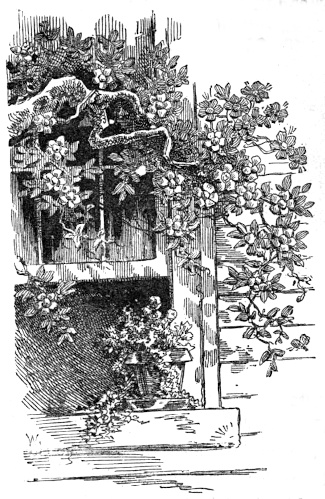
Why, as he went on a
hintin’ so powerful strong,
and givin’
such burnin’
glances
onto that
head-dress,
why, I sort
o’ sprunted
up, and begun
to see
things on
the other
side plainer
than I had
seen ’em.
Then says I, as
the eyes of my
specks rested upon
the apple-boughs
that filled the north
kitchen winder with a glow of rosiness and sweetness:
“The Lord don’t seem to think as you do, Kellup.
Jest see how He has dressed up that old apple-tree.”
124Says I: “No fashionable belle in New York or Paris
village can ever hope to wear garments so daintily fine
and sweet. No queen nor empress ever wore or ever
will wear for their coronation robes such splendid and
gorgeous raiment as
the common spring suit
of that old apple-tree.”
Says Kellup, holdin’
his head well up in the
air, and drawin’ his lips
down with a very self-righteous
drawin’, that
I knew meant head-dress,
though he didn’t
come right out and say
it:
“I despise and detest
the foolishness of display. There is more important
and serious business on earth than dressin’ up to
look nice.”
“That is so,” says I, “that is jest as true as you
live. Now that old apple tree’s stiddy business and
theme is to make sweet, juicy apples; but at the same
time that don’t hender her from dressin’ up, and
lookin’ well. The Lord might have made the apples
grow in rows right round the trunk from top to bottom,
with no ‘foolishness of display’ of the rosy coloring
and perfume—but He didn’t. He chose in His wisdom,
which it is not for you or me to doubt, to make it a
125glory and a delight to every beholder. So beautiful
that the birds sail and sing with very joy in and out
of the sweet branches, and the happy bees hum delightedly
about the honey-laden cells, and she whose name
was once Smith, has been made happy as a queen all
day long, by jest lookin’ out of that window down into
the fragrant, rosy depths of sweetness and light.”
“Wall,” says Kellup, lookin’ keen at my head-dress,
“I don’t consider it likely, anyway, to spend so much
time a dressin’ up—it is a shiftless waste of time,
anyway.”
“Why,” says I; for the more he scolded me, the
plainer I see the other side of things. So curious are
human bein’s constituted and sot.
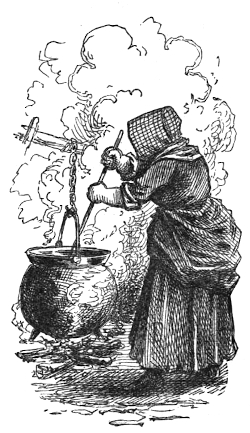
“Nater has always been considered likely—I never
heard a word against her character, and she is stiddy
minded, too, and hard workin’. She works hard,
Nater does. She works almost beyond her strength
sometimes. She has sights of work on her hands all
the hull time, and she has a remarkable knack of
turnin’ off tremendous day’s works. And I never in
my hull life heard her called shiftless or slack. But
what a case she is to orniment herself off; to rag out
and show herself in so many different colors. And if
she feels better to be dressed up and fixed off kinder
pretty while she’s to work, I don’t know whose business
it is. I never was no case myself to dress up in
white book muslin, or pink silk, or bobonet lace, or
anything of that kind, when I was a doin’ hard jobs,
126such as makin’ soap, and runnin’ candles, and cleanin’
house, and etcetery. And when I have got to be out
in the rain when it is all drabbly and muddy, why I
jest wrap up and look
like fury. But she
don’t. No! I have
known her time and
agin to tie the most
gorgeous and shinin’
rainbow round her old
waist and jest lay herself
out to look foamin’
and dressy, right there
in the rain.
“It beats all how she
does fix herself up.
But it don’t hurt my
feelin’s at all. I never
was a mite jealous of
other females lookin’
better than I did.
The better they look, the better I enjoy lookin’ at ’em.
And if Nater can dress up better and look better
while she is a doin’ her spring work and all her other
hard jobs than I can, good land! how simple it would
be in me to blame her. There is where I use such
cast-iron reason. You don’t ketch me a blamin’ other
folks for their little personal ways and habits that
don’t do nobody no hurt. She is well off, Nater is,
and able to do as she is a mind to; she has got plenty
127to do with; she don’t have to scrimp herself to buy
flowers, and tossels, and rainbows. If she did, I
shouldn’t approve of it in her, not at all. I despise
folks goin’ beyond their means to look pretty. I
think it is wicked, and the height of dretfulness. But
if them that are abundantly able and willin’ want to
look nice, I say, let ’em look.”
And I cast a conscious and sort of a modest glance
up into the lookin’-glass that hung over the table. I
could jest ketch a glimpse of my head-dress, and I see
that its strings floated out noble, and I see at the same
glance that he was still lookin’ witherin’ at it. But I
didn’t care a mite for it. I was jest filled with my
subject (that side of it, for every subject has got
more’n a dozen sides to it), and the more he cast
them witherin’ looks onto me the more I wuzn’t
withered—but soared up in mind, and grew eloquent.
And I went on fearfully eloquent about Nater, and
the way she fixed herself up perfectly beautiful—right
when she was a workin’ the hardest.
“Why,” says I, “when she goes way down into the
depths of the under world to make iron, and coal, and
salt, and things that has got to be made, and she has
got to make ’em—why, she can’t be contented way
down there in the dark, all alone by herself, without
deckin’ herself off with diamonds, and all sorts of
precious gems, and holdin’ up wreaths of shinin’ crystal,
enameled fern fronds, and hangin’ clusters snowy
white, and those shinin’ with every dazzlin’ hue.
128“And way down on the ocean floor, fifteen miles or
so down below, where she would naturally expect nobody
would come a visatin’—why, way down there,
where she must know that there hain’t no company
liable to drop in on her onexpected, yet every minute
of the time she is all ornimented off with pearls, and
opal-tinted shells, daintest green and crimson seagrass,
gem-like purple astreas, wonderful pink and
white coral wreaths—all strange and lovely blossoms
of the sea.
“What tongue can tell the wonders of the beauty she
arrays herself with way down there in the dark alone.
How every little bud of beauty is wreathed around
with other marvels of loveliness—how all about one
tiny little bit of a blossom will be twined other wonderful
little flowerin’ vines, starred with crystal bells.
“No tongue can ever describe it—not mine, certainly,
for I say but little myself, and that little is
far too small to express these wonders of beauty.
“And then right round here, when she is to work
right here in our fields, doin’ her common run of
hard work—such as makin’ wheat, and oats, and other
grain. No matter how hot the weather is, or muggy;
no matter whether she is behindhand with her work,
and in a awful hurry—she always finds time to scatter
along in the orderly ranks of the grain, wild red poppies
and blue-eyed asters. And I never in my life,
and Josiah never did, see her ever make a solid ear of
corn without she hung on top of it a long silk tossel.
131And I don’t believe she ever made a ton of hay in the
world, if she had her own way about it, but what she
made it perfectly gay with
white daisies and butter-cups.
“And all the gardens of the
world she glorifies, and all the
roads, and hedges, and lanes,
and by-ways. No matter how
long and crooked they are, or
how tejus, she scatters blossoms
of brightness and beauty
over them all.
“And clear up on the highest
mountains, under the shadow
of the everlastin’ snows, she
will stop to lay a cluster of
sweet mountain
anemones and Alpine
roses on the
old bosom—for she
is a gettin’ considerable
along in
years, Nater is.
Not that I say it in
a runnin’ way at
all, or spiteful, or
mean. But I s’pose
she is older than
we have any idee
132of—as old agin as folks call her. But she acts young,
and looks so. She holds her age remarkable, as has
been often remarked about a person whose name was
once Smith.
“Why, she acts fairly frisky and girlish sometimes.
Way down in the lowest valleys, down by the most
hidden brook-side, she will sit down to weave together
the most lovely and coquetish bunches of fern and
grasses, and scarlet and golden wild flowers, and deck
herself up in ’em like a bride of 16. You never
ketched her runnin’ in debt for a lot of stuff though—her
principles are too firm. But she goes on makin’
beauty and gladness wherever she goes, and lookin’
handsome, and if it had been wicked the Lord
wouldn’t have let her go on in it. He could have
stopped her in a minute if He had wanted to. She
does jest as He tells her to, and always did.
“And,” says I, with considerable of a stern look
onto Kellup, “if Nater—if she who understands the
unwritten language of God, that we can’t speak yet—if
she, whose ways seem to us to be a revelation of
that will of the Most High—if she can go on wreathing
herself in beauty, I don’t think we should be
afraid of gettin’ holt of all we can of it—of all lovely
things. And I don’t think,” says I, givin’ a sort of a
careless glance up into the lookin’-glass, “that there
should be such a fuss made by the world at large about
my head-dress.”
“But,” says Kellup, a groanin’ loud and violent,
133“it is the wickedness of it I look at. To follow the
vile example of the rich. And oh! how wicked rich
folks be. How hard-hearted, how unprincipled, and
vile.” And agin he groaned, deep.
Says I, “Don’t groan so, Kellup,” for it was truly
skairful to hear him.
Says he, “I will groan!” Says he, “The carryin’s
on and extravagance of the rich is enough to make a
dog groan.”
I see I couldn’t stop his groanin’, but I went on a
talkin’ reasonable, in hopes I could quell him down.
Says I, “There is two sides to most everything,
Kellup, and some have lots of sides. That is what
makes the world such a confusin’ place to live in. If
things and idees didn’t have but one side to ’em, we
could grab holt of that side, hold it close, and be at
rest.
“But they do. And you must look on both sides of
things before you make a move. You mustn’t confine
yourself to lookin’ on jest one side of a subject, for it
hain’t reasonable.”
“I won’t try to look on both sides,” says he with a
bitter look. “That is what makes folks onsettled and
onstabled in their views, and liberal. But I won’t.
I am firm and decided. I am satisfied to look on one
side of a subject—on the good old orthodox side.
You won’t ketch me a whifflin’ round and lookin’ on
every side of a idee.”
“Wall,” says I, calmly, for to convince, and not
134to anger, is ever my theme and purpose. And
knowin’ that to the multitude truth is most often
palatable if presented in a parabolical form, and has
been for centuries often imbibed by them in that way,
entirely unbeknown to them. And knowin’ that the
little scenes of daily life are as good to wrap round
morals and cause ’em to be swallowed down unbeknowin’,
as peach preserves are to roll round pills, I
went on and says:
“If you won’t look on only one side of a subject,
Kellup, you may find yourself in as curious a place as
Melvin Case was last fall. His wife told it herself to
Miss Gansey, and Miss Gansey told the editor of the
Augurs’es wife, and the editor of the Augurs’es wife
told Miss Mooney, and she told the woman’s first husband’s
mother-in-law that told me. It come straight.
“It was a very curious situation, and the way on’t
was: Melvin Case, as you know, married Clarinda
Piller of Piller P’int, down on the Lake Shore road.
Wall, they had been married 23 years and never had
no childern, and last fall they had a nice little boy.
He was a welcome child, and weighed over 9 pounds.
“Wall, Malvin thought the world of his wife, and
bein’ very tickled about the boy, and feelin’ very affectionate
towards his wife at the time, he proposed at
once that they should call him after her maiden name—Piller.
Of course she give her willin’ consent, and
they was both highly tickled. But you see, bein’
blinded by affection and happiness, they didn’t look on
135only one side of the idee, and they never studied on
how the two names was a goin’ to look when they was
put together, till after he had wrote it down in the
Bible; and then he paused, with his pen in his hand,
and looked up perfectly horrified at his wife, who was
holdin’ the baby in her arms and lookin’ over his
shoulder, and she looked perfectly dumbfoundered at
him, for they see it looked awful—Piller Case.
“Now you are lookin’ at one side of the subject, but
there is another side to it, Kellup,—there is as sure
as you live and breathe.
136“God knows too much cannot be said or sung about
the duty the rich owe to the poor. They cannot study
too correctly, and follow too closely the pattern that
He, the loving Elder Brother, set them. He who was
so tender in His compassion; so helpful and thoughtful
to the claims of the poor and humble. But charity is
a big word, and it has more than one side to it. It
means charity to the poor, under whose lowly roofs
He once entered, a child of the poor, and so consecrated
them honorable for all time. Those who were His
closest friends through His toilsome earthly life; those
whom He loved first, and loved last; cared for even
in that supreme moment of His most triumphant and
glorious ignominy. Shall not His followers forever
love and bless those He hallowed by His tender care in
such a moment? Yes, charity to the poor first. But
we mustn’t stop there, Kellup. We may want to set
right down in front of that side of the word, and stay
there. But we mustn’t. If we want to view this
heavenly word on every side we must walk round on
the other side of it, and see that it means, too, charity
to the rich. A higher, subtler quality of charity it
calls for in us than the other.
“For I can tell you, Kellup, some folks say it is a
tough job for one to keep a sweet, charitable, loving
spirit towards them that are richer, more successful,
and happier than they be. Hard for ’em to rejoice
over the good fortune of the great. Hard for ’em to
137keep from judgin’ them severely—from feelin’ envious
over the good fortune they cannot share.
“We are exhorted
to feel sorry for the
man who falls down
and breaks his leg.
We are exhorted to
feel christian toward
that humble man. But
though there hain’t much
said on the other side of
the subject, I think it is
enough sight harder to
feel christian towards that man when we are a layin’
flat on the ice, or slippery sidewalk, and he is a standin’
up straight.
“It is easy to deceive ourselves; easy to give very
big, noble names to very small emotions. And if we
138feel uncomfortable to see some one else who has always
stood on the same level with ourselves suddenly lifted
above us,—no matter how worthily he may have earned
that more exalted station,—we may call that uncomfortable
feelin’ any name we please. We may call it a
holy horror of worldly-mindedness—a hauntin’ fear
lest he be jeopardizin’ his immortal soul, by settin’ up
on that loftier spear. And mebby it is. I hain’t a
goin’ to come right out and say that it hain’t. But I
will say this, for there hain’t no harm in it, and it
can’t make no trouble. I will say that if we feel this
uncomfortable feelin’ we ort to keep a close watch of
our symptoms. For though that gripin’ pain in the
left side may be a religious pain, yet there is a possibility
that it may be envy. And if it is, it requires
fur different treatment. And it may be a self-righteous,
Pharasaical feelin’ that our Lord seemed to hate worst
of any feelin’ we could feel.
“I tell you it requires the very closest dognosing
(to use a high learnt medical phrase) to get the symptoms
exactly right, and see exactly what aches we are
a achin’. For the heart that we imagine is a gripin’
and a achin’ at sinful worldly-mindedness, may be a
achin’ with the consumin’ fever of spite, and envy and
revenge,—the heart-burnin’ desire and determination to
bring the loftier and the nobler down in some way on
a level with ourselves, if not by fair means, with the
foul ones of malice and slander and lies.
“I don’t say it is so; but I say, let us be careful,
139and let us be charitable to all,—the rich and the poor,—for
charity, Kellup, like the new linen ulsters, covers
a multitude of sinners.
“Now,” says I, metaforin’ a little, as I might have
known I should before I got through, “now if I was a
woman, and should say that to wear diamonds was
wicked, or to live in a beautiful home full of books and
pictures, and all the means of ease and culture was an
abomination to me, and wicked, when I was hankerin’
in the very depths of my soul to be wicked in jest that
way, if I only had the wherewith to be wicked with,
why, that holy horror I professed would be vain in
me; empty as soundin’ brass and tinglin’ symbols.
Let us be honest and true first, and then put on more
ornamental christianity afterwards; there hain’t no
danger of our gettin’ any too much of it, that is, of the
right kind. Envy and hypocracy and cant look worse
to me than diamonds; and I would wear the diamonds
as quick agin—if I got the chance.”
Kellup didn’t look a mite convinced. But I kep’
right on, for though I am a woman that says but little,
yet when I begin to convince anybody I always want
to finish up the job in a handsome, thorough way, and
then I felt real eloquent; and I tell you it is hard,
even for a close-mouthed woman, it is hard for ’em
when they feel as eloquent as I did then to keep from
swingin’ right out and talkin’, and I didn’t try to stop
myself; I kep’ right on, and says I:
“It is a mistake in you and in me if we think that
140every rich person is necessarily a hard-hearted one; if
we think a tender heart cannot beat jest as warmly
and truly aginst a ermine robe, as a shabby overcoat;
aginst a rich boddist waist, as a calico bask. There
are little, stingy, narrow, contracted souls in every
station-house of life, high ones and low ones; and
there are loving, generous ones, visey versey, and the
same. And God bless those tender hearts where-ever
they are; those who in lofty places organize the
great charities whose benefactions bless the nations in
famine, in war, and in the calamity of national sickness
and distress. And Heaven bless the lowly toilers
of life, whose humble gifts out of their scanty means
are in God’s sight equally as great.
“The little blue potato-blossom laid upon the pillow
of the sick by the child of poverty—we think the perfume
of that little odorless flower will rise to Heaven
as sweet as the most royal blossom given by the children
of kings. The blossoms of true charity are all
sweet in Heaven’s sight.”
And says I, lookin’ up to the ceilin’ in a almost
rapped eloquence of mean, and a lofty fervency and
earnestness of axent:
“Heaven bless all the generous, loving hearts that
beat under any and every colored robe; under the
shabby garb of poverty; the somber hue of some consecrated
sisterhood of compassion; under the quaint
Quaker garb, or the bright silks of the Widder Albert’s
generous daughters; those who conscientiously wear
143sober clothing, and those who jest as innocently wear
brighter apparel. Heaven bless them all; the gray-robed
sisterhood of Mercy, God’s dove-colored angels,
who lean over the beds of the sick and the sorrowing,
and whose shadows falling by the beds of pain the
sad-eyed soldiers kiss; Catholic or Protestant, whatever
their creed, they have the divinest gift of the
three—the divine gift of Charity. God made them
all—the rose and the gray; the blue sky, the rainbow,
and the soft shadow of the twilight clouds. He made
the earth for His beloved; nothing is too good for
144them, or too beautiful. And why should one color
boast over another, as being purer-minded, and less
wicked?”
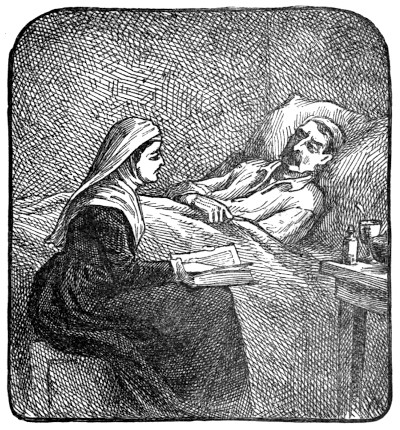
I had been very eloquent, and felt considerable eloquent
still, but happenin’ to let the eye of my speck
fall for a minute on Kellup, I see by the awful unbelievin’
look on his face that I had got to simplify it
down to his comprehension. I see that he did not
understand my soarin’ ideas as I would wish ’em to
be understood.
Not that I blamed him for it. Good land! a tow
string hain’t to blame for not bein’ made a iron spike.
But at the same time it is bad and wearisome business
for the one who attempts to use that tow string for a
spike—tries to drive it into the solid wall of argument
and clinch a fact with it. I had said a good deal
about beauty, but it seemedseemed as if I wanted to say
sunthin’ more, and I went on and said it:
“Some folks seem to be afraid of beauty; as ’fraid
of it as if it was a bear. They seem to be more afraid
of lettin’ a little beauty into their lives than they be of
lettin’ the same amount of wickedness in. You would
think a man was awful simple who would spend his
hull strength in puttin’ up coverin’s to his windows to
keep out the sunshine and fresh air, and not pay any
attention to the obnoxious creeters, wild-cats, burglars,
and etcetery that was comin’ right into the open front-door.
And it hain’t a mite more simple than it is
for them, for they take so much pains a puttin’ up iron
145bars (as it were) across the windows of their souls to
keep beauty and brightness and innocent recreation
out of it, that they have no time to see how uncharitableness
and envy and malice and hatred and a hull
regiment of just such ugly creeters
are troopin’ right into the
front-door unbeknown to them.

“They seem to take a pride in
despisin’ beauty, as if it was a
merit in them to look down upon,
and feel hauty and contemptuous
toward the divinest and loveliest
thing God ever made. I
don’t feel so, Kellup. I don’t
think it is wicked for me to lay holt
of all the beauty and happiness
that I can, consistently with my
duty to humanity and Josiah.
“There are some things that
must be done first of all. We
must hold the spear firm and
upright. We must carry our
principles stiddy and firm. But
we have a perfect right and privilege to wreath that
spear and them principles with all the blossoms of
brightness and innocent happiness we can possibly
lay holt of. Them is my opinions. Howsomever,
everybody to their own mind.”
“Beauty the divinest thing God ever made!” says
146Kellup in a hauty, ironical tone. “How dare you be
so wicked, Josiah Allen’s wife? I call it awful wicked
to talk so.”
Says I, “I don’t believe anything is wicked that lifts
us right up nearer to Heaven. I don’t mean to be
wicked.”
“Wall, you be,” says he, speakin’ up sharp. “Worshipin’
beauty, worshipin’ the creature instead of the
creator.”
Says I, “Can you tell me, Kellup, what that spirit
of beauty is, that you are so sot aginst?” Says I,
feelin’ more and more eloquent as I dove further and
further into the depths of the subject than I had
doven—and the more I went on about it the more
carried away I wuz and lost, till before I had gone on
2 minutes I was entirely by the side of myself, and
carried completely out of Kellup Cobb’s presence, out
of Josiah Allen’s kitchen, out into the mighty waste of
mystery that floats all round Jonesville and the world:
“What is this spirit of beauty—there is something,
some hidden spirit, some soul of inspiration, in all
beautiful things, pictures, poetry, melody—a spirit that
forever eludes us, flies before us, and yet smiles down
into our souls forever with haunting, glorious eyes.
What is this wonderful spirit, this insperation that
thrills us so in all sweetest and saddest melodies, in
lovely landscapes, in the soft song of the summer
wind, and the mournful refrain of ocean waves, in
sunset, and the weird stillness of a starry midnight?
147That thrills us so in all glorified legends of heroism—and
in that divinest poem of a noble life.—That haunts
us, and so fills our souls with longing that sometimes
we imagine we can catch a glimpse of it in the clear
look of some inspired eye; but almost e’er we behold
it, it is gone. Some fleetin’ echo of whose voice we
fancy we have caught in the lofty refrain of some
heavenly melody—but, e’er our soul could hardly listen,
the sweet strain was drowned in the discord of human
voices. Ah! sometimes the veil has seemed but thin
between us, as we stood for brief, blissful moments on
the mountain tops of our best and noblest emotions,
so transparent, and glowing with inner brightness,
that we could almost behold the face of an angel
behind the shining barriers. But the mists swept
coldly up, and the sweet face was lost in the cloudy,
earthly vapors.
“If we could reach it, if we could once reach out our
longing arms, and touch that wonderful, illusive soul of
beauty, if we could hold it with our weak, mortal grasp,
and look upon it face to face—can you tell me, Kellup,
what it would be? Can you tell me how pure, and
holy, and divine a shape it would be? The Ideal of
Beauty that forever rises before us—this longing for
perfection implanted in our souls? We cannot believe
by bad spirits, but by the Ever Good. This ideal that
every poet and artist soul has longed for, prayed for,
but never reached—this ideal of purity which we strive
to mould in clay; poor, crumblin’, imperfect clay, that
148will not, however earnestly we toil, take the clear
shape of our dreams. Can you tell me, Kellup, that
it is not the longing of the mortal for the immortal,
the deathless cry of the human for the divine?
“To me, it is the surest proof of immortality. For
we know that our God is not cruel, and we cannot
think He would hold out to us a lovely gift only to
mock us with glimpses of its glory, and then withdraw
it from us forever.
“And this ideal of perfection that we have so striven
and prayed to realize—perhaps these longings and
strivings are perfecting that image in our lives, unbeknown
to us; and when the clay that wraps it round
drops off, shall we behold it in glad wonder in the land
of the King? Shall we see that the dull stroke of care
and the keen blow of suffering helped most to mould
it into beauty? Surely, surely, He will one day give
the desire of our souls. Surely there is a land of
immortal purity, immortal beauty, where to the souls
of all who truly aspire the dim shadow light of our
hope will be lost in the bright glory of fulfillment.”
Says Kellup, castin’ the witherin’est look onto my
head-dress that he had cast onto it, and clingin’ close
to his old idee, as close as a idee ever was clung to,
says he, comin’ out plain:
“That head-dress is a shame, and a disgrace. You
wouldn’t ketch me in no such extravagance. The
money had better have been took and distributed round
amongst the poorer classes in the country.”
149I don’t s’pose I ort to, and I don’t know exactly how
it happened that I did, but I won’t deny it, that comin’
down so awful sudden off of the height of eloquence
I had been a soarin’ on, bein’ brought down so awful
short and sort o’ onexpected, it did, and I won’t deny
it, it did, for as much as a minute and a half, make me
mad. It sort o’ jarred me all over, and I spoke up
sharp, and says I:
“There are exceptions to every ruler, as scholars
have always said. But as a general thing, the people
who deny themselves all the beauty and brightness of
life, are the very ones who deny it to others. Those
who talk the most about others’ extravagance, and
what great things they would do if they was in other
folks’es places, are the very ones who, if they wuz
there, wouldn’t do nothin’. It is the tight ones of
earth who talk the most about looseness: how awful
loose they would be under certain circumstances. But
I believe, and Josiah duz, that they wouldn’t under the
very loosest circumstances ever be loose, but would
always be tight. And them who says the least often
does the most. Them who scold the least about other
folks’es duty, often do their own duty the best. Curious.
But so it is.

“And those who love to put beauty into their own
lives, are often the ones who love to bless other lives—are
the ones whose hearts ache at the pleading of a
sorrowful eye—whose hearts thrill clear to their center
at the voice of a hungry child.
150“And if the heart is
thrilled in the right way,
that thrill always trembles
right down into the
portmoney, and trembles
it open, and jars the
money right out of it.
The money that will
make that hungry cry
change into a thankful
one, and that wistful
look change into a rejoicin’
one.
“Why,” says I in a
earnest, lofty tone,
wantin’ to convince him,
“look at that female I
have been a talkin’
about; look at Nater.
See what she duz. You
have had to give up
that no other female
ever loved the beautiful
as she duz. And you
have got to give up that
no other female was
ever so great-hearted, so
compassionate and generous.”
151And havin’ by this time got all over my little temporary
madness, I went on agin about her, beautiful.
Somehow I always do talk eloquent about Nater. I
guess it is because I think so much of her.
Says I: “No tenderer care does she give to the monarch
on his throne than she gives to the little bare-foot
peasant child, or the little foolish sparrer. She takes
no greater thought to guide the great ship freighted
with noble lives, and help her plow her way through
the billows, than she takes to guide the way of the sea-bird
over the wild waters, or the flight of the frightened
northern birds fleeing southward through the trackless
sky before the snows.
“Good to all, generous, helpful to all, patient to all.
And at the last she just opens her loving arms and
gives rest to all, simple and gentle, serf and monarch;
to the prosperous and happy, and to all the heavy-hearted,
all the broken-hearted, all the worn, the defeated,
the despairin’ souls; the saint and the sinner
alike, without rebuking or questioning; she jest reaches
out her arms to them all, and gives them rest.”
Says Kellup: “I guess I’ll go out and look at
Josiah’s new stun-bolt. I don’t know but what I shall
want to borry it bimeby to draw some stuns.”
And he started off—and I was glad he did.
152

JOSIAH UNDERTAKES MORE BUSINESS.
Wall that was the very night, as I said, that
Josiah Allen come home so awful cross.
And what under the sun ailed him I could not imagine.
He had been clever when he left home,—very; he
had had a extra good breakfast, and he was the picture
of happiness; and his morals seemed stiddy and firm.
And comin’ off so sudden onto such fearful fractiousness,
it worried me.
But little did I think he was plannin’ more head-work.
If I had I should have worried fur more. But
he wuz. Old Ben Mandagool, a friend of Josiah’s, was
takin’ in boarders, and makin’ money by ’em. And
that very day (unbeknown to me) he had throwed
them boarders, six of ’em, into Josiah’s face, and the
pile of money he had made by ’em, and twitted him
that if it wasn’t for his wife he could make jest as
much. Old Mandagool knew well how I felt about
takin’ in boarders; he knew I was principled against
it, and sot. Mandagool misuses his wife shamefully;
153makes a perfect underlin’ of her; works her down to
skin and bone; they don’t live happy together at all.
And he seems to be envious of anybody that does live
agreeable with their pardner, and loves to break it up.
And so it went on for a number of days; he a twittin’
Josiah how if it wuzn’t for his wife he could have his
way, and make money, (and Josiah loves to have his
own way dearly,) and throwin’ them half a dozen
boarders into his face, and it hain’t no wonder that
Josiah felt hurt. And it hain’t no wonder, constituted
as men be, that he was exceedingly cross to me. But
knowin’ how cast-iron my mind was when it was made
up, he never let on what ailed him. And I was skairt
most to death to see him look so mauger, and act so
restless and oneasy, and crosser’n any bear out of a
circus.
How strange and mysterious things be in this world.
Lots and lots of things we can see the effects of,—powerful
effects,—but can’t ketch a glimpse of the
causes. I could see the crossness, and bear it; but
what the cause of it was, was concealed from me by a
impenetrable vail. And I, jest as poor, blind mortal
bein’s will do, when they stand in front of mysteries,
and don’t want to own they are puzzled by ’em, would
make up reasons in my own mind, and call ’em facts.
Thinkses I to myself: he is a enjoyin’ poor health, or
else he is a gettin’ back-slid. And one day I says to
him, says I:
“Josiah Allen, what is the matter with you? You
154don’t act like the same man you did several days ago.
I am goin’ to steep up some catnip and thoroughwort
tea, and see if it won’t make you feel better,—and
some boneset.”
“I don’t want none of your boneset and catnip.”
Says I: “You know, Josiah Allen, that you are
enjoyin’ very poor
health. You enjoy as
bad agin health as you
did along in the winter.”
“WHAT’S THE MATTER, JOSIAH?”
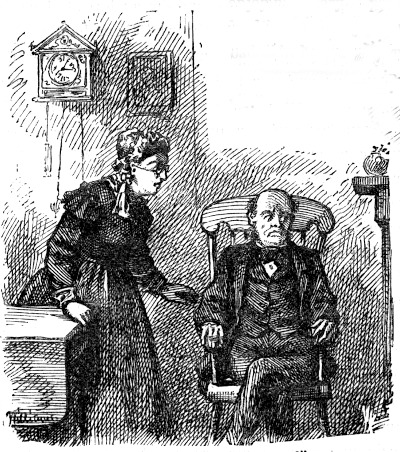
“WHAT’S THE MATTER, JOSIAH?”
“My health is well enough,” says he sort o’ surly
like.
“Wall then,” says I in still more anxious tones, “if
it hain’t your health that is a sufferin’, is it your morals?
155Do they feel totterin’, Josiah? Tell your pardner
how they feel.”
“Dummit, my morals feel all right.”
Says I sternly: “Stop that swearin’ instantly and to
once.” And I went on in reasonable tones: “If you
hain’t enjoyin’ poor health, Josiah, and your morals
are firm, why is there such a change in your mean?”
Says I: “Your mean don’t look no more like your old
one than if it belonged to another man.”
But instead of answerin’ my affectionate and anxious
inquiries, he jumped up and started for the barn. And
so it went on for over 4 days; I a knowin’ sunthin’
ailed him, and couldn’t get him to tell; he a growin’
crosser and crosser, and lookin’ maugerer and maugerer,
and I a growin’ alarmed about him to that extent
that I knew not what to do. And finally one
mornin’ to the breakfast table, I says to him in tones
that would be answered:
“Josiah Allen, you are carryin’ sunthin’ on your
mind.” And says I firmly: “Your mind hain’t strong
enough to carry it alone; your pardner must and will
help you carry it.” He see determination in my eyebrow,
and he finally up and told me. How he was a
hankerin’ to take in summer boarders; how he wanted
to get back the money he had lost in some way, and
he knew there was piles and piles of money to be made
by it; and it was such pretty business, too,—nothin’
but fun to take ’em in; anybody could take such perfect
comfort with ’em, besides bein’ so awful profitable;
156and knowin’ my principles rose up like cast-iron against
the idee, it was a wearin’ on him.
I didn’t say nothin’. Some wimmen would have
throwed Jonathan Spink and his wife in her pardner’s
face, and some wimmen would have throwed the twin
and the hull of the family. But I didn’t. I knew my
pardner was a sufferin’ fearfully, and my affection for
him is like a ox’es, as has been often remarked. No,
I only said in a cold, cautious tone: “Will you pass
me the buckwheat-cakes, Josiah, and the syrup?”
But them words, them buckwheat-cakes, was only a
vail (as it were) that I threw over my feelin’s, tryin’
to hide ’em from my pardner. For oh! what a wild
commotion was goin’ on inside of me between my principles
and my affection. And of all the wars that ever
devastated the world, that is the most fearful; though
it may be like many others, a silent warfare. Yes,
when love—such a love as my love for Josiah—and
principles strong and hefty as my principles are, get to
fightin’ with each other, and kickin’ back and forth,
and ragin’, and as I may say, in a practical and figurative
way, snortin’ and prancin’,—then ensues and follers
on a time long to be remembered.
I was principled against takin’ in summer boarders.
I had seen ’em took in, time and agin, and seen the
effects of it, and I had said, and said calmly, that for
people like us boarders was a moth. I had said, and
felt, that when a woman does her own housework it
was all she ort to do to take care of her own men folks,
159and her house, and housen stuff, and common run of
visitors,—and hired girls I was immovably sot against
from my birth.
Home seemed to me to be a peaceful haven, jest
large enough for two barks,—Josiah’s bark and my
bark,—and when foreign schooners (to foller up my
poetical simely), when foreign schooners and periogers
sailed in, they generally proved to be ships of war,
pirate fleets stealin’ happiness and ease, and runnin’
up the skeliton of our dead joys at their mast-heads.
But I am a episodin’, and wanderin’ off into fields of
poesy, and to resoom and go on:
It would be in vain and only harrow up the reader’s
feelin’s to tell how the long struggle went on
inside of my mind. But when I say that my pardner
daily grew before my eyes crosser and more fearfully
cross, and mauger and more awfully mauger, any
female woman who has got a beloved companion, and
a heart inside of her breast bones, knows how the conflict
ended. I yielded and gin in, and the very day I
gin my consent Josiah went and engaged ’em. He’d
heard of ’em from old Mandagool. He had boarded
’em the summer before, and he said they wanted to get
board again in Jonesville, though for some reason
Mandagool didn’t seem to want to board ’em himself.
I thought to myself that looked squally. I never liked
old Mandagool,—not for a minute,—but I didn’t say a
word. Neither did I say anything when he told me
there was 4 childern in the family that was a comin’.
160No; I held firm. The job was undertook by me for
the savin’ of my pardner. I had undertook it in a
martyr way, and I wuzn’t goin’ to spile the job by
murmerin’s and complainin’s.
But oh! how animated Josiah Allen was the day he
come back from engagin’ of ’em. His appetite come
back powerfully; he eat a immense dinner. His crossness
had disappeared, his affectionate demeanor all
returned; he would have acted as spoony as my big
iron spoon if he had had so much as a crumb of encouragement
from me. But I didn’t encourage him.
There was a loftiness and majesty in my mean (caused
by my principles) that almost awed him. I looked
first-rate, and acted so. But oh, how highlarious
Josiah Allen was! He was goin’ to make so much
money by ’em. Says he, with a happy look:
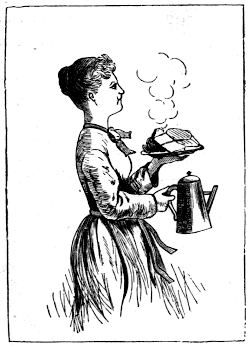
“If a man loses money by one speck, he must launch
out into another speck and get it back again.” Says
he: “I have tried to make money easy, time and
agin, and now I have hit the nail on the head; now I
can make up my loss, and get independently rich.
Why, besides the pure happiness we shall enjoy with
’em, the solid comfort, jest think of four dollars a
week for the man and his wife, and two dollars a piece
for the childern. Less see,” says he dreamily:
“Twice 4 is 8, and no orts to carry; 4 times 2 is 8,
and 8 and 8 is 16. Sixteen dollars a week. Why,
Samantha,” says he, “that will support us; there hain’t
161no need of our liftin’ our fingers agin, if we could only
keep ’em right here with us always.”
“Who is goin’ to cook and wait on ’em?” says I
almost coldly. Not real cold, but sort o’ coolish like.
For I hain’t one when I tackle a cross to go carryin’
it along groanin’ and cryin’ out loud all the way. No!
if I can’t carry it cheerfully, I’ll drop it. So, as I say,
my tone wasn’t
frigid, but sort
o’ cool like.
“Who’ll wait on
’em?”
“Get a girl!
get two girls!
Think of sixteen
dollars a week.
You can keep a
variety of hired
girls if you want
to. Yes,” says
he, with a blissful
expression and
joyous axent,
“besides the
sweet rest and comfort we are a goin’ to take with
’em, we can have everything else we want. Thank
Heaven we have now got a compeatency.”
“Wall,” says I in the same tones, or about the same,—coolish,
but not frigid,—“time will tell.”
162
Wall, they come on a Monday mornin’, on the six
o’clock train. Josiah had to meet ’em to the depot,
and he was so afraid he
should miss ’em, and
somebody else would
undermine him, and get
’em as boarders, that he
was up about three o’clock,
and went out and milked
by candle-light, so’s to be
sure and be there in season. And I had to get up
and get his breakfast before daylight, feelin’ like
163a fool, too, for he kep’ me awake all night a’most,
walkin’ round the house, and fallin’ over chairs and
things,—sort o’ gropin’ round,—lightin’ matches to
look at the clock to see what time it was. And if he
said to me once, he said 30 times durin’ that night:
“It would be jest my luck to have somebody get in
ahead of me to the cars, and undermind me at the last
minute, and get ’em away from me.”
Says I, in dry tones (not so dry as I had used, but
dryish): “I guess there won’t be no danger, Josiah.”
But the very last thing I heard him say, in fearful
and fractious tones, as he got into that democrat, was:
“It would be jest like old Mandagool to undermind
me.”
Wall, about a quarter to 7 he driv up with ’em. A
tall, spindlin’, waspish-lookin’ woman, and 4 childern.
The man, they said, wasn’t comin’ till Saturday night.
I thought the woman had a singular look to her when
I first see her, and so did the oldest boy, who was
about 13 years old. I thought he looked dretful white
in the face, and sort o’ strange like. He looked like
his ma, only he was fleshy,—dretful sort o’ fleshy,—flabby
like. And as they walked up from the gate,
side by side, I thought I never in my hull life see a
waspisher and spindlener woman, or a curiouser lookin’
couple. The other 3 childern that come behind seemed
to be pretty much of a age, and looked healthy, and
full of the old Harry, as we found out afterwards they
indeed was.
164Wall, I had a hard tussle of it through the day to
cook and do for ’em. Their appetites was tremenjous,
specially the woman and the oldest boy. They wasn’t
healthy appetites. I could see that in a minute.
Their eyes would look holler and hungry, and they
would look voraciously at the empty deep dishes and
tureens, after they had eat ’em all empty,—eat enough
for 4 men. Why, it did beat all. Josiah looked at
me in silent wonder and dismay, as he see the vittles
disappeer before that woman and boy. The other
three childern eat about as common healthy childern do,—each
of ’em about twice what Josiah and me did. But
there wasn’t nothin’ mysterious about them. But the
woman and boy made me feel curious, curiouser than
I had ever felt, for truly I thought to myself if their
legs and arms hain’t holler, how do they hold it. It
was to me a new and interesting spectacle, to be
studied over and filosofied upon. But to Josiah it was
a canker, as I see the very first meal. I could see by
the looks of his mean that them two appetites was
sunthin’ he hadn’t reckoned and calculated upon.
And I could see plain, havin’ watched the changes of
my pardner’s mean as close as astronomers watch the
moon, I could see that them two appetites was a
wearin’ on him.
Wall, I thought mebby they was kinder starved out,
comin’ right from a city boardin’-house, and a few of
my good meals would quell ’em down.
But no, instead of growin’ lighter them two appetites
167of their’n seemed, if possible, to grow consuminer
and consuminer, though I cooked lavish and profuse,
as I always did. They devoured everything before
’em, and looked hungry and wistful at the plates and
table-cloth. Josiah looked on in perfect agony I knew,
though he didn’t say nothin’ (he is very close). And
it seemed so awfully mysterious to me. I would get
so lost reasonin’ and felosifyin’ on it; whether their
legs was holler or not holler; and if they was holler,
how they could walk round on ’em; and if they wasn’t
holler, where the vittles went to. Why, studyin’ so
deep into it, bringin’ all the deep scientific facts I
could think on to bear onto it, I don’t know but I
should have gone ravin’ distracted if she hadn’t herself
up and told me what the matter was.
They had got tape-worms—she and the oldest boy;
immense ones, so the doctor said, and they had to eat
to satisfy ’em. That explained it, and I felt relieved.
And I told Josiah, for I love that man, and love to
happify him when I possibly can. But if you’ll believe
it, that man was mad; and he vowed he would charge
extra for ’em. It was after we went to bed I told him,
and I had to talk low, for their room was right over
our’n. Says I, in a low but firm whisper:
“Don’t you do no such thing, Josiah Allen. Do
you realize how it would look; what a sound it would
have to community?”
“Wall,” he hollered out, “do you s’pose I am goin’
to board all the tape-worms in the world free of expense?
168Do you s’pose I am goin’ to have ’em all congregate
here, and be boarded on me for nothin’? I
took men and wimmen and childern to board. I didn’t
agree to board anything else, and I won’t, nuther. It
wuzn’t in the bill.”
“Do you keep still, Josiah Allen. She’ll hear you,”
I whispered.
“I say it wuzn’t in the bill,” he hollered out agin.
I s’pose he meant it wasn’t in the bargain, but he was
nearly delirious (he is very close—nearly tight).
But jest that minute,—before I could say a word,—we
heard a awful noise right over our heads; it sounded
as if the hull top of the house had fell in.
Says Josiah: “The old chimbly has fell in.”
Says I: “I think it is the ruff.”
And we both started for up-stairs on the run. I
sent him back from the head of the stairs, for in the
awful fright he hadn’t realized his condition, and wasn’t
dressed. I waited for him at the top of the stairs, for
to tell the truth, I dassent go on. He hurried on his
clothes, and went in ahead,—and there she lay; there
Miss Danks was on the floor in a historical fit. Josiah,
thinkin’ she was dead, run in and ketched her up, and
went to puttin’ her on the bed; and she, jest as they
will in historicks, clawed right into his hair, and tore
out above half he had on that side. She then struck
him a fearful blow in the eye—made it black and blue
for over two weeks. She didn’t know what she was
169about; she wuzn’t to blame—though the hair was a
great loss to him, and I won’t deny it.
Wall, we stood over her most all night to keep the
breath of life in her; and the oldest boy, bein’ skairt,
it brought on some fits that he was in the habit of
havin’,—a sort of fallin’ fits; he would fall anywheres;
he fell onto Josiah twice that night, and almost knocked
him down. He was awful large for his age; dretful
big and fat. It seemed as if there was sunthin’ wrong
about his heft, it was so oncommon hefty for a boy of
his age. He looked bloated. His eyes, which was a
pale blue, seemed to be kinder sot back in his head,
and his cheeks stood out below, some like baloons; and
his mouth was kinder open a good deal of the time, as
if it was hard work for him to breathe; he breathed
thick and wheezy,—dretful oncomfortable. His complexion
was bad, too; sallow and sort o’ tallery lookin’.
He acted dretful logy and heavy at the best of times,
and in them fits he was as heavy and helpless as lead.
Wall, that was the third night after they got there,
and from that night, as long as they stayed there, she
had the historicks frequent and violent, and Bill had
his fallin’ fits. And you wouldn’t believe if you hadn’t
seen ’em, how many things he broke a fallin’ on ’em
in them fits. It beat all how unfortunate he was.
They always come onto him unexpected, and it seemed
as if they would always come onto him while he was
in front of sunthin’ to smash all to bits. And I says
to Josiah, says I: “Did you ever see, Josiah Allen, anybody
170so unfortunate as that boy in his fits? It seems
as if he’ll break everything in the house if it goes on.”
Says he, “’Tis a pity his cussed neck don’t break!”
I don’t know as I ever gin Josiah Allen a firmer,
eloquenter lecture against swearin’ than I did then.
But in my heart I pitied him, for it was only the day
before that he fell as he was a lookin’ at the colt. It
was only a week old, but Josiah sot his eyes by it, and
the boy was admirin’ of it—there wasn’t nothin’ ugly
about him—but a fit come on, and he fell onto the colt,
and the colt not expectin’ of it, and bein’ unprepared,
fell flat down, and the boy on it; and the colt jest lived,
171that is all. Josiah says it never will be worth any
thing; he thinks it broke sunthin’ inside. As I said,
there wasn’t a ugly thing about Bill. He’d be awful
sorry when he broke things, and squshed ’em, and
flatted ’em all out a fallin’ on ’em.
All I blamed him for was his prowlin’ round so
much. I thought then, and I think still, seein’ he
knew his own heft, and knew he had ’em, and was
liable to have ’em, he’d done better to have kep’ still,
and not tried to got round so much. But his mother
said he felt restless and oneasy. I couldn’t help likin’
the boy; and when he fell right into my bread that I
had a risin’ and spilte the hull batch, and when he fell
acrost the table in the parlor and broke everything
that was on it, and when he fell onto a chicken-coop
and broke it down and killed a hull brood of chickens,
and when he fell onto some tomato plants of a extra
kind which Josiah had bought at a great expense and
sot out, and broke ’em off short, I didn’t feel like
scoldin’ him. I s’pose it was my hefty principles that
boyed me up; them and the sweet thought that would
come to me—mebby Josiah Allen will hear to me
another time, mebby he’ll get sick of summer boarders
and to takin’ of ’em in.
I s’pose it was these lofty feelin’s that kep’ me up;
truly if it hadn’t been I don’t know how I could have
lived, cookin’ as much as I had to, and goin’ through
with what I did, historics, and fallin’ fits, and etcetery,
etcetery.
172And the 3 smaller children was ugly; there haint
no other name made that will describe their demenors
and acts, only jest that word, ugly.
They made me more work than all my housework put
together. A handlin’ everything, and a breakin’ everything,
and a ridin’ the turkeys, and actin’, and performin’.
I spose they
was told
more’n a hundred
times by
me and Josiah
to not ride
that turkey
gobbler. And
I don’t spose
there was
ever any other
children on
earth, only
jest them 3,
that would
have dast to
gone near it. Why, I have seen right-minded and
moral children time and agin weep and cry when they
seen it comin’ nigh ’em, it was so powerful lookin’,
and high-headed. But good land! first thing I’d know
I’d see one on ’em right on that gobbler, pretendin’ to
ride it; they almost killed that Tom Turkey.
173And then all of a sudden we’d hear the fannin’ mill
a goin’ full blast, and Josiah would run to the barn,
and there they would be a runnin’ dirt through it,
slates, stuns, or anything. And then I’d hear the
wheel a goin’ up stairs, buzzin’ as if it would break its
old band, and up I’d go, and there they’d be a spinnin’
of my best rolls. And five different times I took the
youngest one out of the flour barrel, where they was a
makin’ a ghost out of him, to appear to the oldest one—they
loved to scare that boy into fits, they loved it
dearly.
And they’d lay to and eat between meals all the preserves
and jell and honey they could get holt of, unbeknown
to me; they wasted twice over every day what
their board come to. But I kep’ still, and held firm.
Thinkses I the medicine is bitter, but it is goin’ to do
good; the patient is feelin’ the effects of it. For Josiah
looked awful as the days went by. He see he had
made a terrible mistake; he see that he’d done better
to have listened to his faithful pardner. He see where
he had missed it. But pride kep’ him silent, only in
the little unguarded speeches that he would make in
sudden moments of anger and agony, unbeknown to
him. Such as sayin’ in loud, quick axents:
“Dummit, I can’t stand it so much longer.” Or in
low, plaintive tones, “Did Heaven ever witness such
tribulation?”
I’d ketch him a sayin’ that as he would be a bringin’
Bill in, for Josiah would have to lift him and lug him
174in when he would fall out doors. That in itself I
could see was a underminin’ my pardner’s strength
and his back bones. And I shall always believe that
was the reason why Danks stayed out of the way. It
was underhanded in him; he knew that boy was heavy
as lead, and he knew he would fall when he had ’em,
and would have to be fetched in, and so he jest stayed
away and let Josiah do all the luggin’ and lifting’.
It was three weeks before that man come, and Josiah
didn’t look like the same man. What with chasin’
after them three littlest boys, and carryin’ round Bill
in his fallin’ fits, and havin’ the care of providin’ more
provisions than was ever devoured on earth before by
the same number of people, and bein’ kep’ awake
night after night by Miss Danks’es historicks, and the
oldest boy’s walkin’ in his sleep (I don’t know as I
have mentioned it, but Bill was liable to appear to us
any time, and have to be headed up stairs agin)—take
it all together, Josiah looked like a shadder. And
thinkses I to myself, almost wildly, my principles was
hefty, and they are hefty; I have said I would stand
firm, and I have stood firm. But oh, must I, must I
see my pardner crumple down and die before my face
and eyes?
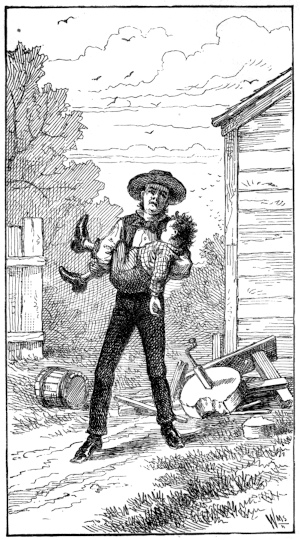
It was Josiah’s pride that stood in the way of his
startin’ of ’em off. He couldn’t bear to give in to me
that he was in the wrong on it, and I was in the right
on it. He couldn’t bear to come right out openly and
own up to his pardner how deceived, and fooled, and
177took in he had been. Men’s pride is high, it towers
up like a meetin’-house steeple, and when it tottles and
falls down, great is the fall thereof. I knew this, divin’
into the mysterious ingregiencies of men’s naters so
deep as I had doven, I knew this great filisofical fact as
well as I knew the dimensions of the nose on my
pardner’s face. And so I shuddered to myself as I
thought it over, and pondered on what the end would
be. But I held firm on the outside, and never let on
how agonized and burdened in soul I was. My mind
is like a ox’es for strength, and very deep.
This was on a Friday mornin’ that I had this melancholy
revery, as I looked out of the buttery window,
as I stood there a washin’ dishes to the sink, and see
Josiah come from the barn a luggin’ Bill in. He had
had a fit, and fell acrost the grin’-stun where Josiah
was a grindin’, and Josiah had to drop everything and
come a luggin’ of him in. He broke some of the runnin’-gear
of the grin’-stun that time. Josiah had it
fixed so he could put a pail of water on top of it, and
it would water itself while he was a grindin’, but Bill
had fell right acrost it and flatted it all down. It cost
Josiah upwards of seven shillin’s to make that loss
good.
Wall, that night old Danks come. It was most bed-time
when he come, and I didn’t see him much that
night. She had the historicks the first part of the
night, Miss Danks did, but we knew he was with her,
so we sort o’ gin up the care to him. Bill got up in
178his sleep, and went to prowlin’ round as usual in the
kitchen. But Josiah headed him off up-stairs, and
locked the chamber door onto him, and let his father
tussle with him. He had a fallin’ fit, we both think,—Josiah
and me do, that he had,—and fell onto his
father, and knocked him down. We don’t know it
for certain, but we think so. For we heard the awfulest
katouse you ever did hear. It sounded as if the
house was a comin’ down, and then we heard groanin’
and sithin’ and low, very low swearin’.
Of course we couldn’t sleep none while such a rumpus
was a goin’ on, and historicks and everything, and
he a tryin’ to quell ’em down, but we lay and rested,
which was a good deal for us. Wall, in the mornin’,
if you’ll believe it, Danks told us (Miss Danks and the
childern had gone down into the orchard to eat some
strawberries), and Danks up and told Josiah and me
that he was goin’ off agin that day, on the afternoon
train. He did look bad, I’ll say that for him; his sufferin’s
was great. But he hadn’t ort to shirk ’em off
onto somebody else; he hadn’t ort to throw a historicky
wife onto perfect strangers, and bring a lot of
childern, perfect young hyenas, into the world, and
then caper off, and let other folks tussle with ’em.
But I held firm. I knew a crysis was approachin’
and drawin’ nigh, but I wasn’t goin’ to say nothin’; I
held firm; only I says in a mecanical and sort of wonderin’
way:
“Goin’ away to-day?”
179“Yes,” said Danks, “it is a case of life and death;
I must go.”
And then all of a sudden Josiah Allen bust right
out, and oh! what a scene of wild excitement rained
down for the next several moments. Josiah riz right
up, and hollered out to Danks louder than I most ever
hearn him holler,—loud enough to be hearn for half a
mile, though Danks was within half a foot of him.
Says he, in that loud, scareful, wild tone:
“If you leave this house for half a minute, without
takin’ your family with you, I’ll prosecute you, and
throw you into jail, and take the law to you.”
It skairt Danks dretfully; it come so unexpected
onto him, he fairly jumped. And it started me for
a minute, though my principles are so solid and hefty
that they hold down my composure and keep it stiddy
better’n a iron wedge, makin’ my presence of mind
like a ox’es for strength.
Says Josiah, in that awful and almost deafenin’ tone
of hisen, and with a mean as wild and delerious as a
mean ever looked on earth:
“I hain’t a wet-nurse, and I’ll let you know I hain’t,
and Samantha hain’t a horsepittle. Here I have,”
says he, in a still more agonizin’ tone, “here I have
for week after week kep’ stiddy company with fallin’
fits and historicks. I have been broke to pieces a luggin’
boys! and rode to death by childern! and eat up
by tape-worms! And there has got to be a stop put to
it, or somebody is goin’ to get hurt.”
180He was perfectly delerious, and I says to him soothin’ly:
“Be calm, Josiah!”
“I won’t be calm, Samantha!”
But Danks had got over bein’ skairt, and begun to
look cross,—crosser’n a bear. And he spoke out, in a
pert, hateful tone, old Danks did, and says he:
“’Tain’t nothin’ to me; I don’t have the fallin’ fits
nor the historicks.” He looked dretful mad, and
spoke up as pert and impudent to my pardner as if it
was Josiah’s business to tussle with them fits and
things, instead of hisen.
I had thought I wouldn’t put in my note at all, but
I hain’t one to stand by and see my pardner imposed
upon. And then, too, I felt in the name of principle
I ort to speak. I felt a feelin’ that mebby here was a
chance for me to do good. And when he spoke out
agin, more impudenter and hatefuler than before,
“that it wasn’t nothin’ to him,” says I:
“It is sunthin’ to you.” And then I went on
powerful and eloquent. I can tell you I talked deep
and solemn to that man about what he took onto himself
when he sot out in matrimony; about the responsibility
of marriage, and bringin’ childern into the
world; the responsibility to God and man of usherin’
eternal souls into this world for everlasting joy or misery;
the terrible responsibility to these souls and to
God, the righteous Judge; and the terrible responsibility
to the world of lettin’ loose in it such mighty
181powers for good or evil,—a set of likely creeters, blessings
and benefactors forever, or shacks and sources of
uncounted misery, made so greatly by early care and
culture; influences that will go on and on for all time,
growing and widening out all the time, till no mind
but the Eternal can reckon up or even imagine the
awful consequences for good or evil of one human soul.
“How dare anyone,” says I, “lightly and irreverantly
even think on the subject,—much less tackle it.”
I talked beautiful on the subject, and deep, deeper
than I had for some time. I felt fearfully eloquent,
and acted so, and very noble. But Danks acted mad,
mad as a hen. And he snapped out agin:
“Who made any calculations on fallin’ fits and such
things? I didn’t.”
Why, that man almost took my head off, he snapped
me up so. But I didn’t care; I knew I was a talkin’
on principle, and that reflection is a high rock to lean
and rest the moral back against. That thought is a
thick umberell to keep off the little hailstuns of impertinence
and impudence that might otherwise hurt one’s
self-respect and mortify it. I felt well and noble in
my mind, and acted well, very. I kep’ right on cool
and collected together.
And says I, “That is one great reason why any one
ort to consider well on’t. They ort to know that this
is one of them jobs that you can’t calculate on exactly
how it is a comin’ out. You must take the chances.
There is lots of undertakin’s jest so—jest as hard to
182tell how it is a comin’ out as some things in Nater.
Now the greatest of minds can’t figger out exactly to
a minute what time the butter will come—or how a
marriage is a goin’ to turn out—or jest when it will
stop rainin’, or begin—or when the old hen will lay.
“The world is a curious place, and in lots of undertakin’s
you have to step out blindfold and ketch holt
of the consequences, good or bad. The blinders will
be took offen our eyes sometime, probable, but the time
is not yet. And marriage, I take it, is one of the very
reskiest undertakin’s you can undertake. It may lead
you into a happiness as pure and lofty as a certain
couple I could mention have enjoyed for the neighberhood
of 20 years. It may, and then again it
mayn’t. But there is one great comfort in this that
there hain’t in some things, such as rain, and thunder
storms, and etcetery. You needn’t enlist in this warfare
if you hain’t a mind to—that is a sweet and consolin’
thought—if you feel scareful over it. But if
you do enlist you must take the chances of war, you
must take the resks. And if it wasn’t a resky piece
of business to embark in, why did them old fathers
put these words in the marriage service, ‘for richer,
or for poorer.’ They knew what they was about, them
old fathers did. They knew they couldn’t tell whether
it would turn out rich as rich could be with blessings
and bliss, or poor as poverty. Them old fathers knew
that, and bein’ likely men and sound-moraled, they fixed
183that halter so that folks couldn’t squirm their necks
out of it every time they got oneasy and worrysome.
“Historical fits, and etcetery,” says I, in reasonable
tones, “might come under the head of ‘worse.’ But
you can’t slip your head out; that vow holds you, for
better or worse. You no need to have tackled that
vow, but you did, and now you ort to stand up under
it; that is law, and that is gospel too, which don’t
always go together.”
“Well, what of it,” says Danks; “what if it duz?
What are you goin’ to do about it?”
Oh, how surly and mad that man did look. His
mean would have skairt some wimmen, but it didn’t
me; mebby it would if I hadn’t been talkin’ on such
high principle, but that boyed me up.
“Why,” says I, “as I have said more’n 40 times,
folks ort to get it into their heads that it is a great and
serious subject that ort to be considered and prayed
over and meditated upon. They ort to realize that
gettin’ married is a solemn thing; solemner, if anything,
than it is not to, and that has always been considered
a very solemn thing, very. But instead of
lookin’ on it in this serious and becomin’ way, folks
will caper and prance off into matrimony in jest as
light and highlarious and triflin’ a way as if they was
headin’ a row of fantasticks on the 4th of July.
They don’t consider and filosifize on it that the fantasticks
can take off their uniforms at night, and be
themselves agin, but the matrimourners can’t. They
184can’t do it nohow; there they be, matrimourners. No
matter how bad they feel, and how disappointed they
be by the looks of the state they have got into, they
can’t get out of it. They are matrimourners, and
can’t help themselves.
“The state of wedlock has got a high, slippery wall
round it, as high up as eternity, and as low down as
the same. It is a wall that can’t be stepped acrost and
climbed over. It is a wall that a man or a woman
can’t sneak out and creep up on without fallin’ back—it
is too slippery. It is a wall that can’t be broke
down, and jumped over only on Bible grounds. And
then when you do take that jump on Bible grounds,
oh how fatiguein’ that leap is. How much happiness
and ease of mind the matrimourner has to drop in the
jump, drop forever. And how much trouble he has to
carry with him, and disquietude of mind, and condemnation,
and upbraidin’s, and gossip, and evil speaking,
and hateful memories, and hauntin’ ones, and
travel of soul and body. Oh, what a time that matrimourner
duz have.”
“I thought,” says he, with that surly, mad look of
hisen, “I thought you was one that preached up liberty,
freedom, and etcetery.”
“So I be,” says I. “Hain’t I jest been a doin’ of
it? Hain’t I jest said that no man or woman ort to
be drove into the state of matrimony by anybody only
jest their own selves? But after they lay holt, and
drive themselves in, they ortn’t to complain. But, as I
185have said frequent, they’ll find after they have drove
themselves in that it is the curiousest state that ever
was made. None of our States of America will compare
with it for curiosity,—and some of our’n are exceedingly
curious, take ’em laws and all, to wit: Havin’
a man in congress to make laws that imprison a man
for havin’ two wives, while he himself, proud and
hauty, a settin’ up a makin’ that law, has four on
’em. Exceedingly curious that is, and to wit: Fixin’
penalties against crime and vice, and then sellin’
licenses to encourage and make it respectable. Oh!
how curious, how curious some of our states be! But
the state of matrimony is far curiouser. It is curiouser
in the beginning—some like a conundrum.
States have to be admitted into the Union; a union
admits you into that state. And then, it is bounded
on every side by divinest possibilities of happiness, or
the most despairin’ ones, and no knowin’ which will
break over the frontier, and capture you. Sweetest
and most rapturous joys may cover its soil as thick as
blossoms on a summer prairie, or angry passions and
disappointments and cares may crunch ’em down
under foot, and set fire to ’em. Peace and trust and
tenderness may rain over that state, or anarky and
sizm.”
“Yes, and fallin’ fits,” says Danks, with a bitter
tone, “and historicks.”
“Yes,” says I calmly, “matrimourners ort to take
all the blessings and enjoyments and comforts with a
186thankful heart, and they ort to have the courage and
the nobility and the common sense to take all the
evils, fallin’ fits, historicks, and etcetery, and etcetery,
with a willin’ mind. You ort,” says I firmly, “you
ort to have figured it all out. You ort to have figured
out the hull sum, orts and all, and seen what was to
carry, and got the right answer to it, before you drove
yourself into that state.”
“How could I see to carry historicks? how could
I figured ’em out?” says he bitterly.
But I kep’ right on: “You ort to have studied it
out, whether you was strong enough to stand the climate,
with its torrid weather and its frigid zones, its
sweet summery winds and its blasts, its squalls and
hurrycains. But as I have said 40 times, if I have
once, after you have drove yourself into that state, you
ort to hist up your moral umberell, and make the best
on’t.”
Danks didn’t look convinced at all. He muttered
sunthin’ agin about fits and other things, and how
he hadn’t made no calculations on ’em; and I felt
fairly out of patience, and went to allegorin’, as I
might have known I should before I got through. (It
is next to impossible for me to be so eloquent as I was
then without allegorin’ some).
“Why,” says I, “when a man buys a farm, he must
be a natural fool, or else a luny, if he expects and calculates
the sun to shine on it every day the year round.
He must make calculations for rain and snow, sunshine
187and thunder. He can’t expect it all to be ripe
wheat and apple-sass. He buys it with his eyes open;
buys it with all its possibilities of good or evil; and
don’t expect, if he hain’t a fool, to shirk out of carryin’
of ’em.”
“Who has shirked out of carryin’ of ’em?” says
Danks. “I hain’t.”
“You have!” says Josiah, a jumpin’ up and hollerin’
at him agin; and his face was red as a fire-bran’.
“I hain’t!” says Danks.
“You have!” says Josiah. “And don’t you dispute
me agin if you know what is good for yourself. You
have shirked out of carryin’ that dumb boy of your’n,
in his dumb fits. And I let you know that I have
broke my back for the last time a luggin’ him round,
or somebody or sunthin’ is goin’ to get hurt, and I can
tell you so—dummit!”
I felt as if I should sink. My Josiah was almost
doin’ what Miss Job advised Mr. Job to do when he
was smote with agony and biles. He was almost a
swearin’. But here was where I and the late Miss
Job differ. I knew my pardner’s sufferin’s was intense,
and them sufferin’s was terrible to me. But still I
says in a reprovin’, but tender and pityin’ tone:
“Be calm, Josiah!”
“I won’t be calm!” says he.
Says I: “Josiah, you must; you are almost delerious.”
Says I: “You are a swearin’, Josiah! be
calm!”
188“Wall, I tell you agin that I won’t be calm; and I
tell you agin, dummit! there now! dummit!”
Oh! how my pardner did look, how his axent did
sound, as he uttered them fearful and profane words.
And then before I could put in a soothin’ word to
soothe him, Danks spoke right out, and says he:
“You promised to take ’em for all summer, and if
you don’t I won’t pay you a cent for their board, and
you can’t make me.”
Here Josiah turned as white as a white milk-pail,
and groaned to that extent that I thought he was a
goin’ to faint away.
And as it turned out, the law was on Danks’es side.
Josiah made ’em all go that very day, but he couldn’t
get a cent from ’em. He hired a lawyer to prosicute
Danks, but Danks, bein’ sharp-witted and ugly (and
sometimes I think that such trials as he underwent, if
anybody don’t take ’em as a means of grace, makes
anybody ugly. I can’t help feelin’ sorry for Danks,
after all). But as I was a sayin’, Danks worked it in
such a way that Josiah lost the case, and had to pay
the costs on both sides. They was heavy bills,—most
as heavy as Bill Danks,—and take it with what we
lost boardin’ of ’em, and what the childern tore to
pieces, and Bill smashed and squshed down, a fallin’
on ’em,—take it all together, it is a loss that makes
Josiah Allen groan now every time he thinks on it.
We don’t either of us think his back will ever feel as
it did before. He strained it beyond its strength.
189

A VISIT FROM MISS RICKERSON.
It was about a week after the Danks’es departure
and exodus. It was a cool day for the time of the
year, and very windy. And I was settin’ calm and
peaceful, hullin’ some strawberries for dinner. For
my companion, Josiah Allen, had gone to Jonesville,
and I wanted to have dinner ready by the time of his
arrival. But I had only jest got my potatoes pared
and over the stove, when I heard the old mare and
him drive into the barn-yard. He had come sooner
than I looked for. But it didn’t excite me; I was prepared.
For not knowin’ exactly the time of his arrival,
I had made ready for any emergency. I had drawed
the table out, and put the table-cloth on; and I felt at
rest, and peaceful.
Let wimmen whose pardners are wont to rampage
round and act, when they come in and find dinner
only jest begun—let ’em not tell any wrong stories or
exagerations or parables, let ’em not bandy words or
argue, but let ’em, jest before he comes in, draw out
190the table and throw the table-cloth on, and everything
will move on peaceful; their pardners will think dinner
is most ready, and as they glance at that snowy table-cloth
their wrath will leave ’em, and they will demean
themselves like lambs.
I only tell what I have learnt from experience. And
any little crumbs of wisdom and knowledge that I have
gained by hard experience, and through tribulation, I
am willin’ to share freely, without money and without
price, with the female sect; I think so much of ’em,
and wish ’em so well. Now jest this one little receipt,—this
table-cloth performance,—would have been
worth dollars and dollars to me if I had known it
when I was first a pardner. But I never found it out
till I had been married over thirteen years, and had
been jawed accordingly, when I was belated and dinner
wasn’t ready. Why no woman would have any idee
of its value till they try it. Men are as likely creeters
as the earth affords, if you only know how to get
along with ’em. And wimmen has to try various
ways and measures. I learnt this jest by tryin’ it as a
experiment. I have tried a good many experiments—little
harmless ones like this. Some of ’em work, and
some don’t.
Wall, I sot there hullin’ my berries, and listenin’ to
the wind, which was a roarin’ round the house. Seems
as if I never heard it blow no harder. It blowed for
all the world as if it had been kep’ in through sickness
191in its family, or sunthin’, and was out now for the
first time, on a regular spree.
And though it didn’t come right out and sing ’em
in plain words, yet it seemed to be a roarin’ it down
the chimbley, and blowin’ it through the orchard and
round the corners of the house, and whistlin’ it
through the open buttery window—the song that other
elevated and gay spirits indulge in, about bein’ fairly
determined and sot to not go home till mornin’.
It blowed fearfully. But I was calm and peaceful,
knowin’ the table-cloth was on, and Josiah would act
first-rate. And then, when a tempest is a howlin’ and
a actin’ out-doors, it seems as if I enjoy more than
ever the safety and sweet repose and happiness of my
own hearth-stun (which last is a poetical simely, our
hearth not bein’ stun at all, but iron, with a nickel
platin’ round it).
Wall, there I sot, feelin’ well and lookin’ well. I
had combed my hair slick, and put on a clean gingham
dress,—when Josiah Allen opened the door and
walked in. He glanced at the table-cloth, and a calm,
contented look settled upon his eye-brow, but he left
the door open behind him as composed as if he had
been born in a saw-mill; and says I:
“Josiah Allen, if there was a heavy fine to pay for
shettin’ up doors, you wouldn’t never loose a cent of
your property in that way.” And says I, clutchin’
my pan of strawberries with a firmer grip, for truly it
was a movin’ and onstiddy, and my apron was a flutterin’
192like a banner in the cold breeze: “If you don’t
want me to blow away, Josiah Allen, shet up that
door.”
“Oh shaw! Samantha. You won’t blow away;
you are too hefty. It would take a hurrycane and a
simon, too, to tackle you, and lift you.”
“Simon who?” says I, in cold axents, caused
partly by my frigid emotions and the cool blast, and
partly by his darin’ to say any man could take me up
and carry me away.
“Oh! the simons they have on the desert. We
193hearn Thomas J. read about ’em. They’ll blow camels
away, and everything.”
Says I dreamily: “Who’d have thought twenty
years ago, to have heard that man a courtin’ me, and
callin’ me a zephire and a pink posy and a angel, that
he’d ever live to see the day he’d call me a camel.”
“I hain’t called you a camel. I only meant you
was hefty, and camels was hefty, and it would take a
simon or two to lift you round, either on you.”
“Wall,” says I, in frigid tones, “what I want to
know is, are you a goin’ to shet that door?”
“Yes, I be, jest as quick as I change my clothes. I
don’t want to fodder in these new briches.”
I rose with dignity,—or as much dignity as I could
lay holt of, half bent, tryin’ to keep five or six quarts
of strawberries from spillin’ all over the floor,—and
went and shet the door myself, which I might have
known enough to done in the first place, and saved
time and breath. For shettin’ up doors is a accomplishment
that Josiah Allen never will master. I
have tutored him up on lots of things since we was
married, but in this branch of education he has been
too much for me. Experiments have been vain; I
have about gin up.
In the course of ten or fifteen minutes, Josiah come
out of the bedroom lookin’ as pleasant and peaceful
as you please, with his hands in his pantaloons
pockets, seemin’ly searchin’ their remotest depths, and
says he in a off-hand, careless way:
194“I’ll be hanged if there hain’t a letter for you,
Samantha.”
“How many weeks have you carried it ’round,
Josiah Allen?” says I. “It would scare me if you
should give me a letter before you had carried it round
in your pockets a month or so.”
“Oh! I guess I only got this two or three days ago.
I meant to handed it to you the first thing when I got
home. But I hain’t had on these old breeches sence
that day I went to mill.”
“Three weeks ago to-day,” says I, in almost frosty
axents, as I opened my letter.
“Wall,” says Josiah cheerfully, as he hunted round
in the bedroom for his old hat, “I knew it wuzn’t
long, anyway.”
I glanced my gray eye down the letter, and says I
in agitated tones:
“Come out here, Josiah Allen, and let me look at
you, and wither you! She that was Alzina Ann Allen
is comin’ here a visatin’. She wrote me three weeks
ahead, so’s to have me prepared. And here she is
liable to come in on us any minute, now, and find us
all unprepared.” Says I, “I wouldn’t have had it happen
for a ten-cent bill to had one of the relation on
your side come and ketch me in such a condition.
There the curtains are all down in the spare room.
Bill Danks fell and dragged ’em down onto the floor
under him, and mussed ’em all up, and I washed ’em
yesterday, and they hain’t ironed. And the carpet in
195the settin’-room up to mend, where he fell onto it with
a lighted candle in his hand and sot it afire. And
not a mite of fruit-cake in the house, and she a comin’
here to-day. I am mortified most to death, Josiah
Allen. And if you had give me that letter, I should
have hired help and got everything done. I should
think your conscience would smart like a burn, if you
have got a conscience, Josiah Allen.”
“Wall, less have a little sunthin’ to eat, Samantha,
and I’ll help round.”
“Help! What’ll you do, Josiah Allen?”
“Oh! I’ll do the barn chores, and help all I can. I
guess you’d better cook a little of that canned sammen
I got to Jonesville.”
Says I coldly, “I believe, Josiah Allen, if you was
on your way to the gallus, you’d make ’em stop and
get vittles for you—meat vittles, if you could.”
I didn’t say nothin’ more, for, as the greatest poets
have sung, “the least said, the soonest mended.” But
I rose, and with outward calmness opened the can of
salmon, and jest as I put that over the stove, with
some sweet cream and butter, if you’ll believe it, that
very minute she that was Alzina Ann Allen drove
right up to the door, and come in. You could have
knocked me down with a hen’s feather (as it were),
my feelin’s was such; but I concealed ’em as well as
I could, and advanced to the door, and says I:
“How do you do, Miss Rickerson?” She is married
to Bildad Rickerson, old Dan Rickerson’s oldest boy.
196
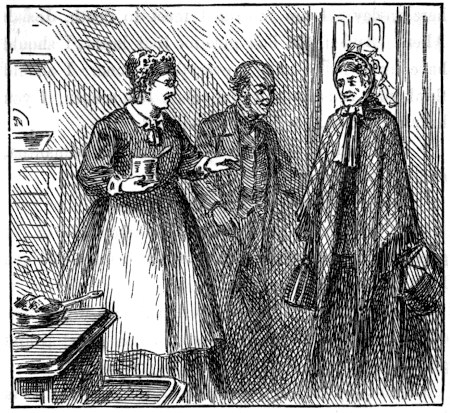
ARRIVAL OF MISS RICKERSON.
She is a tall, bony woman, light-complected, sandy-haired,
and with big, light-blue eyes. I hadn’t seen
her for nineteen years, but she seemed dretful tickled
to see me, and says she:
“You look younger, Samantha, than you did the first
time I ever seen you.”
“Oh, no!” says I, “that can’t be, Alzina Ann, for
that is in the neighberhood of thirty years ago.”
Says she, “It is true as I live and breathe, you look
younger and handsomer than I ever see you look.”
197I didn’t believe it, but I thought it wouldn’t look
well to dispute her any more; so I let it go; and mebby
she thought she had convinced me that I did look
younger than I did when I was eighteen or twenty.
But I only said “That I didn’t feel so young any way.
I had spells of feelin’ mauger.”
She took off her things, or “wrappers,” as Tirzah
Ann says it is more genteel to call ’em. She was
dressed up awful slick, and Josiah helped the driver
bring in her trunk. And I told her jest how mortified
I wuz about Josiah’s forgettin’ her letter, and her
ketchin’ me unprepared. But good land! she told me
that “she never in her hull life see a house in such
beautiful order as mine was, and she had seen thousands
and thousands of different houses.”
Says I, “I feel worked up and almost mortified about
my settin’-room carpet bein’ up.”
But she held up both hands—they was white as
snow, and all covered with rings—and says she, “If
there is one thing that I love to see more than another
it is to see a settin’-room carpet up, it gives such a
sort of a free, noble look to a room.”
Says I, “The curtains are down in the spare bedroom,
and I am almost entirely out of cookin’.”
Says she, “If I had my way, I never would have a
curtain up to a window. The sky always looks so
pure and innocent somehow. It is so beautiful to set
and look up into the calm heavens, with no worldly
obstructions between, such as curtains. It is so sweet
198to sit in your chair, and knit tattin’, and commune
with holy nature. And cookin’,” says she, with a look
of complete disgust on her face, “why I fairly despise
cookin’. What’s the use of it?” says she, with a
sweet smile.
“Why,” says I, reasonably, “if it wasn’t for cookin’
vittles and eatin’ em, I guess we shouldn’t stand it a
great while, none of us.”
I didn’t really like the way she went on. Never,
never, through my hull life, was I praised up by anybody
as I was by her durin’ the three days that she
stayed with us. She praised everything fur beyond
what they would bear.
I believe in praisin’ things that will stand praisin’.
Nothin’ does any one more good than appreciation.
Honest admiration, sympathy, and good-will put into
words are more inspirin’ and stimulatin’ than tongue
can tell. They are truly refreshin’. I think as a rule
we New Englanders are too cold in our means. Mebby
it is settin’ on Plymouth Rock so much, or leanin’ up
against Bunker Hill Monument; or mebby we took it
from our old Puriten four-fathers, and mebby them
four old men ketched cold in their demeaniers from
settin’ under the chilly blue light of their old laws, or
took the trait from the savages. Any way, we are too
undemonstrative and reticent (them are very hefty
words, and it is seldom indeed that I harness up a
span of such a size to carry my idees.
As a general thing I don’t have idees so hefty but
199what I can draw ’em along with considerable small
words. And I prefer ’em always, as bein’ easier
reined in, and held up, and governed. Why, I have
seen such awful big words harnessed in front of such
weak little idees that they run away with ’em, kicked
in the harness, got all tangled up, and made a perfect
wrack and ruin of the little idee. Hence, I am cautious,
and if I owned droves of ’em, I should be on the
safe side, and handle ’em careful and not drive ’em
hardly any. But these two I have heard Thomas J.
use in jest this place, and hain’t a doubt but they
are safe and stiddy as any ever was of their size.)
Thomas J. said, and I believe, that we are too bashful,
or shy, or sunthin’, too afraid of expressin’ our
hearty appreciation, the honest, friendly admiration
and regard we entertain for our friends. But if my
friends like me, or my work, I want ’em to tell me of it,
to give me the help, and encouragement, and insperation
this knowledge will bring. A few sympathetic, cheerin’
words and a warm smile and hand-clasp will do more
good than to wait and cut the praise on marble, when
the heart they would have cheered and lightened is
beyond the touch of joy or pain. I think it is not only
silly, but unchristian, to be so afraid of tellin’ our
friends frankly how pleasant and admirable we think
them, if we do think so. But let us not lie. Let us
not praise what won’t stand praisin’. Now when
Alzina Ann Rickerson told me that I was as pretty as
any wax doll she ever see in her life—and if my intellect
200and Shakespeare’s intellect was laid side by side,
Shakespeare’s would look weak and shiftless compared
with mine—and when she said that my old winter
bunnet that I had wore on and off for thirteen years
was the most genteel and fashionable, and the loveliest
piece of millionary she ever sot her eyes on, she was
goin’ too fur. Why, that old bunnet wouldn’t hardly
hold together to stand her praisin’. And she praised
up everything. She flattered Kellup Cobb so, when
he happened to come in there one mornin’, that it
skairt him most to death.
He had been up by on his father’s business, and as
he come along back he stopped the hearse and come
in to see when Kitty was a comin’ back, and to see if
he could borrow Josiah’s stun-bolt that afternoon to
draw some stuns. He was goin’ to wait till Josiah
come back from the factory to see about it, but Alzina
Ann praised him up so, and looked so admiringly at
him, that he dassent. As a general thing I think
Kellup is afraider than he need to be of doin’ hurt and
gettin’ wimmen in love with him, but now I’ll be
hanged if I blame him for thinkin’ he was doin’ damage.
Why, she praised him up to the very skies.
She pretended to think that his hair and whiskers
and eyebrows was the natural color. They was a sort
of a greenish color that mornin’—he had been a tamperin’
with ’em agin, and tryin’ experements. He had
been a usin’ smartweed and sage, as I found out afterwards,
and they bein’ yellow before, the two colors
201together made ’em a sort of a dark bottle-green—made
him look as curious as a dog, and curiouser than any
dog I ever laid eyes on.
But oh, how Alzina Ann did praise ’em up. You’d
have thought, to heard her go on, that she had all her
hull life been longin’ to ketch a glimpse of jest such
colored hair and whiskers. She said they looked so
strikin’, and she never had seen anything like ’em
in her life before, which last I don’t doubt at all.
And then she would glance out at the hearse, and tell
him he looked so noble and impressive on it, it give
him such a lofty, majestic look, so becomin’ to his
style. And then she would branch off again and
praise up his looks.
Why, I don’t wonder a mite that Kellup thought he
was ensnarin’ her affections and doin’ harm.
He follered me out onto the back stoop, where I was
feedin’ a chicken that the old hen had forsook, and I
was bringin’ up as a corset. He follered me out there,
and whispered, with a anxious look, that he was goin’
to start for home that minute, that he dassent wait
another minute to see Josiah about the stun-bolt; and,
says he; with a awful anxious look:
“I am afraid I have done hurt as it is, but Heaven
knows I didn’t mean to.”
I threw the corset another handful of dough, and
told him, in a encouragin’ tone, that “I guessed he
hadn’t done much harm.”
“Why,” says he, “don’t you s’pose I could see for
202myself what I was a doin’? She was a gettin’ head
over heels in love with me. And,” says he, frownin’
and knittin’ up his eyebrows:
“What good will it do to have another married
woman a droopin’ round after me?”
Says I, mechanically, as I put some fresh water on
the corset’s dish:
“I thought you wanted to see Josiah about the stun-bolt,
you said you needed it.”
“Yes, I need the stun-bolt, but I need a easy conscience
more. I had ruther lug the stuns in my arms,
and crack my back, and bruise my stomach, than crack
203the commandments and strain my principles. I see
from her actions that I have got to leave at once, or no
knowin’ what the consequences will be to her. I am
afraid she will suffer now, suffer intensely. But what
can a man do?” says he, frownin’ heavily. “They
have got to go around some, and do errants. And if
wimmen lay traps for ’em on every side, and make fools
of themselves, what is a man to do? But I don’t want
to do harm, Heaven knows I don’t.”
And he started for the gate almost on the run. And
I was jest a goin’ in when Alzina Ann come out to the
back door herself, and happenin’ to see the corset, she
said “she should rather have it for a pet, and it was
far handsomer and more valuable than any mockin’-bird,
or canary, or parrot she ever laid eyes on.” And
so she kep’ on in jest that way. And one mornin’
when she had been goin’ on dretfully that way, I took
Josiah out one side and told him “I couldn’t bear to
hear her go on so, and I believed there was sunthin’
wrong about it.”
“Oh, no,” says he, “she means every word she says.
She is one of the loveliest creeters on earth. She is
most a angel. Oh!” says he, dreamily, “What a
sound mind she has got. How fur she can see into
things.”
Says I, “I heard her a tellin’ you this mornin’ that
you was one of the handsomest men she ever laid eyes
on, and didn’t look a day over twenty-one.”
“Wall,” says he, with the doggy firmness of his sect,
204“she thinks so; she says jest exactly what she thinks.”
And says he, in firm axents, “I am a good-lookin’ feller,
Samantha—a crackin’ good-lookin’ chap; but I
never could make you own up to it.”
I didn’t say nothin’, but my gray eye wandered up,
and lighted on his bald head. It rested there searchin’ly
and very coldly for a moment or two, and then
says I sternly, “Bald heads and beauty don’t go
together worth a cent. But you was always vain,
Josiah Allen.”
Says he, “What if I wuz?” And says he, “She
thinks different from what you do about my looks.
She has got a keen eye in her head for beauty. She
is very smart, very. And what she says, she means.”
“Wall,” says I, “I am glad you are so happy in
your mind. But mark my words, you won’t always
feel so neat about it, Josiah Allen, as you do now.”
Says he in a cross, surly way, “I guess I know what
I do know.”
I hain’t a jealous hair in the hull of my foretop or
back hair, but I thought to myself, I’d love to see
Josiah Allen’s eyes opened; for I knew as well as I
knew my name was Josiah Allen’s wife, that that
woman didn’t think Josiah was so pretty and beautiful.
But I didn’t see how I was goin’ to convince him,
for he wouldn’t believe me when I told him she was
a makin’ of it; and I knew she would stick to what
she had said, and so there it was. But I held firm,
and cooked good vittles, and done well by her.
205

CASSANDRA’S TEA PARTY.
That very afternoon we was all invited to take
tea with she that was Cassandra Allen, Miss
Nathan Spooner, that now is. And we all went,
Alzina Ann, Josiah, and me.
Cassandra didn’t use to be likely. She had a misfortune
when she was a girl. It is six years old now.
But all of a sudden she took a turn, and went to
behavin’. She learnt the dress-maker’s trade, experienced
religion, and jined the Methodist Church. And
folks begun to make of her. I didn’t use to associate
with her at all, Josiah didn’t want me to, though she
is his 2nd cousin on his father’s side. But jist as
quick as she went to behavin’, we went to makin’ of
her. And the more she behaved, the more we made;
till we make as much of her now as we do of any of
the relation on my side, or on hisen. And last fall
she was married to Nathan Spooner. She got acquainted
with him about two years ago.
Nathan is a likely feller, all that ails him is he is
206bashful, too bashful for any sort of comfort. But
Cassandra is proud-spirited, and holds him up, and I
tell Cassandra “I dare say he’ll get over it by the time
he gets to be a old man. I tell her “I shouldn’t
wonder at all if by the time he got to be seventy or
eighty, he would talk up quite well.” I try to make
her feel well, and encourage her all I can.
207But bein’ proud-spirited, it works her up awfully to
have Nathan get over the fence, rather than meet a
strange woman, and walk in the lot till he gets by her.
And it mortified her dretfully, I s’pose, when she introduced
him to our new minister and his wife, to have
him instead of bowin’ to ’em, and speakin’, turn his
back to ’em, and snicker.
But he couldn’t help it, I told her he couldn’t. I
was present at the time, and I could see, his mouth
bein’ a little open, that his tongue was dry, and
parched, and his eyes wild and sot in his head.
208He has the worst of it, as I told Cassandra—it don’t
hurt nobody else so bad as it does him. But I s’pose
it has been almost the means of his death, time and
agin—through his not dastin’ to call for anything to
eat when he is away from home, and not dastin’ to eat
it when it is on the table. And then again, sometimes,
through his not dastin’ to stop eatin’ when he gets
at it.
He went to Bobbets’ one day in the fall of the year,—it
was a year ago this present fall. Cassandra was a
sewin’ for Miss Bobbet. They had jest had some new
corn ground, and they had a new corn puddin’ and
milk for dinner.
Nathan had been to dinner jest before he went in
there. His mother had had a boiled dinner, and
mince pie, and etcetery—he had eat a awful dinner,
and was so full he felt fairly uncomfortable. But
Miss Bobbet urged him to set down and eat, and
wouldn’t take no refusal. She thought he was refusin’
because he was bashful, and she urged him out of
his way, telling him he must eat, and he, not dastin’ to
refuse any longer, thought he would set down and eat
a few mouthfuls, if he could, though it seemed to
him as if he couldn’t get down another mouthful.
But when he stopped, Cassandra, thinkin’ it was
bashfulness that made him stop, and thinkin’ a good
deal of him then—and wantin him to eat all the puddin’
he wanted, she told him she shouldn’t think he
showed good manners at all, if he didn’t eat as much
209as she did, anyway. So he dassent do anything else
then, only jest eat as long as they wanted him to, and
he did. Miss Bobbet
would press him to have
his bowl filled up again
with milk, and Cassandra
would urge him to
have a little more puddin’, and he not dastin’ to stop,
after she had said what she had, I spose he eat pretty
nigh three quarts. It almost killed him. He vomited
all the way home, and was laid up bed-sick for
more’n two weeks.
And he has destroyed his clothes dretfully. Now
hats,—I spose it took pretty nigh all he could earn to
210keep himself in hats. When he would go to any new
place, or evenin’ meetings or anything, he would muss
’em so, rub ’em, and everything—why, he couldn’t
keep no nap on a hat at all, not for any length of time—he
would rub ’em so, and poke at ’em’em, and jab ’em,
and wring ’em when he was feelin’ the worst. Why,
he got holt of Josiah’s hat, thinkin’ it was hisen, one
night at a church social; they appointed Nathan to
some office, and he wrung that hat till there wasn’t no
shape of a hat to it. When Josiah put it on to go
home, it was a sight to behold. Anybody would have
thought that it was the fashion in the Allen family to
wear hats for night-caps, and this had been the family
hat to sleep in for years. Josiah was for makin’ him
pay for the wear and tear of it. But I wouldn’t hear
a word to it. I told him breakin’ bruised reeds, or
smokin’ flax, would be tender-hearted business compared
to makin’ anybody pay for such sufferin’s as
Nathan Spooner had suffered that night. Says I, “if
he wrung one mite of comfort out o’ that hat, for pity
sake don’t begrech it to him.”
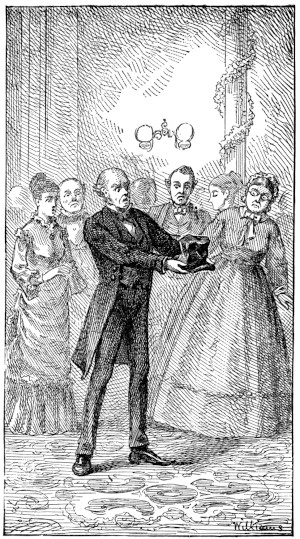
Why, I have been so sorry for that feller that I
didn’t know what to do. Now when he was a courtin’
Cassandra (and how he ever got up spunk enough to
court a mouse, is a mystery to me), Cassandra used
to sew for me, and he would come there evenin’s to
see her, and set the hull evenin’ long and not say
nothin’, but jest look at her, and twirl his thumbs one
over the other. And I told Josiah “I felt bad for
213him, and it seemed as if his thumbs must give out
after a while, and it looked fairly solemn to me, to
see ’em a goin’ so, for evenin’ after evenin’, and week
after week, without any change.”
And Josiah said there was a change. He said
about the middle of the evenin’ he changed thumbs,
and twirled ’em the other way.
I don’t know whether it was so or not. I couldn’t
see no change; and I told Josiah I couldn’t.
How under the sun he ever got up courage to ask
her to marry him, is another deep and mysterious
mystery, and always has been. But there are strange
things in this world that there hain’t no use tryin’ to
pry into and explain. But in his feeble way, he
courted her a good deal, and thought everything of
her, anybody could see that. And he popped the
question to her, or she to him, or it popped itself,—anyway
it was popped, and they was married.
They said he suffered dretfully the day he was
married, and acted strange and bad. They said he
seemed to act sort o’ paralyzed and blind. And she
had to take the lead, and take holt of his hand, and
lead him up to the minister, instead of his leadin’
her.
Some made fun of it, but I didn’t. I told ’em I
presumed he was fairly blind for the time bein’, and
sort o’ numb, and didn’t sense what was passin’ round
him.
It made it as bad agin for him, to think he fell jest
214after they was married. You see he sort ’o backed off
to set down, for he needed rest. And feelin’ so weak
and wobblin’ and
sort o’ tottlin’, he
didn’t back quite
fur enough, and sot
right down on the
floor. It hurt him
awfully, I s’pose,
from their tell.
He was tall, and
they say he struck hard. But he was too bashful to
have a doctor, or make any fuss, only jest set there
where he wuz. Some think he would have sot there
all night, and not tried to make a move towards gettin’
up at all. But Cassandra was proud-spirited, and
215helped him up onto his feet. But they said he acted
jest exactly like a fool.
And I told ’em in reasonable axents “that I presumed
he wuz a fool for the time bein’.” Says I,
“When anybody’s senses are gone, they are a fool.”
Says I, “It is jest as bad to be skairt out of ’em, as
be born without ’em, as long as it lasts.”
But says I, “He knows enough when he hain’t
skairt to death.” And he does. He is industrious,
and so is she, and I shouldn’t wonder if they got along
first-rate, and done well.
Wall, when we got there, Nathan was settin’ by the
stove in the settin’-room. He was afraid of Alzina
Ann, and was too bashful to set down, or stand up, or
speak, or anything. And when she asked him “how
his health was,” he didn’t say nothin’, but looked
down on the floor, and under his chair, and into his
hat, as if he was tryin’ to find his health, and drive it
out, and make it tell how it was.
But she asked him over agin—she was perfectly
heartless, or else she didn’t notice his sufferin’s. And
the second time she asked him, he sort o’ looked under
his chair agin, and into his coat pocket, and seemed to
give up findin’ his health and makin’ it speak for him,
so he said, sort o’ dry and husky, sunthin’ about bein’
“comfortable.”
Which was one of the biggest stories Nathan
Spooner had told sence he j’ined the meetin’-house,
for he wuzn’t comfortable; far from it. His face was
216red as blood, and he was more than half blind, I could
see that by the looks of his mean. But after awhile
he seemed to revive up a little. He wuzn’t afraid of
me and Josiah, not very. And after Alzina Ann and
Cassandra got engaged in talkin, he said quite a
number of words to us, as rational and straight as
anybody. But Alzina Ann had to bring back his
sufferin’s agin, and worse than he had suffered.
I hadn’t said a word to Alzina Ann about Cassandra’s
misfortune; I hadn’t mentioned the child to her.
He is a dretful humbly child, about the humbliest boy
I ever see in my life. He looks fairly pitiful he is so
humbly, and he hain’t more than half-witted, I think.
But Alzina Ann couldn’t keep still; she had to flatter
somebody, or sunthin’, so she had to begin agin:
“How much! how much! that beautiful little boy
looks like his pa! Don’t you think so?” says she to
Cassandra.
And then she would look at Nathan, and then at
the boy, in that rapt, enthusiastic way of her’n. And
says she to Cassandra:
“Hain’t it a comfort to you to think he looks so
much like his pa?”
And Cassandra’s face would get red as blood, and
I could see by her looks that she hadn’t the least
idee what to say, or do, she was so awful wretched,
and feerfully uncomfortable. And truly if Nathan
Spooner could have sunk right down through the floor
into the suller, right into the potato-ben, or pork-barrell,
219it would have been one of the most blessed
reliefs to him that he ever enjoyed.
If she had said what she had to say, and then
left off; but Alzina Ann never’ll do that; she has to
enlarge on her idees. And so she would keep a-askin’
Cassandra in that rapturous, admirin’ way of her’n, if
she didn’t think her boy had the same noble, handsome
look and manners that his father had. And
Cassandra’s face and Nathan’s would be as red as two
red woolen shirts. And then Alzina Ann would look
at the child’s pug nose, and then at Nathan’s, which is
a sort of a Roman one, and the best feature on his
face, as Josiah says. She would look from one nose
to the other as if she admired both of ’em so she
couldn’t hardly stop lookin’ at ’em, and would ask
Nathan “if folks hadn’t told him before how much his
little boy resembled his pa?”
And Nathan didn’t say nothin’ but jest set there
red as blood, his eyes fixed and glarin’ on the opposite
wall, a watchin’ it as close and wishful as if he expected
to see a relief party set out from it to befriend him,
and shoot him down where he sot, or drag him off
into captivity. Anything that would relieve him of
his present sufferin’s he would have hailed gladly. I
could see that by his mean.
But at supper-time worse was in store for him.
Her supper was good—good enough for anybody. She
haint got a great deal to do with, but bein’ a little
afraid of Alzina Ann, and bein’ proud-spirited and
220wantin to make a good appearance, Cassandra had
sent over and borrowed her mother-in-laws’s white-handled
knives, and entirely unbeknown to Alzina
Ann I had carried her over some tea-spoons and other
things for her comfort, for if Cassandra means to do
better, and try to get along and be respectable, I want
to encourage her all I can, so I carried her the spoons.
But all the time Cassandra was a settin’ the table,
Nathan looked worse and worse; he looked so bad it
didn’t seem as if we could keep him out of the suller.
He realized what was in front of him.
You see Cassandra, bein’ so determined to do better,
and start right in the married life, made a practice
of makin’ Nathan ask a blessin’. But he bein’ so
uncommon bashful, it made it awful hard for him when
they had company. He wuzn’t a professor, nor nothin’,
and it come tough on him. He looked more and more
as if he would sink all the while she was a gettin’ the
supper onto the table. And when she was a settin’
the chairs round the table he looked so bad that I
didn’t know but what he would have to have help to
get to the table. And he would give the most pitiful
and beseechin’ looks onto Cassandra that ever was,
but she would shake her head at him, and look decided,
and then he would look as if he would wilt right
down agin.
So, when we got set down to the table, Cassandra
give him a real firm look, and he give a kind of a low
groan, and shet up his eyes, and Cassandra, and me,
221and Josiah put on a becomin’ look for the occasion,
and shet up our’n, when, all of a sudden, Alzina Ann—she
never asked a blessin’ in her own house, and forgot
that other folks did—she spoke out in a real loud,
admirin’ tone, and says she:
“There! I will say it, I never see such beautiful
knives as them be, in my hull life. White-handled
knives, with a gilt of sun-flowers on ’em, is something
I always wanted to own, and always thought I would
own. But never, never did I see any that was so perfectly
beautiful as these are.”
And she held her knife out at arm’s length, and
looked at it admirin’ly, and almost rapturusly.
Nathan looked bad, dretful bad, for he see by
Cassandra’s looks that she wuzn’t goin’ to set him
free from the blessin’. And he sort o’ nestled round,
and looked under the table, a wishful and melancholy
look, as if he had hopes of findin’ a blessin’ there; as
if he thought mebby there might be one a layin’ round
loose on the floor that he could get holt of, and so be
sot free himself. But we didn’t none on us reply to
Alzina Ann, and she seemed to kind o’ quiet down,
and Cassandra give Nathan another look, and he bent
his head, and shet up his eyes agin, and she, and me,
and Josiah shet up our’n. And Nathan was jest beginnin’
agin, when Alzina Ann broke out afresh, and
says:
“What wouldn’t I give if I owned some knives like
222them? What a proud and happy woman it would
make me.”
That rousted us all up agin, and never did I see—unless
it was on a funeral occasion—a face look as
Nathan’s face looked. Nobody could have blamed him
a mite if he had gin up then, and not made another
effort. But Cassandra bein’ so awful determined to
do jest right, and start right in the married life, she
winked to Nathan agin, as firm and decided a wink as
I ever see wunk, and shet up her eyes, and Josiah and
I done as she done, and shet up our’n.
223And Nathan (feelin’ as if he must sink), got all
ready to begin agin. He had jest got his mouth
opened, when says Alzina Ann, in that rapturus way
of her’n:
“Do tell me, Cassandra, how much did you give for
these knives, and where did you get ’em?”
Then it was Cassandra’s turn to feel as if she must
sink, for, bein’ so proud-spirited, it was like pullin’
out a sound tooth to tell Alzina Ann they was borrowed.
But bein’ so sot in tryin’ to do right she
would have up and told her. But I, feelin’ sorry for
her, branched right off, and asked Nathan “if he layed
out to vote republican or democrat.”
Cassandra sithed, and went to pourin’ out the tea.
And Nathan, feelin’ so relieved, brightened up, and
spoke up like a man, the first words he spoke out loud
and plain, like a human bein’, that day—says he:
“If things turn out with me as I hope they will, I
calc’late to vote for old Peter Cooper.”
I could see by the looks of Josiah’s mean that he
was a gettin’ kinder sick of Alzina Ann, and (though
I haint got a jealous hair in the hull of my back-hair
and foretop) I didn’t care a mite if he wuz. But truly
worse wuz to come.
After supper Josiah and me was a settin’ in the
spare room close to the window, a lookin’ through
Cassandra’s album, when we heard Alzina Ann and
Cassandra out under the window a-lookin’ at the posy
beds, when Alzina Ann says:
224“You must excuse my lookin’ at you so much,
Cassandra, but you are so lovely and fair-lookin’ that
I can’t keep my eyes offen you. And what a noble-appearin’
husband you have got—perfectly splendid!
And how pleasant it is here to your house—perfectly
beautiful! Seein’ we are such friends to her, I feel
free to tell you what a awful state I find Josiah Allen’s
wife’s house in. Not a mite of a carpet on her settin’-room
floor, and nothin’ gives a room such a awful look
as that. She said it was up to mend, but, between you
and me, I don’t believe a word of it. I believe it was
up for some other purpose, somethin’ she didn’t want
to tell.
“And the curtains was down in my room, and I had
to sleep all the first night in that condition. I might
jest as well set up, for I could not sleep, it looked so.
And when she got ’em up the next mornin’, they
wuzn’t nothin’ but plain, white muslin. I should
think she could afford something a little more decent
than that for her spare room. And she hadn’t a mite
of fruit cake in the house, only two kinds of common-lookin’
cake. She said Josiah forgot to give her my
letter, and she didn’t get word I was comin’ till about
ten minutes before I got there; but, between you and
me, I never believed that for a minute. I believe they
got up that story between ’em to excuse it off, things
lookin’ so. If I wuzn’t such a friend of hern, and
didn’t think such a sight of her, I wouldn’t mention it
225for the world. But I think everything of her, and
everybody knows I do, so I feel free to talk about her.
“How humbly she has growed! Don’t you think so?
And her mind seems to be kind o’ runnin’ down. For
how under the sun she can think so much of that simple
old husband of hern is a mystery to me, unless she
is growin’ foolish. If it was your husband, Cassandra,
nobody would wonder at it, such a splendid, noble-appearin’
gentleman as he is. But Josiah Allen was
always a poor, insignificant-lookin’ creeter; and now
he is the humbliest, and foolishest, and meachin’est-lookin’
creeter I ever see in human shape. And he
looks as old as Grandfather Rickerson, every mite as
old, and he is most ninety. And he is vain as a peahen.”
I jest glanced round at Josiah, and then instinctively
I looked away agin. His countenance was perfectly
awful. Truly, the higher we are up the worse it hurts
us to fall down. Bein’ lifted up on such a height of
vanity and vain-glory, and fallin’ down from it so
sudden, it most broke his neck (speakin’ in a poetical
and figurative way). I, myself, havin’ had doubts of
her all the time, didn’t feel nigh so worked up and
curious, it more sort o’ madded me, it kind o’ operated
in that way on me. And so, when she begun agin to
run Josiah and me down to the lowest notch, called us
all to naught, made out we wuzn’t hardly fit to live,
and was most fools, and then says agin:
226“I wouldn’t say a word aginst ’em for the world if
I wuzn’t such a friend to ’em—”
Then I riz right up, and stood in the open window;
and it come up in
front of me some
like a pulpit, and
I s’pose my mean
looked considerable
like a preacher’s
when they get carried away with the subject, and
almost by the side of themselves.
Alzina Ann quailed the minute she sot her eyes on
227me, as much or more than any minister ever made a
congregation quail, and, says she, in tremblin’ tones:
“You know anybody will take liberties with a friend
that they wouldn’t with anybody else.”
Says I, in deep, awful tones, “I never believed in
knockin’ folks down to show off that we are intimate
with ’em.”
“Wall,” says she, “you know I do think everything
in the world of you. You know I shouldn’t have said
a word aginst you if I wuzn’t such a warm friend of
yourn.”
“Friend!” says I, in awful axents, “friend! Alzina
Ann Rickerson, you don’t know no more about that
word than if you never see a dictionary. You don’t
know the true meanin’ of that word no more than a
African babe knows about slidin’ down hill.”
Says I, “The Bible gives a pretty good idee of what
it means: it speaks of a man layin’ down his life for
his friend. Dearer to him than his own life. Do you
s’pose such a friendship as that would be a mistrustin’
round, a tryin’ to rake up every little fault they could
lay holt of, and talk ’em over with everybody? Do you
s’pose it would creep round under windows and backbite
and slander a Josiah?”
I entirely forgot for the moment that she had been
a talkin’ about me, for truly abuse heaped upon my
pardner seems ten times as hard to bear up under as
if it was heaped upon me.
Josiah whispered to me: “That is right, Samantha!
228give it to her!” and, upheld by duty and that dear
man, I went on, and says I:
“My friends, those I love and who love me, are
sacred to me. Their well-being and their interest is
as dear to me as my own. I love to have others praise
them, prize them as I do; and I should jest as soon
think of goin’ round tryin’ to rake and scrape sunthin’
to say aginst myself as aginst them.”
Agin I paused for breath, and agin Josiah whispered:
“That is right, Samantha! give it to her!”
Worshipin’ that man as I do, his words was far
more inspirin’ and stimulatin’ to me than root beer.
Agin I went on, and says I:
“Maybe it hain’t exactly accordin’ to Scripture, but
there is somethin’ respectable in open enmity—in beginnin’
your remarks about anybody honestly, in this
way: ‘Now I detest and despise that man, and I am
goin’ to try to relieve my mind by talkin’ about him
jest as bad as I can;’ and then proceed and tear him to
pieces in a straightforward, manly way. I don’t s’pose
such a course would be upheld by the ’postles. But
there is a element of boldness and courage in it
amountin’ almost to grandeur, when compared to
this kind of talk: ‘I think everything in the world of
that man. I think he is jest as good as he can be, and
he hain’t got a better friend in the world than I am;’
and then go on, and say all you can to injure him.
“Why, a pirate runs up his skeleton and cross-bars
229when he is goin’ to rob and pillage. I think, Alzina
Ann, if I was in your place I would make a great
effort, and try and be as noble and magnanimous as a
pirate.”
Alzina Ann looked like a white hollyhawk that had
been withered by a untimely frost. But Cassandra
looked tickled (she hadn’t forgot her sufferin’s, and
the sufferin’s of Nathan Spooner). And my Josiah
looked proud and triumphant in mean. And he
told me in confidence, a goin’ home (and I wouldn’t
wish it spoke of agin, for folks might think it was
foolish in me to tell such little admirin’ speeches
that a companion will make in moments of harmony
and confidence). But he said that he hadn’t seen
me look so good to him as I did when I stood there in
the winder, not for much as thirteen years. Says
he:
“Samantha, you looked almost perfectly beautiful.”
That man worships the ground I walk on, and I do
hisen.
230

THE LORDS OF CREATION.
Josiah Allen is awful tickled to think he is a man.
He has said so to me, time and agin. And I don’t
wonder a mite at it. Men are first-rate creeters, and
considerable good-lookin’. I have always said so.
And they have such glorious chances to be noble and
grand, and to work for the true and the right, that I
don’t wonder a mite that Josiah feels just as he duz feel.
And when Josiah tells me how highly tickled he is
he is a man—when he says it in a sort of a pensive
and dreamy way, kinder miselanious like—I don’t resent
it in him but on the contrary approve of it
in him, highly. But once in a while he will get to
feelin’ kind o’ cross and uppish, and say it to me in a
sort of a twittin’ way, and boastin’.
Mebby he will begin by readin’ out loud to me sunthin’
against wimmen’s rights, in the World or
almanac, or some other high-toned periodical; sometimes
it will be awful cuttin’ arguments aginst wimmen.
And after he gets through readin’ it he will
231speak out in such a sort of a humiliatin’ way about
how awful tickled he is, he is a man, so he can vote,
and help keep the glorious old state of New York on
its firm basis of nobility, morality, and wise economy.
Why, says he to me the other afternoon (feelin’
fractious was the cause of his sayin’ it at the time),
says he: “Wimmen are dretful simple creeters; gossipin’,
weak, weak-minded, frivolous bein’s; extravagant,
given to foolish display. They don’t mind the
cost of things if they can only make a big show. So
different from men, they be. Why,” says he proudly and
boastfully, “you never in your life ketched a man gossipin’
over their neighbors’ affairs. You never see ’em
meddlin’ the least mite with scandal and evil talkin’.
Men are economical, sound-minded. They spend only
jest what they need, what is useful—nothin’ more, not
a cent more. Why,” says he, “take it with wimmen’s
foolish extravagance and love of display, what
would the glorious old state of New York come to if
it was sot under her rain? And they are so weak,
too,—wimmen be. Why, old Error would take ’em by
the nose” (Josiah, I think, is a practicin’ allegory. He
uses flowery rhetoricks and simelys as much agin as he
used to use ’em.) And he repeated agin, with a haughty
look: “Old Error would take ’em by the nose, as it
were, and lead ’em into all sorts of indiscretions, and
weakness, and wickedness, before they knew it.
“Why, if we men of New York state had a woman’s
incapability of grapplin’ with wrong, and overthrowin’
232of it: if we had her love of scandal and gossip; if we
had her extravagance and love of display, where
would the glorious old state of New York be to-day?
Where would her morals be? Where would her finankle
and money affairs be?”
And Josiah leaned back in his chair, and crossed
his legs over each other, as satisfied and contented a
crossin’ as I ever see, and says agin:
“If I was ever proud and tickled about anything in
my life, Samantha Allen, I am tickled to think I am a
man.”
He had been readin’ a witherin’ piece out of the
almanac to me—an awful deep, skareful piece aginst
wimmen’s suffrage. And feelin’ cross and fractious,
he did look so awful overbearin’ and humiliatin’ onto
me, on account of my bein’ a woman, that I sprunted
right up and freed my mind to him. I am very close-mouthed
naturally, and say but very little, but I can’t
stand everything.
While he was talkin’ I had been a fixin’ a new tow
mop that I had been a spinnin’ into my patented mop-stick,
and had jest got it done. And I riz right up
and pinted with it at a picture of the new capitol at
Albany that hung over the sink. It was a noble and
commandin’ gesture (though hard to the wrist). It
impressed him dretfully, I could see it did. I had that
sort of a lofty way with me as I gestured, and went on
in awful tones to say:
A MONUMENT OF MEN’S ECONOMY.

A MONUMENT OF MEN’S ECONOMY.
“When you look at that buildin’, Josiah Allen, no
233wonder you talk about wimmen’s extravagance and
foolish love of display, and the econimy and firm common
sense of the male voters of the state of New
York, and their wise
expenditure of public
money. When you and
a passel of other men
get together and vote to
build a house costin’
nine or ten millions
of dollars to make
laws in so small that
wimmen might well
be excused for
thinkin’ they was made in a wood-shed or behind a
barn-door.”
Says I, lowerin’ down my mop-stick, for truly my
234arm was weary—gesturin’ in eloquence with a mop-stick
is awful fatiguin’—says I, “As long as that
monument of man’s wisdom and econimy stands there,
no man need to be afraid that a woman will ever dast
to speak about wantin’ to have any voice in public
affairs, any voice in the expenditure of her own property
and income tax. No, she won’t dast to do it, for
man’s thrifty, prudent common sense and superior
econimy has been shown in that buildin’ to a extent
that is fairly skareful.”
It is a damper onto anybody when they have been a
talkin’ sarcastical and ironical, to have to come out
and explain what you are a doin’. But I see that I
had got to, for ever sense I had lowered my mop-stick
and axent, Josiah had looked chirker and chirker, and
now he sot there, lookin’ down at his almanac, as satisfied
and important as a gander walkin’ along in front
of nineteen new goslin’s. He thought I was a praisin’
men. And says I, comin’ out plain, “Look up here,
Josiah Allen, and let me wither you with my glance!
I am a talkin’ sarcastical, and would wish to be so
understood!”
But I was so excited that before I had fairly got out
of that ironical tone, I fell into it agin deeper than
ever (though entirely unbeknown to me), and says I:
“As to woman’s love of gossip and scandal, and
man’s utter aversion to it, let your mind fall back four
years, Josiah Allen, if you think it is strong enough to
bear the fall.”
235And I went on in a still more ironicler tone. I
don’t know as I ever see a more ironicler axent in my
hull life than mine was as I went on, and says:
“How sweet it must be for men to look back and
reflect on it, that while wimmen gloated over the
details of that scandalous gossip, not a man throughout
the nation ever gave it a thought. And while
female wimmen, crazy and eager-eyed, stood in knots
at their clubs and on street corners holdin’ each other
by the bunnet-strings a talkin’ it over, and rushed
eagerly to the post-office to try to get the latest details,
how sweet to think that the manly editor all over the
land stood up in man’s noble strength and purity, and
with a firm eye on the public morals and the welfare
of the young and innocent, and happily ignorant,
refused to gratify woman’s rampent curiosity, and said
nothing of the matter, not a word, in editorial or news
column; but all through those long months filled up
their pages with little moral essays, and cuttin’ articles
on their hatred of gossip and scandal. And when,
with unsatisfied, itchin’ ears, wives would question
their husbands concernin’ the chief actors in the
drama, their pure-minded husbands would rebuke
them and say, ‘Cease, woman, to trouble me. We
know them not. We have as yet spake no word upon
the subject, and we will not be led into speakin’ of it
by any woman, not even the wife of our youth’”youth’”
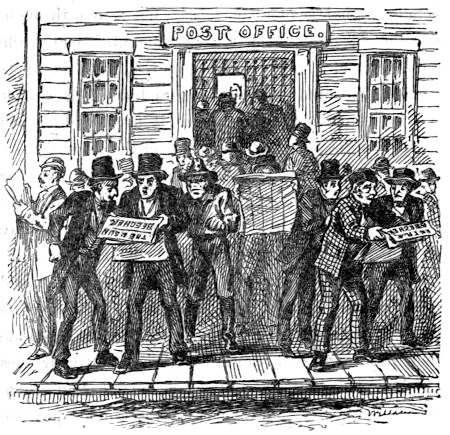
Josiah looked meachener and meachener, till, as I
got through, it seemed as if he had got to the very
236bounds of meach. He knew well how many times
that old mare had gone to Jonesville for the last
World, long before its time, so in hopes it would be a
little ahead of its time, so he could get the latest
gossip and scandal, and get ahead of old Gowdey, who
took the Times, and old Cypher, who took the Sun.
He knew jest how that post-office was fairly blocked up
with men, pantin’ and sweaty with runnin’, every time
the other mails come in. And he knew well, Josiah
Allen did, how he and seven or eight other old Methodist
brethren got to talkin’ about it so engaged out
239under the meetin’-house shed, one day, that they forgot
themselves, and never come into meetin’ at all.
And we wimmen sisters had to go out there to find
’em, after the meetin’ was over. He remembered it,
Josiah Allen did, I see that by his mean.
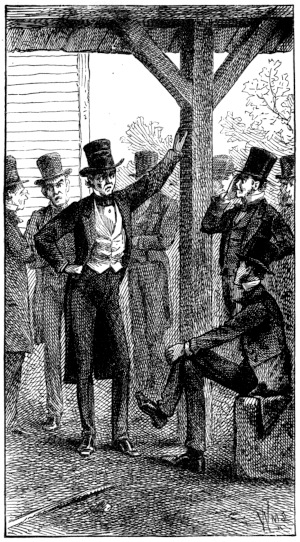
UNDER THE MEETING-HOUSE SHED.
He didn’t say a word, but sot there smit and conscience-struck.
And then I dropped my ironical tone,
and took up my awful one, that I use a talkin’ on
principle. I took up my very heaviest and awfulest
one, as I resumed and continued on.
“I would talk if I was in your place, Josiah Allen,
about wimmen’s ruinin’ old New York State if they
voted. I would soar off into simelys if I was in your
place, and talk about their bein’ led by the nose into
wickedness—and grow eloquent over their weakness
and inability to grapple with error—when ten hundred
thousand male voters of the state stand with their
hands in their pockets, or whittlin’ shingles, or tradin’
jack-knives, or readin’ almanacs, and etcetery, and let
an evil go right on in their midst that would have disgraced
old Sodom.
“Why, it is a wonder to me that the pure waters of
old Oneida don’t fairly groan as they wash up on the
shores that they can’t cleanse from this impurity, but
would if they could, I know. She don’t approve of it,
that old lake don’t—she don’t approve of anything of
that kind, no more than I do. She and I and the
other wimmen of the state would make short work of
such iniquities if we had our say.
240“But there them ten hundred thousand male voters
stand, calm and happy, all round the Community, in
rows and clusters; porin’ over almanacs, and whistlin’
new and various whistles (Josiah had broke out into a
very curious whistle) and contemplate the sin with
composure and contentment.
“And“And superintendents of Sabbath-schools and Young
Men’s Christian Associations will make excursions to
admire them and their iniquity, to imbibe bad thoughts
and principles unconsciously, but certainly, as one
inevitably must when they behold a crime masked
in beauty, in garments of peace and order and industry.
And railroad managers will carry the young, the
easily-impressed, and the innocent at half price, so
eager, seemin’ly, that they should behold sin wreathin’
itself in flowers, guilt arrayin’ itself in festal robes to
lure the unwary footsteps.”
“Wall,” says Josiah, “I guess I’ll go out and
milk.”
And I told him he had better.
241

AN EXERTION AFTER PLEASURE.
Wall, the very next mornin’ Josiah got up with
a new idee in his head. And he broached it
to me to the breakfast table. They have been havin’
sights of pleasure exertions here to Jonesville lately.
Every week a’most they would go off on a exertion
after pleasure, and Josiah was all up on end to go too.
That man is a well-principled man as I ever see, but
if he had his head he would be worse than any young
man I ever see to foller up picnics and 4th of Julys
and camp-meetin’s and all pleasure exertions. But I
don’t encourage him in it. I have said to him time
and again: “There is a time for everything, Josiah
Allen, and after anybody has lost all their teeth and
every mite of hair on the top of their head, it is time
for ’em to stop goin’ to pleasure exertions.”
But good land! I might jest as well talk to the wind!
If that man should get to be as old as Mr. Methusler,
and be goin’ on a thousand years old, he would prick
up his ears if he should hear of a exertion. All summer
242long that man has beset me to go to ’em, for he
wouldn’t go without me. Old Bunker Hill himself
hain’t any sounder in principle than Josiah Allen, and
I have had to work head-work to make excuses and
quell him down. But last week they was goin’ to have
one out on the lake, on a island, and that man sot his
foot down that go he would.
We was to the breakfast-table a talkin’ it over, and
says I:
“I shan’t go, for I am afraid of big water, anyway.”
Says Josiah: “You are jest as liable to be killed in
one place as another.”
Says I, with a almost frigid air, as I passed him his
coffee: “Mebby I shall be drounded on dry land,
Josiah Allen, but I don’t believe it.”
Says he, in a complainin’ tone: “I can’t get you
started onto a exertion for pleasure any way.”
Says I, in a almost eloquent way: “I don’t believe
in makin’ such exertions after pleasure. As I have
told you time and agin, I don’t believe in chasin’ of
her up. Let her come of her own free will. You can’t
ketch her by chasin’ after her no more than you can
fetch up a shower in a drowth by goin’ out doors and
runnin’ after a cloud up in the heavens above you.
Sit down and be patient, and when it gets ready the
refreshin’ rain-drops will begin to fall without none of
your help. And it is jest so with pleasure, Josiah
Allen; you may chase her up over all the oceans and
big mountains of the earth, and she will keep ahead of
243you all the time; but set down and not fatigue yourselfyourself
a thinkin’ about her, and like as not she will
come right into your house unbeknown to you.”
“Wall,” says he, “I guess I’ll have another griddle-cake,
Samantha.”
And as he took it, and poured the maple-syrup over
it, he added gently, but firmly:
“I shall go, Samantha, to this exertion, and I should
be glad to have you present at it, because it seems jest
to me as if I should fall overboard durin’ the day.”
Men are deep. Now that man knew that no amount
of religious preachin’ could stir me up like that one
speech. For though I hain’t no hand to coo, and don’t
encourage him in bein’ spoony at all, he knows that I
am wrapped almost completely up in him. I went.
Wall, the day before the exertion Kellup Cobb come
into our house of a errant, and I asked him if he was
goin’ to the exertion; and he said he would like to
go, but he dassent.
“Dassent!” says I. “Why dassent you?”
“Why,” says he, “how would the rest of the wimmen
round Jonesville feel if I should pick out one
woman and wait on her?” Says he bitterly: “I hain’t
perfect, but I hain’t such a cold-blooded rascal as not
to have any regard for wimmen’s feelin’s. I hain’t no
heart to spile all the comfort of the day for ten or a
dozen wimmen.”
“Why,” says I, in a dry tone, “one woman would be
happy accordin’ to your tell.”
244“Yes, one woman happy, and ten or fifteen gauled—bruised
in the tenderest place.”
“On their heads?” says I enquirin’ly.
“No,” says he, “their hearts. All the girls have
probable had more or less hopes that I would invite
’em—make a choice of ’em. But when the blow was
struck, when I had passed ’em by and invited some
other, some happier woman, how would them slighted
ones feel? How do you s’pose they would enjoy the
day, seein’ me with another woman, and they droopin’
round without me? That is the reason, Josiah Allen’s
wife, that I dassen’t go. It hain’t the keepin’ of my
horse through the day that stops me. For I could
carry a quart of oats and a little jag of hay in the bottom
of the buggy. If I had concluded to pick out a
girl and go, I had got it all fixed out in my mind how
I would manage. I had thought it over, while I was
ondecided, and duty was a strugglin’ with me. But I
was made to see where the right way for me lay, and
I am goin’ to foller it. Joe Purday is goin’ to have
my horse, and give me seven shillin’s for the use of it
and its keepin’. He come to hire it just before I made
up my mind that I hadn’t ort to go.
“Of course it is a cross to me. But I am willin’ to
bear crosses for the fair sect. Why,” says he, a
comin’ out in a open, generous way, “I would be
willin’, if necessary for the general good of the fair
sect—I would be willin’ to sacrifice ten cents for ’em,
or pretty nigh that, I wish so well to ’em. I hain’t that
245enemy to ’em that they think I am. I can’t marry
’em all, Heaven knows I can’t, but I wish ’em well.”
“Wall,” says I, “I guess my dish-water is hot; it
must be pretty near bilin’ by this time.”
And he took the hint and started off. I see it
wouldn’t do no good to argue with him, that wimmen
didn’t worship him. For when a feller once gets it
into his head that female wimmen are all after him,
you might jest as well dispute the wind as argue with
him. You can’t convince him nor the wind—neither
of ’em—so what’s the use of wastin’ breath on ’em.
And I didn’t want to spend a extra breath that day,
anyway, knowin’ I had such a hard day’s work in front
of me, a finishin’ cookin’ up provisions for the exertion,
and gettin’ things done up in the house so I could
leave ’em for all day.
We had got to start about the middle of the night,
for the lake was 15 miles from Jonesville, and the old
mare bein’ so slow, we had got to start an hour or two
ahead of the rest. I told Josiah in the first on’t, that
I had jest as lives set up all night, as to be routed out
at two o’clock. But he was so animated and happy at
the idee of goin’ that he looked on the bright side of
everything, and he said that we would go to bed before
dark, and get as much sleep as we commonly did.
So we went to bed the sun an hour high. And I was
truly tired enough to lay down, for I had worked dretful
hard that day, almost beyond my strength. But
we hadn’t more’n got settled down into the bed, when
246we heard a buggy and a single wagon stop at the gate,
and I got up and peeked through the window, and I
see it was visitors come to spend the evenin’. Elder
Bamber and his family, and Deacon Dobbins’es folks.
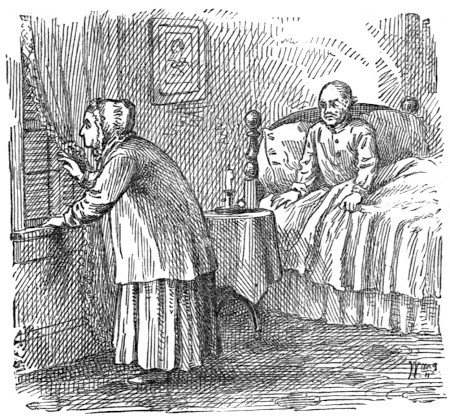
Josiah vowed that he wouldn’t stir one step out of
that bed that night. But I argued with him pretty
sharp, while I was throwin’ on my clothes, and I
finally got him started up. I hain’t deceitful, but I
thought if I got my clothes all on, before they came
in, I wouldn’t tell ’em that I had been to bed that
time of day. And I did get all dressed up, even to
247my handkerchief pin. And I guess they had been
there as much as ten minutes before I thought that I
hadn’t took my night-cap off. They looked dretful
curious at me, and I felt awful meachin’. But I jest
ketched it off, and never said nothin’. But when
Josiah come out of the bedroom with what little hair
he has got standin’ out in every direction, no two
hairs a layin’ the same way, and one of his galluses a
hangin’ most to the floor under his best coat, I up and
told ’em. I thought mebby they wouldn’t stay long.
But Deacon Dobbins’es folks seemed to be all waked
up on the subject of religion, and they proposed we
248should turn it into a kind of a conference meetin’; so
they never went home till after ten o’clock.
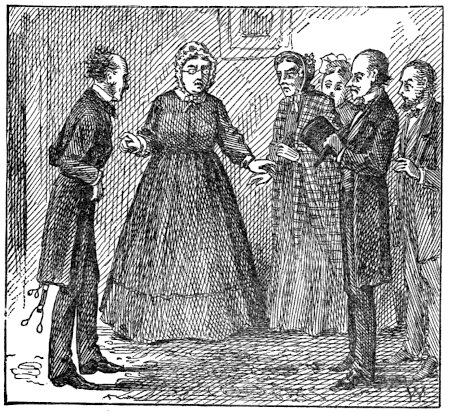
It was most eleven when Josiah and me got to bed
agin. And then jest as I was gettin’ into a drowse, I
heerd the cat in the buttery, and I got up to let her
out. And that rousted Josiah up, and he thought he
heerd the cattle in the garden, and he got up and went
out. And there we was a marchin’marchin’ round most all
night.
And if we would get into a nap, Josiah would think
it was mornin’, and he would start up and go out to
look at the clock. He seemed so afraid we would be
belated, and not get to that exertion in time. And
there we was on our feet most all night. I lost myself
once, for I dreampt that Josiah was a drowndin’, and
Deacon Dobbins was on the shore a prayin’ for him.
It started me so, that I jist ketched holt of Josiah and
hollered. It skairt him awfully, and says he, “What
does ail you, Samantha? I haint been asleep before,
to-night, and now you have rousted me up for good.
I wonder what time it is.”
And then he got out of bed again, and went and
looked at the clock. It was half past one, and he
said “He didn’t believe we had better go to sleep
again, for fear we would be too late for the exertion,
and he wouldn’t miss that for nothin’.”
“Exertion!” says I, in a awful cold tone. “I
should think we had had exertion enough for one
spell.”
251
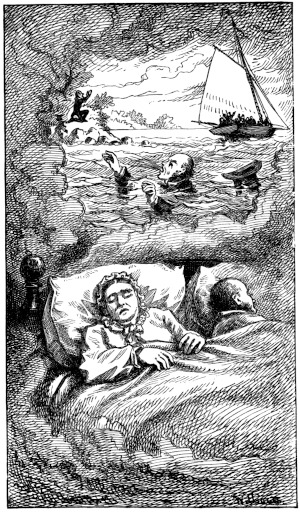
But as bad and wore out as Josiah felt bodily, he
was all animated in his mind about what a good time
he was a goin’ to have. He acted foolish, and I told
him so. I wanted to wear my brown and black gingham
and a shaker, but Josiah insisted that I should
wear a new lawn dress that he had brought me home
as a present, and I had jest got made up. So, jest to
please him, I put it on, and my best bonnet.
And that man, all I could do and say, would put on
a pair of pantaloons I had been a makin’ for Thomas
Jefferson. They was gettin’ up a milatary company
to Jonesville, and these pantaloons was blue, with a
red stripe down the sides—a kind of a uniform.
Josiah took a awful fancy to ’em, and says he:
“I will wear ’em, Samantha; they look so dressy.”
Says I: “They hain’t hardly done. I was goin’ to
stitch that red stripe on the left leg on again. They
hain’t finished as they ort to be, and I would not wear
’em. It looks vain in you.”
Says he: “I will wear ’em, Samantha. I will be
dressed up for once.”
I didn’t contend with him. Thinks I: we are makin’
fools of ourselves by goin’ at all, and if he wants to
make a little bigger fool of himself, by wearin’ them
blue pantaloons, I won’t stand in his light. And then
I had got some machine oil onto ’em, so I felt that I
had got to wash ’em, anyway, before Thomas J. took
’em to wear. So he put ’em on.
I had good vittles, and a sight of ’em. The basket
252wouldn’t hold ’em all, so Josiah had to put a bottle of
red ross-berry jell into the pocket of his dress-coat,
and lots of other little things, such as spoons and
knives and forks, in his pantaloons and breast-pockets.
He looked like Captain Kidd, armed up to the teeth,
and I told him so. But good land! he would have
carried a knife in his mouth if I had asked him to, he
felt so neat about goin’, and boasted so on what a
splendid exertion it was goin’ to be.
We got to the lake about eight o’clock, for the old
mare went slow. We was about the first ones there,
but they kep’ a comin’, and before ten o’clock we all
got there.
The young folks made up their minds they would
stay and eat their dinner in a grove on the mainland.
But the majority of the old folks thought it was best
to go and set our tables where we laid out to in the
first place. Josiah seemed to be the most rampant of
any of the company about goin’. He said he shouldn’t
eat a mouthful if he didn’t eat it on that island. He
said, what was the use of goin’ to a pleasure exertion
at all if you didn’t try to take all the pleasure you
could. So about twenty old fools of us sot sail for the
island.
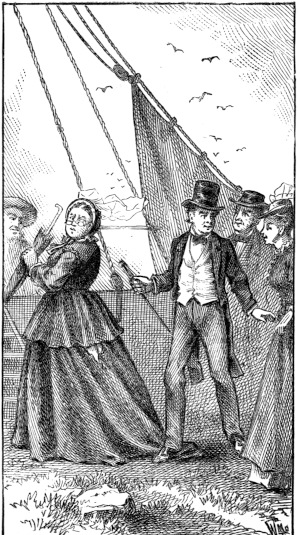
I had made up my mind from the first on’t to face
trouble, so it didn’t put me out so much when Deacon
Dobbins, in gettin’ into the boat, stepped onto my new
lawn dress, and tore a hole in it as big as my two
hands, and ripped it half offen the waist. But Josiah
255havin’ felt so animated and tickled about the exertion,
it worked him up awfully when, jest after we had got
well out onto the lake, the wind took his hat off and
blew it away out onto the lake. He had made up his
mind to look so pretty that day that it worked him up
awfully. And then the sun beat down onto him; and
if he had had any hair onto his head it would have
seemed more shady.
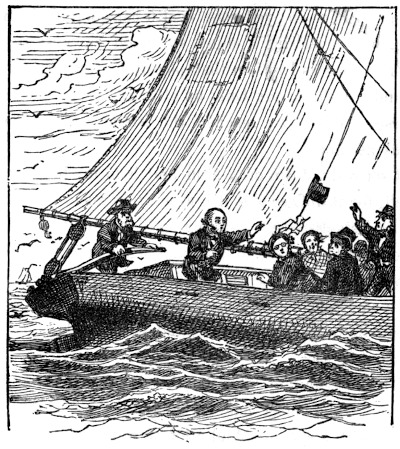
But I did the best I could by him. I stood by him
and pinned on his red bandanna handkerchief onto his
256head. But as I was a fixin’ it on, I see there was
sunthin’ more than mortification ailed him. The lake
was rough and the boat rocked, and I see he was
beginnin’ to be awful sick. He looked deathly. Pretty
soon I felt bad, too. Oh! the wretchedness of that
time. I have enjoyed poor health considerable in my
life, but never did I enjoy so much sickness in so
short a time as I did on that pleasure exertion to that
island. I s’pose our bein’ up all night a’most made it
worse. When we reached the island we was both
weak as cats.
I sot right down on a stun and held my head for a
spell, for it did seem as if it would split open. After a
while I staggered up onto my feet, and finally I got so
I could walk straight, and sense things a little. Though
it was tejus work to walk, anyway, for we had landed
on a sand-bar, and the sand was so deep it was all we
could do to wade through it, and it was as hot as hot
ashes ever was.
Then I began to take the things out of my dinner-basket.
The butter had all melted, so we had to dip
it out with a spoon. And a lot of water had swashed
over the side of the boat, so my pies and tarts and
delicate cake and cookies looked awful mixed up. But
no worse than the rest of the company’s did.
But we did the best we could, and the chicken and
cold meat bein’ more solid had held together quite
well, so there was some pieces of it considerable hull,
though it was all very wet and soppy. But we separated
257’em out as well as we could, and begun to make
preparations to eat. We didn’t feel so animated about
eatin’ as we should if we hadn’t been so sick to our
stomachs. But we felt as if we must hurry, for the
man that owned the boat said he knew it would rain
before night, by the way the sun scalded.
There wasn’t a man or a woman there but what the
presperation and
sweat jest poured
down their faces.
We was a haggard
and melancholy-lookin’
set. There was a piece
of woods a little
ways off, but it
was up quite a
rise of ground,
and there wasn’t
one of us but what
had the rheumatiz
more or less.
We made up a fire on the sand, though it seemed as if
it was hot enough to steep the tea and coffee as it was.
After we got the fire started, I histed a umberell
and sot down under it, and fanned myself hard, for I
was afraid of a sunstroke.
Wall, I guess I had set there ten minutes or more,
when all of a sudden I thought, where is Josiah? I
258hadn’t seen him since we had got there. I riz up and
asked the company almost wildly if they had seen
my companion, Josiah.
They said, “no, they hadn’t.”
But Celestine Wilkin’s little girl, who had come
with her grandpa and grandma Gowdy, spoke up, and
says she:
“I seen him goin’ off towards the woods. He acted
dretful strange, too; he seemed to be a walkin’ off
sideways.”
“Had the sufferin’s he had undergone made him
delerious?” says I to myself; and then I started off
on the run towards the woods, and old Miss Bobbet,
and Miss Gowdy, and Sister Bamber, and Deacon
Dobbins’es wife all rushed after me.
Oh, the agony of them two or three minutes! my
mind so distracted with fourbodin’s, and the presperation
and sweat a pourin’ down. But all of a sudden,
on the edge of the woods, we found him. Miss Gowdy
weighin’ a little less than me, mebby 100 pounds or
so, had got a little ahead of me. He sot backed up
against a tree, in a awful cramped position, with his
left leg under him. He looked dretful uncomfortable.
But when Miss Gowdy hollered out:
“Oh, here you be. We have been skairt about you.
What is the matter?”
He smiled a dretful sick smile, and says he:
“Oh, I thought I would come out here and meditate
a spell. It was always a real treat to me to meditate.”
261
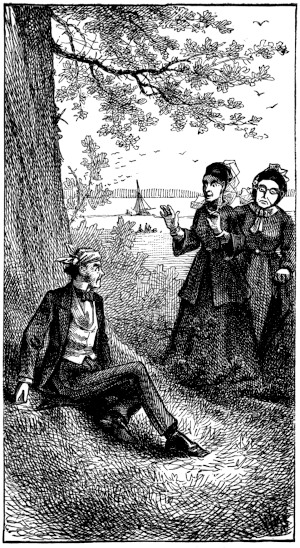
A DISCOURAGED EXCURSIONIST.
Just then I come up a pantin’ for breath, and as the
wimmen all turned to face me, Josiah scowled at me,
and shook his fist at them four wimmen, and made the
most mysterious motions of his hands towards ’em.
But the minute they turned round he smiled in a
sickish way, and pretended to go to whistlin’.
Says I, “What is the matter, Josiah Allen? What
are you off here for?”
“I am a meditatin’, Samantha.”
Says I, “Do you come down and jine the company
this minute, Josiah Allen. You was in a awful takin’
to come with ’em, and what will they think to see you
act so?”
The wimmen happened to be a lookin’ the other
way for a minute, and he looked at me as if he would
take my head off, and made the strangest motions
towards ’em; but the minute they looked at him he
would pretend to smile, that deathly smile.
Says I, “Come, Josiah Allen, we’re goin’ to get
dinner right away, for we are afraid it will rain.”
“Oh, wall,” says he, “a little rain, more or less,
hain’t a goin’ to hender a man from meditatin’.”
I was wore out, and says I, “Do you stop meditatin’
this minute, Josiah Allen!”
Says he, “I won’t stop, Samantha. I let you have
your way a good deal of the time; but when I take it
into my head to meditate, you hain’t a goin’ to break
it up.”
Jest at that minute they called to me from the
262shore to come that minute to find some of my dishes.
And we had to start off. But oh! the gloom of my
mind that was added to the lameness of my body.
Them strange motions and looks of Josiah wore on
me. Had the sufferin’s of the night, added to the
trials of the day, made him crazy? I thought more’n
as likely as not I had got a luny on my hands for the
rest of my days.
And then, oh how the sun did scald down onto me,
and the wind took the smoke so into my face that
there wasn’t hardly a dry eye in my head. And then
a perfect swarm of yellow wasps lit down onto our
vittles as quick as we laid ’em down, so you couldn’t
touch a thing without runnin’ a chance to be stung.
Oh, the agony of that time! the distress of that pleasure
exertion! But I kep’ to work, and when we had
got dinner most ready, I went back to call Josiah again.
Old Miss Bobbet said she would go with me, for she
thought she see a wild turnip in the woods there, and
her Shakespeare had a awful cold, and she would try
to dig one to give him. So we started up the hill
again. He set in the same position, all huddled up,
with his leg under him, as uncomfortable a lookin’
creeter as I ever see. But when we both stood in
front of him, he pretended to look careless and happy,
and smiled that sick smile.
Says I, “Come, Josiah Allen, dinner is ready.”
“Oh! I hain’t hungry,” says he. “The table will
probable be full. I had jest as lieves wait.”
263“Table full!” says I. “You know jest as well as I
do that we are eatin’ on the ground. Do you come
and eat your dinner this minute.”
“Yes, do come,” says Miss Bobbet, “we can’t get
along without you.”
“Oh!” says he, with that ghastly smile, a pretendin’
to joke, “I have got plenty to eat here—I can eat
muskeeters.”
The air was black with ’em, I couldn’t deny it.
“The muskeeters will eat you, more likely,” says I.
“Look at your face and hands; they are all covered
with ’em.”
“Yes, they have eat considerable of a dinner out of
me, but I don’t begrech ’em. I hain’t small enough,
nor mean enough, I hope, to begrech ’em one good
meal.”
Miss Bobbet started off in search of her wild turnip,
and after she had got out of sight Josiah whispered to
me with a savage look, and a tone sharp as a sharp
axe:
“Can’t you bring forty or fifty more wimmen up
here? You couldn’t come here a minute, could you,
without a lot of other wimmen tight to your heels?”
I begun to see daylight, and after Miss Bobbet had
got her wild turnip and some spignut, I made some
excuse to send her on ahead, and then Josiah told me
all about why he had gone off by himself alone, and
why he had been a settin’ in such a curious a position
all the time since we had come in sight of him.
264
It seems he had sot down on that bottle of rass-berry
jell. That red stripe on the side wasn’t hardly
finished, as I said,
and I hadn’t fastened
my thread
properly, so when
he got to pullin’ at
’em to try to wipe
off the jell, the
thread started, and
bein’ sewed on a
machine, that seam
jest ripped right open from top to bottom. That was
what he had walked off sideways towards the woods
for. But Josiah Allen’s wife hain’t one to desert a
265companion in distress. I pinned ’em up as well as I
could, and I didn’t say a word to hurt his feelin’s, only
I jest said this to him, as I was a fixin’ em: I fastened
my grey eye firmly and almost sternly onto him, and
says I:
“Josiah Allen, is this pleasure?” Says I, “You
was determined to come.”
“Throw that in my face agin, will you? What if
I was? There goes a pin into my leg! I should think
I had suffered enough without your stabbin’ of me with
pins.”
“Wall then, stand still, and not be a caperin’ round
so. How do you s’pose I can do anything with you a
tousin’ round so?”
“Wall, don’t be so aggravatin’ then.”
I fixed ’em as well as I could, but they looked pretty
bad, and there they was all covered with jell, too.
What to do I didn’t know. But finally I told him I
would put my shawl onto him. So I doubled it up
corner-ways as big as I could, so it almost touched the
ground behind, and he walked back to the table with
me. I told him it was best to tell the company all
about it, but he jest put his foot down that he wouldn’t,
and I told him if he wouldn’t that he must make his
own excuses to the company about wearin’ the shawl.
So he told ’em he always loved to wear summer shawls;
he thought it made a man look so dressy.
But he looked as if he would sink all the time he
was a sayin’ it. They all looked dretful curious at
266him, and he looked as meachin’ as if he had stole
sheep—and meachin’er—and he never took a minute’s
comfort, nor I nuther. He was sick all the way back
to the shore, and so was I. And jest as we got into
our wagons and started for home, the rain began to
pour down. The wind turned our old umberell inside
out in no time. My lawn dress was most spilte before,
and now I give up my bonnet. And I says to Josiah:
“This bonnet and dress are spilte, Josiah Allen,
and I shall have to buy some new ones.”
“Wall! wall! who said you wouldn’t?” he snapped
out.
But it wore on him. Oh! how the rain poured
down. Josiah havin’ nothin’ but a handkerchief on
his head felt it more than I did. I had took a apron
to put on a gettin’ dinner, and I tried to make him
let me pin it on his head. But says he, firmly:
“I hain’t proud and haughty, Samantha, but I do
feel above ridin’ out with a pink apron on for a hat.”
“Wall then,” says I, “get as wet as sop if you had
ruther.”
I didn’t say no more, but there we jest sot and suffered.
The rain poured down; the wind howled at us;
the old mare went slow; the rheumatiz laid holt of
both of us; and the thought of the new bonnet and
dress was a wearin’ on Josiah, I knew.
There wasn’t a house for the first seven miles, and
after we got there I thought we wouldn’t go in, for we
had got to get home to milk, anyway, and we was both
269as wet as we could be. After I had beset him about
the apron we didn’t say hardly a word for as much as
thirteen miles or so; but I did speak once, as he leaned
forward, with the rain drippin’ offen his bandanna
handkerchief onto his blue pantaloons. I says to
him in stern tones:
“Is this pleasure, Josiah Allen?”
He give the old mare a awful cut, and says he:
“I’d like to know
what you want to
be so agrevatin’
for.”
I didn’t multiply
any more
words with him,
only as we drove
up to our door-step,
and he
helped me out
into a mud-puddle,
I says to
him:
“Mebby you’ll
hear to me another time, Josiah Allen.”
And I’ll bet he will. I hain’t afraid to bet a ten
cent bill that that man won’t never open his mouth to
me again about a pleasure exertion.
270

A VISIT TO THE CHILDREN.
It was a fair and lovely forenoon, and I thought
we would go and spend the day with the childern.
Kitty Smith had gone the day before to visit a aunt
on her mother’s side to Log London. She was a
layin’ out to stay 3 or 4 weeks, and I declare, it
seemed lonesome as a dog—and lonesomer. And I
told Josiah that I guessed we would go to Jonesville
and visit the childern, for we hadn’t been there to
stay all day with ’em for a number of weeks. He
sort o’ hung back, and said he didn’t know how to
spend the time. But I only says, decided like and
firm, and in a solemn and warnin’ way:
“You can do as you are a mind to, Josiah Allen,
and as your conscience will let you. But croup is
round, that I know, and I worried last night a good
deal about little Samantha Joe.”
Says he: “I will hitch up the old mare this minute,
Samantha, and do you throw your things on as quick
as you can.” And he started for the barn almost on
the run.
271My natural nature is very truthful and transparent,—almost
like rain-water,—and little figurative expressions
like these are painful to me—very. But every
woman who has a man to deal with for above twenty
years will know that they have to use ’em in order to
move men as men ort to be moved.
I won’t come right out and lie for nobody—man or
beast. Croup was round promiscus in Jonesville, and
I had worried about little Samantha Joe. But my
conscience told me, as I tied up my back hair, and
272hooked up my dress, that I had talked in a sort of a
parable way. And it smote me; not so hard as it had
smote; but hardish.
And if there ever was a old tyrant on the face of
the earth, my conscience is one. It won’t let me do
nothin’ the least mite out of the way without poundin’
me almost to death. Sometimes I get fairly tuckered
out with it.
Wall, I had jest finished hookin’ up my dress, and
was a pinnin’ on my collar at the lookin’-glass, when,
happenin’ to throw one of the eyes of my spectacles
out of the window, I see Kellup Cobb a drivin’ up;
and he hitched the hearse to the front gate, and come
in.
He looked quite well for him. His hair and whiskers
was a good, dark, tan color, bearin’ a little on the
orange. Quite a becomin’ color to him, he bein’ so
saller.
He inquired where Kitty was. And then he wanted
to know most the first thing he said, and his mean
looked anxious as he said it, “If her health was a
keepin’ up?”
“Why, yes,” says I, “why shouldn’t it?”
“Wall,” says he, “I was obleeged to go away on
business, and couldn’t get here last week, and I didn’t
know how she would take it. I should have wrote to
her,” says he, “but not havin’ quite made up my mind
whether I would marry her or not, I thought it would
be cruel to her to pay her such a close attention as a
273letter would be. It wuzn’t the postage that I minded.
Three cents wouldn’t have stood in the way of my
writin’ to her, if I had made up my mind full and
complete.
“But,” says he, a knittin’ up his forward hard,
“them two old reasons that did stand in the way of
my marryin’ stands there now—stands there a headin’
of me off. It hain’t so much because she is a poor
girl that I hesitate. No, that wouldn’t influence me
much, for she is sound and healthy, good to work, and
would pay her way. No, it is them wimmen! What
will be done with the rest of the wimmen that I shall
have to disapinte?
“But,” says he, lookin’ gloomy into the oven, “I
have jest about made up my mind that I will marry
her, whether or no, and leave the event to Providence.
If I do, they’ll have to stand it somehow. They hadn’t
ort to expect, and if they used a mite of reason they
wouldn’t expect, that a man would sacrifice himself
always, and keep single forever, ruther than hurt their
feelin’s.”
Says he, lookin’ as bitter and gloomy into that oven
as a oven was ever looked into, “Even if ten or a
dozen of ’em die off, the law can’t touch me for it, for
if ever a man has been careful, I have been. Look at
my clothes, now,” says he, lookin’ down on himself
with a sort of a self-righteous, admirin’ sort of a
look, “I wore these old clothes to-day jest out of solid
principle and goodness towards wimmen. It wuzn’t
274to be savin’, and because it looked like rain. No, I
knew I had got to be round amongst wimmen a good
deal, to-day, a settlin’ up accounts, and so I wore this
old overcoat of father’s.
I have got a brand new
one, but I wouldn’t wear
it round amongst ’em.
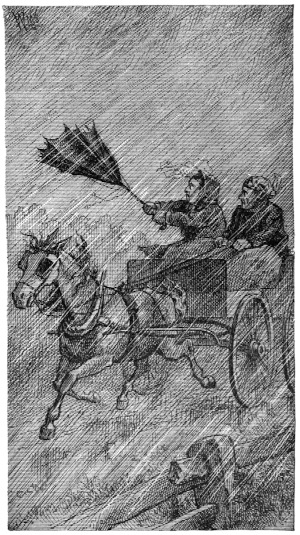
DRESSED FOR THE OCCASION.
DRESSED FOR THE OCCASION.
“I am on my guard, and they can’t come back on
me for damages. They have only got themselves to
blame if they are ondone. They might have realized
275that they couldn’t all have got me. And I have jest
about made up my mind that I will run the resk and
marry her. She is to Log London, you say. It happens
jest right,” says he, a brightenin’ up.
“There is a funeral down that way, to-morrow, not
more than thirteen or fourteen miles from there, and I
will go round that way on my way back, and call and
see her.”
I declare his talk sickened me so that I was fairly
sick to my stomach. It was worse than thoroughwort
or lobelia, and so I told Josiah afterwards. But I
didn’t say a word back to him, for I knew I might jest
as well try to convince the wind right in a whirlwind
that it hadn’t better blow, as to convince him that he
was a fool.
But, as he got up to go, I told him that I had a little
mite of business of my own with him. You see our
new minister, Elder Bamber, is a likely feller as ever
drawed the breath of life, and hard-workin’—couldn’t
get a cent of his pay from the meetin’-house. They
had got into a kind of a quarrel, the men had, and
wouldn’t pay what they had signed. And I proposed
to the women, the female sisters, that we should try to
get him up a present of 50 dollars to last ’em through
the storm—the meetin’-house storm. For they was
fairly sufferin’ for provisions, and clothes, and stuff.
And as Kellup was a member of the same meetin’-house,
and talked and sung powerful in conference
meetin’s, I thought it wouldn’t be no more than right
276for me to tackle him, and get him to pay a little sunthin’
towards it. So I tackled him.
“Wall, Sister Allen,” says he, in that hypocritical,
sneakin’ way of hisen (he was always powerful at
repeatin’ Scriptural texts), “I can say with Peter,
‘Silver and gold have I none, but such as I have I will
give unto thee.’”
“Wall, what is it?” says I. “What are you goin’
to give?”
Says he, “I will work for the cause. If religion is
worth anything,” says he, a rollin’ up the whites of
his eyes, “it is worth workin’ for—it is worth makin’
sacrifices for.”
“So I think,” says I, in a very dry tone. “And I
want a half a dollar out of you.”
“No!” says he, kinder puttin’ his hand over his
pocket, as if he was afraid a cent would drop out of it.
“No! I will do better than that. To-night is our conference
meetin’, and I will talk powerful on the subject.”
Says I, coldly: “Wind is a powerful element, but it
hain’t a goin’ to blow comfort into the Elder’s household,
nor meat and flour into his empty buttery-shelves, nor
fire-wood into his wood-box. Song and oritery are good
in their place, but they hain’t goin’ to feed the starvin’
or clothe the naked.” Says I, in more reasonable
tones: “As I said, wind is good in its place—I hain’t
a word to say aginst it—but jest at the present time
money is goin’ to do the Elder more good than the
277same amount of wind can.” And says I, in the same
firm but mild tone: “I want a half a dollar out of
you.” Says I: “The Elder is fairly sufferin’ for
things to eat and drink and wear. And you know,”
says I, “that if ever there was a good, earnest, Christian
man, it is Elder Bamber. He is a Christian from
the top of his head to the sole of his boots. He don’t
wear his religion on the top of his head for a hat, and
take it off Sunday nights. It goes clear through him,
and works out from the inside.”
“Yes,” says Kellup, a clutchin’ his pocket with a
firmer grip, “he is a worthy man, and I should think
the thought of his noble and lofty mission would be
meat and drink to him. It probable is. It would be
to me—and clothin’. Oh!” says he, a rollin’ up his
eyes still further in his head, “oh! the thought of
savin’ souls; what a comfort that must be to the Elder;
what a rich food for him.”
Says I, in colder tones than I had used yet, for I
was fairly wore out with him: “The Elder can’t eat
souls, and if he could he would starve to death on such
souls as your’n, if he eat one every five minutes.”
He didn’t say nothin’ more, but onhitched his hearse
and started off. I don’t know but he was mad, and
don’t care. But though I didn’t get a cent from him
or his father, I raised 50 dollars with my own hands
and the might of my shoulder-blades, and sent it to him
in a letter marked, “From friends of religion and the
Elder.”
278Wall, jest as Josiah driv up with the old mare, a
hull load of company driv up from the other way—come
to spend the day. I was disappinted, but I
didn’t murmur. I took ’em as a dispensation, killed a
fat duck, and made considerable of a fuss; done well
by ’em. They come from a distance, and had to start
for home the sun 2 hours high. And I told Josiah it
was so pleasant I guessed we would go to Jonesville
then, and he (havin’ that babe on his mind) consented
to at once and immediately. So we sot off. About
half a mile this side of Jonesville we met Thomas J.
and Maggie jest a settin’ off for a ride. We stopped our
2 teams and visited a spell back and forth. I wouldn’t
let ’em go back home, as they both offered and insisted
on, but made an appintment to take dinner
with ’em the next day, Providence and the weather
permittin’. And then we drove on to Whitfield’s.
And I don’t never want to see a prettier sight than I
see as we driv up.
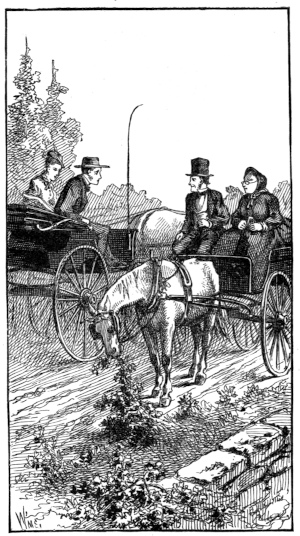
There Tirzah Ann sot out on the portico, all dressed
up in a cool mull dress. It was one I had bought her
before she was married, but it was washed and done
up clean and fresh, and looked as good as new. It
was pure white, with little bunches of blue forget-me-nots
on it, and she had a bunch of the same posys and
some pink rose-buds in her hair, and on the bosom of
her frock. There is a hull bed of ’em in the yard.
She is a master hand for dressin’ up and lookin’ pretty,
but at the same time is very equinomical, and a first-rate
281housekeeper. She looked the very picture of
health and enjoyment—plump and rosy, and happy as
a queen; and she was a
queen. Queen of her husband’s
heart; and settin’
up on that pure and lofty
throne of constant and deathless love, she looked first-rate,
and felt so.
It had been a very warm day, nearly hot, and Whitfield
I s’pose had come home kinder tired. So he had
stretched himself out at full length on the grass in
front of the portico, and there he lay with his hands
282under his head, a laughin’, and a lookin’ up into Tirzah
Ann’s face as radiant and lovin’ as if she was the
sun and he a sun-flower. But that simely, though
very poetical and figurative, don’t half express the
good looks, and health, and rest, and happiness on both
their faces, as they
looked at each
other, and then at
that babe.
That most beautifulest
and intelligentest
of childern
was a toddlin’
round, first
up to one of ’em
and then the other,
with her bright
eyes a dancin’, and
her cheeks red as
roses. You see
their yard is so
large and shady,
and the little thing
havin’ got so it can run round alone, is out in the yard
a playin’ most all the time, and it is dretful good for her.
And she enjoys it the best that ever was, and Tirzah Ann
enjoys it, too, for after she gets her work done up, all she
has to do is to set in the door and watch the little
thing a playin’ round, and bein’ perfectly happy. The
283minute she ketched sight of the old mare and me and
her grandpa, she run down to the gate as fast as her
little feet could carry her. She had a little pink dress
on, and pink stockin’s, and white shoes, and a white
ruffled apron, with her pretty, shining hair a hangin’
down in curls over it, and she did, jest as sure as I
live and breathe—she did look almost too beautiful
for earth. I guess she got a pretty good kissin’ from
Josiah and me, and then Whitfield and Tirzah Ann
come a hurryin’ down to the gate, glad enough to see
us, as they always be.
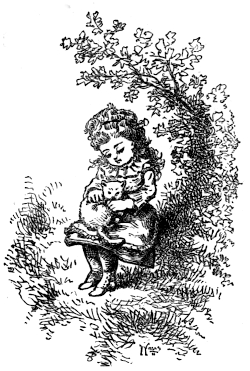
Josiah, of course, had to take that beautiful child
for a little ride, and Whitfield said he guessed he
would go, too. But I got out and went in, and as we
sot there on the stoop, Tirzah Ann up and told me
what she and Whitfield was a goin’ to do. They was
goin’ off for the summer for a rest and change. And
I thought from the first minute she spoke of it that it
was foolish in her. Now rests are as likely things as
ever was; so are changes.
But I have said, and I say still, that I had ruther lay
down to home, as the poet says, “on my own delightful
feather-bed,” with a fan and a newspaper, and take
a rest, than dress up and travel off 2 or 300 milds
through the burnin’ sun, with achin’ body, wet with
presperation and sweat, to take it. It seems to me
that I would get more rest out of the former than out
of the more latter course and proceedin’. Howsumever,
everybody to their own mind.
284Likewise with changes: I have said, and I say still,
that changes are likely and respectable, if you can get
holt of ’em; but how can you?
Havin’ such powerful and eloquent emotions as I
have, havin’ such hefty principles a performin’ inside
of my mind, enjoyin’ such idees, and faiths, and aspirations,
and longin’s, and hopes, and despairs, and everything—I
s’pose that is what makes me think that what
is goin’ on round me, the outside of me, hain’t of so
much consequence. I seem to live inside of myself
(as it were) more than I do on the outside. And so it
don’t seem of so much consequence what the lay of
the land round me may happen to be, whether it is
sort o’ hilly and mountainous or more level-like; or
whether steam-cars may be a goin’ by me (on the outside
of me), or boats a sailin’ round me, or milk-wagons.
You see the real change, the real rest, would have
to be on the inside, and not on the outside. Nobody,
no matter how much their weight may be by the steel-yards,
can carry round such grand, hefty principles as
I carry round without gettin’ tired; or enjoy the lofty
hopes, and desires, and aspirations that I enjoy, and
meditate on all the sad, and mysterious, and puzzlin’
conundrums of the old world as I meditate on ’em,
without gettin’ fairly tuckered out.
Great hearts enjoy greatly and suffer greatly. And
so sometimes, when heart-tired and brain-weary, if I
could quell down them soarin’ emotions and make ’em
285lay still for a spell, and shet up my heart like a buro-draw,
and hang up the key, and onscrew my head and
lay it onto the manteltry-piece, then I could go off and
enjoy a change that would be refreshin’ and truly
delightful. But as it is, from Jonesville clear to the
Antipithies, the puzzlin’ perplexities, the woes, and the
cares of the old world foller right on after us tight as
our shadders. Our pure and soarin’ desires, our blind
mistakes, and deep despairs; our longin’s, strivin’s,
memories, heartaches; all the joys and burdens of a
soul, has to be carried by us up the steepest mountains
or down into the lowest vallies. The same emotions
that was a performin’ inside of our minds down in the
Yo Semity, will be a performin’ jest the same up on
the Pyramids.
The same questionin’ eyes, sort o’ glad and sort o’
sorrowful, that looked out over New York Harbor will
look out over the Bay of Naples—and then beyond
’em both, out into a deeper, more mysterious ocean,
the boundless sea that lays beyond everything, and
before everything, and round everything, that great,
misty sea of the Unknown, the Hereafter; tryin’ to see
what we hain’t never seen, and wonderin’ when we
shall see it, and how? and where? and wherefore?
and if things be so? and why?
Tryin’ to hear the murmur of them waves that we
know are a washin’ up round us on every side, that
nobody hain’t never heard, but we know are there; the
mighty Past, the mysterious Future. Tryin’ to ketch
286a glimpse of them shadowy sails that are floatin’ in
and out forever more, with a freight of immortal souls,
bearin’ them here, and away. We know we have
sailed on ’em once, and have got to again—and can’t
ketch no glimpse on ’em—can’t know nothin’ about
’em—sealed baby lips, silent, dead lips, never tellin’
nothin’ about ’em. Each
soul has got to embark
and sail out alone, out
into the silence and the
shadows—sail out into the
mysterious Beyond.
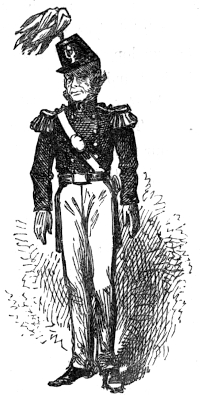
We can’t get away from
ourselves, and get a real
change, nohow, unless we
knock our heads in and
make idiots and lunys of
ourselves. Movin’ our
bodies round here and
there is only a shadow of
a change, a mockery, as
if I should dress up my
Josiah in soldier coats or
baby clothes. There he
is inside of ’em, clear Josiah, no change in him, only a
little difference in his outside circumstances.
Standin’ as we do on a narrow belt of land, which is
the Present, and them endless seas a beatin’ round us
on every side of us, bottomless, shoreless, ageless—and
287we a not seein’ either on ’em; under them awful, and
lofty, and curious circumstances, what difference does
it really make to us whether we are a layin’ down or a
standin’ up—whether we are on a hill, or down in a
valley—whether a lot on us get together in cities and
villages, like aunts on a aunt-hill; or whether we are
more alone, like storks or ostridges?
This is a very deep and curious subject. I have
talked eloquent on it, I know, and my readers know.
But I could go on and filosifize on it jest as powerful
and deep for hours and hours. But I have already
episoded too far, and to resoom and continue on. I
told Tirzah Ann that I thought it was foolish in her.
And she said, “It was very genteel to go away from
home for the summer.” She said, “Miss Skidmore
was goin’.” She is the other lawyer’s wife to Jonesville,
and Tirzah Ann said she was bound to not come
in behind her. She said, “Miss Skidmore said that
nobody who made any pretensions to bein’ genteel
stayed to home durin’ the heated term.”
“What do they go away for, mostly?” says I, in a
cool tone, for I didn’t over and above like the plan.
“Oh! for health and—”
“But,” says I, “hain’t you and Whitfield enjoyin’
good health?”
“Never could be better health than we both have
got,” says she; “but folks go for health and pleasure.”
288“Hain’t you a takin’ comfort now,” says I, “solid
comfort?”
“Yes,” says she, “nobody can be happier than
Whitfield and I are every day of our lives.”
“Wall,” says I coolly, “then you had better let well
enough alone.”
“But,” says she, “folks go for a rest.”
“Rest from what?” says I. “It seems to me that
I never in my hull life see nobody look more rested
than you and Whitfield do.” Says I, askin’ her right
out plain, “Don’t you feel rested, Tirzah Ann?”
“Why yes,” she said, “she did.”
“Wall,” says I, “I knew you did from your looks.
Don’t you and Whitfield feel fresh and vigorous and
rested every mornin’, ready to take up the labor of the
day with a willin’ heart? Do you either of you have
any more work to do than is for your health to do?
Don’t you find plenty of time for rest and recreation
every day as you go along?” Says I: “It is with
health jest as it is with cleanin’ house. I don’t believe
in lettin’ things get all run down, and nasty, and then
once a year tear everything to pieces, and do up the
hull cleanin’ of a year to once, and then let everything
go again for another year. No! I believe in keepin’
everything slick and comfortable day by day, and year
by year. In housens, have a daily mixture of cleanin’
and comfort. In health, have a daily mixture of labor,
recreation, and rest. I mean for folks like you and
Whitfield, who can do so. Of course some have to
291work beyond their strength, and stiddy; let them take
their rest and comfort when they can get it; better
take it once a year, like a box of pills, than not at all.
But as for you and Whitfield, I say again, in the
almost immortal words of the poet, ‘better let well
enough alone.’”
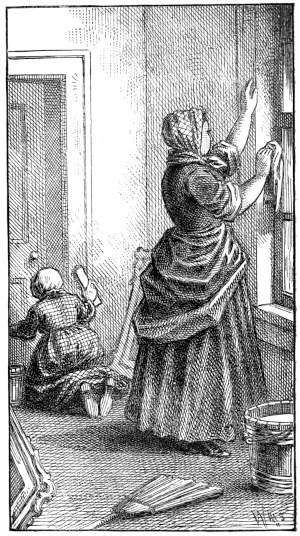
“But,” says she, “I want to do as other folks do.
I am bound not to let Miss Skidmore get the upper
hands of me. I want to be genteel.”
“Wall,” says I, “if you are determined to foller
them paths, Tirzah Ann, you mustn’t come to your
ma for advice. She knows nothin’ about them pathways;
she never walked in ’em.”
I could see jest where it was. I could see that Miss
Skidmore was to the bottom of it all—she and Tirzah
Ann’s ambition. I could lay the hull on it to them 2.
The Skidmores hadn’t lived to Jonesville but a little
while, and Miss Skidmore was awful big-feelin’ and
was determined to lead the fashion. She wouldn’t
associate with hardly anybody; wouldn’t speak to only
jest a few. And when she wuz to parties, or anywhere,
she would set kind o’ stunny and motionless—some
as if her head was stiff and she couldn’t bend it.
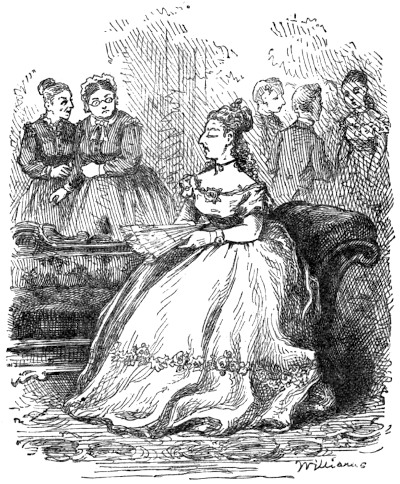
Why, I s’posed the first time I see her appear—it
was to quite a big party to Elder Bamber’ses—why,
I s’posed jest as much as if I had it on myself, that
she had a stiff neck; s’posed she had took cold, and it
had settled there. I never mistrusted it was tryin’ to
act genteel that ailed her. I see when I was introduced
292to her that she acted sort o’ curious and stunny,
and I stood by and watched her (sunthin’ as I would
a small circus), and I see that she acted in jest that
way to most everybody that was introduced to her.
And I knew, judgin’ her by myself, that she would
want to move her head more and act more limber if
she could, so I up and told her in a friendly way, that
if I was in her place I would steep up some camfrey
293roots, and take ’em three times a day; and at night I
would take some burdock leaves, and wilt ’em, and
bind ’em on her neck. Says I:
“Burdock will take that stiffness out of your neck if
anything will.”
But Sister Bamber winked me out, and told me what
ailed her; told me she kep’ her head up in that sort of a
stiff way, and sot in them stunny, motionless autitudes
and postures, in order to be genteel and aristocratic.
And I felt like a fool to think I had been a recommendin’
burdock for it. For I knew in a minute that
when anybody held their neck craned up in that way
in order to act genteel and aristocratic—good land! I
knew burdock couldn’t help ’em any. I knew it was
common sense they wanted, and a true dignity, and the
sweet courtesy of gentle breeding,—burdock couldn’t
help ’em. Why, some said she felt above old Skidmore
himself, and thought she was kinder stoopin’ to
associate with him, and talk with him. I don’t know
how true that was, but I know she tried to be dretful
genteel, and put on sights of airs. And Tirzah Ann
bein’ ambitious, and knowin’ she looked a good deal
better than she did, and knew as much agin’, and
knowin’ that Whitfield was as good agin a lawyer as
her husband was, and 3 times as well off, wasn’t goin’
to stand none of her airs. She did seem to sort o’
look down on Tirzah Ann, and feel above her, and it
madded Tirzah Ann awfully, for she never felt as I
did on that subject.
294Now if anybody wanted to put on airs, and feel
above me, I shouldn’t do a thing to break it up—not
a thing. I should filosofize on it in this way: because
they felt as if they was better than I was, that wouldn’t
make ’em so; if it would, why I should probable get
up more interest on the subject. But it wouldn’t. It
wouldn’t make ’em a mite better, nor me a mite worse,
so what hurt would it do, anyway? It wouldn’t hender
me from feelin’ as cool and contented and happy
as a cluster cowcumber at sunrise, and it would probable
make them feel sort o’ comfortable and good, so I
should be glad they felt.
But not bein’ jealous dispositioned by nater, and
and havin’ so many other things to think of—soarin’
and divin’ so high and deep into curious and solemn
subjects as I have soared and doven, I s’pose folks
might feel milds and milds above me, and I not mistrust
what they was a doin’; never find it out in the
world unless I was told of it.
Now when Tirzah Ann was about 14 or 15, she that
was Keturah Allen, a haughty, high-headed sort of a
woman, come to our house a visitin’; stayed most all
winter. She was a woman who had seen better days;
had been quite fore-handed; and she kep’ her fore-handed
ways when her four hands (as you may say in
a figirative way) was gone and used up. She was real
poor now, hadn’t nothin’ to live on hardly, and I told
Josiah that we would invite her to stay quite a spell,
295thinkin’ it would be a help to her. She was a distant
cousin of Josiah; probable as fur off as 7th or 8th.
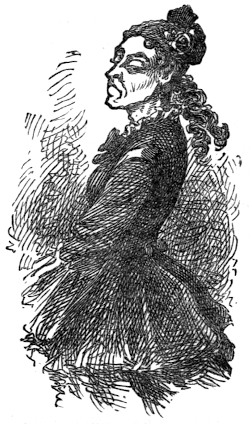
She had a very disagreeable, high-headed, patronizin’
way with her; very proud and domineerin’ and
haughty in her demeanier. But I never had it pass
my mind that she was a feelin’ above Josiah and me.
But I s’pose she wuz. I s’pose, from what I found out
afterwards, that she did feel above us, right there in
our own house, for as much as 11 weeks, and I never
mistrusted what was goin’ on. And I don’t s’pose I
should have found it out to this day if Tirzah Ann
hadn’t see it, and up and told me of it.
296I see she was awful disagreeable, dretful hard on
the nerves and the temper. But I took her as a
dispensation, and done, if anything, better by her
than I would if she had been more agreeabler. I felt
a feelin’ of pity and kindness towards her, a kind of a
Biblical feelin’ that should be felt towards the froward—my
principles was a performing round her in a
martyr way, and a performin’ first rate.
When Tirzah Ann come here (she had been off on a
visit), and before she had been home a day, she found
out what she was up to. She always had a sort of a
jealous, mistrustin’ turn, Tirzah Ann had. And says
she that night, as we was a washin’ the dishes to the
sink, I a washin’ and she a wipin’:
“Cousin Keturah feels above you, mother.”
“Why, how you talk,” says I. “I never mistrusted
what she was a doin’.”
And she had kept watch of little things that I
hadn’t noticed or thought of, and says she:
“She did that, mother, because she felt above you.”
“Why, is that so?” says I. “I thought she done
it because she thought so much of me.”
And I kep’ on, serene and calm, a washin’ my tea-plates.
And Tirzah Ann looked keen at me, and says
she:
“Don’t you believe I am tellin’ you the truth,
mother? Don’t you believe she does feel above us?”
“Oh, yes,” says I, “I persume you are in the right
297on’t, though I never should have mistrusted such a
thing in the world.”
“Wall, what makes you look so serene and happy
over it?”
“Why, I am thinkin’, Tirzah Ann, whether she gets
enough comfort out of it to pay her for her trouble. I
hope she does, poor thing, for she hain’t got much else
to make her happy.”
“You do beat all, mother,” says Tirzah Ann; “you
don’t seem to care a mite whether anybody puts on
airs and feels above you or not.”
And says I, “That is jest how it is, Tirzah Ann; I
don’t.”
“Wall, it makes me mad!” says she, a rubbin’ the
teapot hard.
Says I, “What earthly hurt does it do to us, Tirzah
Ann? Can you tell?”
“Why, no!” She couldn’t really tell what particular
hurt it done, and she rubbed the teapot a little
slower and more reasonable.
“Wall,” says I, coolly, “then let her feel. It probable
does her some good, or else she wouldn’t tackle
the job.”
And jest as I had argued with Tirzah Ann about she
that was Keturah Allen, jest so I had argued, and did
argue about Miss Skidmore. But I couldn’t convince
her—she stuck to it.
“It does look so poor, mother, so fairly sickish, to
see anybody that hain’t got nothin’ under the sun to
298make ’em feel proud, put on such airs, and try to
be so exclusive and haughty.”
And says I, “Such folks have to, Tirzah Ann.”
Says I, “You’ll find, as a general thing, that they are
the very ones who do it. They are the very ones who
put on the most airs, and they do it because they have
to. Why,” says I, “divin’ so deep into filosify as I
have doven, it is jest as plain to me as anything can
be, that if anybody has got uncommon goodness, or
intellect, or beauty, or wealth, and an assured position,
they don’t have to put on the haughtiness and airs
that them do that hain’t got nothin’. They don’t have
to; they have got sunthin’ to hold ’em up, they can
stand without airs.”
I had talked it all over with Tirzah Ann lots of
times, but it hadn’t done her a mite of good, as I
could see, for I hadn’t got through reveryin’ on the
subject, nor begun to, when she up and says agin:
“Miss Skidmore says that all the high aristocracy
of Jonesville, if they are aristokrits,” says Tirzah
Ann—“that is the way she pronounces it, they say she
can’t read hardly,—if they are aristokrits, and not imposters,
they will go away during the summer for a
change. And I say, if a change is necessary for her
and old Skidmore, why Whitfield and I have got to
have a change, if we die in the attempt.”
“A change!” says I, in low axents, a lookin’ round
the charmin’, lovely prospect;—the clean, bright cottage,
with its open doors and windows, and white ruffled
301curtains wavin’ on the cool breeze; the green
velvet grass, the bright flower beds, the climbing,
blossoming vines, the birds singin’ in the shady
branches overhead, and in the orchard; the blue lake
lyin’ so calm and peaceful in the distance, shining
over the green hills and forests; and the wide, cloudless
sky bending over all like a benediction.
“A change!” says I, in low, tremblin’ tones of emotion.
“Eve wanted a change in Paradise, and she got
it, too.”
“But,” says Tirzah Ann, for my tone impressed her
fearfully, “don’t you believe in a change for the summer?
Don’t you think they are healthy?”
I thought I wouldn’t go into the heights and depths
of felosophy in which I had flew and doven—she had
heard me time and agin, and eloquence is very tuckerin’
especially after you have been doin’ a hard day’s
work—so I merely said:
“When anybody is bakin’ up alive in crowded
cities; when the hot sun is shinin’ back on him from
brick walls and stony roads; when all the air that
comes to them comes hot and suffocatin’, like a simon
blowin’ over a desert; to such, a change of body is
sweet, and is truly healthy. But,” says I, lookin’
round again on the cool and entrancin’ beauty and
freshness of the land and other scape, “to you whom
Providence has placed in a Eden of beauty and bloom,
to you I again repeat for the 3d time that line of
302eloquent and beautiful poetry,—‘Better let well enough
alone.’”
I could see by the looks of her face that I hadn’t
convinced her. But at that very minute Josiah came
back, and hollered to me that “he guessed we had better
be goin’ back, for he was afraid the hens would
get out, and get into the turnips.”
He had jest set out a new bed, and the hens was
bewitched to eat the tops off. He had shut ’em up,
but felt it was resky to not watch ’em. So we started
off. But not before I had told Whitfield my mind
about the plan. He looked more convinced than
Tirzah Ann did, a good deal more. But I no need to
have builded up any hopes on that, onto his mean,
for I might have known that when a man loves a
woman devotedly, and they haint been married—wall,
anywheres from 1 to 4 or 5 years, her influence over
him is powerful, and never can be told. She moulds
him to her will as easy as clay is moulded in the hands
of Mr. Potter. Sometimes she moulds honer into
him, and then again dishoner; sometimes she moulds
him comfortable, and then again she moulds him hard,
and powerful oncomfortable. These things are curious,
but useful and entertainin’ to study on, and very deep.
303

TIRZAH ANN TO A WATERIN’ PLACE.
Wall, if you’ll believe it, after all my eloquent
talk, and reasonin’, and everything, the very
next week they set off on their journey after a change,
on that exertion after rest and pleasure. They come to
see us the day before they went, but their plans was all
laid, and tickets bought, (they was goin’ to the same
place and the same hotel and tavern Skidmore’s folks
was), so I didn’t say nothin more—what was the use?
Thinkses I, bought wit is the best if you don’t pay too
much for it; they’ll find out for themselves whether I
was in the right on’t or not.
But bad as I thought it was goin’ to be, little did I
think it was goin’ to be so bad as it wuz. Little did I
think that Tirzah Ann would be brought home on a
bed. But she was. And Whitfield walked with two
canes, and had his right arm in a sling. But as I told
Josiah, when anybody chased up pleasure so uncommon
tight, it wasn’t no wonder they got lamed by it.
For pleasure is one of the curiousest things in the
304world to ketch,—speakin’ in a coltish and parable way.
Almost impossible to ketch by chasin’ her. And if
anybody don’t believe me, let ’em get up some mornin’
before sunrise, and take a halter, and start off a purpose,
and see if they can overtake her;—see if they
can ketch her, and put a bit and martingill onto her.
See if they don’t find she is skittish and balky, and
shies off when they go to put the bits in her mouth.
And see, when they think they have got the upper
hands of her, whether she don’t throw ’em head over
heels, and caper off agin in front of ’em.
I have spoke in a parable way, and would not wish
to be understood a thinkin’ pleasure is a horse. Far
from it. But this is a very deep subject, and would
be apt to carry any one beyond their depth if not simplified
and brought down to human comprehension.
The first time I went to see ’em after they got back,
Tirzah Ann told me all about it. She could set up
some then. But if it wasn’t a pitiful sight to see
them three—Whitfield, Tirzah Ann, and the babe.
To see how their means looked now, and then to look
back and think how they had looked the last time I
had seen ’em in that very place. Why, as I looked at
’em, and see how feeble, and mauger, and used up
they all looked, there wasn’t hardly a dry eye in my
head. Tirzah Ann told me it was a lesson that would
last her through her hull life. Why, she said right
out plain, that if she should live to be 3 or 400 years
307old, she shouldn’t never forget it, and I don’t believe
myself that she would.
There they was, she and Whitfield, poor as 2 snails.
I never see either of ’em in half so poor order
before. They hadn’t no ambition nor strength to
work. Their morals had all got run down. Their
best clothes was all wore out. And that babe! I
could have cried, and wept, to see how that pretty little
thing was lookin’. Poor as a feeble young snail, and
pale as a little white cotton piller-case. Her appetite
was all gone, too. She had always been used to sweet,
fresh milk—the milk from her own heifer, white as
snow, with a brindle back, that her grandpa give
her for the name of Samantha. It gives dretful sweet,
rich milk. And the babe almost lived on it. And all
the milk they could get for her there was sale milk,
sour half the time, and at the best full of adultery, so
Whitfield said. And I don’t think anything that happened
to them on their hull tower made Josiah and
me so mad as that did. To think of that sweet little
babe’s sufferin’ from adulted and sour milk. It made
us so awful indignant that we can’t hardly speak
peacible now, a talkin’ about it.
And then they was all cooped up together in a little
mite of a room, and she was used to bein’ out-doors
half the time, and had a great, cool, airy room to sleep
in nights; and bein’ shet up so much, in such close,
bad air, it all wore on her, and almost used her up.
Oh! how pale she was, and mauger, and cross! Oh!
308how fearfully cross! She would almost take our
heads off, Josiah’s and mine, (as it were,) every time
we would speak to her. It was dretful affectin’ to me
to see her so snappish; it reminded me so of her
grandpa in his most fractious hours, and I told him it
did. Josiah felt bad to see her so; it cut him down
jest as bad as it did me.
And then to see Whitfield’s and Tirzah Ann’s
demeaniers and means! Why jest as sure as I live
and breathe they didn’t seem no more like their old
means and demeaniers than if they belonged to perfect
strangers, and I told Tirzah Ann so.
And she bust right out a-cryin’, and says she,
“Mother, one week’s more rest would have tuckered
me completely out. I could not have stood it, I
should have died off.”
I wiped my own eyes, I was so affected, and says I,
in choked-up axents, “You know I told you how it
would be, I told you that you was happy enough to
home, and you hadn’t better go off in search of
pleasure.”
Says she, bustin’ right out agin, “One week more of
pleasure and recreation would have been my death-blow.”
Says I, “I believe it. But,” says I, knowin’ it was
my duty to be calm, “It is all over now, Tirzah Ann.
You hain’t got to go through the pleasure agin. You
hain’t got to rest any more. You must try to overcome
your feelin’s. Tell your ma all about it,” says I,
309thinkin’ it would mebby do her good, and get her mind
offen it quicker.
So she up and told me the hull story. And I see
plain that Miss Skidmore was to the bottom of it all.
She and Tirzah Ann’s determination to not let her get
ahead of her, and be more genteel than she was.
Tirzah Ann said she was jest about sick when they
started, for she found out most the last minute that
Miss Skidmore had one dress more than she had, and
a polenay, and so she sent at once for materials and
ingregients, and sot up day and night and worked till
310she had got hers made, full as good and a little ahead
of Miss Skidmore’s.
Wall, they started the same day, and went to the
same place, a fashionable summer resort, and put up
to the same tavern, a genteel summer tavern, to rest
and recreate. And Miss Skidmore bein’ a great, healthy,
strong, raw-boned woman, could stand as much
agin rest and recreation as Tirzah Ann could.
Why, Tirzah Ann said the rest was enough to wear
out a leather woman, and how she ever stood it for
two weeks was more than she could tell.
You see she wasn’t used to hard work. I had
always favored her, and gone ahead with the work
myself, when she lived to home; and Whitfield had
been as careful of her as he could be, and jest as good
as a woman to help her, and so the rest come tough
on her; it was dretful hard on her. But as hard as
the rest was for her, I s’pose the recreation was as
bad agin; I s’pose it was twice as tough on her.
You see she had to dress up 3 or 4 times a day, and
keep the babe dressed up slick. And she had to
prominade down to the waterin’ place and drink at
jest such a time. And go a-ridin’ out on the water in
boats and yots; and had to play crokay, and be up till
midnight every night to parties. You see she had to
do all this, ruther than let Miss Skidmore get on ahead
of her, and do more than she did, be more genteel
than she was, and rest more.
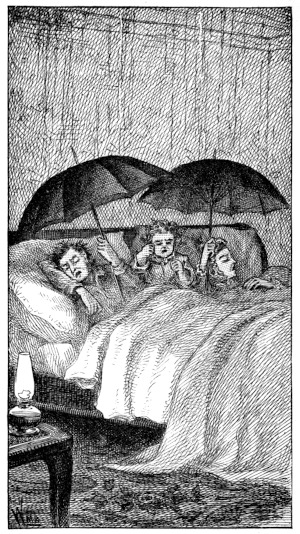
MIDNIGHT AT A WATERING PLACE.
Their room was a little mite of a room up four
313flights of stairs, and Tirzah Ann never could climb
stairs worth a cent; and it leaked awful—the rain
come down round the chimbley. But they had to
take that room or none, the house bein’ so full and
runnin’ over. And Whitfield thinkin’ they could rest
better in it than they could on the fence or door-step,
took it. But if there happened to come up a storm in
the night, a thunder-storm or anything, they would
have to histe their umberells and lay under ’em.
They must have looked as curious as 2 dogs, and I
told ’em so.
The room bein’ so high up, it wore on Tirzah Ann—she
never could climb stairs worth a cent. And
then it was so small, the air was close, nearly tight,
and hot as a oven. And the babe bein’ used to large,
cool rooms, full of fresh, pure air, couldn’t stand the
hotness and the tightness, and it begun to enjoy poor
health, and it cried most all the time. And to home
it could play round out in the yard all day a’most,
and here it hung right onto its ma. And before long
she begun to enjoy poor health.
And then the room on one side of ’em was occupied
by a young man who was learnin’ to play on the flute.
He had been disappointed in love, and he would try to
make up tunes as he went along, sort o’ tragedy style,
and dirge-like. The most unearthly, and woe-begone,
and soul-harrowin’ sounds, they say that they ever
heard or read of. They say it was enough to make
any one’s blood run cold in their vains to hear ’em.
314He kept his room most of the time, and played day
and night. He had ruther be alone day times, and
think of that girl, and lament over her, and play about
her, than go into company; and nights he couldn’t
sleep, owin’ to his trouble, so he would set up and
play. They was sorry for him, they said they was.
They said they knew he must have been in a awful
state, and his sufferin’s intense, or he couldn’t harrow
up anybody’s feelin’s so. But that didn’t make it
none the easier for them.
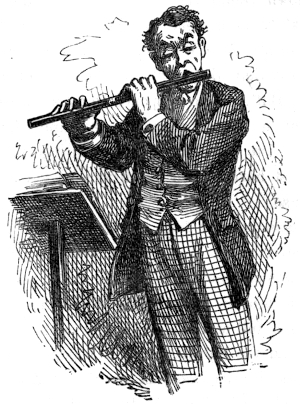
Tirzah Ann and Whitfield are both tender-hearted
315and sympathetic by nature; if they hadn’t been, it
wouldn’t have been so hard on ’em. But they both
say that tongue never can express the sufferin’s they
underwent from that flute, and from the feelin’s they
felt for that young man. They expected every day to
hear that he had made way with himself, his sufferin’s
seemed so great. Such agonizin’ wails of woe he
would blow into that flute! and he would groan and
writhe so when he wasn’t a playin’.
Twice Whitfield went to bed with his clothes on, he
was so certain the young feller couldn’t stand it till
mornin’, and would need help.
The room on the other side of ’em was occupied by
a young woman who owned a melodeon. She went
into company a good deal, and her spells to play
would come on nights, after she got home from parties.
She had a good many bo’s, and was happy dispositioned
naturally, and they said some nights it
seemed as if there wouldn’t be no end hardly to her
playin’, quick pieces, waltzes, and pokeys bein’ her
theme—and love songs, which she would sing very
sentimental and impressive, and put in sights of quavers
and shakes—they said it did seem as if they never
see so many quavers and trills as she trilled and
quavered.
Tirzah Ann and Whitfield both said that they knew
what it was to be young, they had been young themselves,
not much more’n two years ago, and they knew
by experience what it was to be lovesick, and they
316wanted to sympathize with happiness and gayity of
heart, and they didn’t want to do nothin’ to break up
her highlarity of spirits. But still it come dretful
tough on ’em. I s’pose the sufferin’s couldn’t never
be told nor sung that they underwent from them 2
musicianers.
And the babe not bein’ used to such a racket nights
would get skairt, and almost go into historical fits.
And two or three nights Tirzah Ann had ’em, too—the
historicks. I don’t see what kep’ Whitfield up;
317he says no money would tempt him to go through with
it agin. I s’pose Tirzah Ann almost tore him to
pieces. But she wasn’t to blame; she didn’t know
what she was a doin’.
It hain’t no use to blame Tirzah Ann now, after it
is all over with. And she sees it plain enough now;
she is sufferin’ enough from the effects of it—her
tryin’ to keep up with Miss Skidmore, and rest as
much as she did, and recreate as fur, and do all that
she done. And that is where her morals got all run
down, and Whitfield’s, too.
To think of them two—she that was Tirzah Ann
Allen, and Whitfield Minkley—to think of them two,
brought up as they had been, havin’ such parents and
step-parents as they had, settin’ under such a preacher
as they had always set under—to think of them two a
dancin’! and a flirtin’!
Why, if anybody had told me, if it had come through
two or three, I would have despised the idee of believin’
of it. But it didn’t come through anybody;
she owned it up to me herself. I couldn’t hardly believe
my ear when she told me, but I had to.
They had parties there every evenin’ in the parlors
of the tavern, and Miss Skidmore went to ’em all, and
danced, and so they went, and they danced. I didn’t
say nothin’ to hurt her feelin’s, her mean looked so
dretful, and I see she was a gettin’ her pay for her
sinfulness, but I groaned loud and frequent while she
was a tellin’ me of this (entirely unbeknown to me).
318
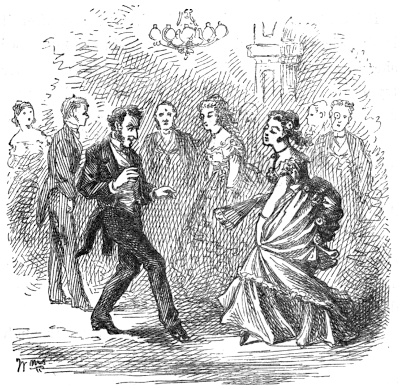
Here was where Whitfield got so lame. He never
had danced a step before in his life—nor Tirzah Ann,
neither. But Skidmore and his wife danced every
night till after midnight, and Tirzah Ann was so
ambitious she was determined that she and Whitfield
should recreate and dance as much as they did, if
they fell dead a doin’ of it. And not bein’ used
to it, it almost killed ’em. Besides loosenin’ their
morals so that it will be weeks and weeks before they
get as strong and firm as they was before. When
321morals get to tottlin’ and wobblin’ round, it is almost
impossible to get ’em as firm as they was before.
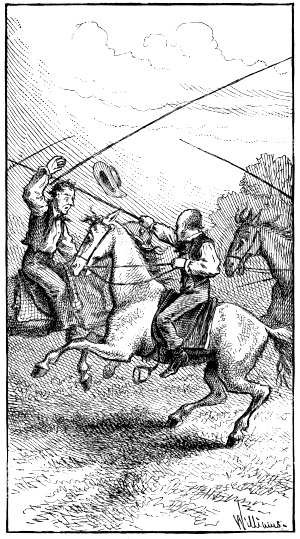
HOW JOSIAH WOULD PLAY POLO.
But truly they got their pay. Whitfield not bein’
used to it, and bein’ so tuckered out with the recreation
and rest he had been a havin’, it lamed him dretfully,
rheumatiz sot in, and his sufferin’s was intense.
And then a base-ball hit him—or anyway he got hurt
awfully when he was a playin’ some game, base-ball,
or billiards, or polo. That is a game, polo is, that I
never heard on in my life before, and Josiah was
awful interested in it when I told him about it. And
he said he should deerly love to learn to play it. That
man acts frisky now, a good deal of the time, and is a
great case to foller up new idees.
But I told him it would be dretful foolish for him
to try to learn it, for the old mare had enough to do
now, without that. It is played on horseback, and
from the name I s’pose they try to hit each other with
poles, or hit the horses, or sunthin’. I don’t really
understand it well enough to give directions about
playin’ it straight and correct.
But Josiah was all carried away with the idee, and
stuck to it he should love to play it, love to like a dog.
Says he: “How I should enjoy to take a game with
old Bobbet. Why,” says he, “let me get onto the old
mare, and give me a good, strong hop-pole, and I
believe I could fetch the old man down the first blow.”
But I discourage the idee, and don’t mean to let him
undertake it. Says I, “Josiah Allen, it stands you
322in hand at your age to not go to caperin’ round, and
actin’, and get all the other old men in Jonesville all
rousted up about it, and a actin’. And I should
think,” says I, “that one lame one in the family is
enough, without your chasin’ after pleasure on the old
mare, and mebby both of you get killed in the job.”
I guess I have kinder broke it up; I don’t believe
he will try to learn the game. But as I was a sayin’,
in that or some other of the games Whitfield got hit
on his elbo, right on his crazy-bone, and I s’pose it
made him most crazy. But the doctor thinks with
the best of care he may get over it, and use his arm
again.
Tirzah Ann’s dancin’ didn’t give her the rheumatiz;
it seemed to hurt her more inwardly, the doctor says,
brought on a kind of weakness. But where she got
her death-blows (as it were), what laid her up, and
made her bed-sick, was goin’ in bathin’, and drinkin’
so much mineral water. Ridin’ out on the water so
much come hard on ’em both, for it made ’em sick as
snipes. Every ride was so severe on ’em it almost
spilte their stomachs. Tirzah Ann never could bear
deep water—was always afraid of it. But she wasn’t
goin’ to have Miss Skidmore bathe, and she not, not if
she drounded herself in the operation. So she went
in, and got skairt the minute the water was over her
knees; it skairt her so she had sort o’ cramps, and
gin up she was a droundin’. And that made it worse
for her, and she did crumple right down in the water,
323and would have been drounded if a man hadn’t rescued
her. She was a sinkin’ for the 3d time when he
laid holt of her hair, and dragged her out. She hain’t
got over the fright yet,
and I am afraid she
never will.
The mineral water,
they say, tasted awfully. And Tirzah Ann bein’ very
dainty always about what she eat and drunk, it went
against her stomach so she couldn’t hardly get a
tumbler-full of it down. But Miss Skidmore, bein’ so
tough, could drink 8 tumblers-full right down, and it
seems it lifted her up dretfully. They said she acted
324haughty and overbearin’ because Tirzah Ann couldn’t
drink so much as she could, into a quart or two. She
put on airs about it. And Tirzah Ann couldn’t stand
that, so one day, (it was the day before they come
home,) she drinked 5 tumblers-full right down. And
I s’pose a sicker critter never lived than she was.
325I s’pose they was awful skairt about her, and she
was skairt about herself. She thought she was a dyin’,
and made Whitfield promise on a Testament to carry
her back to Jonesville the next day, dead or alive.
And he, bein’ a master hand to keep his promise, was
as good as his word, and brought her home the next
day on a bed.
She got up in a day or two so as to be about the
house. But they have been laid up for repairs, as you
may say, ever since. They are sick critters now, both
on ’em. I have seen awful and deplorable effects
326from rest and recreation before, but never, never did
I see awfuller or deplorabler than they are both a sufferin’
from. They both say that one week’s rest more
would have been their death blows, and finished ’em
for this world, and I believe it.
And besides the outward sufferin’s that are plain to
be seen, there are inward hurts that are fur, fur
worse. Outside bruises and hurts can be reached with
arneky and wormwood, but who can put a mustard
poultice on a bruised spirit, and a weakened moral?
Nobody can’t do it.
Now what I am a goin’ to say, what I am a goin’ to
tell now, I wouldn’t have get round for the world—it
must be kept! If I didn’t feel it to be my boundin’
duty to write the truth, and the hull truth, and if
it wuzn’t for its bein’ a solemn warnin’ to them who
may have felt a hankerin’ to go off on a tower after
rest; if it wuzn’t for this I couldn’t write the awful
words. But I wouldn’t have it told for anything; I
wouldn’t have it get round for the world. It must be
kept. But sense I am on the subject I will tell it jest
as it is. But it must not go no further. Tirzah Ann
didn’t tell it right out to me, but I gathered it from
little things I heard her and Whitfield say, and from
what I heard from others that was there. I mistrust,
and pretty much know, that Tirzah Ann flirted.
Flirted with a man!
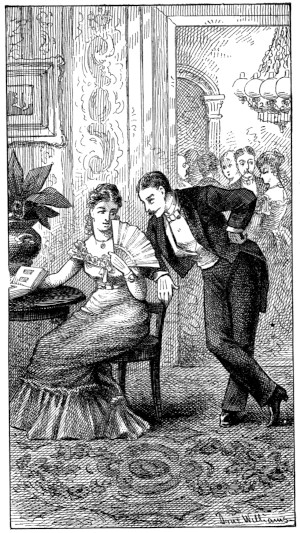
TIRZAH ANN FLIRTS WITH A MAN.
You see, Miss Skidmore wantin’ to appear fashionable
and genteel, and do as other genteel wimmen did,
329flirted with men. And I know jest as well as I want
to know that Tirzah Ann did, not wantin’ to be outdone.
I know she and Whitfield quarreled dretfully,
for the first time in their lives,—that I had right from
Tirzah Ann’s own mouth. But she didn’t tell me
what it was about. She looked sort o’ meachin’, and
turned the subject, and I hain’t one to pump. But I
s’pose, from what they both told me, that they come
pretty nigh partin’. And I know, jest as well as if I
see her at it, that Tirzah Ann bein’ so ambitious, and
not wantin’ to be outdone by Miss Skidmore, went to
flirtin’, and I mistrust it was with old Skidmore himself.
I know he and Whitfield don’t speak. Tirzah
Ann never could bear the sight of him, but I s’pose
she wanted to gaul Miss Skidmore.
Oh! such doin’s, such doin’s! It worked up me
and Josiah dretfully. As I told him, “where would
their morals have been, if they had rested and recreated
much longer?”
And he groaned aloud, and said what gauled him
the worst was to think of the piles and piles of money
they had throwed away. Says he: “It will cramp ’em
for months and months,”—and it will.
330

MISS BOBBET LETS THE CAT OUT.
My companion Josiah havin’ bought a quantity of
fresh fish, I thought I would carry one over to
Miss Betsey Slimpsy,—she that was Betsey Bobbet,—thinkin’
mebby it would taste good to her. Betsey hain’t
well. Some think she is in a gallopin’ consumption, but
I don’t. I think it is her workin’ so hard, and farin’ so
hard. She has to support the family herself, almost
entirely; she don’t have enough to eat a good deal of
the time, so folks say; she hain’t got any clothes fit to
wear; and she has to be such a slave, and work so
awful hard, that it don’t seem as if she is half as
bright as she used to be. As she says, if it wasn’t
for the dignity she got by bein’ married, it didn’t seem
as if she could keep up. But that, she says, is a great
comfort to her.
But she looks bad. She don’t get no sleep at all,
she says, or none to speak of. Simon’s horrors are
worse than I ever dremp’ horrors could be. They are
truly horrible. Every night he pounds on the headboard,
331yells awful, prances round, and kicks. Why,
Betsey says, and I believe her, that she is black and
blue most the hull time, jest from kicks. I am sorry
for Betsey.
Wall, I give her the fish,—she seemed awful glad
of it,—and visited with her a little while, and then,
as supper-time was approachin’ and drawin’ near, I
histed my umberell, and started out on my homeward
return.
It was a lovely evenin’. It had been a very hot day,
332but the sun had sot down (as it were) behind the trees
to cool himself off, and the earth, takin’ advantage of
his temporary retirement, seemed to foller on and do
likewise. So I walked along on the green grass, under
the swayin’ branches of the apple-trees that bent down
over the highway—great, liberal-hearted trees, stretching
their strong brown arms out in blessing and benediction—out
over their own rich, cultivated soil and
the dusty highway, over foe and lover, tramp, and
333Josiah Allen’s wife. I liked that in the trees—liked
it first-rate in ’em. It made me feel well to walk in
their refreshin’ shade.
The apples were ripenin’ in the clusterin’ boughs,
birds sang in the branches, the blue sky shone down
lovin’ly. The wayside blossoms grew thick at my feet,
the grass was like a velvet carpet under ’em, and, most
beautiful scene of all, my Josiah stood in the barn-door,
nailin’ on a board.
Oh! how first-rate I did feel and look. I knew I
was a lookin’ well. I knew it jest as well as I wanted
to, before I met my companion’s admirin’ look, as he
asked me, in considerable tender tones, if I knew
whether there was any more of them tenpenny nails
left.
I told him there wuzn’t. And then, oh! how admirin’
he looked at me agin, as I told him he had
better hurry and finish the door, as I was goin’ right
in to put on the tea-kettle and get supper jest as quick
as I could.
His smile was like sunshine to my heart, as he told
me he would be in by the time I got it ready, and I’d
better hurry up.
As I walked towards the house I was feelin’ beautiful,
and very affectionate towards my pardner. For
love, no matter how full and ardent it may be, will,
like other great deeps, have its ebbs and flows, its high
tides and its more dwindlin’ ones.
At that moment my love and my confidence in my
334Josiah swept up in my heart to the highest tide-level.
And I thought, as I walked along, that I would shet
up that eye of my spectacles—that I never would agin
let distrust and a Widder Bump cause me a moment’s
disquiet and unhappiness.
And though I could not deny to myself that Josiah
Allen’s conduct, in the spring of the year, and on a
Friday night, had been mysterious, I felt that I would
look back upon it as I look on scriptural passages that
I can’t make out the meanin’ of. I always feel in them
cases that it is the fault of the translator. No matter
how mysterious the meanin’ may seem, I know that
the Scriptures are right, anyway. And I felt that I
would look back in that way upon my companion’s
strange words and demeaners. I felt that I would
trust my Josiah.
And so, bein’ full of love and confidence in Josiah
Allen and the world at large, I walked with a even
step up to the door-step, and as I did so I see the
kitchen-door was open. I thought that looked sort o’
strange, as I knew that my Josiah had been to the
barn to work all the time I was gone. But I went in,
and as I did so I see a man a standin’ by the stove.
He was a short, stocky man, dressed middlin’ well, but
he had a strange look.
He was considerable older than Josiah, I should
think. His face was red and bloated, and his hair
bein’ white as snow, and his white whiskers runnin’
all round his chin, and up the sides of his face, it give
335it considerable the look of a red pin-cushion with a
white ruffle round it. Only the ruffle (still usin’ the
poetical simely) wuzn’t white under his chin. No, he
used too much tobacco for that. I s’pose he used it
for the good looks
of it; I s’pose that
is what folks use
tobacco for. But
good land! I can’t see a single pretty look to it, nor
never could, from the time a man takes in a half a plug
or so, and wads it up in one side of his mouth, showin’
his yeller, nasty-lookin’ teeth, and lettin’ the black,
filthy-lookin’ juice run down his mouth and whiskers,
336to the time he spits it all out agin onto carpets, stairways,
church pews, concert halls, car floors, wimmen’s
dresses, and et cetery.
I can’t see a mite of pretty looks about it. But I
am reasonable and always was. And there probable
may be some beauty in it that I hain’t never seen, or
there wouldn’t so many foller it up.
For it must be for the looks of it that they use it.
I have studied on it a sight, and there hain’t no other
reason that I can see. And if there had been any
the keen eye of my spectacles would have ketched
sight on it. They go awful deep into subjects, them
spectacles do.
It can’t be for the taste of it that they use it, for it
don’t taste good. That I know, for I got some into
my mouth once by mistake, over to Miss Bobbet’s, and
so what I know, I know; I can take my oath on the
taste of it. No, they don’t use it for that.
It can’t be for the profit of it, for it hain’t profitable;
quite the reverse. Why, there is about 30 million
dollars’ worth raised in the United States a year, and
somebody has got to pay for it.
Why, I s’pose some poor men chew enough of this
stuff,—chew it jest to spit it out agin,—and smoke it,—draw
the smoke into their mouth jest to blow it out
agin,—why, I s’pose this proceedin’ costs ’em enough
in ten or fifteen years to buy ’em a good little home.
And there they are willin’ to live and die homeless,
themselves and them they love, jest for looks, jest to
try to look pretty.
337For it must be for that. It can’t be for health, for
doctors say it hurts the health awfully, makes folks
weak and nervious, and sometimes leads to blindness
and fits.
It hain’t for morals, for folks say, and stick to it,
that it makes ’em totter. Weakens a man’s moral
nature, his social and religious faculties, gives him a
taste for the stronger stimulent of intoxicatin’ drinks,
and so leads him down to ruin gradual.
No, it hain’t for the morals. I have most probable
hit on the right reason. But good land! where the
beauty is in it I can’t see. But I am a episodin’ fearfully.
As I was a sayin’, this man, instead of beautifyin’
himself with it, had jest spilte the looks of his whiskers,
in my eye. They looked yeller and nasty. And the
sides of his mouth was all streaked with it. In some
places it was sort o’ dried on. He looked to me as if
it would do him good to put him asoak in weak lye,
and let him lay in it 2 or 3 days till he got sweetened
and cleansed.
His eyes was light-colored, and the lids was swelled
and inflamed like. His mouth was drawed down into
a dretful sanctimonious pucker; he had a awful big
chew of tobacco in his mouth, and so it wasn’t all
hypocracy that drawed it down; it was probable about
half and half—half hypocracy and half tobacco. And
under all the other expressions of his face was a dissipated,
bad look. I didn’t like his looks a mite. But
338there he stood a kinder hangin’ onto the table (I found
out afterwards that he had been drinkin’ all the hard
cider he could to old Bobbet’ses).
He asked me, in a kind of a thick voice, for Josiah.
And I, thinkin’ it was some one on business, asked
him in a polite tone, though cool, “if he wouldn’t take
a chair and set down.”
“I would,” says he, in that thick, husky voice, “I
would set down, mum, but I am afraid if I should I
couldn’t get up agin.”
And he looked at me in a curious, strange way;
dretful wise, and yet foolish like.
Says I, gazin’ sternly at him: “I am afraid you
have been a drinkin’, sir.”
“No! No! I hain’t! cider’s good; good for the
blood. Will take a glass, if you please.”
“Not here you won’t,” says I firmly.
“I’ll take a glass if you please, I said,” says he,
speakin’ up kinder loud. “Cider’s good; good for
the blood.”
Says I: “It will be good for your blood if you get
out of this house as quick as you can. And I would
love to know,” says I, lookin’ at him keenly over my
specks, “what you are here for, anyway.”
“I am here in the cause of—cider’s good for the
blood. Will take a drink.”
Says I: “You start out of this house, or I’ll call
Josiah.”
“I come, and I’m workin’ for the cause of religion,
if you please—and I’ll take a glass of it, if you please.”
339He’d make a sort of a drunken bow, every word or
two, and smiled sort o’ foolish, and winked long, solemn
winks.
Says I sternly: “You act as if you was a workin’
for the cause of religion.”
“Apple-cider’s good. Hain’t apples religious, easy
entreated? Hain’t apples peacible, long sufferin’?
Will take a drink, if you please.”
Says I, with a awful dignity: “I’d love to see
myself givin’ you anything to drink. You are drunk
as a fool now; that is what ails you.”
“Cider hain’t tox-tox-toxicatin’; Bobbet said ’twuzn’t.
He said his cider-mill was harmless, easy ’ntreated, as
peacible a one as he ever see. Will take a glass, if
you please. I wouldn’t drink a tox-tox-toxin’ bevrig,
not for dollar. Guess Bobbet knows what’s pious
drink and what hain’t. Cider’s pious bevrig—called
so—peacible, pious drink.”
“Pious drink!” says I, sternly. “I have seen more
than one man made a fool and a wild man by it, pious
or not. Oh!” says I, eppisodin’ out loud and eloquent,
entirely unbeknown to me, “how Satan must laugh in
his sleeves (if he wears sleeves) to see how good men
are deceived and blindered in this matter. Nothin’
tickles Satan more than to get a good man, a church
member, to work for him for nothin’. When he gets
good, conscientious, christian folks to tackle his work
of ruinin’ souls, unbeknown to them, and let him rest
off a spell,—why it tickles him most to death.
340“And when anyone plants the first seeds of drunkenness
in a person, no matter how good-naturedly it is
done, no matter how good the ones are who do it, they
are workin’ for Satan and boardin’ themselves, entirely
unbeknown to them. That is, the good ones are;
some know and realize what they are a doin’, but keep
at it through selfishness and love of gain.”
“Likker’s bad, wrong; but cider’s in’cent, in’cent as
a babe, a prattlin’ little babe; it’s called so.”
“Good land!” says I, “do you s’pose I care a cent
what a thing is called?” Says I: “I have seen cider
that three glasses of it would fix a man out so he
couldn’t tell how many childern he had, or fathers and
mothers, no more than he could count the stars in the
zodiact. And couldn’t walk straight and upright, no
more than he could bump his old head aginst the
moon. When a man is dead what difference does it
make to him whether he died from a shotgun or
billerous colic, or was skairt to death? And what difference
does it make when a man is made a fool of,
whether it is done by one spunefull or a dozen, or a
quart? The important thing to him is, he is a fool.”
“Yes, ’n I’ll take a glass of cider, if you please.”
I started right straight for the back stoop and
hollered to Josiah.
That skairt him. He started kinder sideways for
the door, got holt of the latch, and says he:
“I come to labor with you, n’ I don’t want to leave
you goin’ the broad road to destruction; but I will,”
341says he, with a simple sort of a smile, and as foolish
a wink as I ever see wunk, “I will if you’ll give me a
drink of cider, if you please.”
Says I, firmly, “You will take a broader road than
you have calculated on, if you don’t clear out of this
house, instantly and to once.” And as I still held my
umberell in my hand, I held it up in a threatnin’ way
in my left hand, some like a spear. And he started
off and went staggerin’ down the road.
I was a wonderin’ awfully who he was, and what he
come for, when Miss Bobbet come in to bring home
342a drawin’ of tea, and she was so full of news that she
most fell aginst the door, as wimmen will when they
are freighted too heavy with gossip. And she said it
was Elder Judas Wart, a Mormon Elder, who had
come back to Jonesville again.
“And,” says she, hurryin’ to relieve herself, for her
mind was truly loaded heavy with news beyond its
strength, “what do you think now about the Widder
Bump bein’ a Mormon. I told you she was one, a year
ago, and other wimmen told you so, but you would
stick to it that she was a camel.”
“Yes,” says I, “in the name of principle I have
upholded that woman and called her a camel.”
“Wall,” says she, “camel or not, she was sealed to
Elder Judas Wart last week. You know she went
home to her mother’s in the spring. And he has been
out there all summer holdin’ his meetin’s, and married
her.
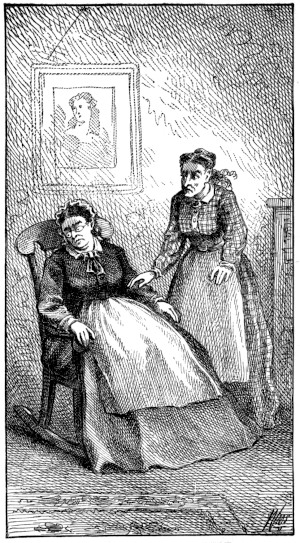
MISS BOBBET TELLS ABOUT JOSIAH.
“He told us all about it to-day. He said he hadn’t
hardly a wife by him but what was disabled in some
way from workin’. He said he was fairly discouraged.
Eleven of ’em was took down with the tyfus, violent.
A few of ’em, he didn’t hardly know jest how many,
but quite a number of ’em, had the chills. Two or
three of ’em was bed-rid. Four of ’em had young
babes; and he said he felt it was not good for man to
be alone, and he needed a wife—so he married the
Widder Bump and sent her on to Utah by express to
take charge of things till he come. He had meetin’s
to Jonesville last spring, and Bobbet went to ’em.”
345“Bobbet went to ’em,” says I, mechanically. For
oh! what strange and curious feelin’s was a tacklin’ of
me. Memeries of that terrible crysis in my life when
I heard the mutterin’s of a earthquake, a rumblin’ and
a roarin’ unbeknown to me. When everything in life
seemed uncertain and wobblin’ to a Samantha, and a
Josiah talked in his slumbers of a Widder Bump.
“Yes,” says she, “Bobbet owned it all up to me,
jest now. He wouldn’t, if the Elder hadn’t come in
and acted so glad to see him. But, if you’ll believe it,
Bobbet looked as if he would sink when he said he had
married the Widder Bump. And he says he hain’t
goin’ to have no new overcoat made this winter. And
he has been sot on havin’ one.”
“Bobbet owned it all up to you,” says I, speakin’
agin mechanically, for I felt fairly stunted by the
emotions that was rushin’ onto me.
“Yes, I remember he used to go evenin’s to Jonesville
a sight, last spring, when I had the quinzy and
was laid up. But I s’posed he went to the Methodist
Conference meetin’s. But he didn’t, he went to hear
Elder Judas Wart. And Bobbet says Josiah Allen
went to ’em, too.”
At them fearful words I groaned aloud. I wouldn’t
say a word aginst my pardner. But to save my life I
couldn’t keep that groan back. It fairly groaned itself
(as it were), my feelin’s was such.
It was a fearful groan, deep and melancholy in the
extreme. I was determined to not say one word about
346my feelin’s concernin’ my pardner, and I didn’t, only
jest that groan. She is quite a case to make mischief
in families, but she hain’t got a thing to carry from
me, only jest that groan. And there can’t be much
done, even in a court of law, with one plain groan, and
nothin’ else; there can’t be much proved by it.
She is a pryin’ woman, and I see she mistrusted
sunthin’. Says she:
“What is the matter, Josiah Allen’s wife? What
are you groanin’ for, so heavy?”
I wouldn’t come right out and tell the awful emotions
that was performin’ through my mind—and at
the same time I wouldn’t lie. So I broke out sort o’
eloquent, and says I:
“When I think what female wimmen have suffered,
and are sufferin’, from this terrible sin of polygamy, it
is enough to make anybody groan.” Says I, “I feel
guilty, awful guilty, to think I hain’t done sunthin’
before now to stop it. Here I have,” says I, growin’
fearfully excited, “here I have jest sot down here, with
my hands folded (as it were), and let them doin’s go
on without doin’ a single thing to break it up. And it
makes me feel fairly wicked when I think of that
address the sufferin’ female wimmen of Utah sent out
to Miss Hays and me.”
“To Miss Hays and you?” says Miss Bobbet, in a
sort of a jealous way. “I don’t know as it was sent
to you special. It said Miss Hays, and the other wimmen
of the United States.”
347“Wall,” says I, “hain’t I a woman, and hain’t Jonesville
right in the very center of the United States?”
“Why yes,” says she. Miss Bobbet will always
give up when she is convinced. I’ll say that for her.
“Wall,” says I, “that address that they sent out to
us was one of the most powerful and touchin’ appeals
for help ever sent out by sufferin’ humanity. And
here I hain’t done a thing about it, and I don’t believe
Emily has.”
“Emily who?” says she.
“Why, Emily Hays,” says I. “Rutherford Hays’es
wife. She that was Emily Webb. As likely a woman
as ever entered that White House. A woman of gentle
dignity, sweet, womanly ways, earnest christian
character, and firm principles. No better or better-loved
woman has ever sot up in that high chair since
Lady Washington got down out of it. A good-lookin’
woman, too,” says I proudly. “She has got a fair face
and a fair soul. Her christian example is as pure and
clear as the water she makes them old congressmen
drink to her dinner-table, and is as refreshin’, and as
much of a rarity to ’em. I can tell you,” says I, “it
makes me and America proud, it tickles both of us most
to death, to think our representative lady is one so
admirable in every way. And foreigners can gaze at
her all they are a mind to. We hain’t afraid to let
’em peruse her through the biggest telescopes they can
get; they won’t find nothin’ in her face nor her nature
but what we are proud of, both of us.
348“But in this matter I’ll bet a cent Emily hain’t
made a move, no more than I have. We have been
slack in it, both on us. But as for me,” says I firmly,
“I am determined to be up and a doin’.”
And oh! how I sithed (to myself) as I thought it
over. Emily hadn’t had the
fearful lesson that I had had.
Her pardner’s morals never
had wobbled round and tottered
under the pressure of
this pernicious doctrine, and
a Widder Bump. My sithes
was fearful, as I thought it over, but they was inward
and silent ones. For my devotion to my pardner is
such that I would not give even the testimony of a
sithe against my Josiah.
When necessary, and occasion demands it, I scold
Josiah myself, powerful; I have to. But I will protect
349him from all other blame and peril, as long as I have a
breath left in my lung, or a strength left in my armpit.
But oh! what feelin’s I felt, what deep, though silent,
sithes I sithed, as I thought it over to myself. How
the posy will not give out its perfume; will hang right
onto it with its little, dainty, invisible hands till it is
trod on; then it gives it up—has to. And gold won’t
drop a mite of its dross; obstinate, haughty, holdin’
right onto it till it is throwed into the fire, and heat
put to it.
And to foller up the simelys, Josiah Allen’s wife’s
heart had to be tried in the fiery furnace of pain and
mortifacture before it would give up and do its duty.
Oh! how my conscience smoted me as I thought it
over. Thought how the hand of personal sufferin’ had
to fairly whip me into the right. There had hundreds
and thousands of my own sect been for year after year
a sufferin’ and a agonizin’. Bearin’ the heaviest of
crosses with bleedin’ hands, and eyes so blinded with
tears they could hardly ketch a glimpse of the sweet
heavens of promise above ’em. And how at last, bein’
fairly drove to it in their despair, they writ to Emily
and me for help: help to escape out of the deeps of
personal and moral degradation; help to rescue them
and the whole land from barberism and ruin. And
there we hadn’t paid no more attention to that letter
than if it hadn’t been wrote to us.
Oh! how guilty I felt. I felt as if I was more to
350blame than Emily was, for her house was bigger than
mine, and she had more to do. And she hadn’t had
the warnin’ I had. I was the guilty one. In the
spring of the year, and on a Friday night, right up on
the ceilin’ of our kitchen had those fearful words been
writ, jest as they was in Bellshazzer’ses time:
“Mean! mean! tea-kettle!” and et cetery. Which
bein’ interpreted in various ways, held awful meanin’s
in every one of ’em. “Mean! mean!” showin’ there
was mean doin’s a goin’ on; “tea-kettle!” showin’
there was bilin’ water a heatin’ to scald and torture
me. And takin’ it all together this awful meanin’
could be read: “Josiah Allen is weighed in the ballances,
and is found wantin’.”
I hadn’t heeded those fiery words of warnin’. I had
covered my eyes, and turned away from interpretations
(as it were). Forebodin’s had foreboded, and I hadn’t
minded their ’bodin’s. Forerunners had run right in
front of me, and I wouldn’t look at these forerunners,
or see ’em run.
Blind trust and affection for a Josiah had blinded
the eyes of a Samantha; but now, when the truth was
brought to light by a Miss Bobbet, when I could see
the awful danger that had hung over me on a Friday
night and in the spring of the year, when I could
almost hear the whizzin’ of the fatal arrow aimed at
my heart, my very life—now I could realize how them
hearts felt where the arrows struck, where they was a
quiverin’ and a smartin’ and a ranklin’.
351Now, it felt a feelin’, my heart did, that it was
willin’, while a throb of life remained in it, to give that
throb to them fellow-sufferers (fellow-female-sufferers).
And when Miss Bobbet said, jest as she started for
home, that Elder Judas Wart wanted to have a talk
with me on religion and mormonism, I said, in a loud,
eloquent voice:
“Fetch him on! Bring him to me instantly! and
let me argue with him, and convert him.”
I s’pose my tone and my mean skairt her, she not
knowin’ what powerful performances had been a performin’
in my mind. And I heard that she went right
from our house and reported that I was after the
Elder. So little is worldly judgment to be relied upon.
But nobody believed it, and if they had, I shouldn’t
have cared, no more than I should have cared for the
murmurin’ of the summer breeze. When the conscience
is easy, the mind is at rest. I knew there was
three that knew the truth on’t: the Lord, Elder Judas
Wart, and myself. I count Josiah and me as one,
which is lawful, though Josiah says that I am the one
the biggest heft of the time. He said “he made calculations
when he married me, when we was jined
together as one, that he would be that one.”
And I told him, “Man’s calculations was blindin’,
and oft deceivin’.”
I said it in a jokin’ way. I let him be the “one” a
good deal of the time, and he knows it.
But, as I was a sayin’, them three that knew it was
352all that was necessary to my comfort and peace of
mind.
Josiah looked sad and depressted, and I knew, for I
see old Bobbet leanin’ over the barnyard fence while he
was a milkin’, and I knew they had been talkin’ over
the news. And when he come in with his second pail-full
of milk, lookin’ so extra depressted, my mean was
some colder, probable about like ice cream, only not
sweet; no, not at all sweet—quite the reverse.
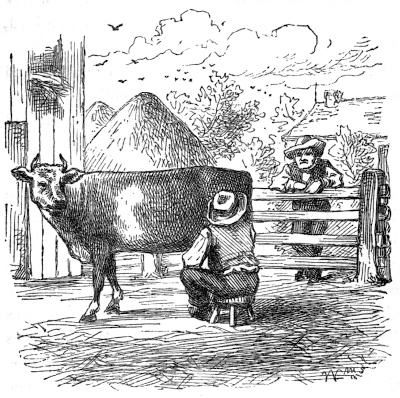
BOBBET AND JOSIAH TALKIN’.
After Miss Bobbet’s departure, the night that ensued
and followed on was fearful and agonizin’. What to
353do with Josiah Allen I knew not. But I made my
mind up not to tackle him on the subject then, but
wait till I was more calm and composed down. I also
thought I would do better to take the daylight to it.
So I treated him considerable the same as my common
run of treatment towards him was, only a little more
cool—not cold as ice, but coolish.
But oh! what emotions goared me that night, as I
lay on my goose-feather pillow, with Josiah by my side
a groanin’ in his sleep frequent and mournful. He
couldn’t keep awake, that man couldn’t, not if all the
plagues of Egypt was a plaguin’ him, as I often
remarked to him.
But while such emotions was a performin’ in my
mind, there wuzn’t no sleep for me. Some of the time
I was mad at Josiah Allen, and then agin I was mad
at the Government. Some of the time I would feel
indignant at Josiah, clear Josiah; and then agin, as
he would sithe out loud and heart-breakin’ sithes, my
affection for him would rise up powerful, and I would
say to myself—oritorin’ eloquent right there in the
dead of the night—“Why should I lay all the blame
of a pernicious system onto my sufferin’ pardner?
Human nater is weak and prone to evil, especially man
human nater, which is proner. And when Government
keeps such abysses for men to walk off of, and break
their necks (morally), who should be scolded the most—them
men after their necks are broke, or the ones
who dug the abysses, or let ’em be dug?
354“Let this band of banditty flourish on shore—furnished
land for ’em to flourish on—and furnished ships
to go out over the ocian and hunt round for foreign
souls to ruin. Who calmly looked on and beheld its
ships bear to our shores hundreds and thousands of
the ignorant peasantry of the old world—fair-faced
Swedish and Danish maidens, blue-eyed German girls,
and bright English and Irish lassies—lookin’ with
innocent, wonderin’ eyes toward a new life—innocent
youth, deceived by specious falsehoods, pourin’ onto
our shores like pure rills of water, to fall into that
muddy gulf of corruption and become putrid also—and
our Government lookin’ calmly on, happy as a
king, and pretendin’ to be religious.”
I declare! as I thought it all over, I was as mad
with the Government as I was with my pardner, and I
don’t know but madder.
Scolded, Josiah Allen had got to be—that I knew.
But I hankered, I hankered awfully, right there in the
dead of the night, to tackle the Government, too, and
scold it fearfully. I felt that I must be up and a doin’.
I yearned to tackle Elder Judas Wart, and argue with
him with a giant strength. But little did I think that
in a few days I should be a doin’ of it.
355

A SERENADING EPISODE, &c.
These verses of Betsey’s come out in the last
week’s Gimlet, and I call it foolish stuff.
Though (on measurin’ ’em in a careless way with a
yard-stick) I found the lines was pretty nigh of a equal
length, and so I s’pose it would be called poetry.
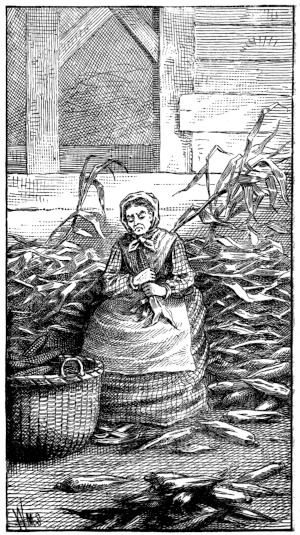
Oh Gimlet! back again I float,
With broken wings, a weary bard;
I cannot write as once I wrote,
I have to work so very hard;
So hard my lot, so tossed about,
My muse is fairly tuckered out.
My muse aforesaid once hath flown,
But now her back is broke, and breast;
And yet she fain would crumple down;
On Gimlet pages she would rest,
And sing plain words as there she’s sot—
Haply they’ll rhyme, and haply not.
356I spake plain words in former days,
No guile I showed, clear was my plan;
My gole it matrimony was;
My earthly aim it was a man.
I gained my man, I won my gole;
Alas! I feel not as I fole.
Yes, ringing through my maiden thought
This clear voice rose: “Oh come up higher.”
To speak plain truth, with candor fraught,
To married be was my desire.
Now, sweeter still this lot shall seem,
To be a widder is my theme.
For toil hath claimed me for her own,
In wedlock I have found no ease;
I’ve cleaned and washed for neighbors round,
And took my pay in beans and pease;
In boiling sap no rest I took,
Or husking corn, in barn, and shock.
Or picking wool from house to house,
White washing, painting, papering;
In stretching carpets, boiling souse;
E’en picking hops, it hath a sting,
For spiders there assembled be,
Mosquitoes, bugs, and e t c.
I have to work, oh! very hard;
Old Toil, I know your breadth and length;
I’m tired to death, and, in one word,
I have to work beyond my strength.
And mortal men are very tough
To get along with,—hasty, rough.
359Yes, tribulation’s doomed to her
Who weds a man, without no doubt.
In peace a man is singuler;
His ways they are past findin’ out.
And oh! the wrath of mortal males—
To point their ire, earth’s language fails.
And thirteen children in our home
Their buttons rend, their clothes they burst,
Much bread and such do they consume;
Of children they do seem the worst.
And Simon and I do disagree;
He’s prone to sin continuallee.
He horrors has, he oft doth kick,
He prances, yells,—he will not work.
Sometimes I think he is too sick;
Sometimes I think he tries to shirk.
But ’tis hard for her, in either case,
Who B. Bobbet was in happier days.
Happier? Away! such thoughts I spurn.
I count it true, from spring to fall,
’Tis better to be wed, and groan,
Than never to be wed at all.
I’d work my hands down to the bone
Rather than rest a maiden lone.
This truth I will not, cannot shirk,
I feel it when I sorrow most:
I’d rather break my back with work,
And haggard look as any ghost,—
Rather than lonely vigils keep,
I’d wed and sigh, and groan and weep.
360Yes, I can say, though tears fall quick,
Can say, while briny tear-drops start,
I’d rather wed a crooked stick
Than never wed no stick at all.
Sooner than laughed at be, as of yore,
I’d rather laugh myself no more.
I’d rather go half-clad and starved,
And mops and dish-cloths madly wave,
Than have the words “B. Bobbet” carved
On headstun rising o’er my grave.
Proud thought! now, when that stun is risen,
’Twill bear two names—my name and hisen.
Methinks ’twould colder make the stun
If but one name, the name of she,
Should linger there alone—alone.
How different when the name of he
Does also deck the funeral urn;
Two wedded names,—his name and hurn.
And sweeter yet, oh blessed lot!
Oh state most dignified and blest!
To be a widder, calmly sot,
And have both dignity and rest.
Oh, Simon! strangely sweet ’twould be
To be a widder unto thee.
The warfare past, the horrors done,
With maiden’s ease and pride of wife,
The dignity of wedded one,
The calm and peace of single life,—
Oh, strangely sweet this lot doth seem;
A female widder is my theme.
361I would not hurt a hair of he,
Yet, did he from earth’s toils escape,
I could most reconciléd be,
Could sweetly mourn, e’en without crape,
Could say, without a pang of pain,
That Simon’s loss was Betsey’s gain.
I’ve told the plain tale of my woes,
With no deceit, or language vain,
Have told whereon my hopes are rose,
Have sung my mournful song of pain.
And now I e’en will end my tale,
I’ve sung my song, and wailed my wail.
I have made a practice of callin’ that Poetry, bein’
one that despises envy and jealousy amongst female
authoresses. No, you never ketch me at it, bein’ one
that would sooner help ’em up the ladder than upset
’em, and it is ever my practice so to do. But truth
must be spoke if subjects are brung up. Uronious
views must be condemned by Warriors of the Right,
whether ladders be upset or stand firm on their legs—poetesses
also.
I felt that this poetry attacted a tender subject, a
subject dearer to me than all the world besides—the
subject of Josiah. Josiah is a man.
And I say it, and I say it plain, that men hain’t no
such creeters as she tries to make out they be. Men
are first-rate creeters in lots of things, and are as good
as wimmen be any day of the week.
Of course I agree with Betsey, that husbands are
tryin’ in lots of things; they need a firm hand to the
hellum to guide ’em along through the tempestuous
362waves of married life, and get along with ’em. They
are lots of trouble, but then I think they pay after all.
Why, I wouldn’t swap my Josiah for the best house
and lot in Jonesville, or the crown of the Widder
Albert. I love Josiah Allen. And I don’t know but
the very trouble he has caused me makes me cling
closer to him. You know the harder a horse’s head
beats aginst burdock burs the tighter the burdocks will
cling to its mane. Josiah makes me sights of trouble,
but I cling to him closely.
I admit that men are curious creeters, and very vain,
and they hain’t willin’ to let well enough alone. They
over-do, and go beyond all sense and reason. A
instance of these two strong traits of their’s has jest
occurred and took place, which, as a true historian
relatin’ solemn facts, I will relate in this epistol.
Yes, men are tejus creeters a good deal of the time.
But then agin, so be wimmen, jest as tejus, and I don’t
know but tejuser. I believe my soul, if I had got to
be born agin, I had jest as lieves be born a man as a
woman, and I don’t know but I drather.
No, I don’t think one sect ort to boast over the other
one. They are both about equally foolish and disagreeable,
and both have their goodnesses and nobilities,
and both ort to have their rights.
Now I hain’t one to set up and say men hadn’t ort
to vote, that they don’t know enough, and hain’t good
enough, and so forth and so on. No, you don’t ketch
me at it. I am one that stands up for justice and
reason.
363
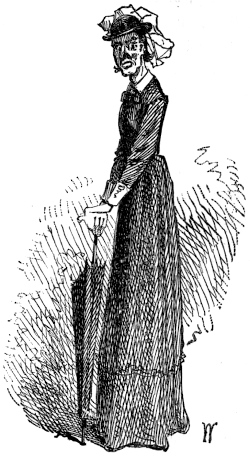
Now, the other day a wild-eyed woman, with short
hair, who goes round a lecturin’ on wimmen’s rights,
come to see me, a tryin’ to inviggle me into a plot to
keep men from votin’. Says she, “The time is a
drawin’ near when
wimmen are a goin’
to vote, without no
doubt.”
“Amen!” says I.
“I can say amen to
that with my hull
heart and soul.”
“And then,” says
she, “when the staff
is in our own hands,
less we wimmen all
put in together and
try to keep men
from votin’.”
“Never!” says I,
“never will you get
me into such a
scrape as that,”
says I. “Men have
jest exactly as good a right to vote as wimmen have.
They are condemned, and protected, and controlled by
the same laws that wimmen are, and so of course are
equally interested in makin’ ’em. And I won’t hear
another word of such talk. You needn’t try to inviggle
364me into no plot to keep men from votin’, for justice
is ever my theme, and also Josiah.”
Says she, bitterly, “I’d love to make these miserable
sneaks try it once, and see how they would like it, to
have to spend their property, and be hauled around,
and hung by laws they hadn’t no hand in makin’.”
But I still says, with marble firmness, “Men have
jest as good a right to vote as wimmen have. And
you needn’t try to inviggle me into no such plans, for
I won’t be inviggled.”
And so she stopped invigglin’, and went off.
And then again in Betsey’s poetry (though as a
neighbor and a female author I never would speak a
word aginst it, and what I say I say as a warrior, and
would wish to be so took) I would say in kindness,
and strictly as a warrior, that besides the deep under-current
of foolishness that is runnin’ through it, there
is another thought that I deeply condemn. Betsey sot
out in married life expectin’ too much. Now, she
didn’t marry in the right way, and so she ort to have
expected tougher times than the usual run of married
females ort to expect; more than the ordinary tribulations
of matrimony. But she didn’t; she expected
too much.
And it won’t do to expect too much in this world,
anyway. If you can only bring your mind down to it,
it is a sight better to expect nothing, and then you
won’t be disappointed if you get it, as you most probable
will. And if you get something it will be a joyful
365surprise to you. But there are few indeed who has
ever sot down on this calm hite of filosify.
Folks expect too much. As many and many times
as their hopes have proved to be uronious, they
think, well now, if I only had that certain thing, or
was in that certain place, I should be happy. But
they hain’t. They find when they reach that certain
gole, and have clim up and sot down on it, they’ll find
that somebody has got onto the gole before ’em, and is
there a settin’ on it. No matter how spry anybody
may be, they’ll find that Sorrow can climb faster than
they can, and can set down on goles quicker. Yes,
they’ll find her there.
It hain’t no matter how easy a seat anybody sets
down in in this world, they’ll find that they’ll have to
hunch along, and let Disappointment set down with
’em, and Anxiety, and Weariness, and et cetery, et cetery.
Now, the scholar thinks if he can only stand up on
that certain hite of scientific discovery, he will be
happy, for he will know all that he cares about or
wants to. But when he gets up there, he’ll see plain;
for the higher he is riz above the mists of ignorance
that floats around the lower lands, the clearer his
vision; and he will see another peak right ahead of
him, steeper and loftier and icier than the last, and so
on ad infinitum, ad infinity.
Jest as it was with old Miss Peedick, our present
Miss Peedick’s mother-in-law. She said (she told me
366with her own lips) that she knew she should be happy
when she got a glass butter-dish. But she said she
wasn’t; she told me with her own lips that jest as
quick as she got that she wanted a sugar-bowl.
The lover thinks when he can once claim his sweetheart,
call her his own, he will be blessed and content;
but he hain’t. No matter how well he loves her, no
matter how fond she is of him, and how blest they are
in each other’s love, they must think, anyway, that the
blessedness lacks one thing—permanence.
And though he calls her his own, yet he must feel,
if he knows anything, that she is not his own; he must
know that he has to dispute for the possession of her
daily with one stronger than he is. And if he is tender-hearted
and sensitive, the haunting fear must
almost rack his soul; the horrible dread of seeing her
slip away from him altogether; of sometime reaching
out his arms, and finding that nowhere, nowhere can
he find her; that in place of her warm, beating heart,
whose every throb was full of love for him, is only the
vacant spaces, the mysterious wave-beats of emptyness
and void; in place of the tender sweetness of her
voice, the everlasting silences of eternity.
And though he seek her forever and forever, he can
never meet her; never, never, through all this earthly
life, find her again. She, the nearest and the dearest,
so lately a part of his own life, his own soul, gone from
him so swiftly and so utterly, over such a trackless
road, as to leave no trace of her footsteps that he may
367follow her. And though he throw himself upon the
turf that covers her, and weary the calm heavens with
his wild prayers and questionings, no answer comes;
his words fall back again upon his heart, like dust upon
dust.
And then, those who love him tell him that the loving
hands were unclasped from his that he might
forever reach upward, yearning, longing to clasp them
again, that he might make his own hands purer, fitter
to clasp an angel’s fingers.
368That the bright tresses were hidden away under the
coffin-lid, that their immortal sheen might gleam
through every sunset and every dawning; heaven’s
golden seal on the sunset of his joy, the morning of
his hope, his faith. That the sweet eyes were darkened
here that they might become to his sad heart the
glowing light of the future. They say this to him, and
he listens to them—maybe.
But if this does not happen to him, if his sweetheart
lives on beside him, he finds that this mighty presence
steals away—not love, for that is a bit of the infinite
dropped down into our souls unbeknown to us, and so
is immortal; but he steals the golden sheen of the
hair, the eye’s bright luster, the young form’s strength
and rounded beauty. Every day, every hour, he is
losing something of what he proudly called his own.
You see we don’t own much of anything in this
world: it’s curious, but so it is. And what we call our
own don’t belong to us, not at all. That is one of the
things that makes this such an extremely curious world
to live in. Yes, we are situated extremely curious, as
much so as the robins and swallows who build their
nests on the waving tree-boughs.
We smile at the robin, with our wise, amused pity,
who builds her tiny nest with such laborious care high
up, out on the waving tree-top, swinging back and
forth, back and forth, in every idle wind. Gathering
her straws and bits of wood with such patient and tireless
care to weave about the frail homes that are to be
369blown away by the chilly autumn winds, and they also
to be driven southward before the snows.
But are not our homes, the sweet homes of our
tenderest love, built upon just as insecure foundations,
hanging over more mysterious depths, rocking to and
fro, and swept to their ruin by a breath from the
Unknown? Our dreams, our hopes, our ambitions:
what are ye all but the sticks and straws that we weave
about our frail nests? Throwing our whole hearts and
souls into them, toiling over them, building them for
an evanescent summer, to be swept away by the
autumn winds. And we also, poor voyagers, blown
away through a pathless waste.
But shall we not go unfearing, believing that He
who made a balmy south to fulfill the little summer
bird’s intuition, her blind hope and trust, has also prepared
a place to fulfill our deathless longin’s, our soul’s
strongest desires? And over the lonely way, the
untried, desolate fields of the future, He will gently
guide us thither.
But I am eppisodin’. I said I would relate in this
epistol a instance of the devourin’ and insatiable vanity
of man, and their invincible unwillingness to let well
enough alone. And so, although it is gaulin’ to me,
gaulin’ in the extreme, to speak of my companion’s
weaknesses, yet, if medicine was not spread before
patients, how could colic be cured, and cramps, and
etcetery?
Yes, in the name of Duty, as a warnin’ to the sect,
370dear to me (in a meetin’-house way) for his sake of
whom I write, I will proceed, and give a plain and
unvarnished history of Josiah’s serenade.
Eliab Gansey, or E. Wellington Gansey, as he has
rote his name for years, has been here to Jonesville on
a visit. He lives to the Ohio. He is jest about
Josiah’s age, and used to be a neighbor of his’n. He
was born here, and lived round here till he got to be a
young man. But he went to the Ohio to live when
371he was quite a young chap, and made money fast,
and got high in station. Why, some say he got
as high as clerk to town meetin’; I don’t know about
that, but we do know that he got to be a real big man
anyway, and come home here on a visit, forehanded
and weighin’ over 300. He was slim as a lucifer
match when he went away, or a darnin’-needle.
Wall, his comin’ back as he did made a real commotion
and stir in the neighberhood. The neighbers all
wanted to do sunthin’ to honor him, and make him
happy, and we all sort o’ clubbed together and got up
a party for him, got as good a dinner as ever Jonesville
afforded, and held it in old Squire Gansey’s dinin’-room.
He was cousin to Liab on his father’s side,
and had a big house and lived alone, and urged us to
have the party there.
Wall, I approved of that dinner, and did all I could
to help it along. Talked encouragin’ about it to all
the neighberin’ wimmen, and baked two chicken-pies,
and roasted a duck, and other vittles accordin’.
And the dinner was a great success. Liab seemed
to enjoy himself dretfully, and eat more than was for
his good, and so did Josiah; I told Josiah so afterwards.
Wall, we had that dinner for him, all together (as it
were). And then we all of us invited him to our own
homes seperate, to dinner or supper, as the case might
be. We used him first-rate, and he appreciated it,
that man did, and he would have gone home feelin’
372perfectly delighted with our treatment of him, and
leavin’ us feelin’ first-rate, if it hadn’t been for Josiah
Allen, if he had been willin’ to take my advice and let
well enough alone. And what a happyfyin’ thing that
is, if folks would only realize it, happyfyin’ to the folks
that let well enough alone, and happyfyin’ to them that
are let.
But some are bound to over-do and go beyond all
sense and reason. And Josiah wasn’t contented with
what he had done for Liab, but wanted to do more—he
was bound to serenade him. I argued and argued
with him, and tried to get the idee out of his head, but
the more I argued aginst the idee, the more firm he
was sot onto it.
He said it stood Jonesville in hand to treat that
man to all the honors they could heap onto him. And
then he told me sunthin’ that I hadn’t heard on before;
that Liab talked some of comin’ back here to live: he
was so pleased with his old neighbors, they had all
used him so well, and seemed to think so much of
him.
“And,” says Josiah, “it will be the makin’ of Jonesville
if he comes back; and of me, too, for he talks of
buyin’ my west lot for a house-lot, and he has offered
me 4 times what it is worth, of his own accord,—that
is, if he makes up his mind to come back.”
“Wall,” says I, “you wouldn’t take advantage of
him, and take 4 times what it is worth, would you?”
Says I sternly: “If you do you won’t never prosper in
your undertakin’s.”
373“He offered it himself,” says Josiah. “I didn’t set
no price; he sot it himself. And it wouldn’t be no
cheatin’, nor nothin’ out of the way, to take it, and I
would take it with a easy conscience and a willin’
mind. But the stick is,” says he dreamily, “the stick
is to get him to come back. He likes us now, and if
we can only endear ourselves to him a little mite more
he will come. And I am goin’ to work for it; I am
bound to serenade him.”
Says I coldly: “If you want to endear yourself to
him you are goin’ to work in the wrong way.” And
says I, still more frigidly: “Was you a layin’ out to
sing yourself, Josiah Allen?”
“Yes,” says he, in a animated way. “The way I
thought of workin’ it was to have about 8 of us old
men, who used to be boys with him, get together and
sing some affectin’ piece under his winder; make up a
piece a purpose for him. And I don’t know but we
might let some wimmen take a hand in it. Mebby you
would want to, Samantha.”
“No sir!” says I very coldly. “You needn’t make
no calculations on me. I shall have no hand in it at
all. And,” says I firmly, “if you know what is best
for yourself, Josiah Allen, you will give up the idee.
You will see trouble if you don’t.”
“Wall, I s’pose it will be some trouble to us; but I
am willin’ to take trouble to please Liab, as I know it
will. Why, if I can carry it out, as I think we can,
it will tickle that man most to death. Why, I’ll bet
374after hearin’ us sing, as we shall sing, you couldn’t dog
him from Jonesville. And it will be the makin’ of the
place if we can only keep him here, and will put more
money into my pocket than I have seen for one spell.
And I know we can sing perfectly beautiful, if we only
set out to. I can speak for myself, anyway; I am a
crackin’ good singer, one of the best there is, if I only
set out to do my best.”
Oh! what a deep streak of vanity runs through the
naters of human men. As many times as it had been
proved right out to his face that he couldn’t sing no
more than a ginny-hen, or a fannin’-mill, that man
still kep’ up a calm and perennial idee that he was a
sweet singer.
Yes, it is a deep scientific fact, as I have often remarked
to Josiah Allen, that the spring of vanity that
gushes up in men’s naters can’t be clogged up and
choked. It is a gushin’ fountain that forever bubbles
over the brink with perennial and joyful freshness.
No matter how many impediments you may put in its
way, no matter how many hard stuns of disappointment
and revilin’ and agony you may throw into that
fountain, it won’t do no more than to check the foamin’
current for a moment. But presently, or sometimes
even before that, the irrepressible fountain will soar
up as foamin’ly as ever.
As many times, and times agin, as Josiah’s vanity
had been trampled on and beat down and stunned, yet
how constant and clear it was a bubblin’ up and meanderin’
375right before my sight. And before I had got
through allegorin’ in my own mind about the curious
and scientific subject, he gave me another proof of it.
Says he: “I don’t want you to think, Samantha, because
I said I didn’t know but we would let wimmen
have a hand in it, I don’t want you to think that we
want any help in the singin’. We don’t want any help
in the singin’, and don’t need any; but I didn’t know
but you would want to help compose some poetry on
Liab. Not but what we could do it first-rate, but its a
kind o’ busy time of year, and a little help might come
good on that account.”
Says I, in a very dry tone,—very: “What a lucky
thing it is for Tennyson and Longfellow that you and
old Bobbet are so cramped for time. There wouldn’t
probable be no call for their books at all, if you two
old men only had time to write poetry; it is dretful
lucky for them.”
But I didn’t keep up that dry, sarcastical tone long.
No, I felt too solemn to. I felt that I must get his
mind off of the idee if I possibly could. I knew it
would be putting the wrong foot forward to come right
out plain and tell him the truth, that he couldn’t sing
no more than a steam-whistle or a gong. No, I knew
that would be the wrong way to manage. But I says,
in a warnin’ and a awful sort of a tone, and a look jest
solemn and impressive enough to go with it:
“Remember, Josiah Allen, how many times your
pardner has told you to let well enough alone. You
376had better not try to go into any such doin’s, Josiah
Allen. You’ll sup sorrow if you do.”
But it was no use. In spite of all my entreaties and
arguments they got it up amongst ’em; composed
some poetry (or what they called poetry), and went
and sung it over (or what they called singin’) night
after night to the school-house; practicin’ it secret so
Liab shouldn’t hear of it, for they was a lottin’ on
givin’ him such a joyful surprise.
Wall, they practised it over night after night, for
over a week. And Josiah would praise it up so to me,
and boast over it so, that I fairly hated the word serenade.
“Why,” says he, “it is perfectly beautiful, the hull
thirteen pieces we have learnt, but specially the piece
we have made up about him; that is awful affectin’.”
And says he: “I shouldn’t wonder a mite if Liab
should shed tears when he hears it.”
And I’d tell him I persumed it was enough to
bring tears from anybody.
And that would mad him agin. He would get mad
as a hen at me. But I didn’t care. I knew I was a
talkin’ on principle, and I wasn’t goin’ to give in an
inch, and I didn’t.
Wall, at last the night come that they had sot to
serenade him. I felt like cryin’ all the time he was a
fixin’ to go. For next to bein’ a fool yourself, it is
gaulin’ to have a pardner make a fool of himself.
But never, never, did I see Josiah Allen so highlarious
377in his most highlarious times. He acted almost
perfectly happy. Why, you would have thought he
was a young man to see him act. It was fairly sickish,
and I told him so.
“Wall,” says he, as he started out, “you can make
light of me all you are a mind to, Samantha, but as
long as Josiah Allen has the chance to make another
fellow-mortal perfectly happy, and put money in his
own pocket at the same time, he hain’t the feller to let
the chance slip.”
“Wall,” says I coldly, “shet the gate after you.”
I knew there wuzn’t no use in arguin’ any more
with him about it. And I think it is a great thing to
know when to stop arguin’ or preachin’ or anythin’.
It is a great thing to know enough to stop talkin’
when you have got through sayin’ anythin’. But this
is a deep subject; one I might allegore hours and
hours on, and still leave ample room for allegory.
And to resoom and continue on, he started off; and
I wound up the clock, and undressed and went to bed,
leavin’ the back-kitchen door onlocked.
Wall, that was in the neighborhood of 10 o’clock.
And I declare for’t, and I hain’t afraid to own it, that
I felt afraid. There I was all alone in the house, sunthin’
that hardly ever happened to me, for Josiah Allen
was always one that you couldn’t get away from home
nights if he could possibly help it; and if he did go I
almost always went with him. Yes, Josiah Allen is
almost always near me; and though he hain’t probable
378so much protection as he would be if he weighed more
by the steelyards, yet such is my love for him that I
feel safe when he is by my side.
I had read only a day or two before about a number
of houses bein’ broken open and plundered, besides
several cases of rapine; and though I hain’t, I persume,
so afraid of burglers as I would be if I had ever been
burgled, and though I tried to put my best foot forward,
and be calm, still, the solemn thought would
come to me, and I couldn’t drive it away: Who knows
but what this is the time that I shall be rapined and
burgled?
Oh! what a fearful time I did have in my mind,
as I lay there in my usually peaceful feather-bed.
Wall, I got wider and wider awake every minute,
and thinkses I, I will get up and light the lamp, and
read a little, and mebby that will quiet me down. So
I got up and sot down by the buro, and took up the
last World; and the very first piece I read was a
account of a house bein’ broke into, between ten
o’clock and midnight, and four wimmen massacreed
in their beds.
I laid down the World, and groaned loud. And
then I sithed hard several times. And right there,
while I was a sithin’, sunthin’ come kerslop aginst
the window, right by my side. And though I hain’t
no doubt it was a June bug or a bat, still if it had
been a burgler all saddled and bridled that had rode
up aginst my winder, it couldn’t have skairt me no
379worse, and I couldn’t have jumped no higher, I was that
wrought up and excited.
Wall, thinkses I, it is the light that has drawed that
bat or June bug aginst the winder, and mebby it will
draw sunthin’ worse, and I believe I will blow out the
light and get into bed agin; I believe I will feel
safer.
So I blowed the light out, and got into bed. Wall,
I had lain there mebby ten minutes, a tremblin’ and a
quakin’, growin’ skairter and skairter every minute,
380when all of a sudden I heard a rappin’ aginst my winder,
and a hoarse sort of a whisper sayin’:
“Josiah Allen! Josiah Allen! Miss Allen!”
It didn’t sound like no voice that I had ever heard,
and I jest covered
my head up
and lay there,
with my heart a
beatin’ so you
could have
heard it under
the bed. I knew
it was a burgler.
I knew my time
had come to be
burgled.
Wall, the
whisperin’ and
the rappin’ kep’
up for quite a
spell, and then
it kinder died
off; and I got
up and peeked
through the winder, and then I see a long white figger
a movin’ off round the corner of the house toward the
back-kitchen. And then I was skairter still, for I
knew it was a ghost that was a appearin’ to me. And
I had always said, and say still, that I had ruther be
burgled than appeared to.
381And there I lay, a tremblin’ and a listenin’, and
pretty soon I heard steps a comin’ into the back-kitchen,
and so along through the house up to my bedroom
door. And then there come a rap right onto my
door. And though cold shivers was a runnin’ down
my back, and goose-pimples was present with me, I
knew sunthin’ had got to be done.
There I was alone in the house with a ghost. And
thinkses I, I must try to use it well, so’s to get rid of
it; for I thought like as not if I madded it, it would
stick right by me. And so I says, in as near the
words I could remember, as I had hearn tell they
talked to spirits:
“Are you a good spirit?” says I. “If you are a
good spirit, raise up and rap three times.”
I s’pose my voice sounded low and tremblin’ down
under the bed-clothes, and my teeth chattered so loud
that they probable drounded the words some. But the
rappin’ kep’ up.
And says I agin: “If you are a likely spirit, raise
up and rap three times, and then leave.” And then
says I, for I happened to think what I had heard they
done to get ’em away, for I had been that flustrated
and horrer-struck that I couldn’t think of nothin’
hardly, says I:
“I will you away. I will you off out of this house,
if you please,” I added, for I was so afraid of maddin’
it. Thinkses I to myself, I would ruther mad a burgler
or a rapiner ten times over than to get a apperition
382out with me. I s’pose I had spoke up louder this
time, for the ghost (or what I thought was such) answered
back to me, and says:
“I am Miss Moony.”
Says I: “Not she that was Tamer Sansey?”
“Yes, I be.”
Says I, in stern tones, for truth and rectitude is my
theme, even in talkin’ with a apperition, and I felt,
skairt as I was, that it would be better to improve a
ghost than to not be a doin’ anything in the cause of
right. And so says I firmly:
“Do you stop tellin’ such stuff to me.” Says I:
“You are a lyin’ spirit. Tamer Moony is alive and
enjoyin’ middlin’ good health, if she wuzn’t so nervous.
Eliab Gansey is a visitin’ of her now. She never was
a ghost, nor nothin’ like it, and apperition or not, you
shan’t stand there and lie to me.”
Says the voice: “Let me in, Miss Allen; I am Miss
Moony, and I am most dead; I am skairt most to
death. And,” says she, “I want Josiah Allen to go
over to our house right off. Oh! I am most dead,”
says she.
I begun to grow calmer. I see it wuzn’t no ghost,
and says I: “Wait one minute, Miss Moony.”
And I ketched up the first weepon I could get holt
of to defend myself, if she should prove to be a imposter.
It was Fox’es Book of Martyrs, and I calculated
in case of need to jest throw them old martyrs at her
in a way she would remember. But it didn’t prove to
383be no imposter. When I opened the door there stood
Tamer Moony a tremblin’ in her night-gown, with not
a sign of a shoe nor a stockin’ on her feet, nor a bonnet
on, nor nothin’.
“Why, for the land’s sake, Tamer Moony”Moony” says I,
“what is the matter? What are you here at this time
of night for, and in this condition?” says I.
“Why,” says she, a tremblin’ like a popple-leaf,
“there is the awfulest goin’s on up to our house that
you ever see. There is murderin’ a goin’ on! Liab
has been murdered in cold blood!” says she, a wringin’
her hands, and groanin’ and sithin’ like a wild woman.
384“What makes you think so?” says I. “What
have you seen? Have you been hurt? Where is
Mandna?” says I.
“Oh, Mandy has gone over to Dagget’s to roust them
up. Oh! Oh! them awful sounds! They are a
ringin’ through my ears yet!” says she, a wringin’
her hands and a groanin’ wilder than ever.
Says I firmly, but kindly: “Tamer Moony, try to be
calm, and compose yourself down. Tell me jest what
you have seen and heerd, and how it begun.”
“Wall, in the first place, Mandana and I was
rousted up out of sleep by hearin’ a noise down in
the yard, and we got up and peeked through the winder,
and we see 7 or 8 men,—wild, savage-lookin’ men,—a
prowlin’ along through the yard; some of ’em
walked with canes. I persume they had swords in
385’em. Mandy thought she see the swords—bloody
swords. And as we stood there a peekin’ through the
blinds, we see ’em prowl their way along round the
house towards Liab’s winder. And then, a minute or
two after, we heerd the awfulest sounds we ever heerd,
the most fearful and agonizin’. I s’pose it was Liab a
groanin’ and screechin’ when they killed him. And
then they seemed to screech out and yell the most
harrowin’ and blood-curdlin’ sounds I ever heerd.
Mandy said she knew they was Injuns. No other race
could have made such hideous and unearthly noises.
She said she had heerd that Injuns gin jest such awful
and melancholy yells when they was on the war-path.
“Wall, them awful sounds took every mite of our
strength away. We stood there tremblin’ like two
leaves, till finally we made out to totter down the back
stairs; and she run to Dagget’ses, and I started acrost
the lots here, for we thought the hull neighborhood
ort to be rousted up. I am most dead! Oh! poor
Liab! poor Liab! And his wife and childern happy
at home! Who will carry the awful news to ’em? He
was probable killed before I got out of the house. I
thought I suffered when I lost my husband and 4
childern within a year, but this goes ahead of anything
I ever see. So harrowin’ and awful; to have Liab, my
only brother, killed right under my ruff, and I couldn’t
help it. Oh! what shall I do? What shall I do?”
I see she was jest a tumblin’ over into a historical
fit, and I laid her down on my bed, and broke it to her
386gradual, what the trouble was. And then she had the
historicks worse than ever. She broke out into a
laugh so loud that you could hear her clear to the
road, and then she broke out a cryin’ so you could
hear her et cetery and the same. And then she
would claw right into me, and tear and rip round.
But good land! she didn’t know what she was a
doin’, she was so full of the historicks. She was jest
a pullin’ and a tearin’ at the bottom sheet when Josiah
Allen came a meachin’ in. A meachiner-lookin’ creeter
I never beheld. And from what I learned afterwards,
well he might meach. And as bad as he
looked, he looked worse when I says to him, says I:
“I told you, Josiah Allen, to let well enough alone,
but you wouldn’t; and you can see now what you have
done with your serenadin’ and foolery. You have
killed Miss Moony, for what I know, and,” says I, in
still sterner axents, “a hull piece of factery cloth
won’t make our loss good.”
Then Josiah groaned awful, and says I:
“What worse effects have follered on after your
serenadin’, I don’t know.”
Josiah kep’ on a groanin’ pitifuller and pitifuller,
and I see then that his head was all bruised up. It
looked as if he had been pelted with sunthin’ hard,
and there was a bunch riz up over his left eye as big
as a banty’s egg, and it was a swellin’ all the time
stiddy and constant. And from that night, right
along, I kep’ bread and milk poultices on it, changin’
387from lobelia to catnip, as I see the swellin’ growed or
diminished.
His sufferin’s was awful, and so was mine, for all
the first 3 days and nights I thought it would mortify,
do the best I could, it looked that black and angry.
His agony with it was intense, and also with his mind—his
mind bein’ near the swellin’, made it worse,
mebby—his mortification and disapointment was that
overwhelmin’ and terrible. It was the water-pitcher,
as I hearn afterwards, that Liab had pelted him with.
I s’pose from what I heerd afterwards, that they had
the awfulest time that was ever heard of in Jonesville,
or the world. Liab jest throwed everything at ’em he
could lay his hands on. Why, them old men was jest
388about killed. He pretended to think they was burglers
and tramps, but I never believed it for a minute. I
believe it madded him to be waked up out of a sound
sleep, and see them 8 old creeters makin’ perfect fools
of themselves.
Some think that he had been kinder sot up by some
jealous-minded person, and made to think the Jonesvillians
wanted to make money out of him, and cheat
him; and he was always dretful quick-tempered, that
everybody knows.
And some think that he thought it was a lot of
young fellers dressed up in disguise, a tryin’ to make
fun of him, callin’ him “Eliab.” He always hated
the name Eliab, and had felt above it for years, and
wrote his name E. Wellington Gansey. But as he left
on the first train in the morning, I don’t s’pose we
shall ever know the hull truth of the matter.
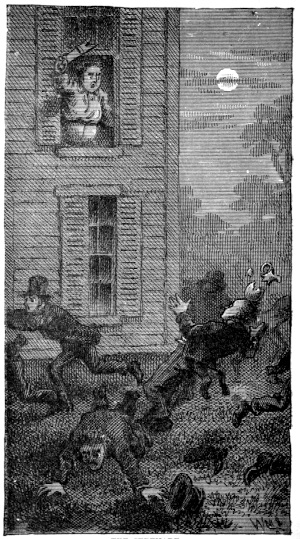
But anyway, whatever was the cause, he bruised up
them old men fearful. Eliab was strong and perseverin’,
and a good calculator, or he never could have
laid up the property he had. Every blow hit jest
where it would hurt the worst. He pelted them old men
perfectly fearful. They had composed a lot of verses—over
20 they say there was of ’em—that they was
a layin’ out to sing to him. They didn’t sing but 3, I
believe, when the first boot hit ’em, but they say they
kep’ on singin’ the next verse, bein’ determined to
mollify him down, till they got so bruised and battered
391up that they had to flee for their very lives. The
verses run like this:
Who did from the Ohio come
To visit round in his old home,
And make the neighbers happy, some?
With melody we him will cheer,
And keep Eliab Gansey here.
Who is this man we love so dear?
If music sweet as can be had
Can sooth thee, make thee blest and glad,
Then never more shalt thou be sad,
I s’pose it was jest at this very minute that the
washbowl flew and struck old Bobbet in the small of
the back, and crumpled him right down; he was sort
o’ bent over the accordeon. They didn’t play the
accordeon all the time they was singin’, as I have been
told, but between the verses; jest after they would sing
“Eliab,” they would play a few notes sort o’ lively.
It was Josiah’s idee, as I heard afterwards, their
takin’ the accordeon. They couldn’t one of ’em play
a tune, or anything that sounded like a tune, but he
insisted it would look more stylish to have some instrument,
and so they took that old accordeon that used to
belong to Shakespeare Bobbet.
They had planned it all out, and had boasted that
392they had got up something in their own heads that
hadn’t never been heerd of in Jonesville. And well
they might say so, well they might.
Wall, there wasn’t one of them 8 old fellers that
was good for anything for the next 4 weeks. Eliab’s
folks try to make the best of it. They say now that
Eliab always did, when he was first rousted up out of
a sound sleep, act kinder lost and crazy. They tell
that now to kind o’ smooth it over, but I think, and I
always shall think, that he knew jest who he was
a hittin’, and what he was a hittin’ ’em with. It was
the glass soap-dish that struck old Dagget’s nose.
And I wish you could have seen that nose for the next
3 weeks. It used to be a Roman, but after that night
it didn’t look much like a Roman.
Eliab’s boots was the very best of leather, and they
had a new-fashioned kind of heels, some sort o’ metal
or other, and Cornelius Cook says they hit as powerful
as any cannon balls would; he goes lame yet. You
know the shin-bone is one of the tenderest bones in
the hull body to be hit aginst.
It was the bootjack that hit the Editor of the
Augur’ses head. His wife was skairt most to death
about him, and she says to me—she had come over to
see if she could get some wormwood—and she says:
“He never will get over that bootjack in the world,
I don’t believe. His head is swelled up as big as two
heads ought to be.”
393And says I: “It always happens so, don’t it, that
the weakest spot is the one that always gets hit?”
I was sorry for her as I could be. And I gin her
the wormwood, and recommended her to use about
half and half smartweed. Says I: “Smartweed is
good for the outside of his head, and if it strikes in it
won’t hurt him none.”
I felt to sympathize with her. Old Sansey hain’t
got over the slop-jar yet. It brought on other complaints
that he was subject to, and the Dr. says he
may get over it, and he may not.
But as bad as it was for all the rest, it was the
worst for Josiah Allen—as bad agin.
It wuzn’t so much the hurt he got that night, though
I thought for quite a spell that it would have to be
operated on, and I didn’t know but it would prove to
be his death-blow. And it wuzn’t so much our sufferin’s
with Miss Moony, though them was fearful, bein’
up with her all that night, and workin’ over her to keep
the breath of life in her, and she a clawin’ at us, and
a ketchin’ holt of us, and a laughin’, and a cryin’.
We had to send for the neighbors, we was that skairt
about her, and Josiah had to go for the doctor right in
the dead of night, with his head a achin’ as if it would
split open.
And it wuzn’t so much the thought of losin’ Eliab and
money, though Josiah was dretfully attached to both,
and he felt the loss of both on ’em more deeply than
tongue can ever tell. But that wuzn’t where the deepest
394piece of iron entered his soul. It was to think his
singin’ had got called so all to nort. He thought he
was such a sweet, dulcet harmonist; he had gloated
and boasted so over his lovely, melodious voice, and
thought he was goin’ to be admired so for it; and
then to think his singin’ had skairt two wimmen most
to death, had skairt one into fits, anyway—for if ever
a woman had a historical fit Tamer Moony had one
that night. And instead of his serenade winnin’
Liab’s love and money, it had disgusted him so that
he had pelted him most to death.
Oh! it was a fearfully humiliatin’ blow to his vanity.
The blow on his forward wasn’t to be compared to the
soreness of the blow onto his vanity, though the
swellin’ on his forward was bigger than a butnut, and
as sore as any bile I ever see.
Yes, I have seen Josiah Allen in tryin’ places, time
and agin, and in places calculated to make a man
meach, but never, never did I see him in a place of
such deep meachin’ness and gloom as he was that night
after he had come home with Doctor Bamber. There
he was, at the very time, the very night, when he had
lotted on bein’ covered with admiration and glory like
a mantilly, there he wuz lookin’, oh, so pitiful and
meek, bowed down by pain, contumily, and water-pitchers.
And he happened to pass by the bed where
Miss Moony lay, and she, bein’ blind with historicks,
laid holt of him, and called him “Mandana.” She
clutched right into his vest, and held him tight, and
says she:
395“Oh Mandana! Oh! them awful voices! Oh! them
horrible, screechin’ yells! I can’t forget ’em,” says
she. “They are ringin’ through my ears yet.”
And then Dr. Bamber and the neighbors knew all
about what it wuz that had skairt her so; there they
stood a laughin’ in their sleeves (as it were). And
Josiah standin’ there, lookin’ as if he must sink. And
there Samantha wuz, who had vainly argued with him,
and entreated him to let well enough alone.
Yes, Josiah Allen was in a hard place, a very hard
place. But he couldn’t get away from her, so he had
to grin and bear it. For he couldn’t onclench her
396hands; she had a sort of a spazzum right there, a
holdin’ him tight. And every time she would come to
a little, she would call him “Mandana,” and yell
about them “awful, blood-curdlin’ screeches.” It was
a curious time—very.
Wall, she got better after a while. Dr. Bamber
give her powerful doses of morpheen, and that quelled
her down.
But morpheen couldn’t quiet down Josiah Allen’s
feelin’s, nor ease the sore spot in his vanity. No! all
the poppies that ever grew in earthly gardens couldn’t
do it. He never will start out a seranadin’ agin, I
don’t believe—never.
I hain’t one to be a twittin’ about things. But sunthin’
happened to bring the subject up the other
mornin’ jest after breakfast, and I says this, I merely
observed this to him:
“Wall, you wanted to make a excitement, Josiah
Allen, and you did make one.”
“Wall, wall! who said I didn’t?”
Says I: “You have most probable done your last
seranadin’.”
I said this in a mild and almost amiable axent, but
you ort to heard how that man yelled up at me.
Says he: “If I was a woman, and couldn’t keep
from talkin’ so dumb aggravatin’, I’d tie my tongue to
my teeth. And if you are a goin’ to skim the milk
for that calf, why don’t you skim it?”
“Wall,” says I mildly, “I hain’t deef.”
399

JUDAS WART AND SUFFERIN’ WIMMIN.
One mornin’, not long after Miss Bobbet’s visit, I
was a doin’ up my mornin’s work. I had been a
little belated, for my companion Josiah, while fodderin’,
had been took in his back sudden and violent
with a stitch.
He is subject to such stitches, but they are very
painful and inconvenient. All the way he could walk
round the house was by leanin’ upon a broom-stick.
He found the broom-handle in the barn, and come in
leanin’ heavy on it, and groanin’ powerful and frequent.
It skairt me awfully.
I never hinted to him that I thought more’n as
likely as not that stitch was sent as a judgment; no, I
held firm, and kep’ my tongue still with almost giant
force. That day, when the sun had rose up clear and
lofty in the heavens, was the time I had calculated to
tackle him. But I was too honorable to tackle a pardner
who was down with a stitch.
No, I treated him well, bathed his back in linament,
400and he was a lyin’ behind the stove on the lounge, as
comfortable as anybody could be in his situation of
back and conscience.
As I said, I was a washin’ up my dishes in the buttery,
when all of
a sudden in walked
Elder Judas
Wart. The door
was open, it bein’
a pleasant mornin’,
and he jest
rapped at the side
of the door, and
walked in.
I guess he
didn’t see Josiah,
the lounge bein’
kinder behind the door; but he seemed dretful tickled to
see me—tickleder fur than I was. Though, havin’ my
mission in view, I used him well, and sot him a chair.
But little did I think what was before me; little did I
think what the awfulness of his first words to me
would be. He hadn’t been in that house five minutes,
for I know I had only jest hung up my dish-cloth (for
knowin’ what a tussle of principle was ahead of me,
and feelin’ as if I should need all my strength in the
conflict, I left the heaviest of my dishes to wash at
noon, for the first time in over fourteen months).
Wall, if you can believe it, jest as I got that dish-cloth
401hung up, that man, with no phraseoligies or excuses
or anything, that man up and says:
“I have heard, and I see for myself, that you are a
very smart woman, and you could do wonders in the
true church if you was married to some leadin’ man,—to
me, for instance,” says he, bold as brass, “or was
sealed to me,” says he, spittin’ hard onto the floor.
But that man hadn’t hardly got that seal and that
tobacco-juice out of his mouth, when Josiah Allen
sprung up and leveled that broom-stick at him with a
deadly aim. I sprung forward and threw the end of
the broom-stick up jest in time to save the Elder’s life.
402I forced him to desist, I and the stitch; for truly the
effort was too much for him. The stitch griped him
awful, and he sunk back with a agonizin’ groan.
I wanted Josiah to stay his hand and the broom-stick
for two reasons. One was, I didn’t want the
Elder killed quite so quick—not till after I had had a
chance to convert him. And another reason was, I
thought of my deep agony and a Widder Bump, and
thinkses I to myself, though the medicine is fearful to
administer, as gaulin’ and bitter as wormwood and
sicuta biled down in tar and vinegar, still I felt it was
what my companion needed to show him the nefariousness
and heniousness of Mormonism, in its true light.
I wouldn’t in his present weakness of mind and
back, throw the Widder Bump in his face, as I might
have done. Some pardners would have jest turned
round on him, as he lay there on that lounge, and
throwed that woman full and square in his face. But
I didn’t. I see he was a sufferin’ enough without
that. He was takin’ the matter to himself like a blister,
as anybody has got to, in order to feel the smart.
A blister don’t draw half so powerful, nor feel half so
bad, when it is on somebody else’es back, as it does
when it is on our’n. He was a meditatin’ how it
would seem to his heart to lose the companion of his
youth and middle age. He was a eatin’ of that sass
which ganders think is quite good for geese to eat.
He was seein’ now how it would relish to a gander. I
403pitied him from the bottom of my heart, his looks was
such.
But Elder Judas Wart had no such feelin’s of pity
and sympathy, and bein’ excited by Josiah’s ragin’
wrath, and maddened by the broom-stick, he spoke out,
in a angry, sarcastical tone:
“Your husband felt different on this subject last
spring. He seemed almost inclined at one time to take
to himself another helpmate. There was a certain
widder, there”—
“You lie, sir!” says Josiah, springin’ up to his feet.
“There wuzn’t no widder there, and I never was there.”
“Never was where?” says I, in a awful voice; for
curiosity and various other emotions was a hunchin’
me, as hard as ever a woman was hunched by ’em.
“I never was anywhere! I never was to their
meetin’s, nor to nowhere else.”
“Where wuz you, then?” says I, in that same
strange voice.
“I told you I wuzn’t nowhere, didn’t I?” he yelled
out in fearful axents.
But Elder Judas Wart went right on a talkin’ to me,
stiddy as fate, and as hard to be turned round as she.
“He seemed then to look at the Widder”—
“I never looked at a widder! I never see none! I
never see a widder in my life!”
Says I: “Josiah Allen, be calm!”
“I tell you I won’t be calm! And I tell you there
hain’t no widders there—nor hain’t never been any—nor
nowhere else—nor I never heard of any.”
404He was delerious, and I see that he was. But Elder
Judas Wart kep’ right on, with a haughty, proud
axent:
“He seemed then to look favorably upon the widder
I have lately espoused. The Widder Bump; don’t you
remember her?”
“No! I don’t remember no such widder, and I don’t
believe there was any by that name.”
“Why,” says I, “Josiah Allen, she made that coat
you have got on. Don’t you remember it?”
“No! I don’t! She didn’t make it! It wuzn’t
made! I never had none.”
“Why, Josiah Allen,” says I, “what will become of
you if you tell such stories?”
“There won’t nothin’ become of me, nor never will;
there never has nothin’ become of me.”
But jest as he said this, the stitch ketched him agin
powerful and strong, and he sunk down on the lounge,
a groanin’ violent.
I see he was delerious with pain of body, and fur
deeper, more agonizin’ pain of mind, contrition, shame,
remorse, and various other emotions.
And then, oh, the strength and power of woman’s
love! As that man lay there, with all his past weakness
and wickedness brought out before me, stricken
with agony, remorse, and stitches, I loved him, and I
pitied him. I felt that devoted, yearnin’, tender feelin’
for him to that extent that I felt in my heart that if it
were possible I could take that stitch upon me, and
405bear it onward myself, and relieve my pardner.
Women’s love is a beautiful thing, a holy thing, but
curious, very.
I reviled my pardner not, but covered him tenderly
up with my old woolen shawl, sot the broomstick up
against the lounge, and he lay there and never said
another word, only at intervals—when a pain of uncommon
size would ketch him in his back or conscience,
he would groan loud and agonizin’. But I see
it was no use to argue with him then about the Widder
Bump.
But if you’ll believe it, I can’t make him to this day
say nothin’ different. I have had a great many talks
with him on the subject, but, he says, “She is a woman
he never see.”
And the nearest I ever made him own up to it was
once when I had talked real good to him, talked to
him about his past wickedness and tottlin’ morals, and
told him how I knew his morals was straightened and
propped up now, good and sound, and his affections
stabled and firm sot where they should be sot. I
talked awful good to him, and he seemed to be sort o’
melted down. And he owned up “that it did seem to
him as if he had heard, when he was a child, of a
woman by that name, that lived somewhere near here.
It was either that name, or Bumper—he couldn’t for
his life tell which.”
And I gin up then. Truly there are strange pages
406in a man’s nater, filled with curious language, curiouser
than conundrums: who can read ’em?
As I said, havin’ the aim in my mind that I did have,
havin’ a desire to let Josiah Allen get a full taste of
that sass that he, as well as other ganders, find is fur
different to eat themselves, and to stand haughtily on
one leg (to foller out the gander simely) and see their
mates eat it. Havin’ a desire to let him get a full
glimpse of the awful depth and blackness and horrer
of the abyss he had suspended himself over, I did not
rebuke Elder Judas Wart as I should, had it not been
for that. I merely told him, when he said sunthin’
agin about my bein’ sealed to him—I merely said to
him, with dignity and firmness:
Says I, “If you say that word seal to me agin, I’ll
seal you in a way you won’t never want to be sealed!”
Says I, in still more awful tones, glancin’ at the bilin’
teakettle, “If you say that word to me agin in my
house, I’ll scald you, if it is the last work I ever do in
my life, and I am hung for it the next minute.”
My face was red; I was fearfully excited with my
almost giant efforts to control myself. To think that
he should dare to approach me! me! Josiah Allen’s
wife! with his infamous offer. He see that my looks
was gettin’ terrible and scareful, and he hastened to
say:
“I meant it in a religious way.”
And I was that excited and mad, that I spoke right
up and says, “Wall! I’ll scald you in a religious way;”
407and I added, in a firm, low tone, “But I’ll bet a cent
you won’t never want to be scalded agin as long as you
live.”
Says he, in a sort of a apologizin’, meachin’ way, “It
is my religion to marry various wives.”
“Wall,” says I, still clingin’ to my simely, as great
oriters always do, “It is my religion to scald you, if
you don’t stop your insultin’ talk instantly and to once!
You can’t talk no such stuff in the house of her who
was once Smith,” says I, glancin’ agin at the teakettle,
and steppin’ up a little nearer to it.
“Be composed, mum,” says he, a hitchin’ up his
408chair a little nearer the door; “Be composed! I was
speakin’ in a strictly religious sense.”
Says I, “You can’t never make me think a crime
can be committed religiously.” And agin I looked
longin’ly at that teakettle.
“Compose yourself down, mum, and let us argue for
a brief spell,” says he.
His tone was sort o’ implorin’ and beseechin’. And
he took a plug of tobacco out of his coat-pocket, and
bit a great chew off’en it, and put it into his mouth,
I s’pose to try to show off and make himself attractive.
But good land! how foolish it was in him. He
didn’t look half so well to me as he did before, and
that hain’t sayin’ but a very little, a very little indeed.
He wadded the tobacco all up on one side of his
mouth, till his cheek stood out some like a wen, and
the tobacco-juice started and run down on each side of
his chin. And so, havin’ fixed himself, I s’pose, so his
looks suited him, he says agin:
“Less argue the subject.”
I see that here was the chance I had wanted to convince
him of his iniquity. I see that Duty was leadin’
a war-horse up in front of me all saddled and bridled,
ready for me to mount and career onward nobly on
the path of Right.
I see that Duty was holdin’ in this charger by the
martingills with one hand, and with the other she was
holdin’ out a pair of spurs to me. And though never,
never, did a war-horse look so prancin’ and dangerous
411to me, and never did spurs look so heavy and sharp
and tejus to my achin’ heels, yet Josiah Allen’s wife
is not one to turn her back to Duty’s call—no, my
desire to battle with the wrong, my martyrous spirit
curbed me in and let me hear him talk.
And he went on to tell me that in the first place he
wanted to lay before me the rise, progress, and glory
of the Mormon Church. Says he, “In the first place,
you know, mum, that God made a distinct revelation
to us. Our bible was found written on plates of gold.
Them plates”—
I am naturally very well-bread. And thinkin’ mebby
it would influence him towards the right, I didn’t lay
out to interrupt him, or disturb his arguments, till he
had got through presentin’ of ’em. But the idee of
such imposture—imposture in the name of God—so
worked on me, that I spoke right out, in a firm, dignified
tone, but very solemn:
“Elder Judas Wart, you jest pass them plates.”
Says he: “Why should I pass ’em? The revelation
of God is written on ’em.”
“Revelation!” says I. “I should jest as soon go
into my buttery, and read my meat plates and platters,
as to read ’em. I should find jest as much of a revelation
on ’em.” And agin I says, with dignity: “You
pass them plates.”
Says he: “I wont pass ’em.” And he begun agin,
in a sort of a boastin’ way: “September 22, 1827, the
412angel Moroni placed in Joseph Smith’s hand our Mormon
bible, or that is, the plates, that”—
Says I: “Hain’t I told you to pass them plates?
Your bible is a romance writ by Solomon Spaulding
jest for fun, jest to see how near he could write like
the bible. And it is a powerful lesson to me, and
should be to everybody, of the terrible harvest that
may spring up from one careless, thoughtless deed.
The awful consequences, the sin, and the woe that followed
that one irreverent, thoughtless act might well
make us all more thoughtful, more mindful of the terrible
responsibility that follows all our acts, the smallest
as well as the greatest. We can’t shake off that
personal responsibility. It follers us tight as our
shadders even into our hours of recreation, showin’ us
that we should not only work nobly, but recreate nobly
and innocently and reverently.”
“But,” says he “them plates”—
But I was so rousted up with my emotions, that I
waved out my right hand with awful dignity, and says
I:
“You shall pass them plates.”
And I held firm, and made him pass ’em. And he
went to bringin’ up the miracles that had been done
by the early church—curing the lame and deaf, healing
the sick, and et cetery, and so forth. Says he: “I
have heard that you are a woman that loves reason and
fair play,” and says he, “you can’t get over those miracles,
can you?”
413Says I candidly: “I don’t want to get over no miracles,
and hain’t tried to. But I can say with the poet,
that so far as believin’ of ’em is concerned, miracles is
sunthin’ I had rather see done myself than to hear of
’em. Howsumever, I hain’t a goin’ to say that you
hain’t done ’em. As to healin’ the sick, the wonderful
power and magnetism one strong mind can exert over
a weaker one, when the weaker one has perfect faith
in it, has a great many times performed deeds that
looked miracilas, out of the Mormon church, and most
probable in it. But even if you have raised the dead,
which I don’t think you claim you have done, it would
make me no more a believer in mormonism; for we
read of a woman not religious, who did that. And I
never hankered after keepin’ company with Miss Endor,
or wanted to neighbor with her, or appear like her.”
“You are unreasonable, mum,” says he.
“I don’t mean to be,” says I. “I have allowed all
you want me to, and more too. What more can you
want?”
“You deride our holy church. Our church foundered
on the Commandments of God.”
“Which one?” says I enquirin’ly.
“Which one?” says he haughtily. “Every one of
’em; every one of ’em.”
“Wall,” says I calmly and reasonably, but with
quite a lot of dignity, “we’ll see.” And I was risin’
up to go and get the Bible offen the stand, for I was
determined he should see ’em in black and white, when
he spoke out haughtily and proudly:
414“Keep your seat, mum; keep your seat. I have the
Bible here in my breast pocket. Our church bein’
foundered on the Commandments, leanin’ up aginst
’em as we do for all our strength and safety, I don’t
depend on Bibles layin’ round loose on stands, and so
forth. I carry a copy all the time right over my heart,
or pretty near over it—on the left side of my vest,
anyway.”
Says I: “There is different ways of carryin’ things
in the heart. But that is a deep subject, and I will
not begin to episode upon it, for if I should begin, no
knowin’ how fur I should episode to, but will merely
say that there is other ways of carryin’ things in your
heart besides carryin’ ’em in your vest pocket. But
howsumever, read off the first one.” And he read it:
“Thou shalt have no other Gods before me.”
He read it off jest like a text. And the minute he
stopped I begun to talk on it a good deal like preachin’,
only shorter; but with jest about the same dignity and
mean that preachers have.
Says I, in that firm, preachin’ tone: “You have
made Brigham Young a God. Your preacher, whom
you call a ‘model saint,’ openly avowed that he was
God. You have pretended to believe, and have taught
to the people his blasphemus doctrine that he had
power to save souls in the heavenly kingdom, or to
shut ’em out of it.” Says I: “I could spread out this
awful idee, and cover hours with it, and then not make
it very thin, either; there is so much that could be
415said on the awfulness of it. But I have got nine more
jobs jest like it ahead on me to tackle, so enough, and
suffice it to say, fetch on your next one.
He was goin’ to branch out and say sunthin’, but I
held to my first idee, and wouldn’t let him. I told
him if I argued with him at all, he had got to read
those Commandments off jest like texts, and let me
preach on ’em. I told him after I had got through
with ’em, then he could rise up and explain his mind,
and talk; but jest at present it was the commands of
God I wanted to hear—not the words of Elder Judas
Wart. And I held firm, and made him. And when
he would begin to argue I would call for another one,
and kep’ him at it.
“Thou shalt not make unto thee any graven image
* * * * thou shalt not bow down to them, nor
serve them”—
Says I: “You have done that and worse. You have
worshipped and revered an image of clay—rather weak
clay, too, though held up by a mighty will and ambition.
Why, most anybody would say that a graven
image would be sounder than he was—more sort o’
solid and substantial. Anyway, it wouldn’t wobble
round as he wobbled, preachin’ one thing to-day, and
denyin’ it to-morrow, jest as his own interests dictated.
And the graven image wouldn’t have been so selfish
and graspin’ and unscrupulus. It would have been
fur honester, and wouldn’t have wanted more’n a hundred
wives. But that image of clay, such as it was,
you sot up and worshipped, and you needn’t deny it.”
416He didn’t try to. He knew it wouldn’t be no use to,
and says he:
“Thou shalt not take the name of the Lord thy God
in vain.”
Says I, in a firm, awful axent, “You have taken it
in vain, the weakest kind of vanity, and you have
taken it wickedly, the wickedest kind of wickedness,
in darin’ to commit this sin in the name of God.”
Says he, “Remember the Sabbath day to keep it
holy.”
Says I, “You have kept it holy, by teachin’ this
unholy sin. By assemblin’ at the tabernacle to listen
to words so low, and vulgar, and weak that they would
be contemptible, if they were not so wicked and blasphemous.”
Says he, “Honor thy father and thy mother.” He
spoke up awful quick and some haughty. He felt
what I had said, I knew it by his mean, and he seemed
to read this with a air as if this was sunthin’ he could
lean aginst hard, and nobody could hender its bein’ a
support to him. He looked sort o’ independent and
overbearin’ at me as he finished readin’ it, and he spit
on the floor in a sort of a proud way.
But I went right on, in a deep and impressive axent,
and says I, “You have made that commandment impossible
for your children to follow. You have wickedly
deprived your children of one of the holiest and
most sacred things in life. A child’s right to honor
the parents they love, and feel it their duty to reverence.
417But how can anybody, unless he is a fool or a
luny, honor what hain’t honorable? How can a child
honor a parent whose hands are stained with innocent
blood, who is enriched by theft and rapine, who is
living in open
shame—in open
defiance to the
commonest rules
of morality—who
breaks all the
commandments of God, and calls it religion?”
Says he, “Thou shalt not kill.”
Says I, “The teachers of your religion say, Thou
shalt kill, if it is for the safety and enrichment of the
Mormon church. And, following their commands
instead of God’s, you killed one hundred and 20 innocent
418men, wimmen, and children in one day. And how
many other murders have been committed by orders
of your church, in those lonely deserts and mountain
roads and canyons, will never be known till the
searchin’ light of the great day of doom reveals all
secret things. Why,” says I, “Brigham Young taught
that Mormons should shed each other’s blood for the
remission of sins.”
He looked meachin’, very. He didn’t try to argue
on this—he couldn’t, for he knew I could prove what I
had said. And he looked meachiner yet, as he read
the next one:
“Thou shalt not commit adultery.”
Says I, “The hull Mormon church is built up on the
ruins of this broken commandment, and you know it.
And you teach this doctrine, that the more pieces you
break this commandment into, the higher it is goin’ to
boost you up into heaven. The meaner and lower you
be on earth, the higher place you will have in the
heavenly kingdom—”
Says he, interruptin’ of me with a look of fearful
meach restin’ on his eyebrow, and speakin’ up dretful
quick:
“Thou shalt not steal.”
Says I, “Your church teaches, ‘thou shalt steal.’
And you have to do it too, and you know it.”
Says he, “Thou shalt not bear false witness against
thy neighber.”
Says I, “Ask the unhappy Gentiles who have incurred
419the displeasure or aroused the cupidity of the
Mormon church, whether the Mormon commandment,
‘Thou shalt bear false witness against thy neighber,’
has not been followed, and followed, too, to the death.”
“Thou shalt not covet”—and he said over the hull
on ’em—wife, property, and maidservant.
Says I, “Your church teaches thou shalt covet ’em,
every one of ’em, and get ’em, too, the hull on ’em—wife,
property, and maidservant, ’specially the maidservant.”
He quailed. And right there, while he was a quailin’,
I spoke, and says coldly:
“Now, Elder Judas Wart, you have read off the
commandments of God, one by one, and I have
preached on ’em; now tell me, and tell me plain,
which one do you lean on the hardest?”
Says he, “As it were—that is, you know—”
“No!” says I, with dignity, “I don’t know, nor you
don’t, nuther.”
Says he, “I—that is—you—you are unreasonable,
mum.” And he looked curious, and spit fiercely onto
the stone hearth and the floor.
“I don’t mean to be,” says I. “I sot out in this
talk with principles as hefty as I ever hefted in my life,
and if I hain’t a good judge of the common heft of
principles, nobody ever was. Why,” says I, “the
rights and wrongs of my sect has for years been held
nearer to my heart than any earthly object, exceptin’
my Josiah. And I can tell you, and tell you plain,
420that I have laid awake nights a thinkin’ over what my
sect has endured a settin’ under that Mormon church.
And daytimes I have sot a knittin’ and thought of the
agonies of them female wimmen till there wuzn’t a
dry eye in my head, and I couldn’t tell for my life
whether I was a seamin’ or a knittin’ plain, or what
I was a doin’. For of all the sufferin’s my sect has
suffered from the hands of man, this doctrine of
polygamy is the very crown, the crown of thorns.
Other wrongs and woes have spilte earth for her time
and agin, but this destroys her hope of heaven. When
other sorrows and wrongs broke her heart, killed her,
she could still look to the time when she could take the
hand of Death, the Healer, and he would lead her into
Repose, give her the peace earth had denied her. She
could think that all her burdens of sorrows and wrongs
would drop from her into the grave; and in that land
where all tears are wiped away—that land of eternal
beauty—of sweet consolation for the weary—she could
find rest. But this last hope of the broken-hearted,
your accursed doctrine has destroyed. Your infamous
belief teaches that if a woman won’t do wrong, won’t
submit to man’s tyrannical will on earth, commit sin
for his sake, he won’t let her go to heaven! Good
land!” says I, “it makes me sweat to think on’t.”
And I wiped my forward on my apron.
Says he: “As it were, you know.”
“No, I don’t know it,” says I warmly. “Nor I
never shall know it.”
421Says he: “And so forth, and so on.”
He acted embarassed and skairt, and well he might.
Why, the abomination of their doctrine is so abominable,
that when it is presented to ’em in a eloquent, high-toned
way by a woman who talks but little, but that
little earnest and deep; when she places it before ’em
in the axent she always handles when talkin’ on principle,
and with the soarin’, deep look of her spectacles
she always uses on them occasions—why, it is enough
to skair anybody to death.
But in a moment or so he sort o’ rousted up, and
says he:
“If you think so much of female wimmen as you say
you do, I should think you would think about what the
position of these plural wives would be if polygimy
were abolished. What would they be thought of?
What would they be?”
Says I, in awful tones: “What be they now?”
“Wall,” says he, “if they should be divorced they
wouldn’t be looked upon as they are now.”
“No,” says I, “that is very true; they wouldn’t, not
at all, not by me.”
Says he: “They would be looked down upon more.”
Says I, with dignity: “Stoppin’ sinnin’ hadn’t ort
to make anybody thought less on,” says I. “That“That
hain’t accordin’ to my creed or my skripter.”
Says he: “If they was divorced their situation
would be very painful and humiliatin’.”
Says I, very dryly: “It is now, in my estimation.”
422Says he: “Look at the position of the childern of
these unions, that would be left fatherless. What a
sad scene it would be; helpless infancy made a mark
for contumely and sneers; babyhood blamed, scorned.”
Says I: “They wouldn’t be scorned, not by anybody
whose scorn would be worth havin’. Nobody but a
fool or a luny is in the habit of blamin’ folks for
doin’ what they can’t help doin’, and bein’ what they
can’t help bein’. Blame the childern! Why, good
land!” says I, “I should jest as soon set out and scold
a mornin’-glory or a white violet for the looks of the
ground they sprung from. God’s own purity is writ
in the clear eyes of babyhood, and in the blue heart of
them mornin’-glories. Blossoms of light, mornin’-glories,
springin’, God knows how or why, out of the
black mould, out of darkness and decay. Who could
look scoffin’ly or irreverently on ’em, or on them other
blossoms of innocence, springin’ as mysteriously from
as dark a soil, and touched by the hand of God with
as pure and divine a beauty.”
“Unpractical, unpractical female, led away as females
ever are by sympathies and views of right and
wrong. Oh! thank Heaven! thank Heaven! such
dangerous qualities are not incorporated into politics.
I should tremble for the nation if it were so.”
And agin he looked fiercely at the stove-hearth.
“Unpractical female, what would become of the
childern left, as it were, fatherless?”
Says I: “If the parents of the childern are rich
423enough, let ’em support ’em; and the poor ones—I
know a man who will adopt the hull lot, and be glad
of the chance,” says I proudly. “It is a uncle of mine,
a uncle I am proud to own. Samuel is his name, and
nobility and generosity is his nater.” Says I: “Let
these childern and the wimmen, if necessary, be took
care of by the government, and let the evil end with
this generation.”
“But what would the position of these wimmen be
in society; what would they be?”
“What be they now?” says I agin. And I snapped
out that “now” considerable snappish, for I was gettin’
a good deal wore out with him. Says I: “You seem
to think it would be the death-blow to their reputation
to stop sinnin’, stop livin’ in wickedness; but there is
where you and I differ. I should think as much agin
of ’em.”
And says I: “If a evil is a goin’ to stop, it has got
to begin to stop sometime, or else it won’t never get
stopped. More of these unholy unions have taken
place durin’ the past year than ever before in the same
length of time. Powerful efforts are bein’ made to
strengthen and extend the power of the system. And
it must either be stopped, or else go on widening and
spreading, and destroying this beautiful new world as it
destroyed so many other strong, proud nations that were
glorious in the past.” Says I: “Can I set still and
see it go on, and can Josiah set still, and other female
424pardners, and other Josiahs, and not long to lift a hand
to turn back this flood of woe and desolation?”
Here Josiah groaned aloud. He had his thoughts
there on that lounge, though he lay middlin’ still. His
thoughts goared him worse than that stitch did, ten
times over. And I felt sorry for him, my feelin’s for
him are such; and I brought his name in in a friendly
way, just because my love for him was so strong, and
I forgive him so.
Says I: “Elder Judas Wart, I won’t take you back
to the old Jewish nations, round by Italy, Spain, and
other roundabout ways, as I might do, and as some
wimmen who are more talkative than I be probable
would, and show you all the way the ruins of the
nations ruined by this crime of polygimy. But I am
a woman who says but little, but that little I mean, and
I will merely hold up Turkey before you. And while
I am holdin’ up that Turkey, I will merely mention the
fact to you, that you and everybody else knows, and
that Turkey knows it well, and if it should speak up
and own the truth it would say that it was the effects
of this system that made it so weak and impotent.
Weaker as a nation than our old turkey-gobbler; fur
weaker than a hen-turkey. (I make use of the gobbler
as a poetical metafor, and would wish to be so understood.)
“Will not America and Josiahs heed these warnin’s?”
says I, lookin’ right up at the ceilin’, in a
rapped way. “Will they not listen to the voice of
425doom that rises from the ruins of other nations,
glorious and proud and strong in the past, that has
crumbled into ashes from the effects of this sin? Will
they not,” I went on in a still more rapped, eloquent
way, “will they not bend down their ears and hear the
wail of warnin’ that seems to float along over the dust
of the desert from old Babylon herself, warnin’ to this
new, fresh, western world to escape this enervatin’,
destroyin’ sin, and escape her doom? Will not America
and Josiahs take warnin’warnin’ by the fate of these
nations? or will they go on in careless merriment and
feastin’, unheedin’ those terrible words ‘mean! mean!’
writ up in the blue vault above, till it is too late; till
the land is given to the enimy; till weakness, ruin, and
decay take the septer from Columbia’s tremblin’,
shakin’ grasp, and rain over this once strong, lovely
land.”
I sithed, I almost wept—I was so fearfully agitated—and
says I: “If this threat’nin’ doom that threatens
our beloved land is to be averted, if this evil is to be
stopped, when is there a better time than the present
to stop it in, now,” says I, wipin’ my eyes on my
apron, “now, while America has got me to help her?”
And agin I sithed, and agin I almost shed tears, and
wept.
He see my agitation, and took advantage of it. Says
he: “You seem to be tender-hearted, Josiah Allen’s
wife, and to have a great affection for the female sect,
and yet you don’t seem to think of the hearts that
426would be wrung by the agony of seperation. Why,”
says he, “if they should part with their companions,
they would be unhappy.”
Says I, lookin’ out of the open window, fur away
over the tree-tops, over the blue lake beyond—and
beyond—
My spectacles seemed to look very fur off. They
had a very deep and sort o’ soarin’ look to ’em, somewhat
happy, and somewhat sorrowful and solemn.
And says I:
“I don’t know as there has any law ever been made,
in Heaven or on earth, that we had got to be happy.
There is a law made that we should do right, should
not do evil, but not that we must be happy. Why,
some paths we have to foller lead right away from happiness.”happiness.”
And says I, still lookin’ fur off, in that same
sort of a solemn, deep way:
“That path always leads to something better, more
beautiful, more divine.”
“What can be better than happiness?” says he, in
a enquirin’ way.
“Blessedness!” says I. “The two hain’t to be compared
no more than a flower growin’ out of earthly
soil is to be compared to one springin’ up in the valleys
of God. One is lit with earth’s sun, and the other is
shinin’ with Heaven’s own light. One is mortal, the
other immortal.”
Says he, still follerin’ up his old theme, still tryin’
to head me off in some way:
427“Wouldn’t you be sorry for these females, Josiah
Allen’s wife?”
Says I firmly: “If they suffered from the wrenchin’
away of old ties, I should be sorry for ’em to that
extent that there wouldn’t be a sithe left in my breast,
nor a dry eye in my head. At the same time, if they
made the sacrifice willin’ly, from a sense of duty, for
the ransom of their people, for the deliverance of the
land from peril, my very soul would kneel in reverence
to them, and they should be honored by all as those
who come out of great tribulations.
“But,” says I, in a slower, more thoughtful way,
“there is different kinds of tribulations. And you can
look at subjects with the sentimental eye of your
specks, and then agin you can turn the other eye onto
’em. And in lookin’ through that other eye at ’em,
you might possibly see that the married life of these
plural wives is wretched—full of jealousies, divisions,
and sizms.
“Woman’s love, when it has room to grow, is a tremendous
thing to spread itself. But (still lookin’
through that common sense eye of our specks) we
would say that the divine plant of love can’t grow so
thrifty in one-twentieth part of a man’s heart as it
could in a more expanded and roomy place. We
would say (still lookin’ through that eye) that it was
too cramped a spot—some like growin’ a oak in a bottle.
You can make it sprout; but there can’t be so
deep roots nor so strong a strength to it, and it
428wouldn’t take nigh so much of a pull to wrench it up
by the roots.
“And so, to foller up the simely, as simelys ort to
be follered, we would think that the first wife is the
one who would suffer most; she who thought she was
marryin’ a hull man, who dwelt for awhile in a hull
heart, and whose affections, therefore, had naturally
took deep root, and spread themselves. We would say
(still lookin’ through that eye of the speck, and still
follerin’ up simelys) that she is the one who would be
most wrung with agony.”
“Wall,” says Elder Judas Wart, seemin’ly ketchin’
holt of the first argument that presented itself in front
of his mind, for truly he didn’t seem to care how
crooked his argument was, nor how wobblin’. Says
he:
“Sufferin’ is a divine agent to draw souls heavenward.”
“Yes, heaven-sent sufferin’,” says I, “will draw our
hearts up nearer to the heavenly home it come from.
But when sufferin’ comes up from below, from another
place, scented with brimstone, and loaded with iniquity,
it will do its best to draw us down to it where it come
from.”
“Pain sometimes teaches divine lessons,” says Elder
Judas Wart. And I never see a mouth puckered and
twisted down into a more hypocritical pucker than
hisen was.
Says I: “Don’t you s’pose I know that?” And
429then I went on awful eloquent, and grew eloquenter
and eloquenter all the time for as much as five minutes
or more, entirely unbeknown to me, not thinkin’
who was there, or who I was a talkin’ to, or where, or
when:
“Don’t I know,” says I, “that no soul has reached
its full might, no soul has ever really lived, till it has
learned to bless God for the divine ministry of sorrow?
Don’t I certainly know that of all God’s angels the
one who brings us divinest gifts is the blessed angel
of Pain?”
And I went on again, in that fearfully eloquent way
of mine, when I get entirely rousted up in eloquence,
and know not where I am, or who is hearin’ of me, or
why, or which:
“If we bar this angel from our door, resist her gentle
voice pleadin’ at our heart, woe be to us; for she
can come as a avenger, a destroyer. But if we greet
her as indeed a heavenly visitant, believe that God sent
her, hold her in our weak arms close to our hearts, she
gives us divinest strength.
“Though we turn away, and fear her greeting, we
find that the touch of her lips on our burning brow
leaves calm. She lays on our throbbing, aching hearts
soft hands of peace. Her eyes have a sorry look for
us, that make our tears flow, and then we see that
those sad, sweet eyes are looking up from earth to
where our own, tear-blinded, are fain to follow—up
beyond the vail, into that beautiful city where our
treasures and our hopes are.
430
To no other angel has God given the power to so
reveal to us the glory and the mystery of life and
of death. No other
hand but hers has
such power to unlock
the very doors of heaven
and send down
into our hearts heaven’s
peace and glory.
Don’t I know this? don’t I know that in the hour of
our bitterest sorrow, our deepest affliction, when the
431one that made our world lies silent before us, deaf for
the first time to our tears and our sorrow; when all
the world looks black and desolate, and hatred and
envy and malice seem to surround us, and our human
strength is gone, and human help is vain; don’t I
know that this divine angel of Pain opens the very
doors of Heaven, and lets down a perfect flood of glory
into our soul—not happiness, but blessedness.
“Yes, the crosses this angel brings us from a lovin’
Father we will bear in God’s name. But,” says I,
firmly, “other folks must do as they are a mind to;
but I never will, not if I know it, bend my back, and
let old Belzebub lay one of his crosses acrost my
shoulder-blades. No, I will throw off that cross, and
stamp onto it. And this cross of Mormonism is one
of hisen, if he ever had one. It is made out of Belzebub’s
own timber, nailed together by man’s selfishness
and brutality and cruelty, the very worst part of his
nature. It is one of the very heaviest crosses ever
tackled by wimmen, and bore along by ’em, wet with
their blood and sweat and tears. And Samantha will
do her best to stamp onto ’em, every one of ’em, and
break ’em up into kindlin’-wood, and build fires with
’em to burn up this putryfyin’ crime of polygimy, root
and branch; make a cleansin’ blaze of it to try to
purify God’s sweet air it has defiled.”
“Oh!” says Elder Judas Wart, with a low deep
groan, “oh! how unpractical females always are.
Females are carried away by their sympathies and
432religious feelings and sense of right and duty, making
them a most dangerous element in politics, a very
striking and unwholesome contrast to the present
admirable system of government, if they were ever
incorporated into the body politic; in short, if they
ever vote. Let us look on the subject in a practical
light.”
And I was so beat out by my eloquent emotions
(such emotions are beautiful to have by you, but
fatiguin’ to handle, as I handle ’em, and I can’t deny
it); and bein’ also almost completely out of wind, I sot
still, and let him go on.
And he talked, I should judge, well on to a quarter
of a hour about Communism, Socialism, its principles,
its rise, and progress; and I let him go on, and didn’t
hardly say a word, only I would merely throw in little
observations occasionally, such as, when he argued
that everybody should own the same amount of property,
and there should be no rich and no poor.
I merely threw in this question to him: Whether he
thought shiftlessness and laziness should have the
same reward as industry and frugality?
And when he was a goin’ on about everybody bein’
educated the same so one could not be intellectually
superior to the other, I simply asked him whether he
thought Nature was a Socialist.
Says he: “Why?”
“Oh!” says I, “I was a thinkin’ if she was one,
she didn’t live up to her belief. She didn’t equalize
brains and thrift and economy.”
433“Wall, as I was a sayin’” says he, “as it were, you
know”—
“No,” says I, coldly, “I don’t know it, nor I never
did. I know,” says I, lookin’ keen at him, “that some
are born almost fools, and keep on so; and some,”
says I, with a sort of modest, becomin’ look, “some
are very smart.”
He kep’ perfectly still for a minute, or mebby a
minute and a ½. he seemed to collect his strength
agin, and broke out, in a loud, haughty tone:
“The fault of our old civilization is that property is
controlled by the few. How can a man have the same
love for his home, for his hearth-stone, if he works the
land of some great landed proprietor? In case of war,
now, foreign invasion, if each man owned property of
his own, if each man was a Mormon, in fact, he would
be fighting for his own interest; not for the interest of
some great landed lord. He would be fightin’ for his
own hearth-stone; the sacred and holy hearth-stone.”
Says I, in reasonable axents: “I hain’t a word to
aginst the sacredness of the hearth-stun. I hain’t a
word to say aginst the stun. But wouldn’t it be apt to
take off a little of the sacredness of the stun to have
thirty or forty wimmen a settin’ on it; each claimin’ it
as her own stun? Wouldn’t it have to be a pretty large
stun, and a pretty firm one, to stand the gusts and whirlwinds
of temper that would be raised round it? And
to tell the plain truth, Elder Judas Wart, don’t you
believe that every man that owned such a stun, and 30
434or 40 wimmen a settin’ on it, and childern accordin’ly,
don’t you believe that such a man instead of discouragin’
war would do all in his power to welcome and
encourage it, so he could go forth into the battle-field,
and find a little peace and repose; that is, if he was a
gentle, amiable man, who loved quiet?”
He never said one word in answer to this deep argument,
he see it was too deep and sound for him to
grapple with; but he kep’ right on, and says, thinkin’
mebby it would skair me, says he:
“Our order was founded by Thalos of Chalcedon.”
“Wall,” says I, “Mr. Thalos is a man that I hain’t
no acquaintance with,—I, nor Josiah; so I can’t form
any opinion what sort of a character he has got, or
what for a man he would be to neighbor with.”
Says he, in a still prouder and haughtier way:
“Plato believed in it.”
“How do you know?” says I. “He never told me
that he did. If he had, I should have argued sound
with him.” And says I, lookin’ keen and searchin’ at
him:
“Did he tell you that he believed in it?” says I.
“You can hear most anything.”
“Why, no,” says he, “he didn’t tell me. He died
twenty-two hundred years ago.”
“Wall,” says I, coolly, “I thought you got it by
hearsay. I didn’t believe you got it from the old
gentleman himself, or from any of his relations. I
remember Mr. Plato myself, now. I have heard
435Thomas J. read about him frequent. A sort of a
schoolmaster, I believe—a man that travelled a good
deal—and had considerable of a noble mean. If I
remember right, I have seen him myself on a bust.
But as I was a sayin’, s’posen Mr. Plato did believe in
it. Don’t you s’pose that old gentleman had his faults?
He was a nice old man, and very smart. His writings
are truly beautiful and inspirin’.
“Why some of his dialogues are almost as keen and
sensible and flowery as them that have taken place
between a certain woman that I won’t mention the
name of, and her pardner Josiah. Why, jest the fact
that he got sold once for talkin’ so plain in the cause
of Right, endeared him to me. And the fact that he
didn’t fetch only twenty minnys (and we all know
what small fish they be) didn’t make him seem any
the less valuable to me. No, not at all so; it wouldn’t,
if he hadn’t fetched more than one little chub.
“Them views of his’en, them witherin’ idees aginst
tyrany that he was preachin’ to a tyrent, whales
couldn’t lug, nor sharks. They was too big and hefty
to be bought or sold. But because Mr. Plato was all
right in some things, we mustn’t think he was in all.
We are apt to think so, and we are apt to think that
that because a gulf of a thousand or two years lay
between us and a certain person, that it seperates them
from all our mortal errors and simplicities.
“But it hain’t so. That old man had other human
weaknesses besides writin’ poetry. I persume Miss
436Plato had to deal real severe with him lots of times,
jest as I do with Josiah. I dare persume to say she
had hard work to get along with him more’n half the
time. And if he believed in Mormonism,
he believed in sunthin’
wicked and abominable, and if I
had been on intimate terms with him and her, I should
have talked to him like a sister, right before her, so she
would feel all right about it, and not get oneasy and
jealous. I should have talked powerful to him, and if
he is the man I take him to be, I could have convinced
him in ten minutes, I know I could.”
437“Wall,” says he, “bringin’ the history of our church
down to Christ’s day: He was a believer in it.”
I riz right up in a awful dignity and power, and I
says, in a tone that was fearful to hear, it was so
burnin’ indignant:
“You say that agin in my house, if you dare.”
He dassent, my tone was such. He never said a
word, but sot kinder scroochin’ and meachin’ on his
chair, and I went on, resumin’ my seat agin, knowin’
as I did that my principles was so hefty I had better
save myself all the extra weariness that I could.
Says I:
“You dare to say that He, the Deliverer of His
people from sin and evil—He, the Teacher of all
purity, morality, honesty, and all Christian virtues,
who came bringin’ peace on earth, good will to men—He,
who taught that a man should have one wife,
and be tender and constant to her, even as He loved
the Church and gave Himself for it—He, whose life
was so pure and self-denyin’ and holy that it brought
the divine down to the comprehension of the human—the
love and purity of God manifest in the flesh—how
dare you tell me that He was a Mormon?”
He dassent say it agin. He dast as well die as to
say it. I s’pose, in fact I know, from my feelin’s
which I was a feelin’, that my mean was awfuler and
more majesticker than it had been for years and years.
Says he, “As it were—” and then he stopped short
off, seemin’ly to collect his thoughts together, and then
438he kinder coughed, and begun agin— “And so forth,
and so on,” says he. He acted fairly afraid. And I
don’t wonder at it a mite. My looks must have been
awful, and witherin’ in the extreme.
But finally he says, “We read of this sect in the
Bible, anyway. The Essenes was Mormons, or sort o’
Mormony,” says he, glancin’ at me and then at the
teakettle, in a sort of a fearful way.
But says I, coldly, “We read in the Bible of droves
of swine that was full of evil spirits; and we read in
it of lunaticks, and barren fig-trees, and Judas, and
the—the David—callin’ him David, as a Methodist and
member of the meetin’-house, who does not want to
say Satan if she can possibly help it.
“Now,” says I, “you have brought up every commandment
of God, and I have preached on ’em, and
you find every one of ’em is aginst you—the old law,
and the divine new law made manifest in Christ.
Now,” says I, coolly, leanin’ back in my chair, full of
martyrdom and eloquence and victory and everything,
“bring on your next argument, bring it right here, and
let me lay holt of it, and vanquish it, and overthrow
it”
“Wall,” says he, “I hold that the perfect faith that
thousands have in our religion and its founder, is one
of the very strongest proofs of its divine origin.”
“I don’t think so,” says I. “Faith is the substance
of things hoped for, but things don’t always turn out
to be what you hoped they was. Now, there is hash,
439for instance: and in order to enjoy hash, you have got
to have perfect confidence in it and its maker. But
still you may have that perfect confidence in it, and
eat it in faith, believin’ it is good beef and pork, while
at the same time there may be ingredients in it that
you know not of, such as Skotch snuff, lily white, hairpins,
and etcetery. Hash is a great mystery, and often
deceivin’ to the partaker, no matter how strong his
faith in it may be.
“And I might foller up this strikin’ simely of hash
into other eloquent metafors, such as pills, preachin’,
wimmen’s complexion, and etcetery. Some is good
and true, and some hain’t good and true, but they all
find somebody to believe in ’em.
“This is a very deep subject, and solemn, if handled
solemnly. I have handled it only in a light parable
way, showin’ that them that do honestly believe in this
Mormon doctrine, if there are any, are partakin’ (unbeknown
to them) of a hash that is full of abomination
and uncleanness, full of humiliation, sorrow, and
degradation. Oh!” says I, fallin’ back on the side of
the subject nearest to my heart, “when I think of the
woes of my sect there in Utah, I feel feelin’s that never
can be told or sung. No, there never could be a tune
made mournful and solemn enough to sing ’em in.”
Says he, bold as brass, and not thinkin’ how he was
a wobblin’ round in his argument, “They enjoy it.”
Says I, firm as Bunker Hill, and as lofty, “They
don’t enjoy it.”
440Says he, “They do.”
Says I, “Elder Judas Wart, you tell me that agin,
and I’ll know the reason why.”
“Why,” says he, “they have petitioned Congress to
not meddle with the laws.”
Says I, “Can you tell me, Elder Judas Wart, can
you tell me honestly that there wasn’t man’s influence
lookin’ right out of that petition?”
“No, mum, there wuzn’t. They done it of their
own wills and acords.”
Says I, firmly, “I don’t believe it. And if I did, it
would only show to me the blightin’, corruptin’, influence
of your belief.”
“Why,” says he, “some of our wimmen are the
most active in our church—full of religious zeal.”
Says I, coolly, “All kinds of zeal hain’t religious
zeal.” Says I, “The kind that makes a mother throw
her child into the Ganges, and burn herself with the
dead body of her husband—you can call it religious
zeal, if you want to, but I call it fanatical frenzy.”
Says he, “They are perfectly happy in their belief.”
Says I, “You needn’t never say that agin to me,
thinkin’ I will believe it, for before Mormonism was
ever made, human nature was made, wimmen’s hearts
was made. And when you show me a man who would
enjoy havin’ his right hand cut off, or his eyes plucked
out of his head, then I will show you a woman, a
womanly woman, who enjoys sharin’ the love of the
man she worships—enjoys seein’ it passin’ away from
441her, given to another. Why, it is aginst nater, as
much as it is for the sun to shine at midnight.
Blackness and despair
and gloom is
what rains when the
sun of love is gone
down—it’s nater,
and can’t be helped,
no more than
the sun can, or the
moon, or anything.
No woman ever enjoyed
this wretched
doctrine—that is, no
442good woman, no pure, tender-hearted, affectionate
woman.”
“Why,” says he, “I s’posed you thought all wimmen
was perfect.”
“No, I don’t, sir, no sir. A woman can lose all
that is sweet and lovely in her nature—all the traits
that make her so attractive, her tenderness, her affection,
her constancy, her modesty, her purity. She can
get very low down in the scale of being, lower, I think,
than a man can get. You know the further up any one
is, the worse it hurts ’em to fall.
“Now the angels that fell down from heaven, I
s’pose it changed ’em, and disfigured ’em, and spilte
’em as bad agin as it would to fall down suller.
Josiah fell a week ago last Wednesday night, with a
hammer in one hand, and a box of nails in the other.
He was fixin’ up a cupboard for me in the sullerway.
He fell flat down and lay his hull length on the suller
bottom. Skairt me awfully. Skairt him, too, and
sort o’ madded him, as it always will a man when they
fall. I was gettin’ the supper onto the table, and I
started on the run for the suller door, and says I, in
agitated axents, and weak as a cat with my emotions:
“Did it hurt you, Josiah?”
Says he, sort o’ surly, “It didn’t do me any good.”
But he got up, and was all right the next day.
I have used this poetical simely, of its hurtin’ anybody
worse to fall down from such a lofty height than to
fall down the sullerway, to show my meanin’ that a
443pure woman’s nature is naturally very pure and lofty,
and if she loses it she falls very low indeed.
“Lose it she can—all
that makes her sweet
and lovely and lovable;
but while she keeps her
woman’s heart and nature,
her life, in your
religion, must be a constant
martyrdom, and
must be in its nature demoralizin’
and debasin’,
dealin’ the morals fearful
and totterin’ blows.
“Why, don’t you s’pose I can take it to myself?
Now, Home is the most heavenly word we know. We
444hain’t learnt the heavenly alphabet yet, none of us,
and so can’t spell out the word Heaven as it ort to be
spelt. We are children that hain’t learnt God’s language
yet. But Home in its true meanin’ is sunthin’
as near heaven as we can translate and spell out below.
Home, when it is built as any home must be in order
to stand, on a true love, and in the fear of God, such a
home is almost a heaven below. I know it, for a certain
home was built on these very foundations upwards
of 20 years ago, and not a j’int has moved, not a sleeper
decayed. Such a home means delight, rest, comfort.
I know it, and my Josiah knows it.
“But let Josiah Allen bring home one more wife, let
alone a dozen or fifteen of ’em—let him bring home one
small wife besides Samantha, and I should find that
home meant sunthin’ very different from peace and
rest and happiness. And Josiah Allen would find out
that it did, too. He would, if I know my own heart,
and am not deceived in myself. And when I think of
it, think of what my own sect are a sufferin’ right here
in our own land, it makes my blood bile up in my
vains, and the tears jest start to every eye in my head,
and if I had two dozen eyes I could cry and weep with
every one of ’em, a thinkin’ how I should feel under
them circumstances—a thinkin’ of the desecration of
all that is holiest, and purest, and most blessed.
Thinkin’ of the agony of remembrance, and regret, and
despair that would sweep over me—remembrance of
the old, happy days when I was blest with the love that
445had gone from me—regret for all the happy days,
happy words of love and tenderness, happy hours of
confidence and affection—mine once, gone forever.
Despair, utter, black despair that all was past.
“And besides this sufferin’, think of the ravages it
would make in my morals, as well as his’en. I know
jest how much my morals can stand, I know to a inch
jest how much strain I can put onto ’em. And I know,
jest as well as I know my name was once Smith, that
another wife would make ’em totter. And, to be perfectly
plain and truthful, I know that wife would make
’em fall perfectly flat down, and break ’em all into
pieces, and ruin ’em. I shouldn’t have a single moral
left sound and hull, and I know it. I should be ugly.”
Says I, with a added eloquence and bitterness of
tone, as my mind roved back onto a certain widder:
“To have another woman come a snoopin’ into my
house and my pardner’s heart—why, language hain’t
made mean enough to tell what my meanness would
be under the circumstances. And her morals, too—why,
don’t you s’pose her morals would be flat as a
pancake? Yea, verily. And where would my Josiah’s
morals be? He wouldn’t have none, not a moral,
nor a vestige of any. And there would be three likely
persons spilte, entirely, and eternally spilte. And do
you s’pose we three persons are so different from any
other three persons? No, human nature (man human
nature, and woman human nature) is considerable the
same all over the world.”
446And agin as that fearful scene presented itself to
my imagination, of another woman enterin’ into my
Josiah’s heart, I sithed powerful, and went on with
renewed eloquence. I was fearfully eloquent, and
smart as I could be; deep.
Says I, “One man’s heart hain’t of much account,
viewed in a permiscus way, but to the woman that
loves him it’s a good deal, it is all. Wimmen are foolish
about some things, and this is one of ’em. Her
love is to her the very breath she breathes—it is the
best part of her. Men don’t feel this way as a general
thing (my Josiah duz, but he is a shinin’ exception).
But as a general thing love is to them a sort of a side-show,
a tolerable good entertainment, but it hain’t the
hull circus.
“No, a man’s heart hain’t none too large for one
woman to dwell in, especially if she is hefty, not at all
too large, quite the reverse. And I can tell you, Elder
Judas Wart, and tell it firm and solemn, that when it
comes to dividin’ up that heart that was a tight fit in
the first place, and lettin’ one woman after another
come a troopin’ in, a pushin’ the lawful owner out of
the way, jammin’ her round, bruisin’ of her, and in the
end crowdin’ her completely out in the cold, I say, may
God pity such a woman, for human pity can’t be made
pitiful enough to reach her.”
Says Elder Judas Wart, “Men that hain’t Mormons
sometimes has more than one woman inside of their
hearts.”
447“I know it,” says I. “But the law gets right onto
such a man and stamps onto him. And public sentiment
sets down on him hard. And I can tell you that
when the hull community and law and religion and
everything are all a settin’ on a man, and settin’ heavy,
that man finds it is a pretty tuckerin’ business; he
gets sick of it, and is glad to do better and be let up.
But you make the iniquity lawful. You make law and
religion and public sentiment all get under such a man,
and boost him up—make out that the more crimes a
man commits, the more wives he has, the higher place
he will have in heaven. Why,” says I, “when I think
it over, it hain’t no wonder to me that the Mormon
leaders, before they let loose this shameful doctrine
and putrifyin’ sin of polygamy, they settled down by
a salt lake. I should have thought they would have
needed salt. But salt never was made salt enough
to save ’em, and they’ll find out so.”
He quailed a very little, or, that is, it looked like
quail, though it might have been meachin’ness strong
and severe. Powerful meach looks some like quail,
at a first look. But he recovered himself in half a
moment, and went on, in the haughtiest, impudentest
tone he had used as yet:
“Wall, whether salt has helped us, or whatever did,
we have flourished—nobody can deny that. We have
made the desert blossom like a rose. We are industrious,
stiddy, prudent, equinomical, hard-working.
448You can’t deny the good we have done in that way.
We are full of good qualities, brim full of ’em.”
Says I, coldly, almost frigidly, “No amount of white-wash
can cover up a whited sepulker so that my specks
can’t see through it, and see the sepulker. Good store
clothes can’t cover up a bad soul worth a cent. A blue
satin vest, or even a pink velvet one, buttoned up over
a bad heart, can’t make that heart none the purer.
The vest might look well, and probable would. But
when you know the bad heart beats under it, vile and
wicked beats, why, that vest don’t seem no better to
you, nor seem to set the man off no more, than if it
was calico, with leather buttons. Material good can
never make up for moral degradation.
“And your good qualities only make your sinful
practices more dangerous, more successful in luring
souls to destruction. It is like wreathin’ a sword with
flowers, for folks to grip holt of and get their hands
cut off (morally). It is like coverin’ a bottomless
gulf with blossoming boughs, for folks to walk off on,
and break their necks (as it were).”
“Wall,” says he proudly, “we have flourished, and
are flourishin’ and are goin’ to still more. We are
goin’ to extend our doctrine of polygamy further and
further. We are goin’ to carry it into Arizona and all
the other new territories—”
I riz right up, I was so agitated, and says I: “You
shan’t carry it, not one step.”
Says he, firmly: “We will!”
449Says I: “I tell you agin that you shan’t; and if you
do I’ll know the reason why. I tell you that you shall
drop it right there, by that salt lake, and let it lay
there. It needs brine if anything ever did. You
shan’t make no move to carry it a step further. You
shall not carry this godless crime, a disgrace to religion
and civilization, into new territories. The green
turf of them lands is too fresh and bright to be blood-stained
by the feet of weepin’ wimmen, bearin’ this
heaviest of crosses that was ever tackled by ’em. You
shall not darken the sunny skies and pollute the sweet
air of new lands with this moral pestilence.”
Says he: “We will!”
Says I, firmly and sternly: “You won’t; and when
I say you won’t, I mean it.”
“Wall,” says he, with a proud mean, “how are you
goin’ to help yourself?”
Says I, in loud, excited axents: “If I can’t stop you
myself, I know who can, and I will go to Uncle Sam
myself. I’ll have a plain talk with that good old man.
I’ll jest put it into his head what you are a tryin’ to
do, and I’ll hunch him up, and make him stop you.”
Says he: “Don’t you s’pose sin and sorrow will
ever be carried into the territories only as they are
carried in by Mormons?”
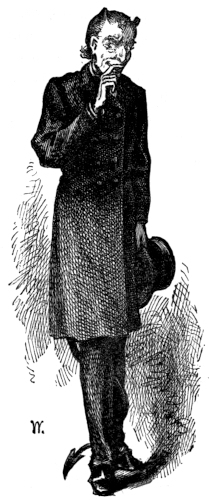
“Yes, I do,” says I. “I s’pose that whenever
humanity is sot down under the light of the Eternal,
it will forevermore, as it has forever in the past, be
followed by two shadows, the joyful and the sorrowful.
450Human nature can’t help itself; the Eternal Soul above
will shine on, and the human nature below will throw
its shadows—the dark one and the light one, first one
and then the other,
unbeknown to us,
followin’ us all the
time, and will follow
us till the darkness
of the human is all
lost in the light of
the divine. There
hain’t no territories
been discovered distant
enough for the
human soul to escape
from itself—from
the shadow of
sorrow. I hain’t
said there wuz.
Neither have I said
it could escape from
sin. I s’pose the
old man in human
nature won’t never
be wholly drove out
of it this side of
Eternity; and I
s’pose wherever that
old man is there will
451be caperin’ and cuttin’ up and actin’. But, as I have
said more’n forty times, you ort to whip that old man,
make him behave himself as well as you possibly can,
be awful severe with him, and keep him under. But
you don’t try to. You jest pet that old man, and
humor him, and encourage him in his caperin’s. You
try to make sin and cuttin’ up and actin’ respectable;
protect it by the law.
“Why, sin is what all good men and wimmen must
fight aginst; educate public sentiment aginst it; make
it obnoxious; or what will become of everybody and
the world if they don’t? Why, they will be ondone,
they and the hull world, if they don’t. I will,” says I
firmly, “I will see Uncle Sam about it at once.”
“Oh,” says he, in a impudent, pert tone, “Uncle
Sam won’t do nothin’ to hinder us. He has always
protected us. He has done well by us. He has let us
do about as we was a mind to.”
“I know it,” says I, “but I’ll tell you,” says I, ontyin’
my apron-strings in a absent-minded sort of a
mechanicle way, and then tyin’ ’em up agin in the
same way (or about the same), “I’ll tell you what,”
says I, for I was fairly determined to find some excuse
for Samuel, if I possibly could, “the fact is, that old
man hain’t been well for quite a number of years. He
has seemed to be sort o’ runnin’ down; his constitution
hain’t seemed right to me. And he has had miserable
doctors; or that is, he has got help in some
directions, good help, and in others he has had the
452poorest kind of physic. But,” says I, firmly, “that
old man means well; there hain’t a well-meanin’er,
conscientiouser old creeter on the face of the earth
than that old man is.”
“Yes,” says he, “he has done well by us. We
hain’t no fault to find with him.”
Oh! how that madded me. But I was determined
to find all the excuses for Samuel that I could (though
I was at my wit’s end, or pretty nigh there, to find
’em, and I can’t deny it). Says I,
“That old man has been more than half crazy for a
number of years back. What with fightin’ and bloodshed
right in his own family, amongst his own childern—and
the injins screechin’ and warhoopin’ round
his frontiers, and the Chinamen a cuttin’ up behind
his back, and his neighbors a fightin’ amongst themselves,
and jabbin’ at him every chance they got; and
congressmen and everybody a stealin’ everything they
could, right under his nose, and cuttin’ up and actin’.
It is a wonder to me that the old man hain’t gin up
long ago, and died off. I guess lots of folks thought,
a number of years ago, that he wouldn’t live a year.
And it wasn’t nothin’ but his goodness and solid
principles that kep’ him up, and everybody knows it.
He’s had enough to bear to kill a ox.”
“We ort to speak well of him,” says he agin. “He
has done first-rate by us. He has seemed to like us.”
“Shet up!” says I. “I won’t hear another word
from you aginst that old man. Your doin’s has worried
453Samuel almost to
death—I know it has. I
wouldn’t be afraid to bet
(if I believed in bettin’)
that it has wore on him
more than all the work
he has done for years.
“He wants to do right,
that old Uncle does.
He would be jest as glad
to get rid of all of you,—Mormons,
454Oneida Communities, Free Lovers, and the
hull caboodle of you,—as our old mare would be glad to
get rid of flies in fly-time. But the thing of it is, with
Samuel and the mare, how to go to work to do it. He
can’t see to everything without help. I know what he
needs. He needs a good, strong friend to help him.
He wants to have somebody tell him the plain truth,
to get his dander completely up; and then he wants to
have that same female stand right by him, with a cast-iron
determination, and hand him bullets and cartridges,
while he aims his old revolutionary musket,
and shoots down iniquities on every side of him.
“Why, where would Josiah Allen be, if it wuzn’t
for me? He would come to nothin’, morals and all, if
it wuzn’t for me to hunch him up. And Samuel has
as much agin to worry him as Josiah has.
“Why, there is no tellin’ how many things that old
man has to plague him and torment the very life out
of him. Little things, too, some of ’em, but how
uncommon little things will worry anybody, ’specially
in the night. Curious things, too, some of ’em, that
has worried me most to death way off here in Jonesville,
and what feelin’s I should have felt to have had
it a goin’ on right under my nose, as Samuel did.
“Now, when they made that new silver dollar, right
there in his house I s’pose they done it, or in his wood-shed
or barn—anyway, it was right where he could see
it a goin’ on, and worry over it—you know they put onto
it, ‘In God we trust.’ And it has fairly hanted me
457to find out what the government really meant by it—whether
they meant that God wouldn’t let ’em get
found out in their cheatin’ seven cents on every dollar,
or trusted He would let ’em cheat fourteen cents on the
next ones they made.
“Why, it has worried me awfully, and how Samuel
must have felt about it. And that is only one little
thing.
“There is the trade dollars we made on purpose to
cheat China with, and sent over in the same ship we
sent missionaries to convert ’em. I persume to say
that old man has laid awake nights a worryin’ over
what the heathens would think about it—about our
sendin’ religion and robbery over to ’em in the same
ship—about our sendin’ religious tracts, exhortin’ ’em
to be honest, or they would certainly go to that bad place
which I do not, as a Methodist, wish to speak of, and
send these dollars to cheat ’em with in the same box—sendin’
458eloquent and heartrendin’ tracts provin’ out to
’em that no drunkard can possibly go to Heaven,
packed side by side with barrels of whiskey to teach
’em how to get drunk, so they will be sure not to go
there. I know it has wore on him, so afraid that the
heathens would be perfectly disgusted with a religion
taught by professed followers of Him who come down
to earth bearing peace, good-will to men, and then,
after 1800 years of professed loyalty to Him, and His
pure and exalted teachings, bore to their shores such
fruit as cheating, falsehood, and drunkenness.
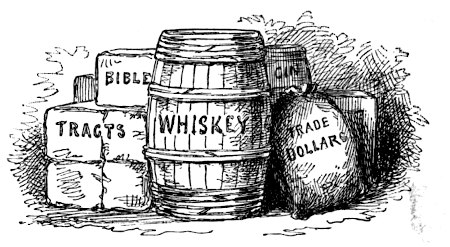
“It has hanted Samuel, I know it has. Hantin’ me
as it has, it must have hanted him fur worse. He has
had severe trials, that old gentleman has, and he has
needed somebody to hunch him up, and lock arms with
him, and draw him along on the path of Right. And
I tell you when I talk with him I shan’t spare no pains
with him. I shall use my eloquent tone freely. I
shan’t be savin’ of gestures or wind. I shall use sharp
reason, and, if necessary, irony and sarcasm. And I
shall ask him (usin’ a ironicle tone, if necessary) how
he thinks it looks in the eyes of the other nations to
see him, who ort to be a model for ’em all to foller,
allow such iniquity as Mormonism to flourish in his
borders. To let a regular organized band of banditty
murder and plunder and commit all sorts of abominations
right under his honest old nose. And how it
must look to them foreign nations to see such a good,
moral old gentleman as he is lift his venerable old eyewinker
459and wink at such crime and sin. How insignificant
and humiliatin’ it must look to ’em to see him
allow a man in Congress to make laws that will
imprison a man for havin’ two wives when the same
man has got four of ’em, and is lookin’ round hungry
for more.
“And I shall hunch him up sharp about sellin’
licenses to do wrong for money—licenses to make
drunkards, and unfit men for earth or heaven—licenses
to commit other crimes that are worse—sellin’ indulgences
to sin as truly as ever Mr. Pope did.
“I don’t s’pose, in fact, I know, that Sam hain’t
never thought it over, and took a solemn, realizin’
sense of how bad he was a cuttin’ up (entirely unbeknown
to him). And, if necessary, to convince him
and make him see his situation, I shall poke fun at
him (in a jokin’ way, so’s not to get him mad). And
I shall ask him if he thinks it is any nobler for him to
set up in his high chair at Washington and sell indulgences
to sin, than it was in Mr. Pope to set up in his
high chair in Vatican village and sell ’em.
“And I shall skare him mebby, that is, if I have to,
and ask him in a impressive, skareful tone that if he
can’t be broke in any other way, if he don’t think he
ort to be brought down to a diet of Worms.
“It will go aginst my feelin’s to skare the excellent
old gentleman. But I shall feel it to be my duty to
not spare no pains. But at the same time I shall be
very clever to him. I shall resk it. I don’t believe
460he will get mad at me. He knows my feelin’s for him
too well. He knows there hain’t a old man on the face
of the earth I love so devotedly, now father Smith is
dead, and father Allen, and all the other old male
relatives on my side, and on his’en. I’ll bet a cent I
can convince him where he is in the wrong on’t.”
Here I paused for a moment for wind, for truly I
was almost completely exhausted. But I was so full
and runnin’ over with emotions that I couldn’t stop,
wind or no wind. And I went on:
“He hain’t realized, and he won’t, till I go right
there and hunch him up about it, how it looks for him
to talk eloquent about the sanctity of home. How the
household, the Christian home, is the safeguard, the
anchor of church and state, and then make his words
seem emptier and hollower than a drum, or a hogsit,
by allowin’ this sin of Mormonism to undermind and
beat down the walls of home.”
And then (this theme always did make me talk
beautiful), as I thought of home and Josiah, and the
fearful dangers that had threatened ’em both, why, as
I thought of this, I begun to feel eloquenter far than I
had felt durin’ the hull interview, and I don’t know as
the feelin’s I felt then had been gone ahead of by me
in five years. Why, I branched out perfectly beautiful,
and very deep, and says I:
“Home! The Christian home! The mightiest
power on earth for good. Each home seperate and
perfect in itself, like the little crystal drops of water,
461each one on ’em round and complete and all floatin’ on
together, unbeknown to them, makin’ a mighty ocian
floatin’ right into that serene bay into which all our
hopes and life dreams empty. That soundless sea that
floats human souls right up to the eternal city.
“The love of parents, wives, and children, like
golden rings, bindin’ the hearts to the happy hearth-stone,
and then widenin’ out in other golden rings,
bindin’ them hearth-stones to loyalty and patriotism,
love of country, love of law and order, and love of
Heaven, why, them gold rings within rings, they all
make a chain that can’t be broke down; they twist all
together into a rope that binds this crazy old world to
the throne of God.
“And,” says I, lookin’ at Elder Judas Wart, with a
arrow in each eye (as it were): “This most wholesome
restraint, this strongest of ropes that is stretched firm
and solid between safety and old Error, you are tryin’
to break down. But you’ll find you can’t do it. No
sir! You may all get onto it,—the whole caboodle of
you, Mormons, Oneida Communities, Free Lovers, the
hull set on you,—and you’ll find it is a rope you can’t
break! You’ll find that the most you can do is to
teter and swing on it, and stretch it out a little ways,
mebby. You can’t break it! No sir! Uncle Samuel
(after I have hunched him up) will hold one end of it
firm and strong, and Principle and Public Sentiment
the other end of it; and if necessary, if danger is at
hand, she that was Samantha Smith will lay holt of it,
462too; and I’d love to see any shacks, or set of shacks,
a gettin’ it out of our hands then.”
Oh, how eloquent I had been. But he wuzn’t convinced.
I don’t s’pose anybody would hardly believe
that a man could listen to such talk, and not be proselyted
and converted. But he wuzn’t. After all my
outlay and expenditure of eloquence and wind and
everything, he wuzn’t convinced a mite. And after he
had got his hat all on to go, he jest stood there in front
of me, with his hands in his pockets, and says he, bold
as brass, and as impudent as brass ever was:
“I am a goin’, mum, and I don’t never expect to see
you agin. I never shall see you in the kingdom.”
“I am afraid you won’t,” says I, givin’ him a awful
keen look, but pityin’. “I am afraid if you don’t turn
right square round, and stop actin’, you won’t be
there.”
“I shall be there,” says he, “but you won’t.”
Says I, “How do you know I won’t?”
Says he, “Because I do know it.”
Says I, with dignity, “You don’t know it.”
“Why,” says he, comin’ out plain with his biggest
and heftiest argument, the main pillow in the Mormon
church, “a woman can’t be saved unless some man
saves ’em, some Mormon. That is one reason,” says
he, “why I would have bore my cross, and married
you; obtained an entrance for you in the heavenly
kingdom. But now it is too late. I won’t save you.”
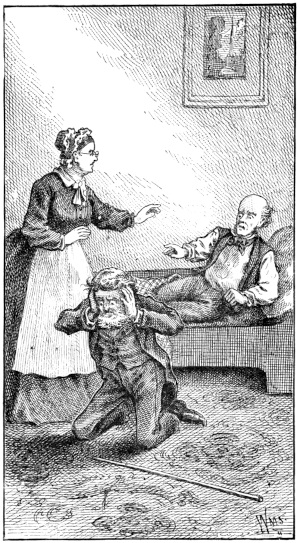
JOSIAH ENDS THE ARGUMENT.
“You won’t save me?” says I, lookin’ keen at him,
465as he stood there before me, with his red bloated face,
a face that had that low, disipated, animal expression
lookin’ out so plain under the sanctimonious, hypocritical
look he had tried to cover it with. “You won’t
save me! Won’t take me into the heavenly kingdom!
Wall, I rather think you won’t.”
I was so engaged and bound up in my indignant
emotions and principles and everything that I didn’t
see what was goin’ on behind me. But there was a
fearful scene ensuin’ and goin’ on there. A awful
scene of vengeance and just retribution. For my
faithful pardner, maddened by the terrible insult to
his Samantha, jest lifted himself up on one elbo, his
righteous anger liftin’ him up for the moment above
stitches and all other earthly infirmities, and he threw
that broom-handle at Elder Judas Wart with terrific
force, and aimed it so perfect that it hit him right on
the nap of the neck. It was a fearful blow. I s’pose
it come jest as near breakin’ his neck as anything ever
did and miss.
And it skairt him fearfully, too; for Josiah had been
so still for a spell that he thought he was asleep. And
it had come onto him as swift and severe as a judgment
right out of the heavens. (Not that I would
wish to be understood that broom-handles are judgments,
and should be handled as such; not as a general
thing. I am speakin’ in a poetical way, and would
wish to be took poetically.)
But oh! how fearful Elder Judas Wart looked. It
466squshed him right down for a minute where he ort to
be squshed—right onto his knees. He couldn’t get
up for a number of minutes, bein’ stunted and wild
with the blow and the fearful horrow of his skare.
And oh! how Josiah Allen did converse with him, as
he knelt there helpless before him; hollered! it wasn’t
conversation, it was hollerin’; loud, wild holler! almost
a beller!
He ordered him out of the house, and threatened
him with instant and immediate execution on the galluses.
Though he knew we hadn’t no gallus built,
and no timber suitable to build one; and he disabled
with a stitch, and nobody but me to do anything. But
he vowed, in that loud, skareful axent, that he would
hang him in five minutes’ time; and chop his head off
with a broad-axe; and gulotine him; and saw his neck
off with our old cross-cut saw; and shoot him down
like a dog; and burn him to the stake; and scalp him.
Why, Josiah ort to have known that one of these
punishments was enough for any man to bear, and
more than any man could stand up under. And he
knew we hadn’t the conveniences by us for half of
these punishments. But he didn’t think of that. He
didn’t think of nothin’, nor nobody, only jest anger
and vengeance. He was more delerious and wild in
his conversation and mean than I had ever known him
to be during our entire aquaintenship. It was a fearful
scene. It was harrowin’ to me to see it go on.
And Elder Judas Wart, as quick as he could get up,—started
467off on a quick run, almost a canter. I s’pose,
I have heerd sense, and then I could see from his looks
and actions, that a skairter man never lived. And
well he might be. I don’t blame him for it a mite.
I blame him for lots of things, but not for that; for
the words and mean of Josiah was enough to apaul a
iron man, or a mule.
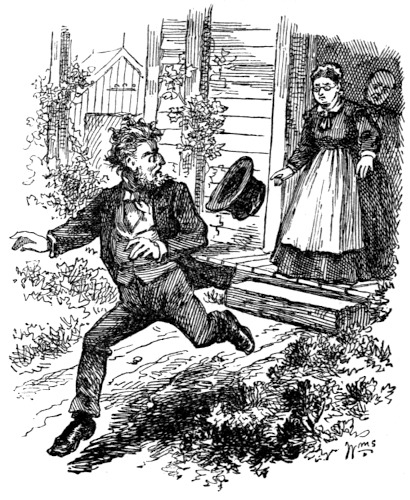
But as I told Josiah afterwards, after the crazy
delerium begun to disperse off of his mean, says I,
468“Why is it any more of a insult to me than it is to
them other poor wimmen who have to endure it?”
Says I, “You feel awfully to have that doctrine jest
throwed at your pardner, as you may say. And look
at the thousands of wimmen that have to submit to
the humiliation and degredation of this belief, live in
it, and die in it.”
“Wall,” says he, chucklin’, “I jest choked old Wart
off of it pretty sudden. I brought him down onto his
knees pretty suple. He won’t talk about savin’ wimmen’s
souls agin right away. He won’t till his neck
gets well, anyway.” And he chuckled agin.
I don’t believe in fightin’, and am the last woman
to encourage it; but I could not help sayin’, in fervid
axents:
“Oh! if Uncle Samuel, that dear, blunderin’, noble
old man, would only hit old Polygamy jest another
such a blow, jest as sudden and unexpected, and bring
him down on his polluted old knees in front of the
nation. Oh! what a day that would be for America
and Samantha. What feelin’s we should feel, both on
us.”
“Yes,” says Josiah, “I wish it could be did.” In
the case of Josiah Allen my powerful talk (aided by
previous and more late occurrences) had fell on good
ground, I knew. The seed was springin’ up strong.
I knew it was by the way he threw that broom-handle,
and I knew also by his looks and axents.
He was perfectly and entirely convinced of the
469awfulness and vile horrors of Mormonism. I knew
he was. He looked so good and sort o’ noble at me.
And his tone was so sweet and kind of affectin’, somehow,
as he added, in gentle and plaintive axents:
“I believe, Samantha, I could relish a little briled
steak and some mashed-up potatoes.”
Says I, “So could I, and I will get dinner to once.”
And I did.
470

A CRISIS WITH KELLUP.
The very next day after I gin the Elder such a
talkin to, Cassandra and Nathan Spooner come
to our house a visitin, or that is, Nathan brought Cassandra
up as far as there for a drive, in the mornin’,
and I made ’em come in and stay to dinner, Cassandra
not bein’ very strong. They have got a young
babe, a boy, five weeks old that very day. Wall, while
they was there, while I was a gettin’ dinner, I had a
letter from Kitty. Kitty had gone home two weeks
before, unexpected. A letter bein’ had by her from
her mother, to that effect.
I never shall forget the day Kitty went. Never.
Josiah had hitched up to take her to say good bye to
the children, and they hadn’t been gone more’n
several moments, when Kellup Cobb come. He had
heerd the news of her goin’ home, and he looked
anxious and careworn. And his hair and whiskers
and eyebrows bein’ a sort of a dark mournful color
that day, made him look worse. He had been foolin’
with logwood and alum, and a lot of such stuff.
471He said, “he was fairly beat out a layin’ awake the
night before.”
“What ails you?” says I. “What is the matter?”
“Wimmen is what ails me!” says he with a bitter
look. “Wimmen is what is the matter! Why,” says
he, “wimmen make such fools of themselves about
me, that it is a wonder that I get any sleep at all; I
shouldn’t,” says he firmly, “I know I shouldn’t, if I
didn’t get so sleepy and sort o’ drowse off.”
“Well,” says I reasonably, “I don’t s’pose we
should any of us get much sleep, if it wasn’t for that.”
Says he, speakin’ out firm and decided, “I want to
do right. I want to do the fair thing by wimmen.
But there it is. How can I? Now here is Kitty
Smith goin off droopin’ and low-sperited, I s’pose, jest
on my account. And situated as I be, how be I goin’
to help myself, or chirk her up before she goes?
“I think my eyes of that girl. And I jest about
made up my mind, last night, in the dead of night
(for I don’t believe I slept a wink before ten o’clock),
I jest about made up my mind that marry her I would,
and let the rest of the wimmen live or die, jist as they
was a mind to.
“Why, I think so much of that girl, that it jest
about kills me to think of her goin off home, as them
without hope. But what can I do? I dassent say right
out that I will marry her, till I look round and see
what would foller. I want to see the doctor! I want
to see what he thinks, if he thinks the effects of such
472a terrible blow onto the fair sect would be worse at
this time of the year. It is a sickly time. Mebby
they would stand it better some other time of the year.
“But,” says he, “this I think I may safely promise
you; this, I think, will chirk her up a good deal: I
will write to her. I will kinder watch things, and
enquire ’round, and see what I can do—see how they
would seem likely to stand it, and if I see it haint
likely to kill ten or fifteen, I will try to get round and
marry her. You tell her so from me. And tell her I
will write to her, anyway. My very heart-strings
seemed wrapped round that girl,” says he, sithin’ hard,
“and how I am a goin’ to stand it is more than I can
tell, to think of her bein’ way off there alone, a sufferin’
and droopin’ round, on my account.
“But this letter will probable be the greatest comfort
she can have next to havin’ me myself. You will be
apt to write to her?” says he anxiously.
“Yes,” says I, “most probable I shall.”
“Wall,” says he, “I will put in a letter with you
when you write. It haint the postage that is the stick
with me, it haint the 3 cents I mind. But if I can’t,
after all my efforts, see my way clear to marry her, it
would seem more cruel and cold-blooded in me, to have
gin her the encouragement of sendin her a letter by
myself, all stamped and paid for by me, than it would
to send it in with somebody else.” Says he, “Don’t
you think so?”
473Says ISays I in a sort of a blind way, “I think of a
great many things that it wouldn’t do to tell of.”
“Yes,” says he, “you probable pity me, and realize
the situation I am placed in, more than you feel free
to tell. You probable think that sympathy would
break me down—make me feel worse.”
“Yes,” says I firmly, “I don’t feel free to tell my
opinion of you. It would be apt to make you feel
worse.”
“You are a woman of principle, Josiah Allen’s wife,
and a woman of strong sense. You realize my situation—you
feel for the condition of my heart.”
“Yes, and your head too,” says I; “I realize jist
what has ailed you, ever sense you was born. But,”
says I, wantin’ to turn the subject, for I was sick of it,
sick as a dog. Says I “you wuzn’t to meetin’ last
night wuz you?” Says I, “We wimmen talked it
over after the meetin’, and we are goin to take up a
collection to make Miss Bamber a present of a new
black dress. We are goin’ to ask each church-member
to give jest one sixpence, and one sixpence apiece
from the 250 members will get her a good bumbazeen
dress, or a very nice alpacka. And so,” says I, “I
thought I would ask you for your sixpence.”
Knowin’ it is Kellup’s duty to be tackled for the
good of the meetin-house, I will, no matter whether
he will give anything or not, I will insist on tacklin’
him.
Says I, “You know Miss Bamber has lost her
474mother-in-law and wants to mourn for her—wants to
the worst kind, and can’t.”
“Why can’t she mourn?” says Kellup.
“Why,” says I, “She can’t mourn, because she
haint got no dress suitable to mourn in, thats why
Miss Bamber feels like death about it. She knows it
is her duty to mourn, and she wants to, like a dog, but
can’t.”
Says Kellup, lookin stingy, awful unwillin’ to give
anything, “She can mourn jest as bad in one dress as
another, or without any.”
“Wall,” says I reasonably, “So I think. But
everybody has their little different ways and excentricities,
and it don’t look well for us to meddle with ’em.
Now that feller by the name of Procrustes, at Attica
village. Now, I always thought he went too far. He
had a iron bedstead, and he used to make everybody
that traveled his way lay down on it, and if their legs
was too short, he would stretch ’em out to fit that bedstead,
and if they was too long, he would saw ’em off.”
Now Mr. Procrustes wuzn’t doin’ exactly the fair
thing. What earthly business was it of his, if other
folks’es legs was too long to be convenient, or too
short? It wuzn’t his place to trim ’em off, or stretch
’em.
And I always thought that if I had had business in
his neighborhood, and been travelin’ that way, and he
had tried to fit me or Josiah to that bedstead, why, I
475always thought he would have seen trouble. I should
have gin him a awful talkin’ to, and kicked.
Mr. Procrustes is dead. Yes, I believe old Thesius,
a neighber of his’en, killed him upon some mountain
or other. I presume he got to stretchin’ old Thesius’es
legs out, or begun to saw ’em off, and got the
old man mad, and he jest laid to and killed him.
Yes, I believe old Mr. Procrustes hain’t livin’ at the
present time, but he left a large, a very large family.
And every one of ’em inherits the old gentleman’s
traits and disposition. I have seen lots of ’em that, if
they dast, would have every leg in the world jest the
length of their’n. If they dast, they would tackle you
in a minute with a saw or a broad-axe.
476“But I never felt that way. Now, as fur as my own
feelin’s are concerned, I think memories can haunt
anybody, and hearts can ache jest as severe under a
white dress as a black one, and visey versey. Hearts
can beat gay and triumphant aginst bumbuzeen bodist
waists and crape trimmin’s. But Miss Bamber feels
different. She feels that she can’t mourn without certain
conveniences. And feelin’ in that way, and
feelin’ that it would be a duty and a privilege for her
to mourn for her mother-in-law, I say that woman
shall have the wherewith to do it with. I say she
shall mourn if she wants to; she shall be helped to a
black dress. There hain’t a member of the meetin’-house
but what can give a six-pence without feelin’ it.
We want to keep it all still from Miss Bamber, and
get it, and get it all made for her before she knows a
thing about it. And,” says I, “mebby you had better
give me the six-pence to-day, as we have got it about
all collected, and want to get the dress right away.”
Says he, “Hain’t there nobody else whose duty it is
to get the dress? Her relations? I should think it
was their duty to help.”
Never did I ask a stingy human creeter for help for
the poor, or help for the meetin’-house, but what this
argument was dragged up by ’em. Tryin’ to shirk off
their own duty onto somebody else.
“No,” says I, “her family is all dead. She hain’t
got but one relation in the world, and that is an aunt
477of her grandmother’s; and she is supported by the
town.”
“Wall,” says he, cheerfully, “mebby the town would
feel like gettin’ this dress.”
I jest give him a look, and never said another word,—only
jest that look. But I s’pose that look spoke
louder and awfuler than words, for he hastened to say,
in a apologizin’ way:
“I didn’t know but the town would want to—would
feel it a privilege to—”
I still didn’t say nothin’, only jest that awful look.
And agin he says, in a apologizin’ way:
“I would advance the six-pence to you, I would try
to raise it some way for you, but the hard times we
have had, and are havin’, have depressed all sorts of
business so, we have suffered terribly financially as
well as the other public. We have got a great deal of
money to make out this fall—over 10 dollars. Father
hain’t a bit well; my health hain’t what it once was;
our expenses are enormious—taxes, household expenses,
clothin’; and takin’ all these things into consideration,
together with the public debt, the withdrawal
of funds by foreign capitalists, the almost total
stagnation of public enterprize, the total lack of public
confidence, the total—”
Says I, “Put in total selfishness and total meanness,
and keep your six-pence.”
I don’t believe I have been more wore out in over
seven months,—and mad.
478“Wall,” says he, lookin’ relieved, “if you will
excuse me, I won’t make no move towards raisin’ the
money for you. It would probable cramp me considerable
to raise the sum jest at this present time.”
And then he begun about Kitty agin. Says he,
knittin’ up his eyebrow hard, and lookin’ gloomy:
“I never calculated to fall in love with a poor girl.
It never used to pass my mind that I ever should
select such a one out of the hundreds that stand round
me, hankerin’ to marry me. But I have done it. Why,
sometimes I think I couldn’t love that girl any more
if she was worth two hundred and 50 dollars. I think
so much of her that it is as hard for me as loosin’ a
limb, almost like loosin’ my pocket-book, to think of
her bein’ way off there a pinin’ for me, and bein’ on a
perfect rack, not knowin’ whether she will get me or
not.
“When I think of that side of the question, Josiah
Allen’s wife, I feel jest like leavin’ word here with you
for her, that I will marry her, whether or no. But
then, jest like a blow aginst the side of my head, comes
the thought of them other wimmen, that had hopes
before she come to Jonesville that they would get me.
I believe, anyway, it will be safe to leave word here for
her to keep up good courage, and try not to get too
cast down and melancholy; to hope for the best; and
I’ll do everything I can. I’ll enquire round about the
wimmen, see the doctor, and try to arrange things for
her good and happiness; try to get round and marry
479her. At the same time,” says he, with a cautious
look, “I would feel it my duty to warn her to not get
so bound up in me that the disappointment would kill
her, if she should lose me.”
“Wall,” says I, bein’ wore almost completely out,
“I must go and skim the milk for the calves.”
And he took the hint and started off, and glad
enough was I to see him go. But jest as he went
down the steps, and I turned to go into the buttery, I
see a paper of indigo that Marier Burpey had left here
that very day. She had forgot it, and I knew she was
in a hurry a colorin’; so I jest carried it to the door,
and asked Kellup if he would carry it to her, knowin’
he had to go right by her door.
“No,” says he, firmly, “I dassent do it.” And he
looked anxious and skairt as he said it. “I’d be glad
to, but I dassent,” says he. “I have to make my
demeanor perfectly stunny towards that girl, in order
to keep her affection anywhere within bounds. She
don’t show it any by her looks or actions—she has got
almost marble self-control; but I see right through it.
I see that she almost worships me. I see that I am
makin’ her perfectly unhappy; and when I think of
Sofier’s fate, I tremble for Marier. I am careful; I am
a careful feller; I am on my guard. And at the present
time, situated as I be in regard to Kitty, I feel that
I ort to be doubly careful. But at any and every time
a young man like me can’t be too careful when they
are round amongst wimmen.”
480“Nobody wouldn’t mistrust you was makin’ such
havock,” says I, mechanically, for I really didn’t know
what to say.
“Yes, if a young man like me is unprincipled enough
to go headlong into wimmen’s company without lookin’
where he is goin’, without actin’ offish and cold to ’em,
why, before that man knows it, he is a wadin’ through
goar. Bleedin’ hearts lay round him on every side a
481bleedin’. Why don’t other young men think of these
things? Why hain’t they more careful, more offish?”
Says I, with feelin’, “That’s so, why hain’t they?
The offisher some men be, the more I think on ’em.”
And I looked longin’ly at the path down to the gate,
and the road to Jonesville.
“Yes, you know what actin’ on principle means.
That is why I respect you, confide in you.”
“Then you don’t think you can carry the indigo?”
says I, turnin’ to go in.
“No,” says he, firm as marble, and as sot as that
stun. “I’d love to accommodate you, but I dassent.
When I think of the fate of Sofier, when I think of the
deadly blows my conscience dealt to me every minute,
as I drove her hearse to the buryin’-ground—then I
feel as if I had almost ruther lose ten cents than go
through it agin with Marier. I feel that I must not be
resky, and do anything to ensnare her affections.”
“Good land!” says I, “indigo won’t be likely to
ensnare ’em, will it?”
“Other men might handle it safe, men with less
attractions than I have got, but I can’t, I dassent.”
And I wouldn’t demean myself by urgin’ him another
word. And I went into the house, and he
started off.
Wall, as I was a sayin’, Kitty had been gone two
weeks, the day Nathan and Cassandra visited me, and
this letter from her, brought in to me while I was
a gettin’ the dinner onto the table, brought news that
482was startlin’ and agitatin’ in the extreme. I was jest
a stirrin’ some sweet cream and butter together over
the stove, havin’ a fresh salmon trout for dinner, and
Josiah bein’ fond of that kind of gravy to eat with it,
and Nathan bein’ such a clever creeter, offered to stir
it for me, while I read the letter. And I was so
anxious to git the news, that I let him do it, though,
the stove bein’ so hot, take it with that and his
burnin’ blushes, it made a pretty hot time for him.
But the news was this: Kitty was married. But the
curiousest and most agitatin’ part of the news was, the
old gentleman, Mark’s father, had got after Kitty’s
mother. He went to give her a scoldin’, and fell in
love with her on the spot. Like Hamen, he got hung
on his own gallowses—went to smite her, and got smit
himself, awful. So he courted her up violent and
powerful, and they all got married the same day.
It was very pleasant and agreeable news to me, and
to Josiah. And Cassandra and Nathan acted well
about it. They said they was glad it all turned out so
well, but their minds didn’t seem to be on the news so
much as they was on their babe. And it is a very
good-lookin’ child, and appears middlin’ well for a
child of its age. Takes after its father some—sort o’
sandy, with red hair. It don’t look much, as little
Samantha Jo did, nor it don’t have that noble, beautiful
appearance she had at that age. But then you can’t
expect that any other child is ever goin’ to look and
act like her. I do despise people bein’ so bound up in
483their own childern and grandchildern that they can’t
see no good qualities in any other childern. Thank
fortune that hain’t my way, nor never was. And I
say, and I always shall say, that Cassandra’s babe
hain’t a babe to be ashamed of, and feel above, not by
any means.
Bein’ so awful bashful, Nathan don’t probable associate
with it so much, and act on such intimate terms
with it as he would if it wuzn’t for that. But in a
mild, sheepish way, he seems to think the world of it,
and seems to want to do everything he can to make it
feel to home with ’em, and happy. But he don’t come
out openly and express his admiration and affection, as
he would if it wuzn’t for that drawback.
Now, he dassent hold it much, or that is, he don’t
seem to dast. But Cassandra bein’ proud-spirited, and
wantin’ Nathan to show off some, would once in a
while put the babe in his lap.
He never would make any move to stop her. He
never would refuse to take it. He would set and hold
it jest as long as she felt disposed to leave it there.
But he would look down on it in a skairt, wonderin’,
breathless way, as if the child got there in his lap
through some mysterious and inscrutable decree of
Providence, and it wuzn’t for him to resist. But he
suffered intensely at such times, I could see.
And every little while Cassandra (bein’ determined
to make Nathan show off) would tell him to say sunthin’
to the babe, talk baby-talk to it. And he would
484always try to. He would always do jest as Cassandra
told him to (a cleverer critter never walked). His
face would be as red as a red handkerchief, but he
would ask the babe, up in a little, high, fine voice:
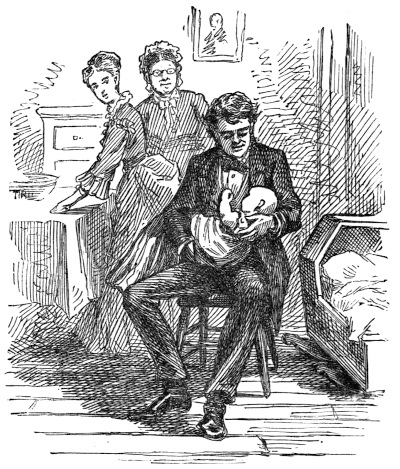
“DO YOU WANT A PAIR OF BOOTS?”
“Do you want a pair of boots?”
He never made any other remark to the child that
I heard, only jest that. I heard him say that to it
487more’n 20 times, I dare persume to say. For Cassandra,
bein’ so anxious to have him show off, kep’
tellin’ him to talk to it. And it seemed as if that
remark was all he could think of that would be agreeable
to the child. But Josiah said, as we was talkin’
it over afterwards, that he heard him say two or three
times to it:
“Yes, it shall have a pair of boots.”
But it must have been when I was out a gettin’ dinner.
For if I was under oath I would say that I didn’t
hear him say a single thing to it, only jest this:
“Do you want a pair of boots?”
They started for home jest after dinner, Nathan
havin’ left some work that must be done. And Josiah
hitched up and went to Jonesville to mill. And I
s’pose he told the news about Kitty there. But it
wuzn’t till the next afternoon that I heard what the
effects of that news wuz in a certain place and to a
certain feller.
And though it hain’t always best to mention names,
and come right out plain and talk, yet it probable
won’t do no hurt to mention that you might expect
Kellup Cobb, under any circumstances, would act like
a fool.
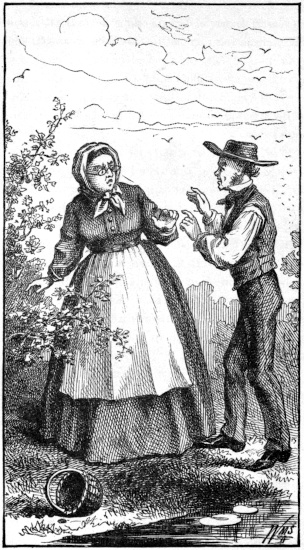
I was down to the creek lot, pickin’ a few berries
for supper, when Josiah told me on’t. It had got a
little later than I thought for, and Josiah had come
down after me, bein’ worried about me. It was only
a little ways from the house. I had put the tea-kettle
488on, and sot the table, before I had come out, and the
tea-kettle was a bilin’, so Josiah said, after he told me
the news. The news was thrillin’ and agitatin’ in the
extreme. He said Kellup Cobb had disappeared the
night before, after the news of Kitty’s marriage had
got abroad in Jonesville. They said that he felt so
that he disappeared, he and the hearse and Elder
Judas Wart—the hull three on ’em. Kellup had been
on intimate terms with Judas Wart for some time; and
some think that Kellup bein’ so cut down by Kitty’s
marriage, and the Elder bein’ so cut down by my witherin’
eloquence and Josiah’s broom-handle, that they
both got into the hearse, and drove off in it to Utah to
jine the Mormons. And some think that they sold the
hearse, and took the money, and went to Salt Lake by
rail. Which last way, I told my Josiah, when he mentioned
it, was the proper way to go there, if it wuz the
right kind of a rail. But anyway, they had gone, the
hull three on ’em, and there hain’t been a word heard
from ’em sense in Jonesville.
Josiah said old Cobb felt awfully.
Says I, “To lose Kellup?”
“No,” says he, “to lose the hearse.”
But I jest repeated this line of poetry to my pardner.
Says I:
“Poetry, Josiah, will somehow express the feelin’s
of the soul better than you can express them yourself.”
And says I, “Josiah, as for Elder Judas Wart and
489Kellup, I say with the poet, good riddance to bad rubbidge.”
“Wall,” says Josiah, with a sort of a dreamy look,—that
man loves poetry, though he seldom quotes it—“don’t
you s’pose, Samantha, that you have got about
enough berries for supper, for I am gettin’ hungry as
a bear.”
“Yes,” says I, “because I have got stewed peaches
and cold chicken and everything else good for supper
besides them. But,” says I, lookin’ sort o’ longin’ly
at some berries that was a hangin’ over the water,
“there is a few extra big and ripe ones that do look
too good to leave.”
“Wall,” says he, sweetly (for his mean sense I told
him what we was goin’ to have for supper had looked
perfectly beautiful), “you set down and rest, Samantha,
and I will pick ’em for you.”
And so he took my little tin pail, and with a happy
frame bent down to pick ’em. And I, bein’ tired, sot
down, and looked into the water. And I see that
everything was reflected in it. The trees, the nodding
red sumac feathers, my Josiah and me, gay golden-rod
and wild blue china-oysters, the berry bushes, the
thorny stalks and the ripe fruit, fresh posys, and withered
leaves; all imaged there in the water; and the
water was a runnin’ swift.
And out on the end of a slender bush that hung over
the water, a bird swayed and swung to and fro, and
sung out a dretful sort of a sweet song, yet sad like.
490Some as if it was practicin’ over a farewell song to its
home, its happy nest, before it sailed away south in
search of a balmier climate.
So the bird sailed back and forth on that slender
twig, over the deep waters, a singin’ about a happier
country, sweet and sad, sweet and low. And my pardner
picked the ripe berries, and I sot there peaceful
and serene (though some sweaty), a thinkin’ how, over
all that was pictured on the changing face of the
waters, the changeless blue heavens was reflected,
shining down over all, the old and the new, the mournful
and the sorrowful; over all, and beneath all. That
thought was perfectly beautiful to me, and dretful
comfortin’. And I sot there a thinkin’ of that, and a
thinkin’ how swift the water was a runnin’ towards
the sea.
491HAVE YOU READ
MY OPINIONS
AND
BETSEY BOBBET’S
By JOSIAH ALLEN’S WIFE?
AUTHOR OF
“SAMANTHA AT THE CENTENNIAL,” AND “MY WAYWARD PARDNER.”
IF NOT GET IT THE FIRST OPPORTUNITY.
This book is one of those indescribable ones, of which little can be
said except that it is rich and spicy throughout, readable and fascinating,
brimfull of humor and sharp things—yet not a line in it, that does
not point a moral, and teach a lesson. It will create a sensation whenever
read, and no one will enjoy it better than the ladies, although it
deals with them in a plain way. The men will like it, the children
will like it, all will like and laugh over it, and remember its teachings
long afterwards.
The Public will make no mistake in purchasing this book, as it
is full of good things, which will at once arrest and rivet the attention
of the reader.
Never was a character’s lines drawn more distinctly than that of
Josiah’s wife, and her originals will be found among the acquaintances
of many. Cute, wise, shrewd and observing, with a vein of
strong common sense, yet simple and innocent as a child, she will
keep the reader crammed with sharp hits and funny observations.
Betsey Bobbet’s opinions act upon Josiah’s wife’s, as settings
do upon diamonds: adding to their brightness and resplendency.
The book contains 432 Pages, and is filled with Pictures, put
in, as the author says, to explain the text.
| Price in Fine English Morocco Cloth, |
|
$2.50 |
| ” ” ” ” ” |
Gilt Edges, |
3.00 |
| ” ” Half Turkey Morocco, |
” |
4.00 |
The book can be had by addressing
AMERICAN PUBLISHING CO.,
AGENTS WANTED. HARTFORD CONN.
492JOSIAH ALLEN’S WIFE’S
AS A
P. A. and P. I.
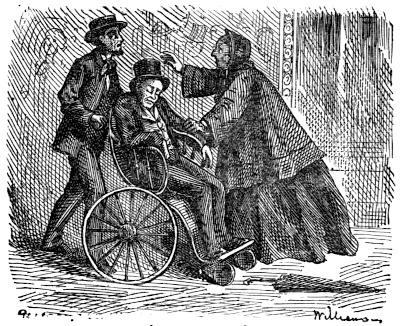
JOSIAH’S FIVE HOURS’ RIDE.
Samantha at the Centennial.
By the Author of
“MY OPINIONS AND BETSEY BOBBET’S,” AND “MY WAYWARD PARDNER.”
This book the writer sends forth to the world, expecting it
will (as did other martyrs: John Rogers and etcetery) tread
on the hot coals of public opinion; be briled on the gridiron
old bigotry keeps to brile her enemies on; be scalded by the
melted lead of old custom; and be burnt up on the stake of
opposition; yet still, upheld by firm principle and lofty emotions,
she is able to say: “I am happy in the thought.”
A kind and noble Artist has risked his fame by
drawing a few pictures for the book.
This Volume Contains 580 Pages,
25 Full-Page and 50 other Engravings
Prices: In Fine English Cloth, $2.50; do. do., Gilt Edge, $3.00;
Half Turkey Morocco, $4.00.
The book can be had by addressing
AMERICAN PUBLISHING CO.,
AGENTS WANTED. HARTFORD CONN.
The Table of Contents had several errors in pagination, briefly off by
two pages. These have been corrected.
On p. 198, a lengthy (and literally) parenthetic remark begins in mid-sentence
and finishes with the following paragraph.
Errors deemed most likely to be the printer’s have been corrected, and
are noted here. The references are to the page and line in the original.
The following issues should be noted, along with the resolutions.
| ix.6 |
How he Courted Cassandr[i]a |
Removed. |
| 52.16 |
it cannot long [h/b]e hid |
Replaced. |
| 61.15 |
if I was in his place.[”] |
Removed. |
| 62.10 |
for I may not marry at all.[’/”] |
Replaced. |
| 72.3 |
I am most afraid it is resky then.[”] |
Added. |
| 103.18 |
my tooth-brush.[”] |
Removed. |
| 103.19 |
the tooth[ /-]brush |
Replaced. |
| 113.6 |
[“]Says I: |
Removed. |
| 114.17 |
but it se[mede/emed] as |
Transposed. |
| 210.5 |
poke at [’]em |
Added. |
| 240.7 |
[“]And superintendents |
Added. |
| 243.1 |
and not fatigue [your-]yourself |
Removed. |
| 248.8 |
we was a marchin[’] round |
Added. |
| 383.5 |
Tamer Moony,[’/”] says I, |
Replaced. |
| 426.15 |
right away from happiness.[”] |
Added. |
| 473.1 |
[“]Says I, in a sort of a blind way, |
Removed. |
*** END OF THE PROJECT GUTENBERG EBOOK 63859 ***




